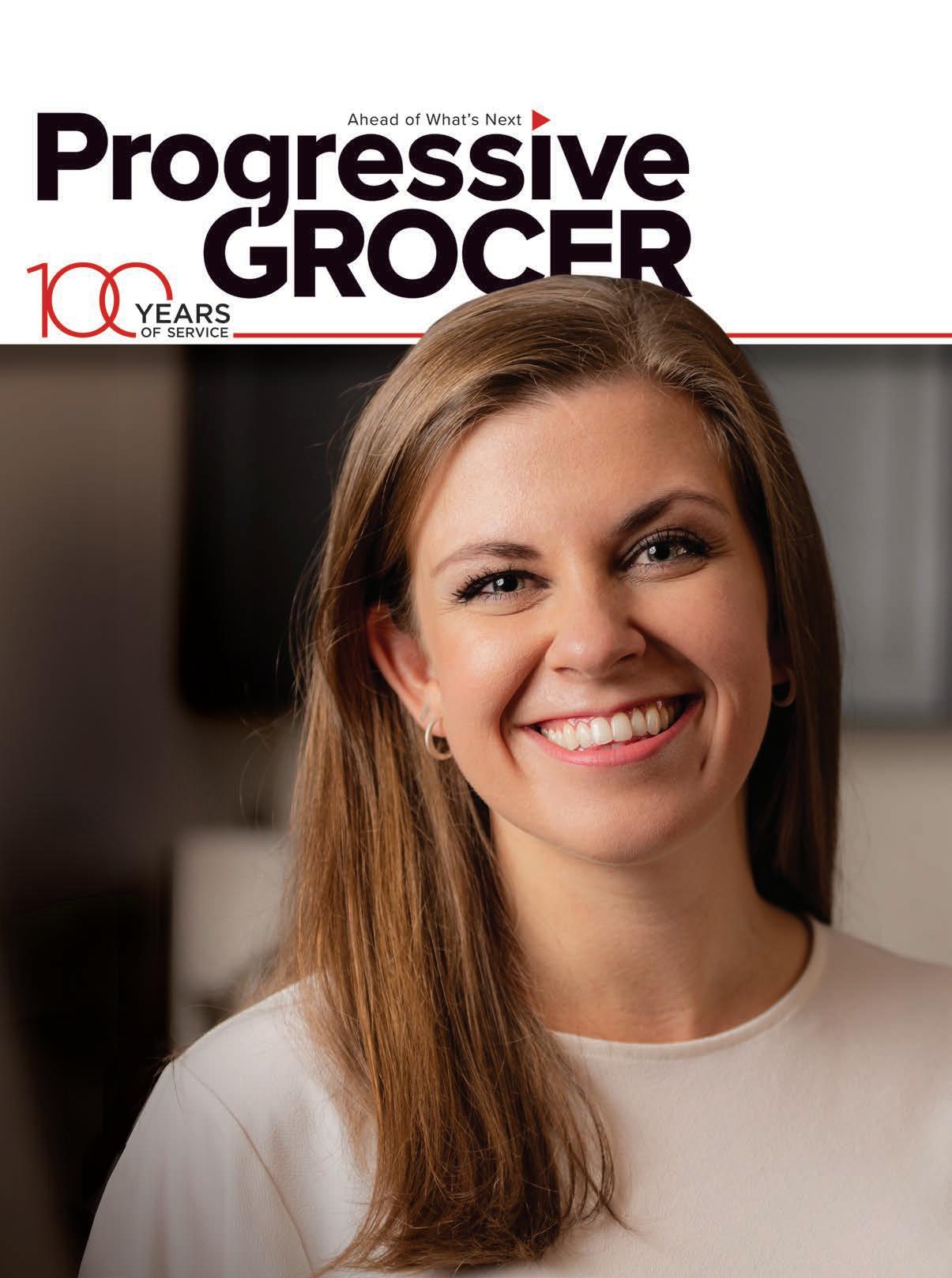
EDITORS’ PICKS: PRODUCTS WORTHY OF RETAILER, CONSUMER ATTENTION AHOLD DELHAIZE ON THE RISE What’s behind the retail growingconglomerate’smomentum SUSTAINABILITY STARS Spotlighting eco-friendliestgrocers’moves POULTRY FOR THE WIN Chicken and turkey offer value for shoppers September 2022 Volume 101, Number www.progressivegrocer.com9 GroceryofFutureThe 2022 GenNext Awards honor those reimagining the industry 2022 GiantEmilyAwardGenNextwinner:MassiFood
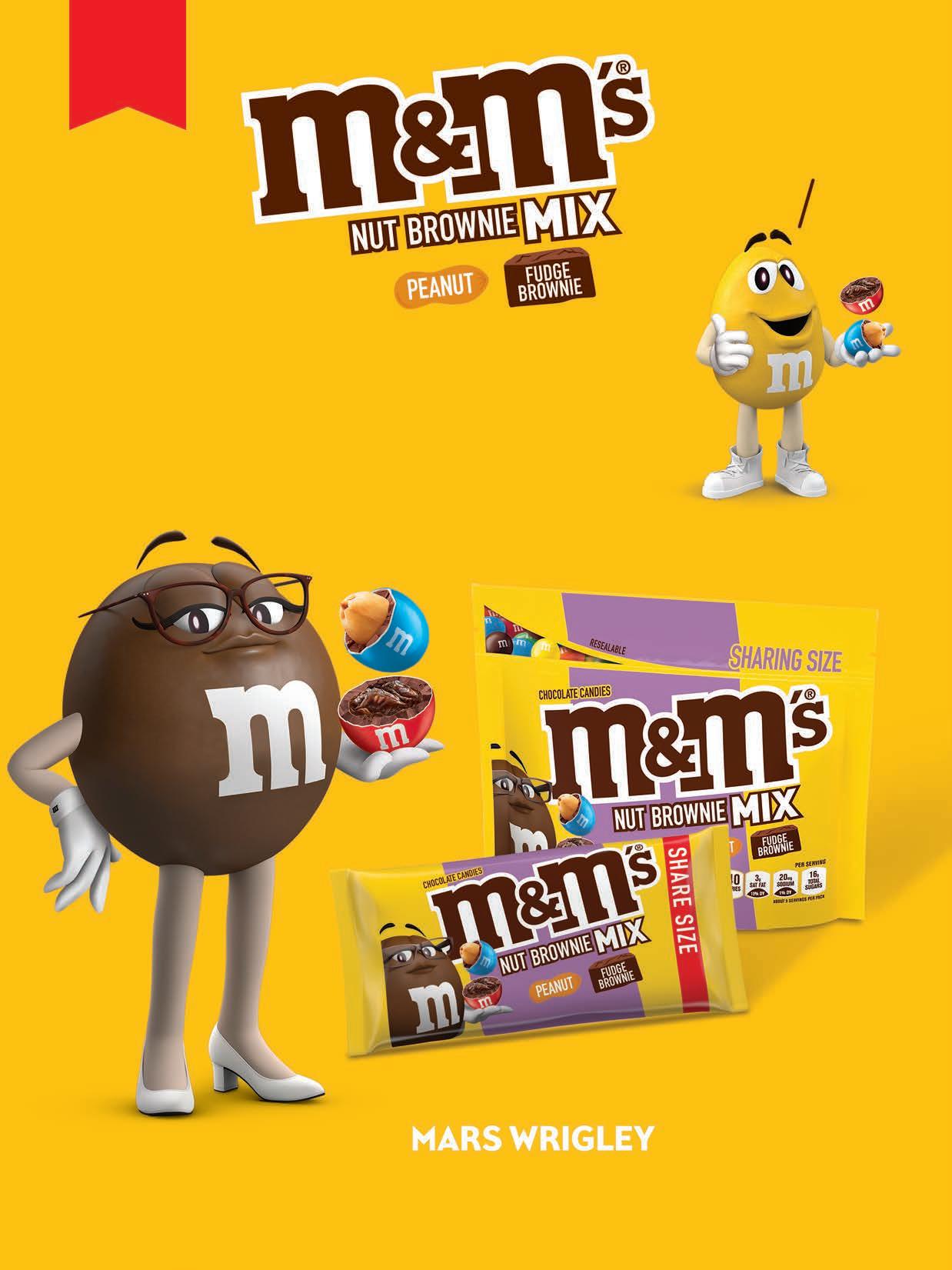
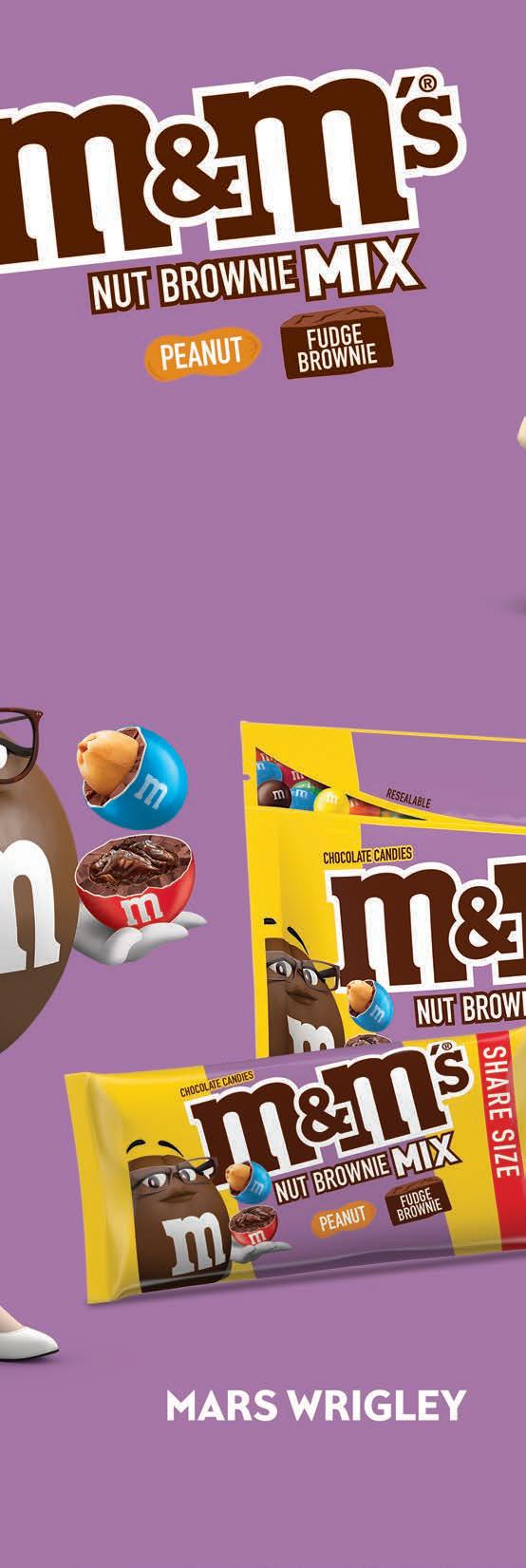






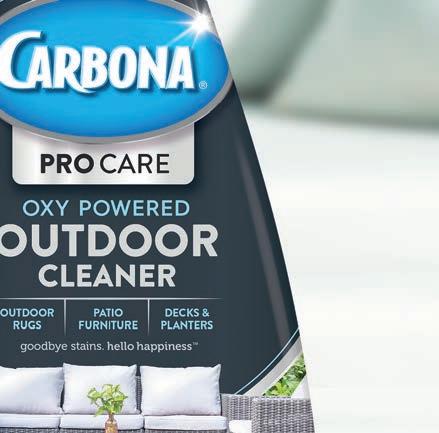









® fi 0 Y S 40,000 K 40,000 PEOPLE CARBONAVOTED®#1 ® fi fi fi fi x ™ fi fi fi fi fi fi fi LIFEUNSTAINED™www.carbona.com © 2021 Delta Carbona, L.P.
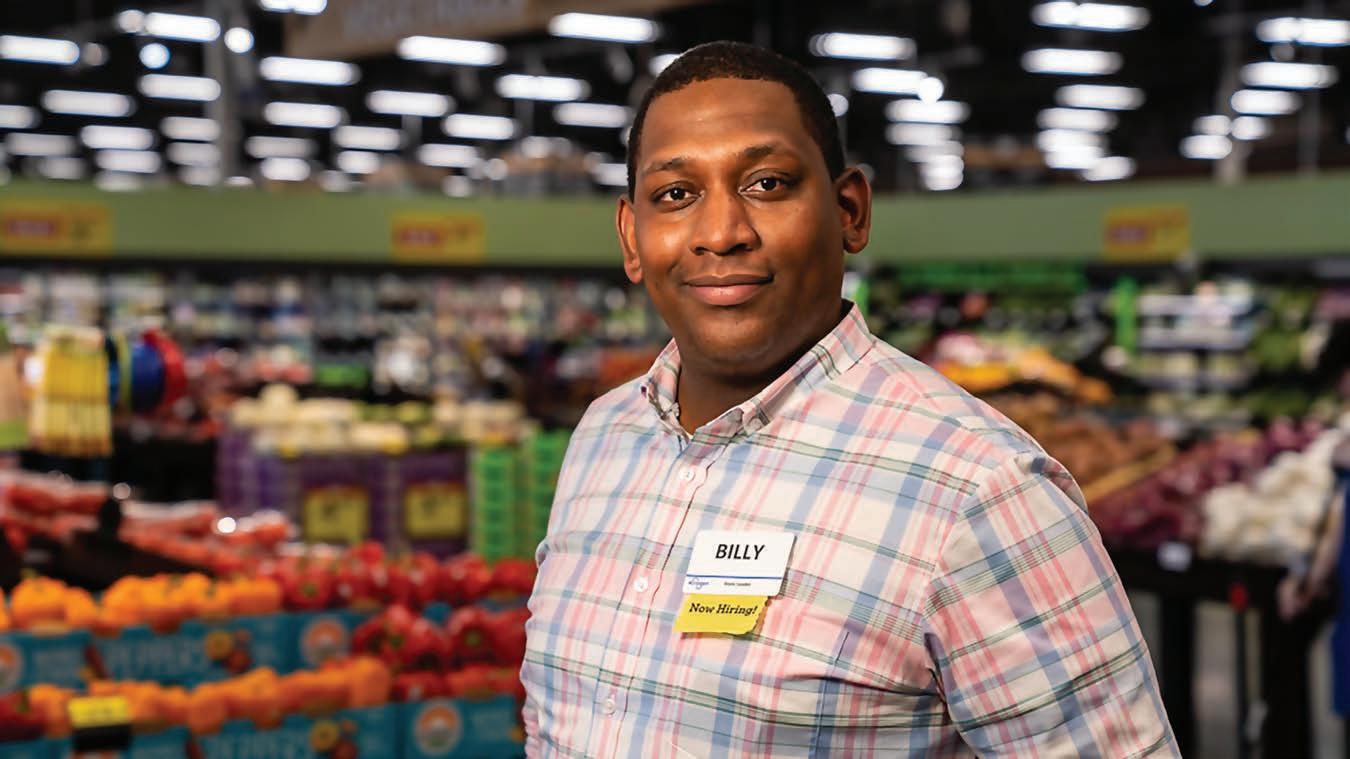
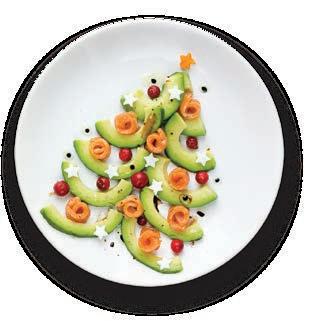
ContentsFeatures09.22 VolumeIssue1019 13 MINTEL GLOBAL NEW PRODUCTS Potato and Tortilla Chips Departments 14 ALL’S WELLNESS Healthy Holiday Eating on a Budget 16 UPWARD Lessons in Leadership 122 AHEAD OF WHAT’S NEXT Taste Maker 8 EDITOR’S NOTE Remember Isom 10 IN-STORE EVENTS CALENDAR November 2022 12 NIELSEN’S SHELF STOPPERS General Merchandise 4 progressivegrocer.com COVER STORY 78 Bright Futures Progressive Grocer’s 2022 GenNext Awards go to those younger members of the grocery industry who will determine its direction for years to come. 78 14 18 FEATURE The Ascendancy of Ahold Delhaize The mega-chain is gaining momemtum through omnichannel, private brands and sustainability. 30 SPECIAL REPORT A Journey Worth Taking With a number of retailers making significant progress on the path toward a net-zero future, PG takes a look at their top sustainability initiatives. 2022 TheBillyAwardGenNextwinner:MiltonKrogerCo.
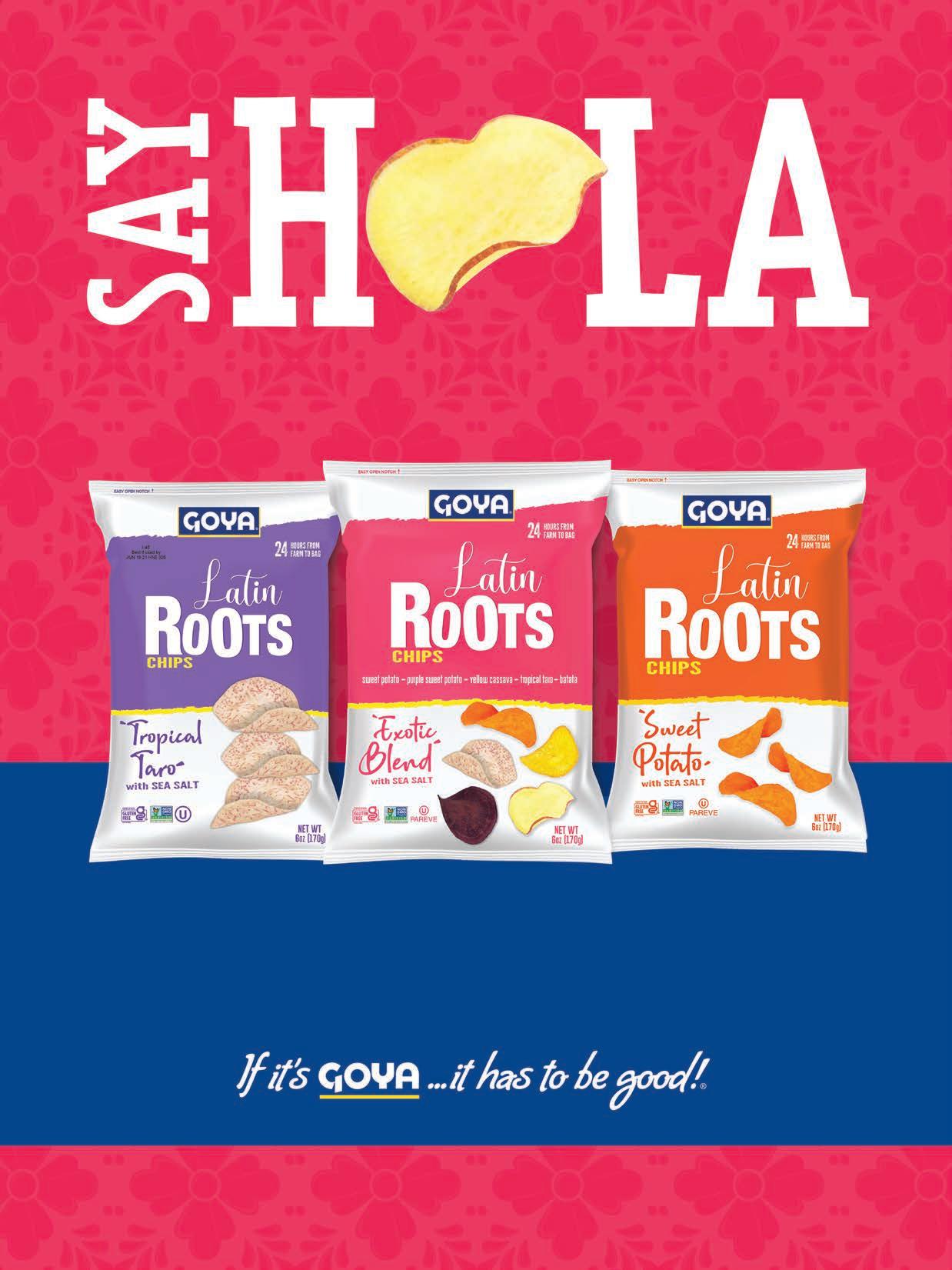
Contact your GOYA representative or email salesinfo@goya.com | GoyaTrade.com * Source: Mintel (2020). Plant-Based Proteins US – May 2020 ©2022 Goya Foods, Inc. Plant based foods are hotter than ever*. That’s why now is the perfect time to stock NEW GOYA® Latin Roots plant-based chips! They’re made from delicious root vegetables to deliver an unforgettable taste experience that will keep your shoppers coming back for more. Crafted with the same authenticity that only comes from the Latin food brand, GOYA® Latin Roots are perfect for shoppers looking for a unique snacking experience. TO OUR DELICIOUS LATIN ROOT CHIPS
The Design Categories Grocery a
8550 W. Bryn Mawr Ave. Ste. 200, Chicago, IL 60631 Phone: 773-992-4450 Fax: 773-992-4455 www.ensembleiq.com
GROCERY GROUP PUBLISHER John Schrei 248-613-8672 jschrei@ensembleiq.com
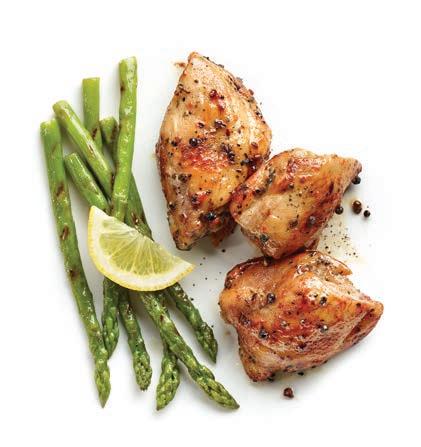
EDITORIAL EDITOR-IN-CHIEF Gina Acosta 813-417-4149 gacosta@ensembleiq.com
MANAGING EDITOR Bridget Goldschmidt 347-962-9395 bgoldschmidt@ensembleiq.com
SENIOR DIGITAL & TECHNOLOGY EDITOR Marian Zboraj 773-992-4405 mzboraj@ensembleiq.com
SENIOR EDITOR Lynn Petrak 708-945-0415 lpetrak@ensembleiq.com
MULTIMEDIA EDITOR Emily Crowe 502-550-5082 ecrowe@ensembleiq.com
CONTRIBUTING EDITORS Steven Duffy and Jenny McTaggart
ADVERTISING SALES & BUSINESS

ASSOCIATE PUBLISHER, REGIONAL SALES MANAGER (INTERNATIONAL, SOUTHWEST, MI) Tammy Rokowski 248-514-9500 trokowski@ensembleiq.com
SENIOR SALES MANAGER Bob Baker (NEW ENGLAND, MID-ATLANTIC SOUTHEAST US, EASTERN CANADA) 732-429-2080 rbaker@ensembleiq.com
SENIOR SALES MANAGER Theresa Kossack (MIDWEST, GA, FL) 214-226-6468 tkossack@ensembleiq.com
BUSINESS DEVELOPMENT MANAGER-GROCERY GROUP Lou Meszoros 203-610-2807 lmeszoros@ensembleiq.com
ACCOUNT EXECUTIVE/CLASSIFIED ADVERTISING Terry Kanganis 201-855-7615 • Fax: tkanganis@ensembleiq.com201-855-7373
CLASSIFIED PRODUCTION MANAGER Mary Beth Medley 856-809-0050 marybeth@marybethmedley.com
EVENTS VICE PRESIDENT, EVENTS Michael Cronin mcronin@ensembleiq.com
VICE PRESIDENT, EVENTS & CONFERENCES Megan Judkins 773-837-7595 mjudkins@ensembleiq.com
MARKETING BRAND MARKETING MANAGER Rebecca Welsby 773-992-4407 rwelsby@ensembleiq.com
AUDIENCE LIST RENTAL MeritDirect Marie Briganti 914-309-3378
SUBSCRIBER SERVICES/SINGLE-COPY PURCHASES Toll Free: 1-877-687-7321 Fax: contact@progressivegrocer.com1-888-520-3608
PROJECT MANAGEMENT/PRODUCTION/ART CREATIVE DIRECTOR Colette Magliaro cmagliaro@ensembleiq.com
ADVERTISING/PRODUCTION MANAGER Jackie Batson 224-632-8183 jbatson@ensembleiq.com
ART DIRECTOR Bill Antkowiak bantkowiak@ensembleiq.com
REPRINTS, PERMISSIONS AND LICENSING Wright’s Media ensembleiq@wrightsmedia.com 877-652-5295
CORPORATE OFFICERS
PROGRESSIVE GROCER (ISSN 0033-0787, USPS 920-600) is published monthly by EnsembleIQ, 8550 W. Bryn Mawr Ave. Ste. 200, Chicago, IL 60631. Single copy price $14, except selected special issues. Foreign single copy price $16, except selected special issues. Subscription: $125 a year; $230 for a two year supscription; Canada/Mexico $150 for a one year supscription; $270 for a two year supscription (Canada Post Publications Mail Agreement No. 40031729. Foreign $170 a one year supscrption; $325 for a two year supscription (call for air mail rates). Digital Subscription: $87 one year supscription; $161 two year supscription. Periodicals postage paid at Chicago, IL 60631 and additional mailing offices. Printed in USA. POSTMASTER: Send all address changes to brand, 8550 W. Bryn Mawr Ave. Ste. 200, Chicago, IL 60631. Copyright ©2022 EnsembleIQ All rights reserved, including the rights to reproduce in whole or in part. All letters to the editors of this magazine will be treated as having been submitted for publication. The magazine reserves the right to edit and abridge them. The publication is available in microform from University Microfilms International, 300 North Zeeb Road, Ann Arbor, MI 48106. The contents of this not be reproduced in whole or in part without the consent of the publisher. The publisher is not responsible for product claims and representations. Bets and Ethical to In Up EQUIPMENT & DESIGN
CHIEF EXECUTIVE OFFICER Jennifer Litterick CHIEF FINANCIAL OFFICER Jane Volland CHIEF HUMAN RESOURCES OFFICER Ann Jadown EXECUTIVE VICE PRESIDENT, CONTENT Joe Territo EXECUTIVE VICE PRESIDENT, OPERATIONS Derek Estey
publication may
Contents09.22 VolumeIssue1019 6 progressivegrocer.com 1005252 PROGRESSIVE GROCER’S 2022 EDITORS’ PICKS Best
The annual program unearthed many products worthy of retailer and consumer attention. 100 SOLUTIONS Shoppers Flocking to ChickenPoultryandturkey offer different forms of value for today’s mindful consumers. 105 CPG PROFILE Flavorful
Vanilla supplier Lafaza Foods’ three-pronged approach to sustainability is focused on forests, farmers and flavor. 108 CENTER STORE Cheers
Drinking
Better-for-you and high-ABV options in beer, hard cider and seltzers are gaining traction among consumers. 113 TECHNOLOGY Leveling
Today’s shelf-edge technology solutions address experience, data, retail media and more. 118
Shaping
These key trend types offer
path forward for grocers and consumers. 108





 By Gina Acosta
By Gina Acosta
Remember Isom
IN EASTERN KENTUCKY, AN INDEPENDENT GROCER TRIES TO REBUILD A COMMUNITY
wen Christon is a rarity in the grocery industry.TheAfrican American owner of the Isom IGA grocery store, in Isom, Ky., Christon started working at the store as a cashier shortly after it opened in 1973. Twenty-five years later, she bought the store, which is the only full-service gro cer in the area for 20 miles.
Over the years, Christon shaped the store into a gathering place for the community. She made investments in the store, such as replacing refrigerated cases, installing self-checkout lanes and adding e-commerce solutions. In 2007, she was even named IGA International Retailer of the Year.

“What makes her unique is not only that she is a female-led busi ness in grocery, but she’s African American also,” says John Ross, CEO of Chicago-based IGA. “She’s become a fixture and a leader in her community in a way that no one would’ve expected, probably least of which her. And she’s had spectacular success.”
But this past July 28, everything changed for Christon and the entire Isom community.
A once-in-a-thousand-years flooding event ravaged the community of 1,500 people in coal mining country, about 20 miles west of the Virginia state line. There’s been a lot of flooding news this summer, with historic floods in Arizona, Tex as and other states. But in eastern Kentucky, floods swept away entire communities, including Christon’s store. More than 6 feet of water and mud destroyed everything. Now, a critical part of keeping that commu nity alive is gone, Ross notes.
When disaster struck Christon’s store, however, IGA was in immedi ate contact with her licensed distrib utor, MDI, on marshaling resources to help her, according to Ross.
“There were daily calls about what we could do to support her,” he says. “The interesting thing about her is that it’s a relatively small store serving an economically challenged re gion, and yet she’s one of our most innovative retailers. She’s not afraid to invest in new technology. There’s a lot of people that could have sat back during COVID and not reinvested in their stores because business was booming. She did exactly the opposite. She’s been continuously re investing in her store. She’s the only store in town, but it’s a great store and a great shopping experience. The loyalty happening in the commu nity right now is coming because her customers recognize that.”
The community has indeed come together to raise money for rebuilding efforts, which Ross estimates will cost at least $2 million. People from all over Letcher County, the state and the coun try have been donating money to a Go FundMe page. The IGA Foundation is also raising money for Isom IGA.
The rallying around Gwen Chris ton and her grocery store, which has a sign out front that says “Hometown Proud,” is a reminder that independent grocers really are the heart of commu nities across this great country. With out Christon’s store, Isom, Ky., is not just a food desert — it’s also a commu nity without community. Independent grocers offer better connections to lo cally grown food, to locally supplied food and fresh products, and to more specialized customer service. They also foster community connections among residents that are irreplaceable.
Now more than ever — amid pan demics, extreme weather events, and economic hardship due to inflation — indie grocers need the industry’s sup port. If you would like to donate to the Isom IGA rebuilding efforts, please go to flooding.help-isom-iga-rebuild-after-historic-https://www.gofundme.com/f/
Gina Acosta gacosta@ensemleiq.comEditor-In-Chief
8 progressivegrocer.com EDITOR’S NOTE
Now more than ever — support.need—dueeconomicweatherpandemics,amidextremeevents,andhardshiptoinflationindiegrocerstheindustry’s
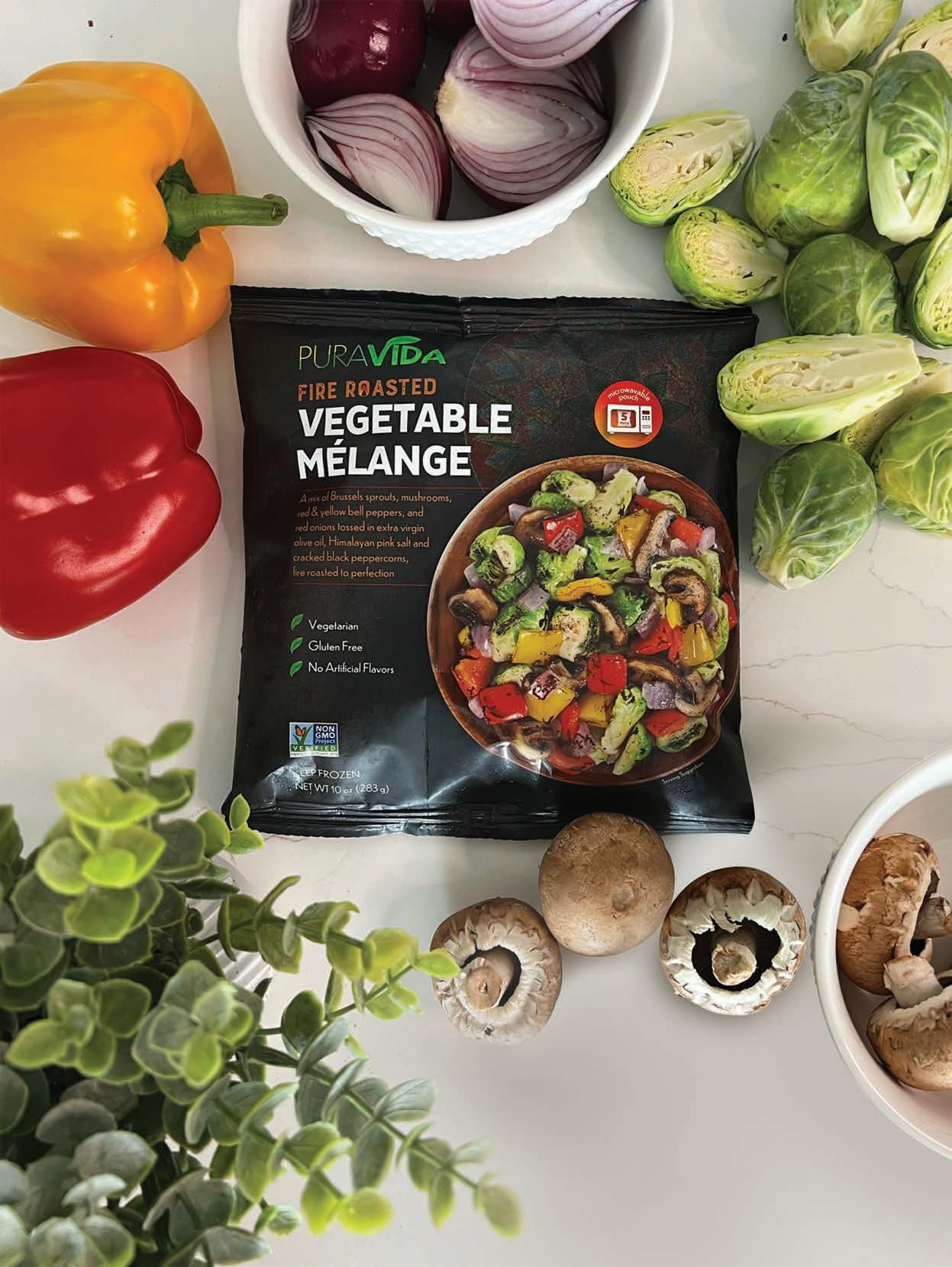
Banana Pudding Lovers Month

Gluten-Free Diet Awareness Month
National Diabetes Month
National Fun With Fondue Month
National Native American Heritage Month

National Peanut Butter Lovers Month
National Pepper Month
Daylight6 Saving Time ends. Now we fall back once more to Standard Time.

Marie7 (1867).BirthdayCurie’s Honor this adoptedbirthplaceandfromspotlightingheritagescientist’strailblazingdualbydishesPolandFrance,herandhomeland.
National13 Pupusa Day. Provide a recipe for this national dish of El Salvador — tortillas stuffed with meat, cheese or refried beans.
World14 Diabetes Day. Make shoppers aware all of the resources — condition.livingstore(s)availableconsultationsitems,health-and-wellnessfoods,pharmacy—atyourforpeoplewiththis
Extra1 Mile Day. Salute all of your associates who go above and beyond every day for customers and co-workers alike. Day2 of the Dead. Observe this Mexican belovedAmericansintroducedholidaytomanyinthefilm“Coco.”
StoutInternational3Day.
Sláinte! Roast4 Dinner Day. Tell customers to think of it as practice for the big feast later this month.
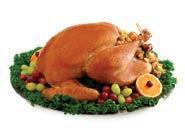


National5 Chinese Takeout Day. Direct shoppers to the delicious Asianinspired selections among preparedyourfoods.
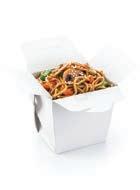
Cook8 Something Bold and Pungent Day. May we suggest kimchi?

LouisianaNational9 Day. Promote ofdistinctivethecuisinesthePelicanState.
Sesame10 Street Day. In honor of this children’s television stalwart, showcase all boastingproductsits familiar characters.

Veterans11 Day. Pay tribute to all of those who have served our country in the armed forces, especially in times of war.


National12 Happy Hour Day. Offer online instructions for cocktails to mark the occasion in style.

National20 Peanut Butter Fudge Day. Ask customers for their sure-fire recipes to make this indulgent treat.


Advent27

Begins. Make sure that you’re well stocked with calendars.
National15 Clean Out Your Fridge Day. Depending on how big a job it is, productscleaningmaybe in order – and remind shoppers to replace the baking soda.
National16 Indiana Day. Put foods and beverages from the Hoosier State front and center.

National17 Hiking Day. Call out trail mixes, jerky and other handy snacks for a day enjoying nature.

Mickey18 BirthdayMouse’s(1928).
It’s also powerultimatehomagebirthday,Minnie’ssopaytotheDisneycouple.

National19 Adoption Day. Profile your associates and customers who have embarked on this rewarding journey, both as parents and children.
CookieGingerbreadNational21Day.

Now’s the time to start baking these seasonal staples. Love22 FrecklesYourDay.
protectshoppersEncouragetotheir skin, regardless of these usually harmless spots from sun exposure.
National23 Cashew Day. These tasty nuts are low in sugar and high in fiber, heartheathy fats and plant protein, so a handful serves as a nutritious anytime snack.

Thanksgiving.24
Remember to have all of the shoppingforessentialsholidayonhandlast-minuteruns.
Flossing25 Day. Point shoppers to the oral care aisle for an teethnecessitydisplayinformativefeaturingthisforstrongandgums.
National26 Cake Day. Your in-store bakery is goods.popularforappropriatethesettingtheseperenniallybaked
Red28 Planet Day. Perhaps the perfect time to highlight Mars products?

Throw29 Out Your Leftovers Day. Anything that’s rotting needs to go.

National30 Mason Jar Day. Find out from shoppers their preferred uses for these containers.time-honored


S M T W T F S IN-STORE EVENTS Calendar 11.22 10 progressivegrocer.com
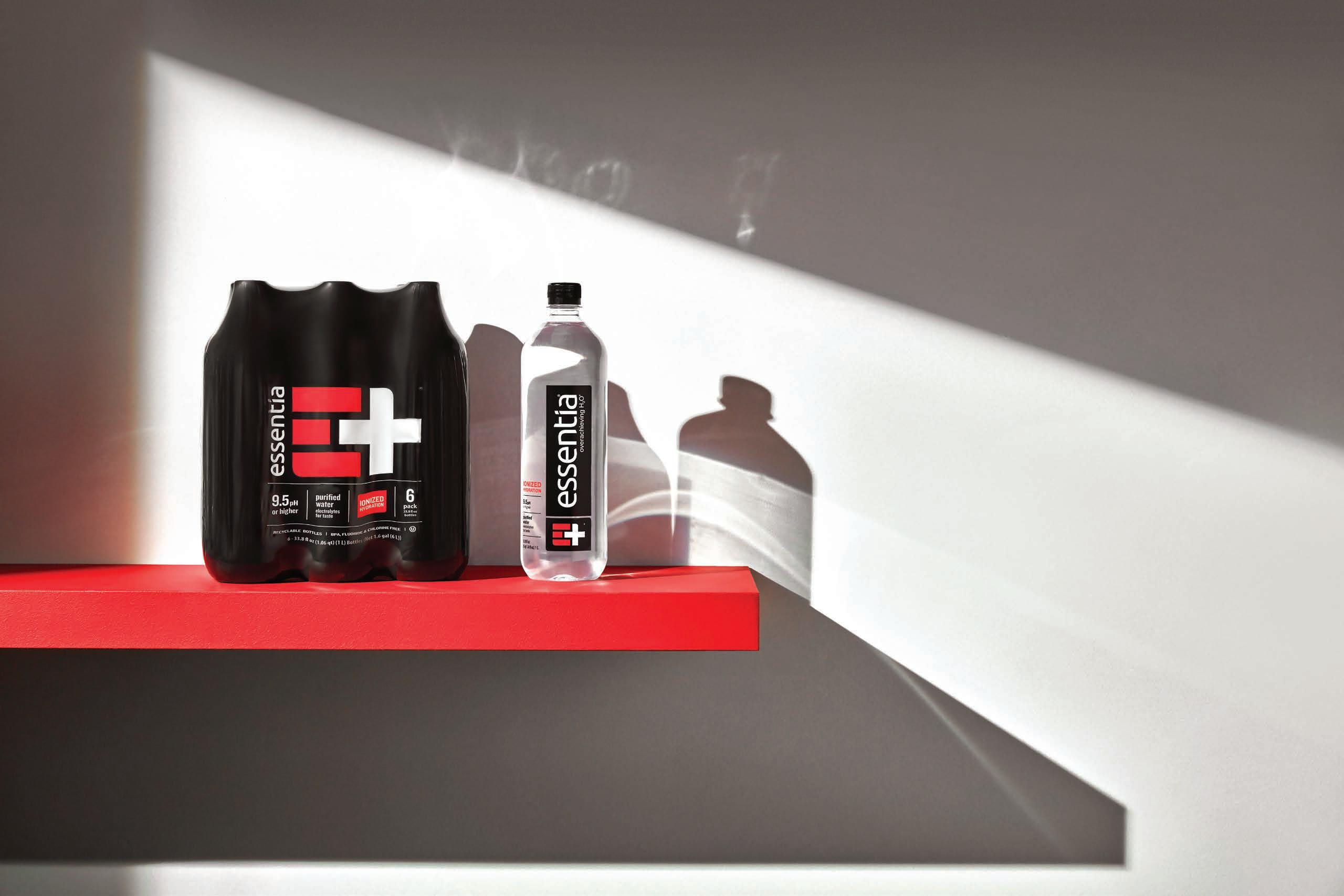
SUPERCHARGEYOURPROFITS #1 Alkaline Water* #1 Still Water, Total US in Natural* #1 Premium Water 1L Multipack in Total Universe* #1 Premium Water Velocity Brand, Total US in Food, Natural, Convenience and MULO* sales@essentiawater.com | 877.293.2239 | essentiawater.com *Source: IRI/SPINS/WFM L52 WKS Period Ending 3/20/22 with the #1 alkaline water*
12 progressivegrocer.com FRONT END Shelf Stoppers General Merchandise Latest 52 WksW/E 07/30/22 Latest 52 WksW/E 07/30/22 Latest 52 Wks YAW/E 07/31/21 Latest 52 Wks YAW/E 07/31/21 Latest 52 Wks YAW/E Latest08/01/2052WksYAW/E 08/01/20 BasketFacts How much is the average productsonspendinghouseholdAmericanpertripvariousgeneralmerchandiseversustheyear-agoperiod? Source: Nielsen, Total U.S. (All outlets combined) — includes grocery stores, drug stores, mass merchandisers, select dollar stores, select warehouse clubs and military commissaries (DeCA) for the 52 weeks ending July 30, 2022 Source: Nielsen Homescan, Total U.S., 52 weeks ending July 2, 2022 Kitchen Appliances Home Appliances Household Storage Batteries Utensils and Accessories Total Department Performance Top General Merchandise Categories by Dollar Sales $49,116,685,372 $49,660,625,909 $47,815,657,254MerchandiseGeneral Generational Snapshot Which cohort is spending, on average, the most per trip on pens? $9.96Millennials Gen $9.84Xers $7.93Boomers The Greatest$7.20Generation Source: Nielsen Homescan, Total U.S., 52 weeks ending July 2, 2022 $16.85 on all general merchandise items, up 3.5% compared with a year ago $12.06 on batteries, up 8.9% compared with a year ago $21.46 on cellular phone accessories, up 31.4% compared with a year ago $11.61 on light bulbs, down 0.3% compared with a year ago Cross-Merch Candidates DiaperingNeeds CombosMeal Snack and Variety PacksFruit Snacks PastriesToaster Wraps and Tortilla Shells Writing Tools and SuppliesCookedFullyMeat Feminine Care Deodorant $5,000,000,0004,000,000,0003,000,000,0002,000,000,0001,000,000,0000
Potato and Tortilla Chips
Market Overview
Consumption of potato and tortilla chips is nearly universal, and the category saw an 8% increase in 2020. The next year saw sales correct, and by 2023, consumers are expected to resume their pre-pandemic pace of slow but steady growth, fueled by interest in on-the-go snacking options and chips that can offer flavors that attune to consumers’ sense of the familiar.


Nearly six in 10 American consumers reported eating regular plain potato chips in the past few months.
Half of U.S. consumers are interested in trying potato chips cooked in healthier oils.


Despite the 8% sales growth for potato and tortilla chips noted above, consumer usage occasions for the category’s offerings remained consistent: potato chips primarily at lunch, and tortilla chips mostly with dinner.
Key Issues
as an indulgence with little nutritional benefit. Yet, as consumers emerge from a pandemic with greater interest in their health, the chip category faces a distinct challenge, one that it’s already begun to meet with baked and popped options, but to which consumers would like to add healthier oils and ingredients, and functional attributes.
A return to dining out may negatively affect chips, but not to the same degree as other CPG foods, simply because potato chips are so associated with the lunch occasion as opposed to dinner.
With finances tight, consumers’ definition of “affordable” is altered, and they’ll seek to stretch their food dollar and want to make sure that the products they purchase remain “fresh” for as long as possible before going to waste.
What Want,ConsumersandWhy
Despite the 8% sales growth for potato and tortilla chips noted above, consumer usage occasions for the category’s offerings remained consistent: potato mostlyandprimarilychipsatlunch,tortillachipswithdinner.
regionallyavailablecouldtheflavorstoflavors.aconsumerstermspushhasofconsumerssinglehealthiercanartificialclaims,useyoungerparticularlyhealthieringredientsthatgenerallyConsumersbelievenaturalmakeforachip,asentimentstrongamongconsumers.Theofnatural-adjacentsuchas“freefromingredients,”conveyasenseofaoption.Smallerpackagesizesforon-the-goeating,aswellasservings,wouldhelpmeettheirgoallimitingsnacks.Muchofthecategory’sfocusinrecentyearsbeenonflavorsthattheboundariesinofspiciness,yetstronglyindicatepreferenceforfamiliarThisdoesn’thavemeanstandardchipareathingofpast,however,andincludebroadeningoptionswithmorespecificflavors.
PROGRESSIVE GROCER September 2022 13 MINTEL CATEGORY INSIGHTS Global New Products Database
FOR MORE INFORMATION, VISIT WWW.MINTEL.COM OR CALL 800-932-0400
By Karen Buch, RDN, LDN
Healthy Holiday Eating on a Budget
RETAIL DIETITIANS CAN HELP DIFFERENTIATE AND CONTRIBUTE TO CUSTOMER RETENTION THIS HOLIDAY SEASON.
n 2022, grocery inflation reached its highest point since 1979. Nearly one-quarter (23.6%) of U.S. households say that they don’t have spare cash. Americans are feeling the pinch of rising food prices, soaring fuel costs and the looming threat of recession. Inevitably, budget-conscious shoppers will need help balancing the cost of holiday gift-giving with the cost of holiday eating and entertaining this holiday season.
Less Impulse Buying
When budgets tighten, impulse buying is one of the first con sumer behaviors to change. More than 70% of consumers re port being less likely to grab an unplanned treat while grocery shopping. Increasingly, cash-strapped consumers will choose online shopping with delivery to reduce the temptation to buy impulse items, while eliminating the related fuel costs of in-store shopping. In fact, 63% of consumers plan to do some or all meal planning digitally. Retailers can use e-blasts featuring discounts and links to digital coupons, along with social media posts, to entice consum ers to add deserving items to their holiday shopping lists. They don’t have to be complex: Consumers often search online for basic holiday recipe favorites, including green bean casserole, mashed potatoes, cookies and appetizers.
Trading Down
“Trading down” means different things to different shoppers. For example, some may swap traditional holiday fresh fruits and vegetables for smaller quantities of produce varieties that are on sale. Others may trade down altogether from fresh produce to less expensive frozen or canned pri vate-brand options. Some may also trade down when it comes to meats and seafood, closely comparing frozen and fresh departments in search of bargain pricing. July purchasing data reflects an inflation rate jump of 28% in the frozen meat category. Therefore, the fresh case may still be the best place to bargain shop. Suggest holiday recipes featuring budget-friendly pork tenderloin and roasts, beef strip loin and sirloin, and case-ready selec tions in place of more costly cuts like prime rib and filet mignon.
Diluting Share of Wallet
As financial optimism and the purchasing power of the dollar drop, so can customer loyalty. Memberships to warehouse/club stores become more attractive to value shoppers, prompting traditional grocery retailers to lose some share of wallet to discount and big-box retailers. Consumers will also turn to online shopping and digital price checking to get the best deals. Re tailers need to stay connected with their shopper base and offer affordable holiday meal solutions, both in-store and online.
Differentiate During the Holidays
Retail dietitians can help differentiate and contribute to customer retention by offering budget-friendly holiday menu ideas, and tips on how to stretch food dollars, reduce food waste and gain the best nutrition out of their spend.
Demonstrate ways to save on holiday menu favorites. Create holiday recipes using food brands featured on discount promotions, in combination with private-brand ingredients that help decrease price per portion. Align in-store displays and cross-merchandising with holiday meal deals to position your stores as affordable, one-stop destinations for healthy holiday shopping.
Help ReinventConsumersPartyFoods
Show customers how to make the most of leftover holiday entertaining menu items by first storing them at proper temperatures, and then using them as creative secondary meals. Save raw veggie tray leftovers to use as soup starters or steamed veggie side dishes. Offer recipes to use today’s fruit tray as tomorrow’s breakfast smoothies. Serving a holiday shrimp tray on ice? Rein vent the remainder as a hearty shrimp-andfrozen-corn chowder. Have leftover beef steak? Get creative by making steak-andpepper fajitas or steak-and-egg omelets.
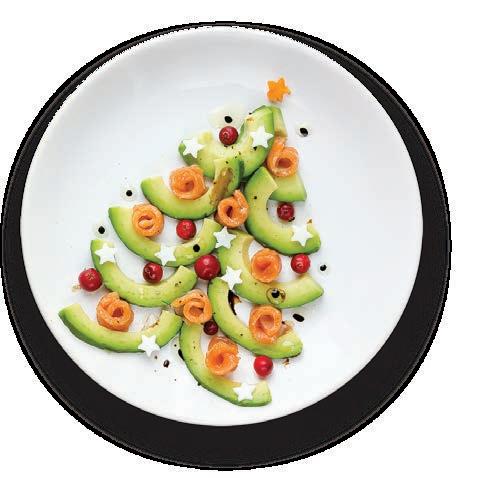
One of the best ways that consumers can save holiday food dollars is to ensure that healthy foods purchased are eaten, rather than landing in the waste bin.
Karen Buch, RDN, LDN, is a registered dietitian/nutritionist who specializes in retail dietetics and food and culinary nutrition communications. One of the first supermarket dietitians, she is now founder and principal consultant at Nutrition Connections LLC, providing consulting services nationwide. You can connect with her on Twitter @karenbuch and at NutritionConnectionsLLC.com.
Align in-store displays and crossmerchandising with holiday meal deals to position your stores as affordable one-stop destinations for healthy holiday shopping.
14 progressivegrocer.com ALL’S WELLNESS
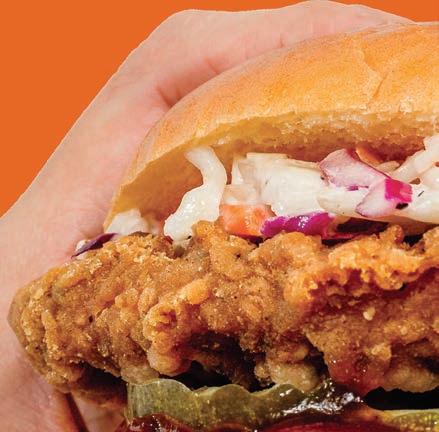
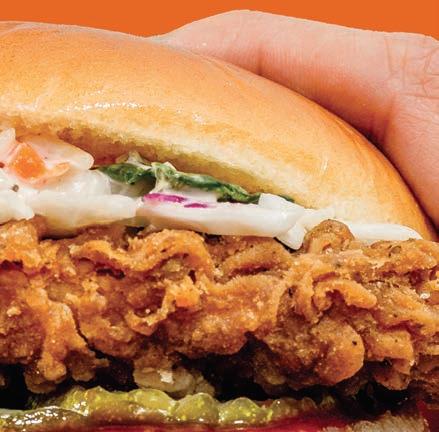






UP GRABS! L NT- OWE ED & L NT- ED THE ONLY To schedule a cutting, contact Tim White at (513) 227-0730, or at timw@gwfg.com. You won’t believe how much it tastes like actual chicken! Visit SkinnyButcher.com/TradePartners for more info.
By Angelina Bice
Ida Liu, global head of Citi Private Bank, also spoke at the event, introducing attend ees to the concept of the “DQ,” or “Decen cy Quotient.” Liu characterized this as how we show up for each other with kindness and respect, and how we collaborate. “By being kind, we are able to collaborate bet FORUM PROVIDED OF AND TAKEAWAYS FOR WOMEN IN THE WORKPLACE.
extUp recently held its annual Executive Forum conference, where the organiza tion brings together c-suite executives and cutting-edge thinkers for three days of connection, learning and develop ment toward its goal of Advancing All Women in Business. The incredible speakers brought some serious knowl edge to the table, from diversity at work to the value of taking risks. The 2022 fo rum took place Aug. 2-4 at the Terranea Resort, in Rancho Palos Verdes, Calif.
During the conference, Priscilla Tuan, chief marketing officer and executive leadership team member at Sovos Brands, made the salient point that “main taining transparency and tapping into our humanity is the only path forward” for business leaders. In the same session, Michael Del Pozzo, president and general manager, Gatorade performance portfolio at PepsiCo Beverages
North America, noted that being inten tional and modeling how a modern leader leads is key to building strong teams in 2022. Taking walk-and-talks to check in, no matter your level of seniority, and visibly leaving the office to spend time with family normalizes this behavior for staff and encourages authentic leadership.

“By being kind, we are able to collaborate better, and this builds our resilience and our grit.”
—Ida Liu, Citi Private Bank
Researcher, writer and entrepreneur Anna Gifty OpokuAgyeman (left) appreared onstage at NextUp’s Executive Forum 2022.
16 progressivegrocer.com UPWARD
Lessons Leadershipin NEXTUP’S 2022 EXECUTIVE
PLENTY
LEARNINGS
ter, and this builds our resilience and our grit,” she observed.
Author, speaker and researcher Tamara Myles taught attendees that driving retention through meaningful work is the path forward. “Work is not ornamental to our well-being — it’s fundamental,” said Myles, who also pointed out that executives must “keep the 90/10 rule in mind: High-potential employees are 10% of your
team, and 90% are an opportunity for development.” The closing keynote came from Mike Walsh, CEO of Tomorrow and a noted futurist. To Walsh, “Culture is your organization’s true operating system.” He ad vised leaders to design a distributed decision-making environment, because highly centralized organizations “will not survive crisis. Autonomy is essential.”
All in all, it was a jam-packed three days of learning, and we couldn’t be more thrilled to have been joined by so many leaders in California this year. If you’re interested in hearing from amazing speakers like this firsthand, NextUp’s next conference, the Leadership Summit, will take place Oct. 19-21. Visit nextupisnow. org/events/summit to learn more.
Angelina Bice is copywriter and content strategist at NextUp, a 501c3 nonprofit dedicated to Advancing All Women. NextUp has more than 15,000 members, 21 regions, and 300-plus national corporate partners and regional sponsors committed to transforming workplaces for gender equity.
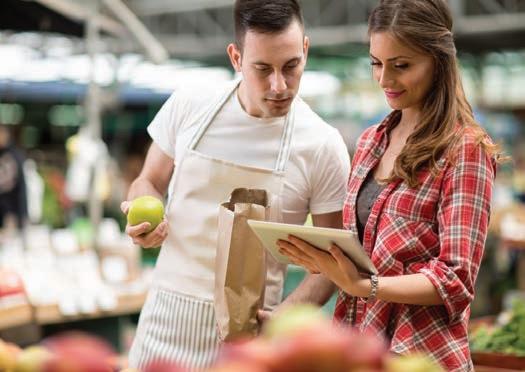


 Ida Liu, global head of private banking at Citibank (right), spoke with NextUp’s Sarah Alter at the annual event.
Ida Liu, global head of private banking at Citibank (right), spoke with NextUp’s Sarah Alter at the annual event.
•Retail Pricing •Shelf •Store•Payments•Retail•Store•Consumer•RetailManagementMarketingServicesOperationsTechnologyDesign&Equipment UNFI offers a comprehensive suite of retail services, including: Professional Services Contact us: PSsales@UNFI.com | Services.UNFI.com
Retailer Deep Dive
The grocery industry was abuzz with excitement last month as rumors swirled that Ahold Delhaize was in talks with the Albertsons Cos. on a merger. Whether the rumors are true, Ahold Delhaize CEO Frans Muller has repeatedly hinted that the company thinks that there’s an opportunity for growth in the grocery industry, due to the accelerating pace of consolidation, especially in the United States.
“The whole market will continue to consolidate,” Muller said at IEX Investors Day in Amsterdam in July.
At a Giant Co. store in Philadelphia, Ahold Delhaize showcases its customer value proposition by offering customers healthy, quality and delicious choices in all departments, but especially in the perimeter with fresh. The company has also been adding more plantbased choices, and some of its stores even have nutritionists on hand to guide consumers who are new to the vegan lifetsyle.
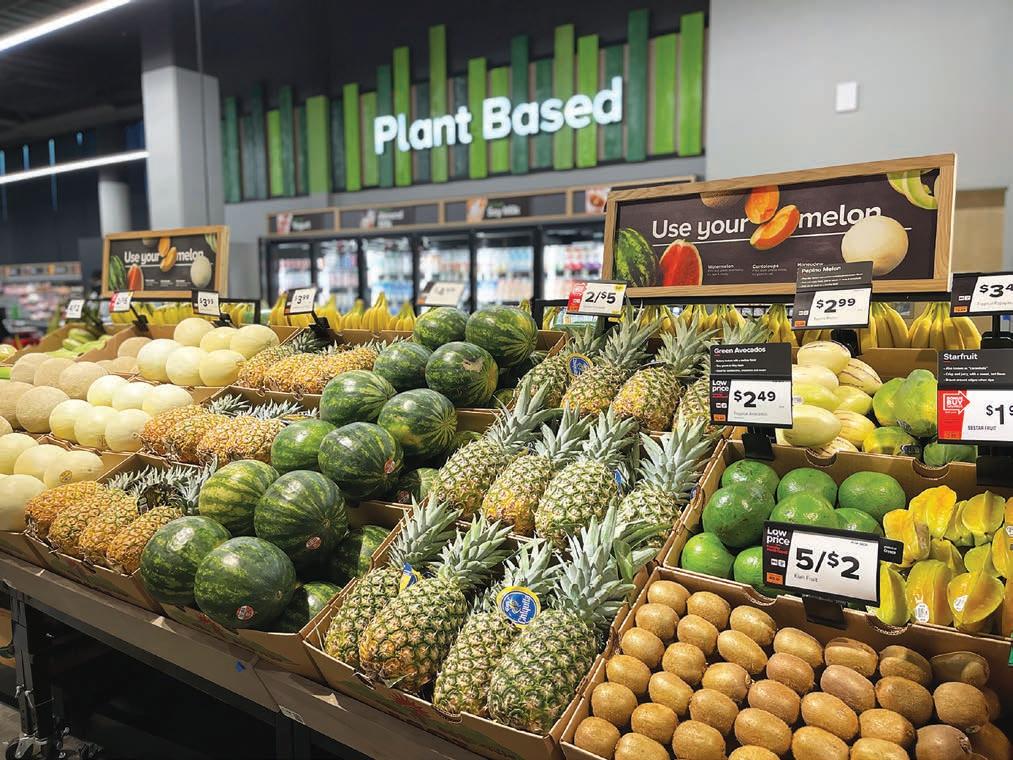
Key Takeaways
Ahold Delhaize’s Food Lion banner continues to lead brand performance.
The retail conglomerate has reached 30% private-brand penetration at a time when consumers are increasingly seeking out bargains.
It has also converted its first facility into a self-managed network, part of a three-year journey to a selfdistribution model. Gina
18 progressivegrocer.com FEATURE
DelhaizeofAscendancyTheAhold The mega-chain is gaining momentum through omnichannel, private brands and sustainability. By
Acosta
Turn Sustainability Into

With City US, you can make sustainability mandates work for you to gain a new edge — with up to 10%+ Energy Reduction and 50%+ Energy Cost Savings. From refrigeration systems to lighting and HVAC, your facilities will be inviting to customers while staying as low energy and low cost as possible. And it’s all thanks to our 360-degree suite of self-performed, Energy-led FM and Building and Engineering Solutions, from a team that’s dedicated solely to your brand.

Nationwide Leader in Grocery Facilities Management Holistic, Proactive FM, Building and Engineering, and Energy Management Solutions Global Sustainability Council Provides Best Practices from Around the World
Opportunity Learn more at www.CityFM.us
Retailer Deep Dive
“The complexity of this industry is increasing rapidly, and the smaller players are finding it difficult to make the in vestments that are needed now in sustainability, in innova tion, in digitization. Moreover, the tailwind of COVID has fallen away, making it clear who are less well positioned, so only now that consolidation is really getting underway. We have a strong balance sheet, and we are ready to seize our opportunities in the consolidation battle, both on the American East Coast and in Europe.”
In the United States, where the international retail conglomerate operates 2,048 stores, the timing of a merger announced this year would make sense.
Ahold Delhaize USA has been strengthening its position as it looks to take its hyper-local value proposition national. After blockbuster revenue years in 2020 and 2021, Ahold Delhaize has demonstrated that it can keep growing by focusing on omnichannel innovation, prioritizing value and expanding its assortment of high-quality, low-cost private-brand products.
A combined Ahold Delhaize USA and Albertsons Cos. would create the largest supermarket chain in the United States.
“Our brands are laser-focused on helping consumers manage spending by proactively highlighting savings opportunities along the customer journey,” Muller said
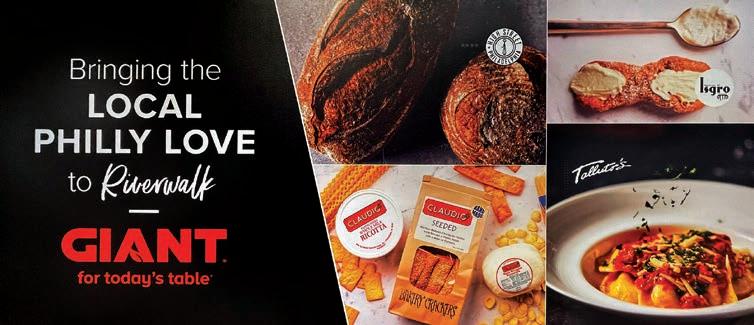
during the company’s sec ond-quarter earnings call in August. “Powered by data and insights, we do this by providing great value offers via omnichannel loyalty programs, by prioritiz ing healthy food options through Guiding Stars and Nutri-Score linked promo tions, and by expanding the assortment and availability of high-quality, low-cost Own Brand products and bulk offerings.”
A Family of Local Brands
The Zaandam, Netherlands-based operator of 7,452 stores with more than 400,000 employees came into existence in July 2016 when Dutch company Royal Ahold and Belgian firm Delhaize Group merged.
Ahold Delhaize’s U.S. business, Ahold Delhaize USA, today has a presence across the East Coast of the United States, where it operates what it likes to call “a family of great local brands,” comprising Food Lion, FreshDirect, The Giant Co., Giant Food, Hannaford, Stop & Shop Supermarket Co., Peapod Digital Labs, and Retail Business Services.
When it reported second-quarter earnings in August, the company noted group revenue of $22 billion, a 6.4% increase. According to Ahold Delhaize, revenue was driven by positive contri butions from same-store sales growth of 4.7%, foreign currency translation benefits, and, to a lesser extent, by the acquisition of DEEN super markets in the Netherlands and higher gasoline sales. Group online sales grew 4.8%.
However, the beating heart of Ahold Delhaize seems to be its U.S. business: In 2021, Ahold Del haize USA reported annual sales of $53.7 billion, up 3.6% from 2020.
When it reported Q2 earnings in August, U.S. net sales were $14.03 billion, an increase of 7.7%. U.S.
“The whole market will continue to consolidate. The complexity of this industry is increasing rapidly, and the smaller players are finding it difficult to make the investments that are needed now in sustainability, in innovation, in digitization. Moreover, the tailwind of COVID has fallen away, making it clear who are less well positioned, so only now that consolidation is really getting underway. We have a strong balance sheet, and we are ready to seize our opportunities in the consolidation battle, both on the American East Coast and in Europe.”
—Frans Muller, CEO, Ahold Delhaize
CEO Frans Muller says that Ahold's local brands provide distinct, competitive and societal advantages. On the one hand, "they allow us to successfully navigate short-term market volatility, and on the other, they provide operational bandwidth and financial stability so we can remain focused on our exciting long-term growth agenda."
20 progressivegrocer.com
FEATURE

www.enstrom.com
Retailer Deep Dive
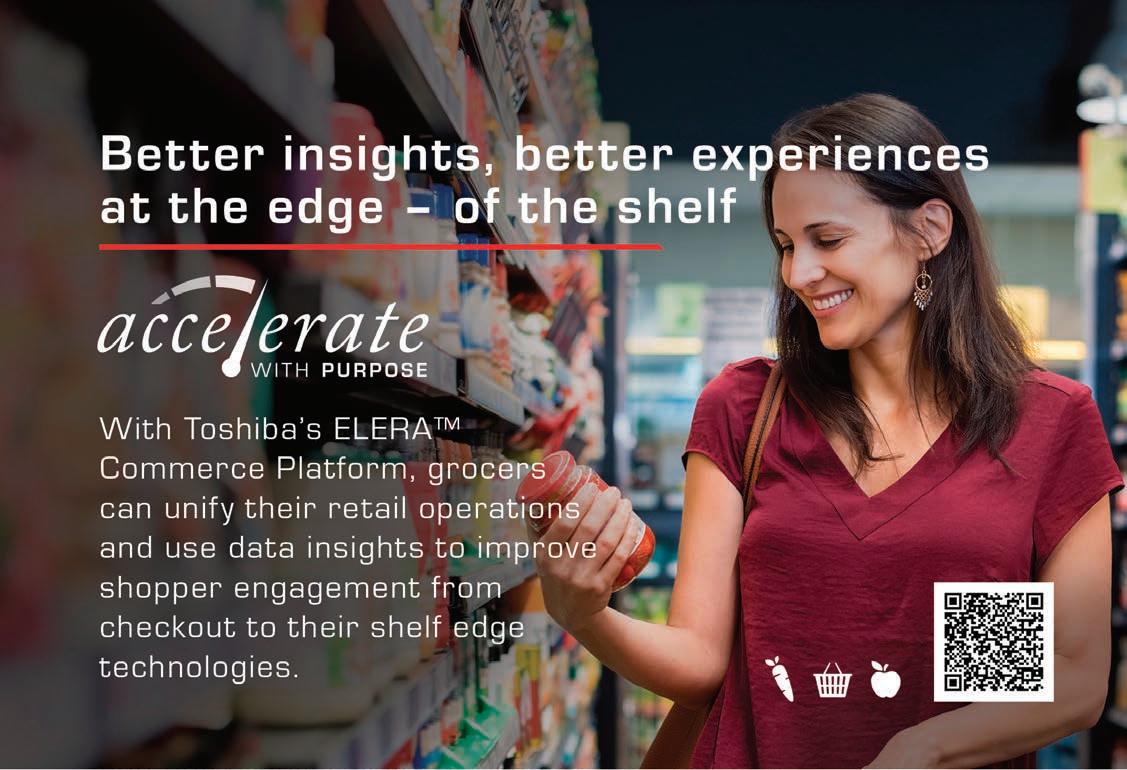
comps rose 6.4%. Based on the strength of this per formance, Ahold Delhaize raised its EPS to increase by mid-single digits compared with 2021, and free cash flow to be approximately $2 billion compared with the guidance the company gave in May.
In Q2, Ahold Delhaize USA’s Food Lion banner continued to lead brand performance. In fact, Muller said that Food Lion has been the “clear outperformer” in the company and right now is one of the fastest-growing brands in the United States, with close to double-digit comps.
“Food Lion has had very strong growth and market share gains. In fact, we think that we gained market share on the East Coast as an overall U.S. business,” Muller observed. “At the top end, we see Food Lion, and at the low end, we see Stop & Shop, but overall market share gains there.” Muller added that the company hasn’t seen consumers on the East Coast trading down on their favorite items to save cash.
According to Natalie Knight, CFO at Ahold Delhaize, the Stop & Shop brand’s financial performance has been affected by delays in store remodels.

“At Stop & Shop, the challenge has been that we really just
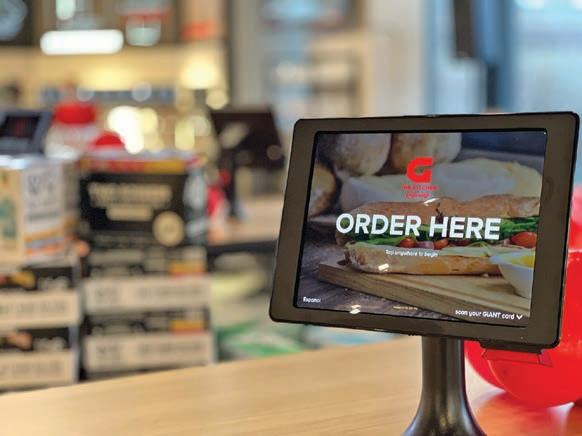 Technology is leveraged throughout The Giant Co.'s Riverwalk store in Philadelphia. Features include digital displays that show ads for products and touchscreen stations where customers can search for information or place orders.
Technology is leveraged throughout The Giant Co.'s Riverwalk store in Philadelphia. Features include digital displays that show ads for products and touchscreen stations where customers can search for information or place orders.
22 progressivegrocer.com
FEATURE

haven’t had the opportunity to complete the really aggressive remodeling program that we have envisioned,” Knight said during the Q2 results call. “If we look at Food Lion several years ago, that was really the key to success, in addition to pricing and culture. You got a different look and feel when you went into the store. And when we look at Stop & Shop, that’s something where we definitely have big plans. They have been slower than we would have liked during COVID-19, because it was just hard to meet the technical requirements to do it. We are moving at full speed at the moment. There’s a real focus in terms of what we want to do in the New York area, because that’s the place where ... we believe we can be really impactful and show people what we want to do with the brand.”
In June, Stop & Shop revealed a $140 million remodeling investment across its New York City stores over the next two years. The initiative aims to improve the shopping experience for local customers by adding thousands of new products to the assortment that reflect the diversity of the neighborhoods and communities that Stop & Shop serves, Ahold Delhaize says.
Omnichannel Ecosystem

Last year, when Ahold Delhaize held its investor day in November, the company said that it expected its online sales across its grocery banners in the United States and Europe

to double by 2025. The grocery chain also noted that e-commerce would be the foundation of an “omnichannel ecosystem” that would generate an additional $10 billion between 2023 and 2025.

So, how’s that going?









Well, in the second quarter, U.S. online sales at Ahold were up 16.4%. Not as strong as the 61% increase in the prior-year quarter, but impressive nonetheless, considering an economic envi ronment in which shoppers are counting every penny due to historic inflation, and e-commerce sales overall have been slowing.



In the United States, Ahold Delhaize now has more than 1,400 online grocery pickup points, and it has also added new instant-delivery options with partners such as Instacart.


“We are looking at how do we work much more collaboratively between Stop & Shop and FreshDirect to really capitalize on the benefits of both of those brands and what they can do to help each other in that area,” Knight said.
In July, FreshDirect, the Northeast’s leading pure-play online grocer, celebrated its 20th year in business (Ahold Delhaize acquired the company in



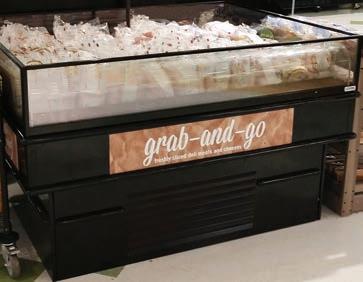

24 progressivegrocer.com
FEATURE Retailer Deep Dive CUSTOMERS NOT STORE? THINKINGABOUT YOURWHEN FRESH CUSTOMERS . . . “GIVE UP AND LEAVE” IT’S HARD TO FILL THEIR SHOES.
early 2021). The e-grocer said a week later that it would launch its first shop per loyalty program in 2023.










In late August, however, FreshDi rect revealed that it would exit the Philadelphia and Washington, D.C., markets. The company said that the move would “allow it to better serve customers in the tri-state market sur rounding New York City.” FreshDirect competes with Ahold’s digital-forward Giant Co. and Giant Food banners in those areas, so the move makes sense in terms of increasing efficiencies.


In fact, The Giant Co., which has a new interim CEO, John Ruane, starting this month, has been working this year to make e-commerce more attractive to cost-conscious consumers, including the elimination of order minimums and grocery pickup fees.


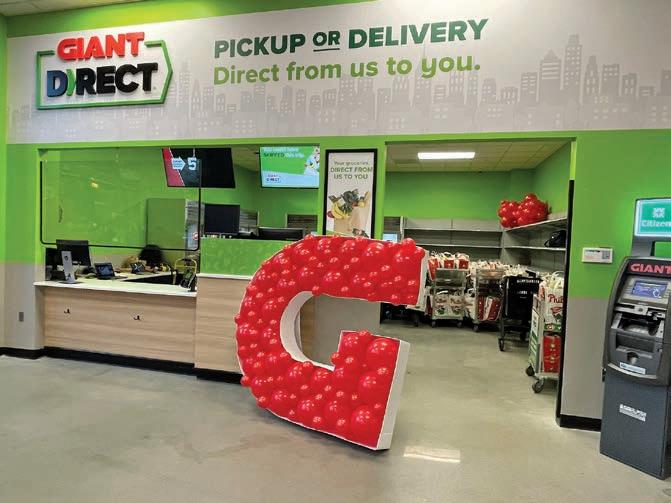
“With today’s customers having more choices than ever before, it’s critical that we continue taking steps to differentiate our online shopping experience,” said Matt Simon, VP of brand experience at The Giant Co., when news of these e-commerce changes broke. “Not only do these enhancements accelerate our


Earlier this year, The Giant Co. made it easier for inflation-battered shoppers to get groceries delivered. The grocery store chain eliminated order minimums and fees for online shoppers who use Giant Direct and Martin’s Direct services for pickup.


omnichannel strategy, but they also provide our Giant Direct and Martin’s Direct customers with greater convenience and value, uniquely positioning Giant Co. as an online grocer of choice.”

PROGRESSIVE GROCER September 2022 25
GIVE THEM A REASON 845-331-2111 | professionalseriesequipment.com © 2022 M&E Mfg. Co., Inc. Trademarks property of M&E Mfg. Co., Inc. Beyond Smart DELI ª The In-Store “Relationship Management” Specialists Professional Series ® SOLD THROUGH DEALERS ONLYSOLD THROUGH M&E MFG. CO., INC.
Last November, The Giant Co. opened a new state-of-theart direct e-commerce fulfillment center in Philadelphia to serve more customers in that city and — for the first time in its 98-year history — southern New Jersey.
Transforming the Supply Chain







Ahold Delhaize USA has been busy putting into place a supply chain transformation plan since 2021, a three-year journey to establish an integrated self-distribution network to support the division’s omnichannel growth. In March, the company shared that it had converted a facility into a self-managed network in Bethlehem, Pa., bringing the total number of network facilities to 21.
“The conversion of the Bethlehem facility is an import ant milestone,” said Bob L’Heureux, VP, supply chain services for ADUSA Supply Chain Services and self-dis tribution implementation lead, last March. “It’s not only the first facility to convert in 2022, but with the addition of this distribution center, we now have the first facility in the network that serves more than one Ahold Delhaize USA brand. This is an important capability to add as we continue to transform the supply chain network into an integrated, flexible model that supports omnichannel growth for the brands we serve.”
Sitting at 1.2 million square feet, the Bethlehem distribution center receives, selects and transports 200 million cases of nonperishable grocery annu ally for more than 210 Stop & Shop and Giant Co. stores and e-commerce centers. The facility is equipped with the supply chain network’s end-toend forecasting and replenishment technology from Atlanta-based Relex Solutions, which enables great er precision in order accuracy, resulting in better in-stocks, fresher products and reduced food waste.
Bethlehem is one of seven new and acquired warehouses revealed in December 2019 as part of Ahold Delhaize USA companies’ supply chain transformation. Following that announcement, ADUSA Distribution also acquired another distri bution center, in Mauldin, S.C.
In August, Ahold Delhaize USA poached San ja Krajnovic from Goodlettsville, Tenn.-based Dollar General and named her EVP, distribu tion and transportation for the ADUSA Supply Chain network. Krajnovic joins the supply chain leadership team as Ahold Delhaize USA companies continue to transition to an integrat ed self-distribution model.
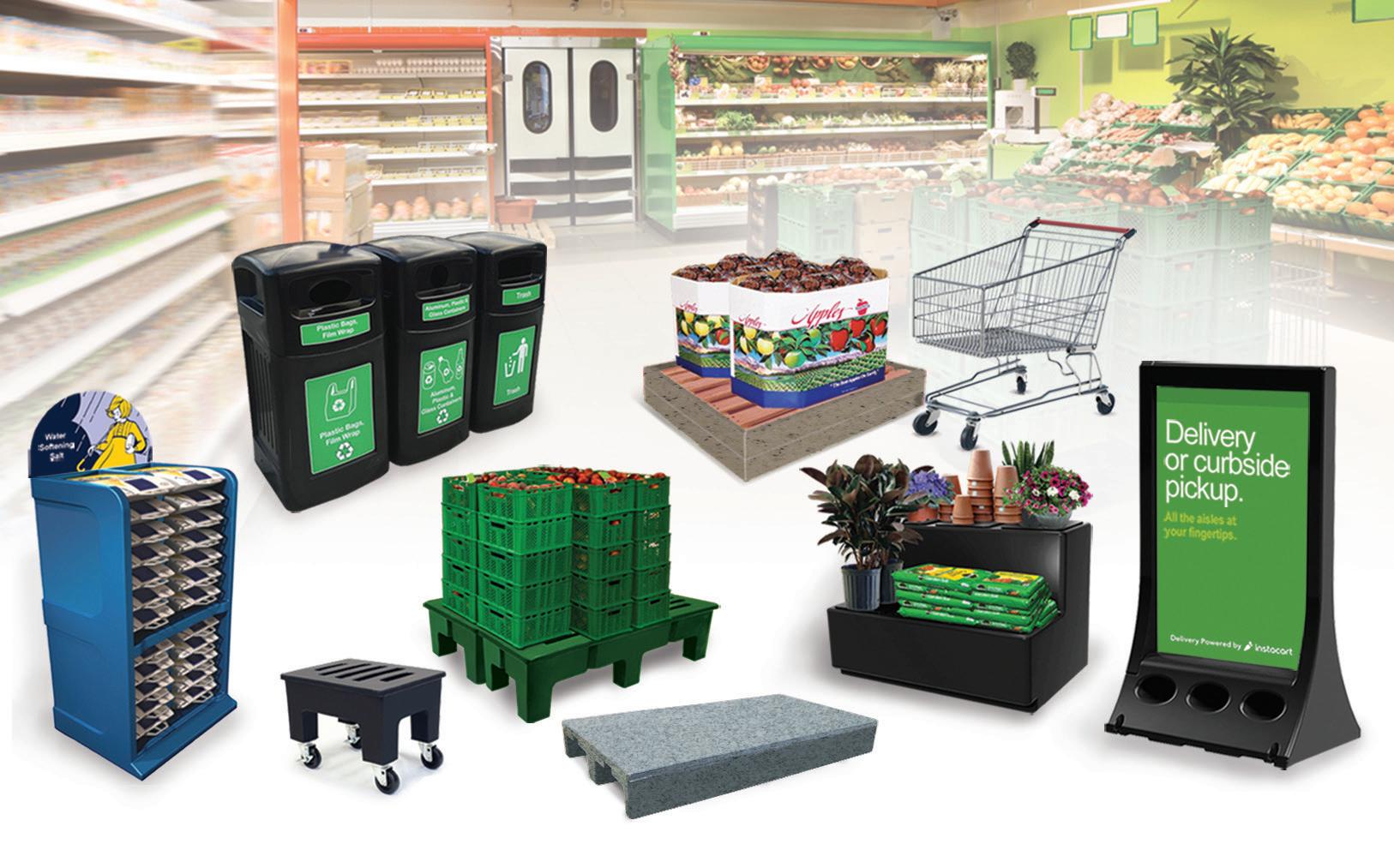
26 progressivegrocer.com
FEATURE Retailer Deep Dive masonways.com 800-837-2881 Over 80 Base Sizes | Retail Display SolutionsBOOTH #2069
Private-Brand Peak
Buried deep in the Ahold Delhaize Q2 earnings report was a not-so-sur prising nugget: The com pany has achieved 30% private-brand penetration. After all, the company has been working hard to elevate its own brands.
Earlier this year, the conglomerate installed a new leader in charge of private brands, Ian Prisuta, who has hit the ground running trying to meet the company’s stated goal of having more than half of its sales of own brands come from healthy products by 2022.

“In terms of the U.S., we see opportunity for the rest of the year in private label, where in some cases, we have better margins than the rest of our portfolio,” Knight said.
In July, Prisuta tapped into two retail trends — private label and diversity — when he launched an incubator program for certified diverse-owned suppliers to develop new, exceptional-quality private-brand products.
“Through this program, we’re hoping to identify a select number of innovative food and beverage manufac turing companies with products made from high-qual ity, distinctive ingredients, or healthy options that will appeal to the widely diverse customers of the brands of Ahold Delhaize USA,” Prisuta said at the time. “I’m confident there are suppliers that we haven’t engaged with yet that would be a valuable addition to our pri vate-brand portfolio, and the entire private-brands team is excited for the opportunity to develop new relation ships with those businesses.”
During the two-and-a-half-month Incubator Program, the chosen participants will learn from the company’s private-brands team about its private-brand structure and goals, and will grow their knowledge of the brands of Ahold Delhaize USA. The program will include educational sessions and discussions on best practices with various functional sub ject-matter experts. Participants will also be paired with their own personal pri vate-brand mentors, who will help them prepare for their final product pitch.
The incubator program is part of Ahold Delhaize’s strong focus on its environmental, social and governmental (ESG) efforts, including Giant Food’s recent partnership with circular-reuse platform Loop, from Tren ton, N.J.-based Terracy cle, and Dutch retailer
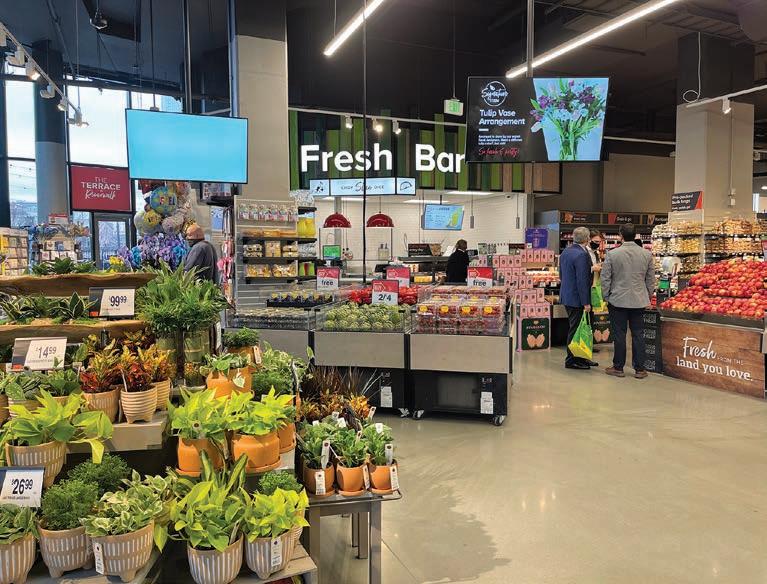
Albert Heijn’s rollout of a 100% electric delivery fleet in 2022 for The Hague city center, with Rotterdam, Utrecht and Amsterdam to follow next year. Ahold’s U.S. brand Hannaford also disclosed plans to be fully powered by renewable energy by 2024. Additionally, just last month, the company bolstered its ESG strategy further by appointing Jan Ernst de Groot, already its chief legal officer since 2016, to the additional role of chief sustainability officer. De Groot is well known in the Dutch and international sustainability community, with a track record of leading transformative sustainability programs at companies, and supervisory roles at NGOs and civil society organizations.
“For a long time, sustainability has had a central position in our organization,” Muller said at the time of de Groot’s appointment to the chief sustainability officer position. “It is one of our four key strategic focus areas, and a critical driver of our purpose: Eat well. Save time. Live better. Our activity and performance in this area are attracting increasing interest from customers, (future) associates, inves tors and other stakeholders. With the appointment of Jan Ernst, we ensure that the full scope and dimen sion of sustainability and ESG are holistically represented at the exec utive committee level.”
Jan Ernst de Groot is chief legal officer and chief sustainability officer at
The perimeter at the Riverwalk Giant Co. store in Philly boasts a food hall, a kombucha tap, in-house smoked meats, a dairy department dedicated to plant-based dairy, a smoothie bar (pictured above), a brewpub, organic wines and two separate areas for outdoor seating.
PROGRESSIVE GROCER September 2022 27















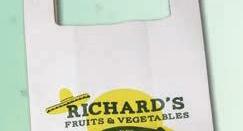






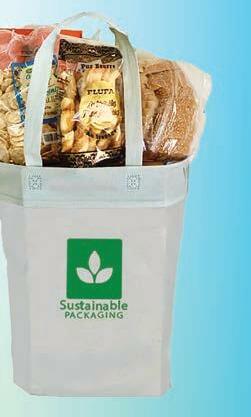




SAY PLASTICTONO SWITCH TO NON WOVEN REUSABLE BAGS TO HELP THE ENVIRONMENT Fabric from 40-80GSM Carries up to 25 lbs Non Woven Fabric Available in All Colors Very Low Cost Replace Plastic and Paper Bags Reuse 125 Times Custom Sizes, Print 1-4 Colors Meets State, County, City Laws 500 Newfield Avenue, Ste 10, Stamford, CT 06905 t. 203.614.8005 f. 203.614.8006 www.spackbg.com e. sales@sustainablepackagingco.com SAYPLASTIC
“Sustainable


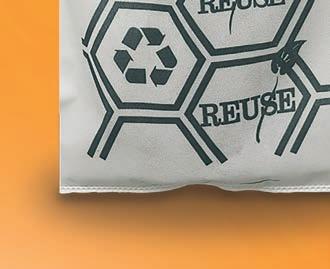

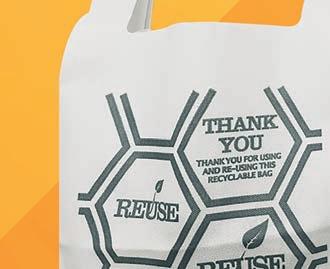









LET’S KEEP IT GREEN. SWITCH TO NON ENVIRONMENTTOREUSABLEWOVENBAGSHELPTHE 500 Newfield Avenue, Ste 10, Stamford, CT 06905 t. 203.614.8005 f. 203.614.8006 www.spackbg.com e. sales@sustainablepackagingco.com Fabric from 40-80GSM Carries up to 25 lbs Non Woven Fabric Available in All Colors Very Low Cost Replace Plastic and Paper Bags Reuse 125 Times Custom Sizes, Print 1-4 Colors Meets State, County, City Laws
Packaging helped me eliminate paper bags as we switched to their non woven t-shirt reusable bag program. With the very low cost we were able to offer 4 bags for a dollar. Their bags meet the New York state guidelines for reusable non woven. We also sell woven bags but their non woven out sell these by 25 to 1. We don't even carry brown bags any more... not an option at the front end.” —President of a Food Chain in NY.
Sustainability Scorecard
AWorthJourneyTaking
By Jenny McTaggart
ifteen years ago, Progressive Grocer published its first-ever “green” issue, with the cover headline “Green is the New Black.” At that time (early 2007), sustainability was just becoming a mainstream trend in U.S. business as companies were beginning to recognize that it behooved them to invest in more earth-friend ly practices and products to ensure a healthier environment, keep their shareholders happy and, especially, to reach consumers who were supporting these noble ideas with their wallets.
Fast-forward to 2022, and the grocery industry has started to rack up some rather impressive achievements while setting some
Key Takeaways
A number of grocers have taken some major steps in areas such as energy efficiency, waste from packaging and surplus food, sourcing, and transportation and Someshipping.grocers see such actions as a competitive advantage.
As food retailers embrace a circular economy, they’re also encouraging consumers to recycle and reuse packaging.
major commitments related to sustain ability. Of course, the industry has been gradually pulled along by government regulations that place more emphasis on climate change, but a growing number of retailers have recognized that what’s good for the environment is often good for business, too.
Led by large mass-market retailers like Walmart and Target, which often have to answer to their concerned shareholders — as well as smaller chains with more environmentally progressive European connections, like Aldi and the regional

With a number of retailers making significant progress on the path toward a net-zero future, PG takes a look at their top sustainability initiatives planned for the next several years.
Target's first net-zero-energy store, in Vista, Calif., will inform the retailer's investments in new store and remodel programs as it strives to achieve net-zero greenhouse-gas emissions enterprise-wide by 2040.
30 progressivegrocer.com SPECIAL REPORT
F




Sustainability? We’re Living It. Alaska Seafood aligns with the highest global sustainability standards, and Nature-of course. AlaskaSeafood.org - RFMcertification.org


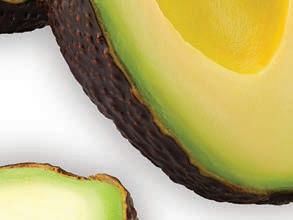


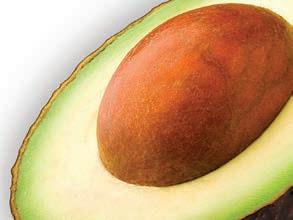
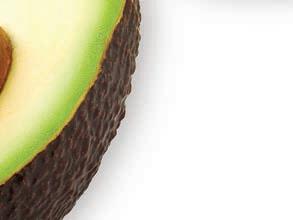






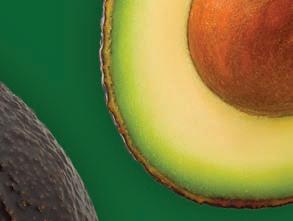



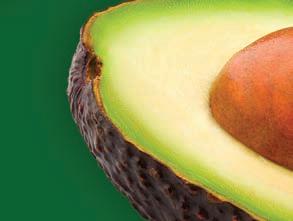


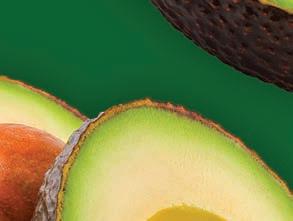









everyallAvocadosday,day.It'sourfocus&ourhistory. Get year-round freshness with Westfalia, the market leader in avocado growing, shipping, ripening, handling, and distribution. WESTFALIAFRUIT.COM
SUSTAINABILITY AT WESTFALIA THE FIRST FAIR TRADE CERTIFIED TM AVOCADO SUPPLIER IN THE WORLD


SPEAKING WITH…Raina Nelson, President and CEO, Westfalia Fruit Marketing USA LLC
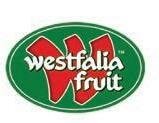



Westfalia is committed to producing safe, exceptional quality fruit, all while ensuring sustainable, ethical and responsible management of its bio-resources and the communities and environments across the globe. Nowhere is that commitment more evident than in the company’s prime-quality, ready-to-eat avocados, which Westaflia grows, sources, ripens, packs, processes and markets year-round, all in a sustainable manner.
Progressive Grocer asked Raina Nelson, President and CEO of Westfalia Fruit Marketing USA LLC, to explain how and why the company is committed to sustainability in everything it does.
Progressive Grocer: First, let’s talk about your focus on sustainability as a whole.




Raina Nelson: At Westfalia, sustainability isn’t just a catchphrase. It is engrained in everything we do. Our founder, Dr. Hans Merensky, is regarded as the father of modern avocado production. He was ahead of his time in adopting techniques that conserve water, protect and rejuvenate soils, and offer sustainable livelihoods to the people who farmed his land and beyond. Today, we honor and extend his legacy by taking proactive steps to achieve zero waste to landfill and carbon neutrality, and to reduce pesticide usage on farms. Our sustainability strategy prioritizes the environment, local economies, and most importantly, our people. We believe in growth: the growth of people, the economies we touch, communities that surround us, our customers, our partners, and our products.
PG: That commitment to sustainability is terrific — but does it really matter to retailers who are dealing with so many other challenges these days?

RN: Does it matter?Absolutely! Shoppers care about sustainability, which means retailers should, too. Statistics show that nearly 80% of U.S. consumers consider sustainability (of a product, the retailer, or the brand) when making at least some purchases1; younger generations are increasingly willing to pay more for products with the least negative impact on the environment2; and 43% of avocado purchasers are concerned that avocados are not sustainably grown and processed.3 That means vague avocado sustainability claims could be preventing grocery retailers from reaping business from loyal avocado shoppers.
PG: Westfalia has the distinction of being the global leader in avocados. How do you bring your commitment to sustainability to bear in the avocado market? What is the Westfalia Difference?
RN: Westfalia has developed new ways of growing avocados that protect water resources and produce strong, healthy avocado trees that will bear fruit and nourish the land for decades to come. We’ve pioneered low-flow drip technology that uses small pipes to emit less than one litre of water an hour per nozzle — just enough to replace what’s been lost through evaporation and transpiration. The technique saves water, improves air in the soil, and produces higher yields and healthier soils, allowing our growers to use up to 43% less water while increasing the output and economic value of the fruit. Another example: Westfalia’s developing orchards in Colombia feature 15% to 20% organic carbon in the soils.
While Westfalia is committed to the UN’s Sustainable Development Goals, we also have set our own targets. In 2020, the company improved water-use efficiency by 14%, generated 50% more of its own electricity, reduced waste to landfill by 9%, and lowered its carbon footprint per kilo of fruit by 5%. Our goal is to achieve zero waste to landfill by 2025, carbon neutrality by 2030, and to reduce pesticide usage on farms by 50% by 2035.





PG: We haven’t talked about the quality and availability of your avocados. What would you like to share with grocery retailers?
RN: At Westfalia, sustainability and quality go hand-in-hand. Being market leaders in the ripening process means we can provide fruit at exactly the correct level of ripeness, depending on when the fruit must be ready to eat. Our vertical integration from multiple countries of origin allows us to provide fruit when and where retailers need it, every single day. We have quality avocados all year long. We grow, source and ripen. We research and develop. We pack and process. We sell and ship. And just as important, if not more so, than all of those things, we care and conserve.
The bottom line is that we’re all a part of the future and must all work together to build a bright one.
For more information, email info@westfaliafruit.com westfaliafruit.com 1Sensormatic Solutions, April 2022 study 22019 McKinsey study 3Cooper Roberts Research, “Avocados Tracking 2021”




ADVERTORIAL
The momentum of plant-based foods is undeniable. To us, it seems only natural to put a plant-based product in a plant-based package. Trees are perennial plants. With a harvest to planting ratio of 1 to 3 trees and a recovery rate of 91 percent, corrugated boxes are made to be remade using both new and recycled plant fibers. Natural. Authentic. Remade. Extraordinary.
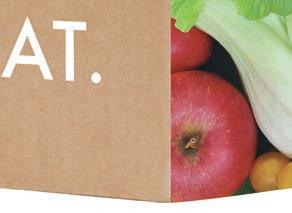
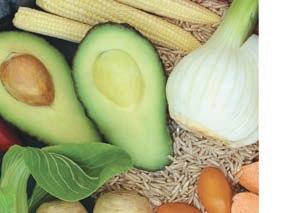
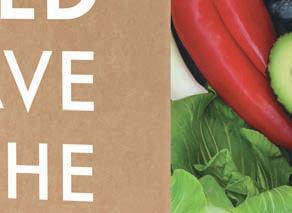

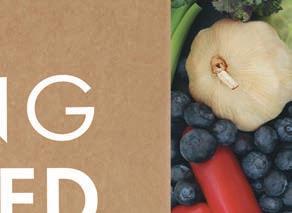


Learn more about the renewability, recyclability and responsibility of boxes at boxesareextraordinary.com.
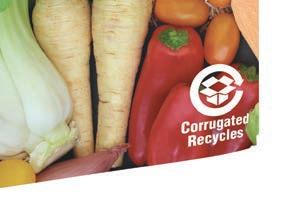








CORRUGATED BOXES: Plant-based Packaging from Renewable Forests
SPEAKING WITH...RACHEL KENYON, Senior Vice President, Fibre Box Association (FBA)
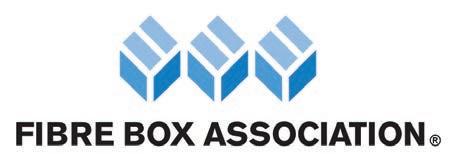

Corrugated boxes are staple packaging products that all grocery retailers rely on. Progressive Grocer reached out to Rachel Kenyon , Senior Vice President of the Fibre Box Association (FBA), to find out the role tree farming plays in creating that packaging and why the process is important to grocers and the customers they serve.
Progressive Grocer: Most people know trees are used to make paper products, including corrugated cardboard boxes. Many worry that the process is damaging our forests and harming our environment. Should they be concerned?
Rachel Kenyon: Actually, nothing could be further from the truth. In fact, the forest products industry is wholly vested in growing and sustaining abundant, healthy forests as an endless natural resource. Private landowners grow almost all of the trees used to make corrugated boxes; they are deeply invested in maintaining a sustainable crop to stay in business. These landowners grow, harvest and regrow trees using sustainable forest management practices that perpetuate infinitely renewable forestlands; for every tree harvested, two more are planted, helping make sure that U.S. forests are not only preserved — but nourished and cultivated. So, the forest products industry is actually helping and growing — not hurting — U.S. forests.
PG: There is a relationship between farm families and the land. Can you explain what that is?
RK: The families that own these tree farms want to sustain their forest for generations to come. That means they’re very intentionally trying to manage it so they can harvest trees every year and don’t have to wait for 25 years for newly planted trees to mature. In fact, the paper and wood
products industry has quantifiable sustainability goals, which are spelled out in the American Forest and Paper Association’s Better Practices, Better Planet 2030 report (https://www.afandpa.org/2030), which showcases a commitment to manufacture sustainable products for a sustainable future.

PG: How does the process work? And how does it tie in with regenerative agriculture?
RK: Regenerative agriculture is a farming practice that can rebuild soil organic matter and restore soil biodiversity — and it is what privately owned tree farms practice. For example, say there are three trees in a row and the middle tree isn’t as strong as the others. The farmers will leave that smaller tree and wait until it is ready to be harvested. That means there are always trees in different stages of growth on the farms. It is similar to farmers rotating their crops. Because the whole forest isn’t harvested, it maintains biodiversity, protects animals, and protects watershed. And even after trees are cut, what’s left nourishes the soil for growing new ones.
PG: What does all of this mean for grocery retailers?
RK: We all know how fast the term ‘plant-based’ has grown — everywhere you look you see it, especially in the context of the food we eat. But it doesn’t have to stop there. Trees are perennial plants grown specifically to make recyclable packaging materials like corrugated boxes. And that means boxes are plant-based packaging. When grocery retailers put their plant-based products in plant-based containers, then encourage customers to recycle the boxes delivered to their doorsteps, they’re helping to build a circular, sustainable supply chain. Not only is that great for the environment — it can help build business, too.
➤ To learn more about boxes and how they can help your store become a more sustainable enterprise, visit www.corrugated.org.
ADVERTORIAL
Sustainability Scorecard
U.S. banners belonging to Ahold Delhaize — a number of grocers have taken some major steps in areas such as energy efficiency, waste from packaging and surplus food, sourcing, and transportation and shipping. They are essential ly in the process of creating more sustainable, less wasteful supply chains from farm to fork, even getting their suppliers on board.
Some even see it as a competitive ad vantage: Amanda Nusz, SVP of corporate responsibility at Minneapolis-based Target, alludes to this idea when talking about the company’s new Target Forward program: “We want our guests to turn to Target first when they think about sustainability.”
Looking ahead to the remainder of 2022 and beyond, Progressive Grocer’s Sustainability Scorecard doesn’t set out to rank individual companies, but rather highlights some of the key initiatives being planned by the country’s most forward-thinking retailers, as stated in their annual reports; ESG (environmental, social and governance) or sustainability reports; or elsewhere.
Every company seems to be on a slightly different part of its sustainability journey, although most have similar objec tives. Regardless of where they are on this journey, each step taken seems most definitely worth it in terms of working toward a healthier environment, more content consumers, and, quite often, cost savings in the process.
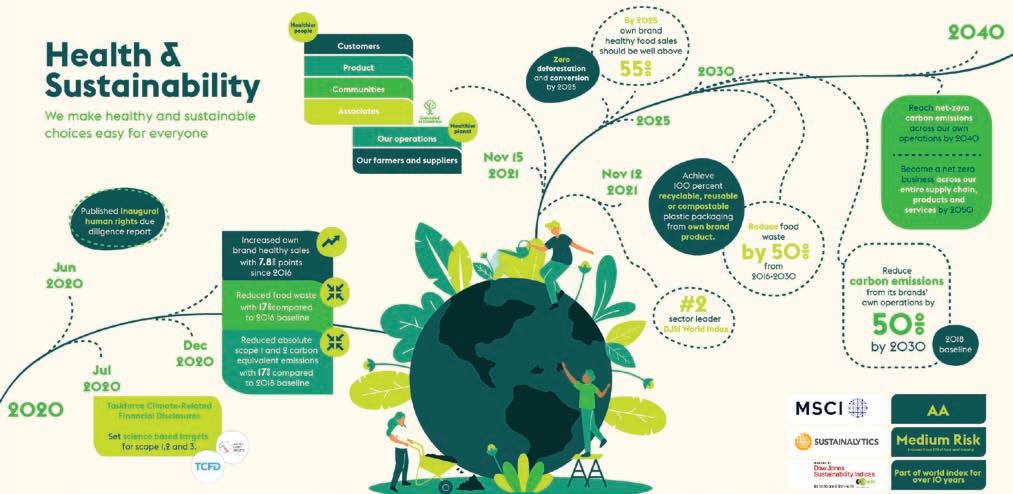
A Universal Mission That Requires Action
Before we begin looking at retailers’ major sustainability plans, it’s fair to ask the question, how much responsibility do grocers really have when it comes to the environment? New York-based global consulting firm McKinsey & Co.
estimates that the food system cur rently accounts for more than 30% of global greenhouse-gas (GHG) emissions, although grocers’ direct contributions to these emissions is relatively low, accounting for about 7% of the total food value chain.
Still, McKinsey advises that retail ers would be wise to take a leading role in moving the entire industry toward a more sustainable future. In an article recently highlighted on the firm’s website, called “Decarboniz ing Grocery,” the authors note that “the grocery sector has a unique opportunity to become the driving force for decarbonization of the entire food system.”
Simply put, according to McKinsey, “In the fight against climate change, the time is ripe for grocers to move from ‘playing defense’ (risk mitigation) to ‘playing offense’ (targeted value creation) — not only to help protect the planet, but also to strengthen their businesses.”
Counting carbs (no, not those carbs, but car bon dioxide, or CO 2 , being the primary green house gas emitted through human activities) seems to be a good place to start as retailers plot out their sustainability journeys. This re
This graphic produced by Ahold Delhaize illustrates the company's health and sustainability journey planned through 2040. Several of the country's leading grocery companies have similar goals.
“We want our guests to turn to Target first when they think sustainability.”about
—Amanda Nusz, Target
36 progressivegrocer.com
SPECIAL REPORT
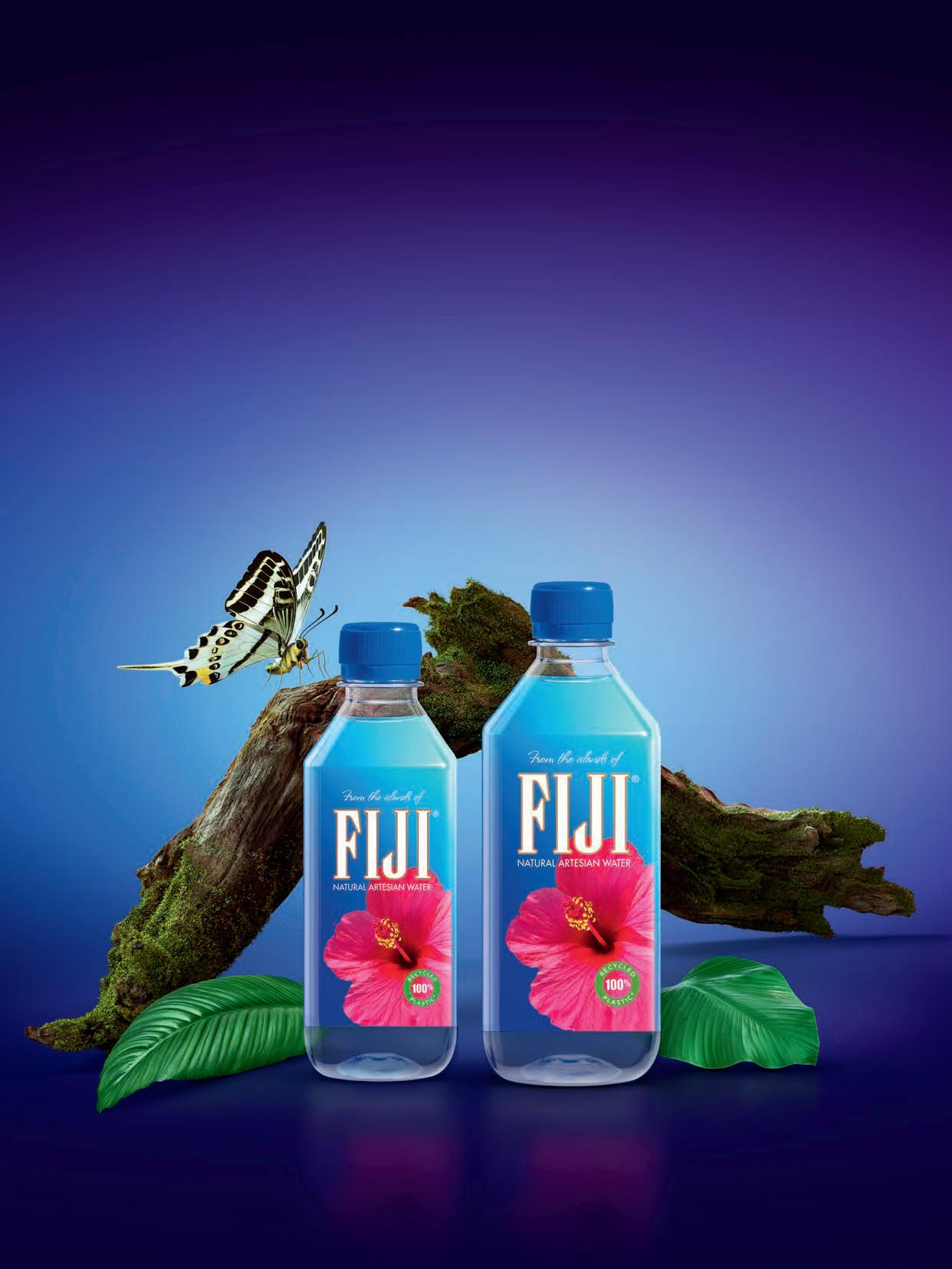
*330mL and 500mL sizes, bottle only **Projected total bottle volume per 2022 sales forecast © 2022 FIJI Water Company LLC. All Rights Reserved. FIJI, EARTH’S FINEST, EARTH’S FINEST WATER, the Trade Dress, and accompanying logos are trademarks of FIJI Water Company LLC or its affiliates. FW220628-24 Earth’s Finest Water Is Also Earth-Friendly RECYCLED100%PLASTIC* FIJI Water is committed to sustainability and is proud to launch its 330mL and 500mL bottles made from 100% recycled plastic* in 2022. This change will replace more than 50% of FIJI Water’s plastic bottles in the U.S.** FIJI Water is available direct. Contact your FIJI Water representative at 888.426.3454 or at FIJIWater.com .
SPECIAL REPORT
Sustainability Scorecard
quires not only taking a close internal look at what kind of GHG emissions a company is responsible for, but also seeking outside help to consult and give oversight.
According to the McKinsey article, two terms are most commonly used by companies when measuring carbon emissions: “carbon neutrality,” which is commonly used to refer only to CO2 and is often associated with the practice of offsetting emissions rather than reducing them, and “net zero,” which essentially refers to all GHG emissions and entails a focus on rapid, real emission cuts. The latter requires companies to set quantified targets, including for indirect emissions across their entire value chains.
Perhaps not surprisingly, Albertsons and other large publicly owned grocery chains like Ahold Delhaize, Target and Walmart have set goals to reach net-zero emissions, most of them by 2040.
Other chains are looking at reducing CO2 as a more realistic starting point.
Energy Conservation in Stores, and Renewable Energy
One of the main areas that falls into scopes 1 and 2 is energy consumption in stores, which can be reduced significantly by modernizing lighting, refrigeration, heating, ventilation, air conditioning and cooling. This will most certainly continue to be a major focus area for grocers in the next few years.
Ahold Delhaize, with global headquarters in Zaandam, Netherlands, shared in its “2021 Annual Report” that more than 40% of its carbon emissions come from leaks in refrig eration systems. While it seems possible to reduce emissions by approximately 60% at a neutral cost, initiatives like replacing refrigeration systems are more expensive and “will require significant capital expenditure at an earlier stage than [we] initially planned,” the company noted.
The retailer is prioritizing energy efficiency as it builds and remodels stores, and is installing energy-efficient equipment such as LED lights; doors on cabinets, heat recuperation; heat pumps; CO2 refrigeration systems (which not only reduce emissions, but are also more energy efficient than conventional refrigerators); and improved insulation. It’s also retrofitting ex isting refrigeration systems with more eco-friendly alternatives, while working to further control and reduce refrigerant leaks.
Meanwhile, the company is accelerating the switch to renewable power, with a number of its brands planning to use 100% renew able electricity by 2023. (To procure renewable energy, retailers can turn to renewable energy credits, look into solar power or other green energy, or look at power purchase agreements.)
Issaquah, Wash.-based warehouse club oper ator Costco has had success using display case shields to reduce energy use in its U.S. operations. The shields are employed during hours that the warehouses are closed to reduce power use while maintaining product temperature. As a result, there’s less load on the refrigeration system, with improved product temperature maintenance.
Batavia, Ill.-based Aldi US, which has sustain ability aspirations built into its business model, now has nearly 500 stores using refrigerants that have near-zero global-warming potential, and the discount grocer estimates that 51% of potential carbon emis sions have been saved due to its continued transition to natural refrigerants and phase-out of harmful refrigerants. Meanwhile, the growing chain is testing a smart-building automation system to minimize wasted energy with the lowest possible emissions.
In 2021, Aldi continued to purchase green elec tricity to cover 100% of its energy consumption and introduced its first company wind turbine, in Dwight, Ill. The company installed solar rooftop panels on additional buildings, bringing its total to more than 120 stores and 12 distribution centers. For 2022, it plans to install solar panels on an additional 60 stores and one new distribution center.
Seattle-based Amazon claims to be the world’s larg est corporate purchaser of renewable energy, and is on a path to powering operations with 100% renewable energy by 2025, five years ahead of its original target. The online retailing giant now has 134 utility-scale wind and solar projects and 176 on-site solar projects that supply renewable energy to its corporate offices, fulfillment centers, data centers and physical stores, including some Whole Foods units.
Target, which just released its first ESG report, is committing to source 60% of its electricity from renewable sources for its operations by 2025 — and that number jumps to 100% by 2030. Meanwhile, the company recently retrofitted its first net-ze ro-energy store, which is expected to generate up to 10% more renewable energy per year than needed to support its operations (the energy surplus can be transmitted back into a local power grid). The Vista, Calif., store will generate renewable energy through 3,420 solar panels across its roof and carport cano pies. Even its HVAC system will be powered through solar energy. The store and its new features will in form Target’s investments in new stores and remodel programs, according to the company.
Lakeland, Fla.-based Publix Super Markets, a founding partner of the U.S. Environmental Protection Agency’s GreenChill program, now has 77 stores that have earned Silver GreenChill certifications, 28 stores with Gold GreenChill certifications and one Platinum Certified store.
Sunbury, Pa.-based Weis Markets, another
70% say that they take into when shopping, and and reduction are among the most important for them.
Source: Aldi/Morning Consult survey commissioned by Aldi
38 progressivegrocer.com
of Aldi shoppers
sustainability
account
grocery
and food waste
plastic
packaging
sustainability issues
in 2021
regional player with a strong focus on sustainability, has turned to nuclear-generated electricity to reduce GHG emis sions from its electricity use compared with prior years. The retailer has now expanded its use of zero-emissions nucle ar-generated electricity to 67% of its electricity usage.
Like Publix, Weis has had numerous stores achieve the annual GreenChill certification. Notably, its store in Hanover, Pa., has earned its 13th consecutive GreenChill certification — an EPA record.
Reducing Plastics and Other Packaging Waste
Waste, whether from plastic bags, excess or unrecyclable packaging, or even unused food, falls under the scope 3 emissions that grocers track, and has also been gaining more attention in recent years.
Perhaps one of the most publicized “green” trends over the past decade or so is the switch to reusable shopping bags, largely brought on by local legislation. A number of retailers reacted by discouraging, or even outright banning, single-use plastic bags in their stores. That trend was followed by bans on plastic straws and other in-store packaging. While this may
Consumers Want Transparency in Sourcing and Values
Recent data from Chicago-based NielsenIQ shows that sales volume for products with sustainability-related claims and certifications on their packaging have increased significantly over the past three years. The data compares the past 52 weeks ended Aug. 6, 2022, versus three years ago. Here’s how the claims compare:
So, why aren’t you using a solution that can complete up to 400 trips without failure1? Meet the reusable plastic pallet that outperforms wood with improved hygiene, durability, sustainability and strength. Don’t let wood pallets hold you back. Make the switch to reusable pallets today.



Manufacturing,
Company
Animal Welfare (Includes Cruelty-Free, Cage-Free, Free-Range and Humane) +37.1% Environmental Sustainability (Includes Sustainably Certified, Carbon Footprint, Renewable Energy, Less Emissions and Zero Waste) +24.5% Social Responsibility (Includes B Corporation and Fair Trade) +22.1% Sustainable Farming (Includes EU Organic Farming, Family Farmed and Farm-Raised) +19.1% Sustainable Packaging (Includes Recycled Packaging, Eco-Friendly Packaging, Plastic-Free and Tetra Pak) +17.5%
A Better Way with ORBIS. LEARN MORE WWW.ORBISCORPORATION.COMAT®2022ORBISCorporation1InFasTracktestingcompletedatVirginiaTech,usingthe40x48Odyssey®pallet.
Labeling Innovation Helps Grocery Retailers Improve Performance and Reduce Environmental Impact
UPM Raflatac OptiCut™ Direct Thermal (DT) Linerless label materials enable grocery retailers to create business efficiencies and transition to more sustainable packaging.

Consumers, governments, and the industry have increased their expectations of companies’ environmental impact. This means retailers must take tangible sustainability actions such as switching to sustainable packaging and reducing waste.
Grocery retailers can respond to these trends by using OptiCut DT Linerless labels from UPM Raflatac, a leading global supplier of pressure-sensitive labeling solutions. UPM Raflatac’s whole Linerless product range carries the CarbonNeutral® certification by Climate Impact Partners. They have compensated for the Linerless range’s unavoidable greenhouse gas emissions based on cradle-to-customer scope. This means that when you choose UPM Raflatac’s Linerless, you take immediate action to help mitigate climate change.
Credible sustainability impact
For companies switching to DT linerless from linered labels, the sustainability impact is significant. Illustration 1 shows the carbon reduction in a case example of a retailer moving from standard DT linered labels to Opticut Linerless. As you can see, the retailer attained nearly 14,000 kgCO2e carbon reduction, which equals 37 long-haul flights, on a volume of 28.5 thousand label rolls.
To ensure the credibility of these calculations, UPM Raflatac works with the Carbon Trust so companies using OptiCut labels can obtain reliable and verified calculations of their carbon reduction.

Efficiency and performance
OptiCut products are designed to improve process efficiency and performance. Illustration 2 shows a case example of efficiencies created when switching to OptiCut Linerless from standard linered DT labels. As you can see, the change resulted in significant waste and reel change reductions, as well as 56 percent increase in the quantity of labels per roll.
As well, OptiCut products offer print clarity and low adhesive build-up in your linerless printer. This means that your liner-free printer is less likely to jam and reduces the frequency of printer maintenance. Finally, OptiCut labels perform in various conditions, including, cold, humid, moist and hot.
“We developed OptiCut to meet needs of grocery retailers that use a variety of food packaging types and retail weigh scales in a fast-paced retail environment,” stated Brinder Gill, Sales Director, UPM Raflatac Americas. “We recognized the need for a linerless solution where the adhesive will not jam up the liner-free printer and the label will perform in diverse environments.”
Linerless solution for retailers of all sizes
Regardless of the size of your business, UPM Raflatac can support your transition to linerless. “There is no comparison in our linerless capacity, which exceeds 100 million meters2,” said Gill. “We support our customers through a global distribution network, enabling them to transition to DT linerless solutions smoothly and at their
about UPM Raflatac OptiCut DT Linerless at go.upmraflatac.com/opticutlinerless.
Readpace.”more
M K S R























































B S
B S V
SPECIAL REPORT
Sustainability Scorecard
not be the biggest trend — or the one to make the most differ ence in regard to the environment — going forward, retailers are expanding their actions to other parts of the store.
Austin, Texas-based Whole Foods, which claims to have been the first U.S. grocer to ban plastic grocery bags at check out in 2008, is now offering smaller produce pull bags, and has eliminated all Styrofoam (polystyrene) meat packaging trays in its stores in the United States and Canada, as well as removing all Styrofoam from its foodservice packaging.
Aldi, which has never offered the single-use plastic checkout bags commonly used by other retailers, has traditionally given its customers the option to purchase multiuse plastic bags (the thick er plastic bags with handles), or paper bags if needed. Now the retailer is focused on eliminating the multiuse plastic bags sold in its checkout lanes by the end of 2023. It will continue to sell paper bags (unless restricted locally) or reusable shopping totes, and will encourage customers to bring their own bags.
Joan Kavanaugh, VP of national buying at Aldi, tells Pro gressive Grocer that the retailer is also exploring alternative options for plastic produce and meat bags in its stores. “We’re proud to be the first major grocery retailer with nearly 2,200 stores nationwide to make a commitment of this magnitude and will continue trailblazing the grocery retail industry when it comes to limiting plastic waste,” she says.
Ahold Delhaize USA also has various initiatives in place to help reduce its in-store plastic use. In 2021, its Giant Co., Han naford, and Stop & Shop stores transitioned their own-brand commodity fresh chicken program from EPS (expanded poly styrene) foam trays to more easily recyclable PET rigid trays. Food Lion and Giant Food are scheduled to transition their commodity chicken programs away from foam trays through out this year. The Giant Co., Giant Food, Hannaford, and Stop & Shop also transitioned their Nature’s Promise organic fresh chicken programs from EPS foam trays to PET rigid trays.
Publix, for its part, wants to let its shoppers choose what bags they use, but it still continues to encourage reusable bags and has recycling stations for plastic/paper bags in its stores. In fact, the retailer turns its recycled bags into plastic pel lets that are sold to manufacturers for use in new plastic bags, fencing, benches and more.
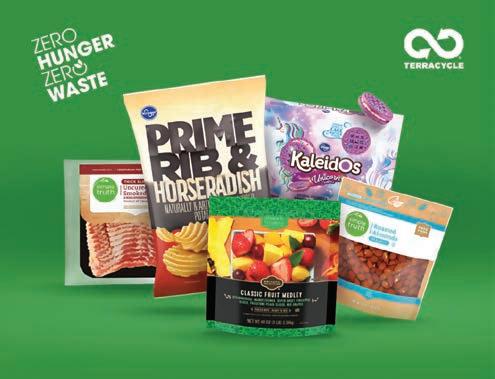
Further down the supply chain, Publix (as well as other retailers) is paying closer attention to packaging during shipping. For example, when Publix began to use a steadier pallet to stack product in its Lakeland dairy plant, the company found that it no longer needed the cardboard slip sheets it used to protect the ice cream. That change saves nearly 1 million square feet of cardboard each year, according to Publix.
In another innovative shipping move, Publix’s neighbor up north, Rochester, N.Y.-based Wegmans, has started using newly designed RPCs (returnable plastic containers) to get fresh seafood from suppli ers to its stores, eliminating the need for Styrofoam coolers. Wegmans claims to be the first retailer to launch such a program for seafood. It worked with Atlanta-based Tosca to get the smaller crates that would be suitable for the seafood team’s needs.
Another way that more grocers are cutting down on plastic and other in-store waste is through their store-brand packaging.
UPM Raflatac, a global supplier of label materi als, is seeing an uptick in interest from retailers in regard to recycling. Brinder Gill, sales director at the Asheville, N.C.-based company, notes, “We work with numerous retailers and packaging suppliers on initiatives for packaging redesign for their in-house brands to enable recyclability, where labels play an important role.”
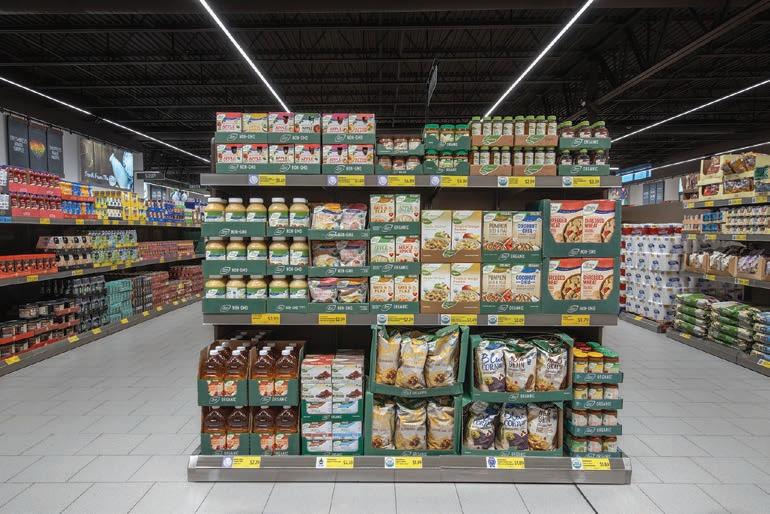 Aldi built sustainability into its original store model by operating smaller units, displaying products in shipping boxes (as shown here), and encouraging customers to use reusable bags. Now the company is planning to eliminate multiuse plastic bags by the end of 2023.
Kroger is partnering with TerraCycle to allow shoppers to recycle the grocer's own-brand flexible packaging.
Aldi built sustainability into its original store model by operating smaller units, displaying products in shipping boxes (as shown here), and encouraging customers to use reusable bags. Now the company is planning to eliminate multiuse plastic bags by the end of 2023.
Kroger is partnering with TerraCycle to allow shoppers to recycle the grocer's own-brand flexible packaging.
42 progressivegrocer.com
THINK AGAIN.
Sustainable cleaning isn’t just about sustainabil ity. In fact, value and effectiveness are the top two factors consumers consider when purchas ing an environmentally responsible product, even over ease of recycling and the use of harsh
Art of Green®, an AlEn® brand, we’ve always strived to strike that perfect balance. Customers love our products because they’re gentle enough to use around their family, while also being tough on germs* (and those pesky spaghetti stains).


What’s more, for Art of Green®, sustainability isn’t just a brand tactic. It’s been embedded into the fabric of our business for over three decades.


To offer this product to your shoppers, please contact us today

THINK YOU HAVE YOUR “SUSTAINABLE CLEANING PRODUCT” CATEGORY COVERED?
Atchemicals.the
artofgreen@alenusa.com 30 YEARS Has been leading the recycling plastic initiatives for overHas eliminated the use of new plastic in Practiced end-to-end recy cling to ensure that plastic does not end up in landfills Planted trees on deforested land to offset our CO2 emissions and restore natural environments which is made from bottles taken from landfills and given a second life 100% OF OUR PET BOTTLES100% OWNING TWO OF OUR RECYCLINGOWN PLANTS (6.5 MILLION TO DATE) an AlEn® brand *Art of Green® Disinfectant Spray and Disinfectant Wipes is effective against bacteria and viruses: Staphylococcus aureus, Escherichia coli, Rotavirus.
Fo cu s on su stainabilit y

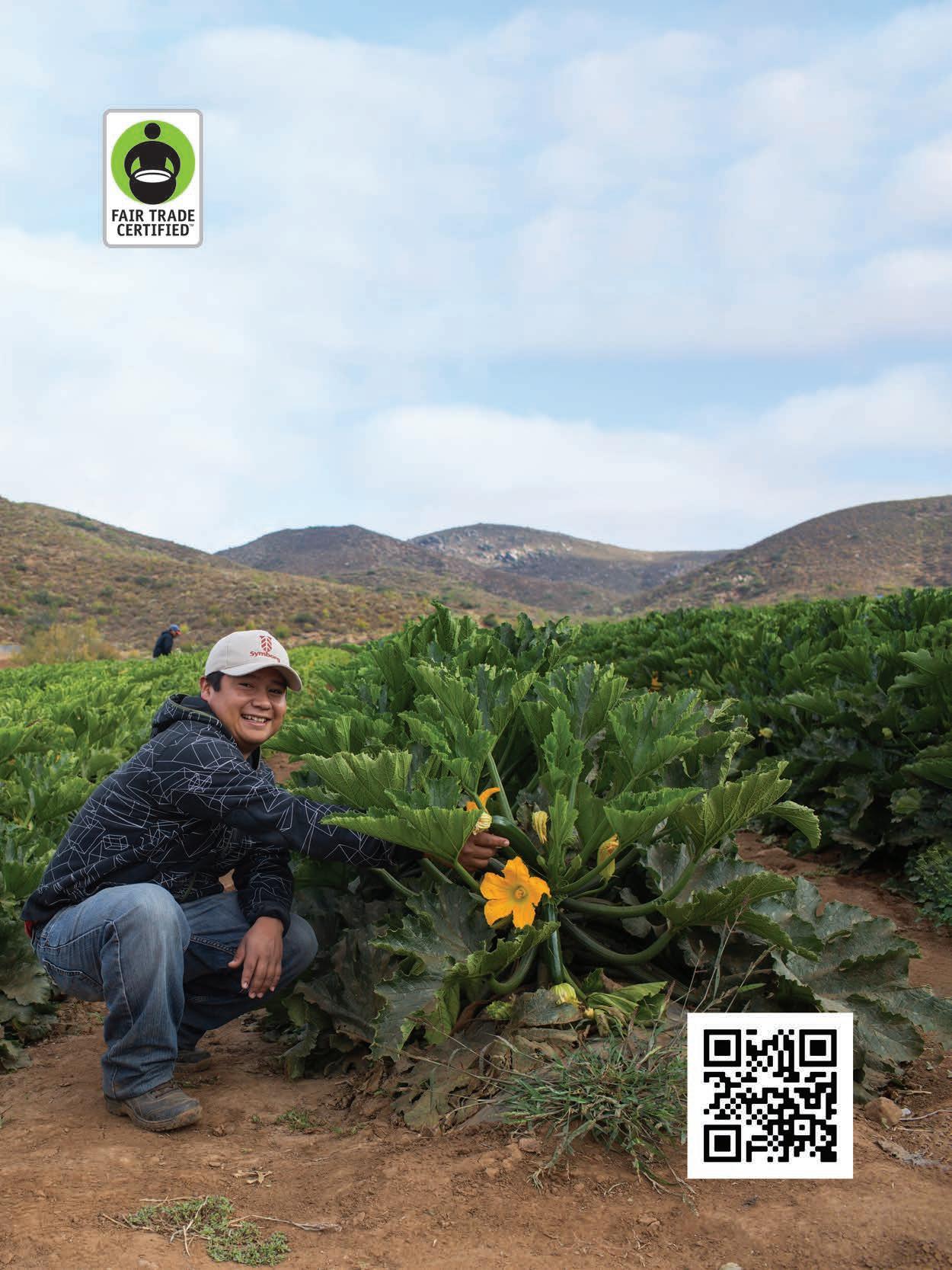
fi J fi
Fair Trade Certified™ and the SUSTAINABILITY JOURNEY
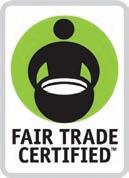

Speaking with… Abby Ayers, Senior Director of Business Development, Retail Partnerships

Founded in 1998, Fair Trade USA™ is the leading 501(c) (3) nonprofit, third party certifier of fair trade products in North America. The industry leading sustainable sourcing model promotes production practices that preserve the environment, enhance resilience to climate change, and protect the health and quality of life for farmers, fishers, workers, their families, and their communities. Progressive Grocer asked Abby Ayers, Senior Director of Business Development, Retail Partnerships, to discuss Fair Trade USA’s mission and to explain why it is important for grocery retailers.
Progressive Grocer: What role does Fair Trade USA play in the sustainability journey, particularly as it pertains to grocery retailing?
Abby Ayers: Consumers today are demanding sustainably sourced fresh goods, which is increasing the need for resilient, reliable supply chains. Fair Trade USA provides the business training and environmental knowledge and facilitates the capital investment that empowers producers worldwide to create high-quality products. We also certify and promote fair trade products from those producers.
We embrace a perspective on holistic sourcing that delivers shared value to suppliers, retailers, and the end consumer by reframing sustainability as an issue that encompasses
social, economic, and environmental sustainability — not one hyper-focused on the environment alone. Our approach is to prevent and/or reduce risk to local environments through legal compliance and management systems; to empower and build the capacity of farmers, fishers, and workers to produce sustainably; and to ensure the resourcing needed to support their sustainability journeys.
PG: Why it is important to consider all three perspectives?
AA: There are three legs of the sustainability stool, and they are completely interdependent. Until social and economic sustainability catch up to environmental, we have not built a truly sustainable movement. Resilient supply chains begin with resilient communities. Investments in programs that deliver more value to producers and workers increase productivity and worker retention for suppliers, as well as the highquality, ethical sourcing that consumers expect from the retailers they patronize.
Retailers and their suppliers have an important role to play in creating a truly sustainable movement, too. They must discuss how they can collaborate to implement solutions that will unlock the promise of this holistic approach and the ROI it can deliver throughout the entire supply chain.
PG: Can carrying more sustainable, ethically sourced products really have a noticeable, positive impact on AA:ROI?
Absolutely! And post-pandemic
data show why. Consumers are more ethically and environmentally conscious now than ever before — and that is impacting their purchasing decisions. Here are just a few figures: An impressive 86% of consumers want more sustainable and equitable products; three in four consumers consider sustainability when choosing between brands; nearly 57% are willing to change their purchasing habits to help reduce negative impact to the environment — and that jumps to 77% among those who say sustainability is important for them. Traceability is important to 73% of consumers, too — and of those, 71% would pay a premium for it.
PG: So, consumers say they want sustainable, ethically sourced product. But do they look for products that are Fair Trade Certified™?
AA: Fair Trade Certified products are produced according to rigorous standards that protect the well-being of farmers, fishers, and workers. Our standards set the global benchmark for sustainable sourcing, strengthen brand trust, and build consumer loyalty. U.S. consumers increasingly know and trust the Fair Trade Certified seal: 66% of the general population of consumers recognize it and it is the most widely recognized fair trade seal in the United States.
By putting our seal on goods made responsibly, fairly, and sustainably, we make it easier for suppliers and retailers to offer the kind of products that that align with the values of today’s sustainability minded consumers.
ADVERTORIAL
SPECIAL REPORT
Sustainability Scorecard
Most of the retailers that are prioritizing sustainability have set a goal of having all of their store-brand packaging be reusable, recyclable or compostable by 2025.
Aldi has already reduced its use of plastic and increased the recyclability of its packaging so that 62% of its Aldi-exclusive packaging is now reusable, recyclable or compostable. In the produce department, the company has removed 1 million trays from its asparagus packaging and is currently testing a reduced-plastic packaging format for produce items. Aldi also managed to remove 37 tons of material by transitioning its
product labels to more sustainable alternatives.
Aldi’s Kavanaugh notes that the company has “a lot of leverage when it comes to the packaging of products sold on Aldi’s shelves,” since more than 90% of its products are Aldi exclusives. “We can implement changes quickly and efficiently throughout our product mix,” she says.
Cincinnati-based Kroger, for its part, has taken a fresh approach to packaging with a reusable alternative. Last year, it became the exclusive U.S.
Grocers Focus More on Sourcing, Vertical Farms
The country’s most sustainably minded retailers are plac ing more of an emphasis on sourcing — by both boosting locally and sustainably produced food and by requiring stricter environmental standards from their suppliers. This ranges from sourcing more sustainable seafood, including canned tuna, to ensuring that beef is being produced with no deforestation. Palm oil, coffee, eggs, soy and pulp are other commodities that are being more closely watched by grocers to ensure sustainable production.
In fact, the 2022 Sustainability Barometer released by London-based Mintel finds that from a global consumer perspective, concerns about water and food shortages are now being prioritized ahead of previous preoccupations with waste and plastic. Therefore, it makes sense for grocers to include messaging about their efforts in more sustainable sourcing and in combating climate change.
Several retailers, including Batavia, Ill.-based Aldi US, are committing that all of the fresh, frozen and farmed seafood they purchase will be third-party certified as sustainable or from fishery improvement projects by the end of 2025. Meanwhile, expect to see more of these grocers ramp up tracing efforts so that customers will also recognize their efforts in sustainability.
Rochester, N.Y.-based Wegmans is addressing sourcing firsthand at its organic farm and orchard in Canandaigua, N.Y., where it sustainably sources more organic produce and extends the East Coast growing season. This year, the farm is committed to achieving 95% zero waste.
Meanwhile, The Kroger Co., Publix Super Markets and Whole Foods Market are among the retailers bringing farming directly to their stores. In 2019, Cincinnati-based Kroger revealed that it would introduce produce farms at its QFC stores in Washington state, via a partnership with Infarm, a Berlin-based urban farming network. Then, in 2020, Austin, Texas-based Whole Foods unveiled a vertical farm from Brooklyn, N.Y.-based Farm.One in one of the grocer’s Big Apple stores, while Publix added an on-site trailer farm from a local hydroponic grower to its Green Wise Market store in the grocer’s hometown of Lakeland, Fla.
These days, plenty of retailers are partnering with in door-farming companies to enhance their local produce supplies. In January, Bentonville, Ark.-based Walmart signed an agreement to invest in Plenty, a vertical-farming com
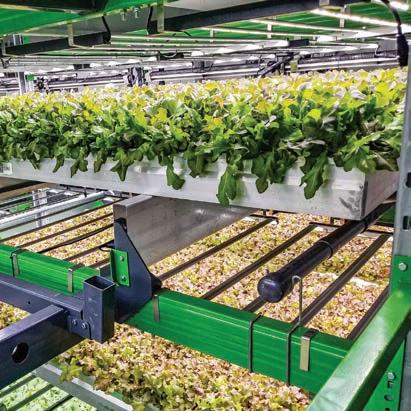
pany that grows greens indoors. San Francis co-based Plenty will begin providing leafy greens to Walmart’s California stores this year from its new vertical farm in Compton, Calif. (the company already supplies fresh produce grown indoors to some Albertsons stores). Kroger also sources fresh produce from an indoor grower, Hamilton, Ohio-based 80 Acre Farms, while Whole Foods, FreshDirect, Amazon Fresh and Walmart have all purchased leafy greens from AeroFarms, a Newark, N.J.-based supplier that uses aeroponics and indoor vertical-farming technologies. Another vertical-farming company, Brooklyn, N.Y.-based Bowery Farming, recently opened its largest, most technologically advanced and sustainable commercial smart farm in Bethlehem, Pa. The farm will supply fresh produce within a 200-mile radius to such retail customers as Whole Foods, Giant Food, and Albertsons’ Acme and Safeway banners, as well as several independent grocers and e-commerce partners such as Amazon Fresh.
Bowery Farming, a vertical-farming company based in Brooklyn, N.Y., is supplying leafy greens and other fresh produce to retailers such as Whole Foods, Giant Food, and Albertsons' Acme and Safeway banners.
46 progressivegrocer.com


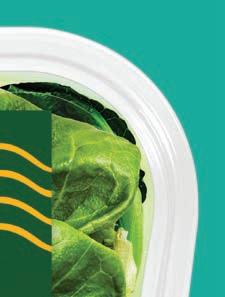

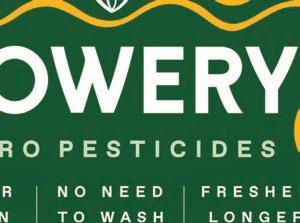
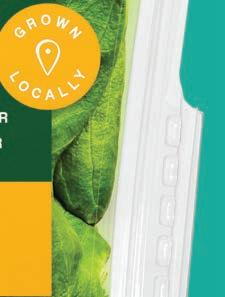
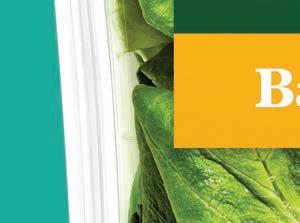
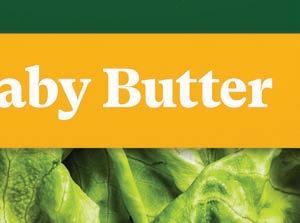



GrVerticallyIndoors.GrownIndoors.VerticallyGrownVerticallyIndoors.GrownVerticallyIndoors.GrownVerticallyIndoors.rownowif nothing else, FEEL GOOD about your greens We’re the modern farming company reimagining what a flavorful future tastes like
Sustainability Scorecard
grocery retail partner for Loop, from Trenton, N.J.-based TerraCycle, and started bringing popular brands in reusable packaging to customers in a pilot during its third quarter. The program has now expanded to more than 20 stores.
Target, meanwhile, launched an initiative called Target Zero earlier this year, which empowers guests to easily
shop for products with packaging designed to be refillable, reusable or compostable, or made with recycled content or plastic alternatives. By 2025, Target expects to offer two circular own brands, and by 2040 it plans for 100% of its own brands to “be designed for a circular future.”
In the online retailing space, Frustration-Free Packaging is Amazon’s flagship program offering more sustainable packaging that’s easy to open, fully recyclable and capable of shipping without addition al packaging protection. By the end of 2021, more than 2 million products qualified, and Amazon esti mated that this packaging change avoided 30,000plus tons of plastic across North America in 2021.
One other major trend in own-brand packaging is that more retailers are adding communications — namely, the How2Recycle logo from the Charlot tesville, Va.-based Sustainable Packaging Coalition — to remind their shoppers to recycle.

By the end of this year, Albertsons’ and Walmart’s own-brand packaging will feature the How2Recycle label on 100% of their U.S. private-brand food and consumable products.
Aldi, which has completed the addition of the How2Recycle logo on all of its Aldi-exclusive
Engaging Suppliers in Sustainability
Since most of the greenhouse-gas emissions from the food chain are embedded in the products that grocers sell, they can arguably make the biggest impact on the environ ment by engaging with their suppliers to reduce emissions. Some of the world’s largest food manufacturers have already adopted science-based emission reduction targets, so the conversation has started.
Austin, Minn.-based Hormel Foods, a supplier that’s prioritizing sustainability in its operations, is definitely open to talking more with its retailer partners on this topic, according to Kelly Braaten, manager of corporate communications. “We are always looking for ways to engage with retailers in this area,” she says. Hormel has ensured that about 83% of its product packaging, by weight, is now recyclable and is in the process of adding How2Recycle logos to its packaging. Meanwhile, Hormel and its subsidiary Applegate Farms are
supporting farmers who employ regen erative-agricultural practices. Hormel is joining Minneapolis-based Target to help provide financial incentives for farmers to participate in a 50,000-acre regenerative-agriculture pilot located in central and southeast Minnesota.
Zaandam, Netherlands-based Ahold Delhaize noted in its “2021 Annual Report” that it is sharing climate action data with its suppliers using the CDP (Carbon Disclosure Project) supply chain program and is collecting climate action data directly from its nation al-brand and own-brand suppliers. The retail conglomerate aims to work with those suppliers to set concrete decarbonization actions together.
As a founding member of the 10x20x30 Food Loss and Waste Initia tive, Ahold Delhaize has encouraged its brands to partner with key sup pliers to tackle the challenge of food waste across the supply chain. So far, its various regional banners have
joined 14 major suppliers, includ ing Cargill, Chobani, General Mills, Kellogg Co., Mars Inc. and PepsiCo, to root out food loss and waste in the food supply chain.
Walmart has long been known to work with its suppliers on sustainability and other issues. In 2017, the Ben tonville, Ark.-based retailer launched Project Gigaton, an initiative to engage suppliers in climate action, along with NGOs and other stakeholders. Last year, more than 2,500 of Walmart’s suppliers were reporting for the proj ect, which represents more than 70% of U.S. net product sales, according to Walmart. In the packaging arena, Walmart has launched a Recycling Playbook, hosted a 2021 Sustainable Packaging Innovation Summit, and supported the development of Plastic IQ, a scenario-modeling tool that allows U.S. companies to analyze and prioritize actions to improve their plas tic packaging strategies.
Retailers continue to add the How2Recycle logo from the Sustainable Packaging Coalition on their own-brand packaging to make sure that shoppers are doing their part.
48 progressivegrocer.com
SPECIAL REPORT











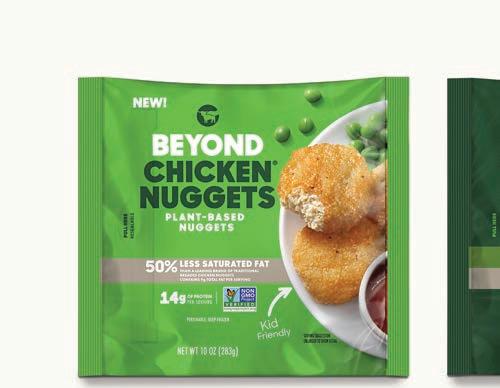
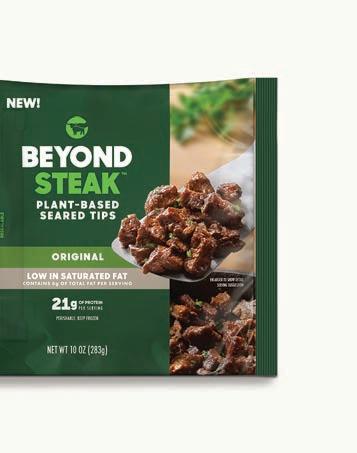

SPECIAL REPORT
Sustainability Scorecard
food and nonfood everyday items, also offers its shoppers sustainable “Aldi Finds,” including reus able straws and reusable sandwich/snack bags.
Tackling Food Waste
In addition to addressing waste in packaging, many grocers are paying more attention to food waste. While virtually every food retailer across the country has contributed to food banks like Feeding America for a long time, a few of the greenest-minded are revving up their efforts to avoid landfills.
At Ahold Delhaize USA, that means more innovative oper ations such as working with restaurants that cook with unsold food, or Carlisle, Pa.-based Giant Co.’s chain-wide rollout of Flashfood — an app-based digital marketplace offering shoppers savings on foods approaching their expiration dates. It also means designating food no longer suitable for human consump tion to be recycled in other ways, among them animal feed production, green energy facilities or industrial uses.
Meanwile, Scarborough, Maine-based Hannaford, another Ahold Delhaize USA brand, this year became the first largescale grocery retailer across its New England and New York markets to donate or divert all food waste, sending no food at all to Aldilandfills.aimsto achieve zero net waste in its operations by 2025 by diverting 90% of its waste from landfills through recycling, donation and organic recycling programs. The retailer has already diverted 74% of operational waste company-wide.CostcoandWhole Foods are among the retailers that are “upcycling” food that doesn’t sell. Costco uses extra cashews from its whole nut program in Kirkland Signature products such as Cashew Clusters and Protein Bars, while unsold rotisserie chickens are made into deli entrées. Whole Foods uses damaged/ bruised produce in its prepared foods and bakery, and includes unused seafood in soups and other recipes.
Kroger continues to donate surplus food through its Zero Hunger | Zero Waste food rescue program, and aspires to increase retail donations of fresh produce, deli and dairy items and have 100% of its its stores participate.
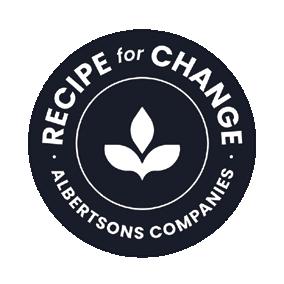
Publix managed to divert 28,000 tons of food waste byprod ucts from its manufacturing plants in 2021, including whey from yogurt and cottage cheese from its dairy plant, which the company sent to farmers to feed their livestock, as well as scraps from the bak ery that were processed into animal feed.
Green Streets
Quite a few grocers have made head lines in recent years with the news that they’ll start using electric vehicles or alternative fuels in transportation. Others are embracing reverse logistics and experimenting with new technol ogy to cut down on miles traveled. Transportation is just one more area
in which they can make a real impact on their scope 3 emissions.
According to Ahold Delhaize USA, its banners are converting both their light and heavy transportation fleets to zero-carbon alternatives, including battery electric ve hicles (BEVs), and are also leveraging route optimization technology and improving fill mechanism to reduce overall energy use.
Amazon, which has been a leader in this area, already has a fleet of more than 3,000 electric de livery vans and other zero-emission vehicles in Eu rope. Meanwhile, the company has delivered more than half a million packages throughout North America using electric vehicles. In July, Amazon rolled out custom delivery vehicles from Irvine, Ca lif.-based Rivian to more than 12 U.S. cities, with plans to expand that number to thousands in more than 100 cities by the end of this year.
Walmart, another early tester of electric vehicles, is purchasing 4,500 all-electric delivery vehicles from Torrance, Calif.-based high-tech advanced mobility company Canoo, which will be used to deliver online orders.
Wegmans is committed to the annual reduction of 1.25 million gallons of diesel by focusing on alter native fuels, electrification, and reducing food miles through partnerships with East Coast organic farms.
Costco has homed in on reverse logistics to cut down emissions, and last year began an electric tractor pilot. Its business delivery fleet continues to expand the company’s Truck of the Future ini tiative, aimed at maximizing its fleets’ efficiency.
Last but not least, a number of grocers, including Costco, Kroger, Publix, Target and Whole Foods, now offer electric-vehicle charging stations at their stores so that customers using electric vehicles have a place to charge up after they purchase groceries.
Walmart revealed in July that it intends to purchase from hightech advanced mobility company Canoo 4,500 all-electric delivery vehicles, which should begin hitting the road in 2023.

50 progressivegrocer.com

ITBRINGBUSINESSON. 2 Your industry. Your agency. If you’re competing in B2B you need a strategic creative partner that knows your industry inside and out. Only EnsembleIQ’s BrandLab offers full-service marketing capabilities and deep experience across retail, CPG, and technology, infused with industry knowledge and marketing intelligence. ensembleiq.com/marketing | brandlab@ensembleiq.com
BETSBEST
Every year, Progressive Grocer’s editorial staffers convene to review the hundreds of products sent to us for consideration in our Editors’ Picks program. Although our legendary marathon sampling sessions are now a thing of the past — thanks not only to a worldwide pandemic, but also to a geographically far-flung staff that would make scheduling such an in-person event a logistical headache — we still take our duties as product reviewers seriously. To that end, we carefully peruse the submissions and evaluate the described products according to innovation, functionality, value and packaging design. As happens every year, we encountered plenty of wonderful items released in the past 12 months, with the daunting task of choosing those products that we feel excel in these areas. The following 82 products, selected from more than 200 submissions, are those that checked all of the boxes for us.
As far as trends go, plant-based and other items positioned as better for you are still going strong, with a particular emphasis on healthy indulgence, since shoppers are increasingly unwilling to sacrifice taste for nutrition. Private label also made a respectable showing once more, with several products being the first own-brand entry in a particular segment, offering comparable quality to their name-brand counterparts, but at a value price. Additional attributes to arise often among the successful entries were clean-label, low-carb/ keto, organic, natural and sustainable, this last descriptor a bid to appeal to consumers’ grow ing desire to improve the state of the planet along with their bodily health.
By Progressive Grocer Staff
While not every submission becomes an Edi tors’ Pick, we are still grateful to all who sent in their products and enabled us to become better acquainted with the wide range of great items available at grocery — many of which we can’t wait to seek out on store shelves. After all, we’re not just editors, but also dedicated grocery shoppers, an all-consuming pastime — or is it a calling? — that we suspect is shared by many of our readers, too.
The annual program unearthed many products worthy of retailer and consumer attention.
52 progressivegrocer.com
FEATURE 2022 Editors’ Picks
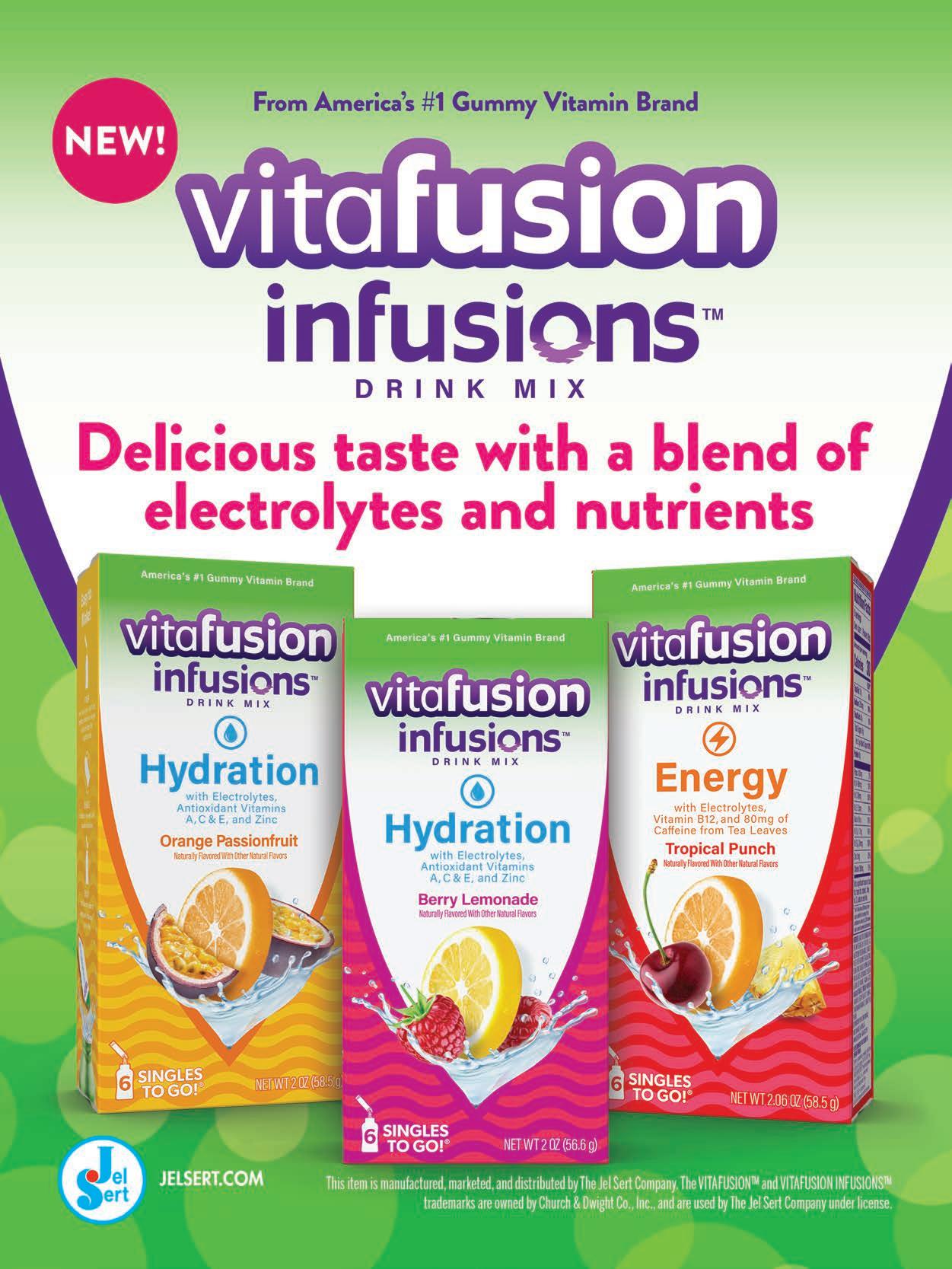
MicroAeroFarmsBroccoli
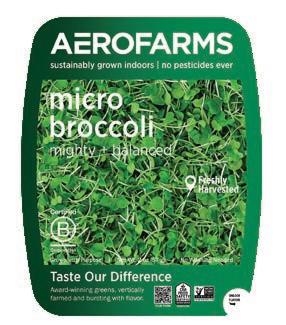
SRP: $3.99 per 2-ounce container
Small in size and big on nutrients, this type of microgreen is especially rich in the antioxidant sulforaphane. It’s grown in only a few days at an indoor year-round vertical farm using proprietary aeroponic technology for 95% less water and 99% less land use than convention al broccoli, and with zero pesticides, herbicides or fungicides. Offering a mellow, nutty flavor and a tender eating experience, these broccoli microgreens can be added to sandwiches, wraps, soups, salads and more. AeroFarms Micro Broccoli is sold in a color-coded container with a peel-and-seal lid and a bottom tray made from 100% post-consumer recycled plastic. With a 14-day shelf life, the product is available at such stores as Whole Foods Market, Stop & Shop, and Walmart.
Plant-BasedBabybel
SRP: $5.39 per 6-count pack
As shoppers branch out into more plantbased foods, traditional brands are doing the same. Among them is Bel Brands USA, known for its original Babybel snacking cheese wrapped in signature red wax. The company rolled out a plantbased version of that snacking cheese in February 2022 — com plete with green wax — after creating a smooth and creamy texture similar to dairy-based mozzarella. Designed to appeal to flexitarians and vegans alike, Babybel Plant-Based is garnering positive feed back from alt-cheese lovers who have discovered the product and heard about it from the brand’s social media influencer partners and from early retailers, among them Costco, Sam’s Club and Whole Foods Market. In fact, Bel Brands reports that Plant-Based has become one of its top three varieties.
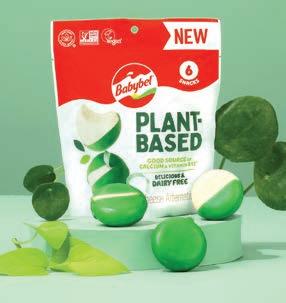
Birdie & Louie Wet Pet Food

Agua Plus
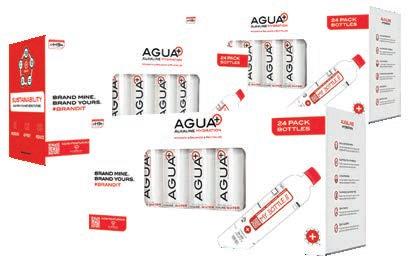
SRP: $1.65 per 16.9-fluid-ounce bottle
Clearing up any confusion about who’s drinking a water bottle at a given time, Plus Brand Industries uses a unique All-Scratch technology — at least two years in the making — to allow a user to etch their name, initials or a picture on that label to identify it as theirs. This helps cut down on product waste while also appealing to consumers buying multipacks for occasions and household use. The water itself is alkaline, and the Agua Plus bottles are packaged in a sleek display box with a window cutout and a perforated top for easy access. The launch of the bottled water set the stage for the use of the company’s All-Scratch technology on other beverage packages, including Agua Plus functional and flavored drinks.
SRP: $1.49 per 3-ounce can Even before the pan demic spurred a spike in pet adoptions and rescues, demand for premium pet food was on the rise. Made with premium tuna sourced from the “tuna capital of the world,” in Ecuador, and infused with superfoods in a grain-free formula, this cat food reflects just how discerning cat parents have become. Varieties — billed as entrées — are Premium Tuna and Papaya, said to prevent hairballs; Tuna and Pineapple, formulated to promote healthy digestion; and Tuna and Olives, created to produce a catnip-like effect. The vibrant packaging stands out on shelf, signaling its differentiation from standard feline food. Look for the Birdie & Louie brand to expand to wet dog food and eventually into pet treats, stain removers and other products, as parent company Worthy Promotional Products is in growth mode.
Bitchin’ Sauce Avocado Serrano Dip
SRP: $5.99 per 8-ounce tub
If avocados are a hot commodity, then this item brings a new kind of heat to the market. For one thing, it’s made with on-trend avocados, serrano peppers and spices in a Cal ifornia almond base. It also ticks a lot of marketplace demand boxes as a snack that’s vegan, gluten-free, keto-friendly, non-GMO, kosher and packaged using high-pressure processing that increases shelf life without adding preservatives. The product has some storytelling cachet, too, as it made its debut at a farmers market in San Diego and went on to innovate in the new nut-based dip segment at retail. In-store demos and shoutouts from celebrity fans like Kylie Jenner, Ruby Rose and Heidi Montag have boosted interest in the product, which can be used as a dip, spread or topping.
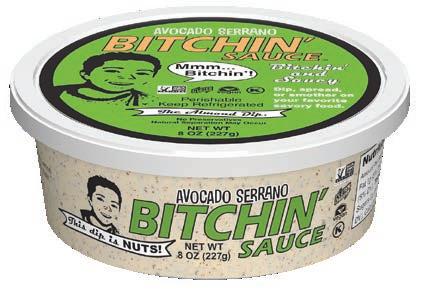
54 progressivegrocer.com
Blackhawk Originals Choice Multi-Brand Cards
SRP: $25 to $500 denominations
As shoppers have shown a penchant for customization, they can also do their own thing with gift cards, thanks to an offering from Blackhawk Network. Choice Multi-Brand Cards allow users to redeem however they want and to split their purchase between brands. The timing was right for this introduction, given consumers’ changing gift-giving and -buying habits over the past couple of years. The cards were rolled out during a high-volume gift-giving season, supported by a campaign that included 520 promotional events and partnerships with influencers on TikTok and Instagram. This personal touch was appre ciated, as the platform drove 150% growth in sales for participating partners, and the cards are now available at more than 38,000 locations and across nine digital partner sites in the United States.
Boba Bam
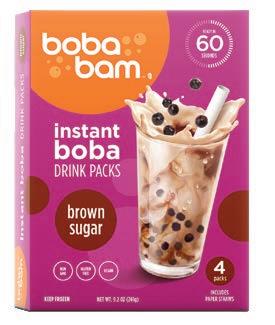
SRP: $7.99 per 9.2-ounce 4-pack Boba is big in beverages right now, espe cially in the foodservice arena. Boba Bam aims to bring the boba experience home with an authentic Taiwanese boba kit for DIY drinks that are both budget-friendly and convenient. The kit includes an innovative frozen packet of boba pearls and flavored syrup, accompanied by microwave cooking instructions to ensure a consistent drinking experience. Initially available in Black Tea, Coffee, Matcha, Strawberry and Taro flavors, Boba Bam can be added to a variety of beverages, including milk, milk alternatives, tea, coffee and even spirits. The clean-label product appeals to the better-for-you crowd, since it’s gluten- and nut-free, kosher, and halal certified. Boba Bam is enjoy ing breakout success, with more than 25 million drinks sold in the first year of production, according to the company.
Brave Good Kind Tender Chicken Bars
SRP: $2.99 per 0.8-ounce bar
The meat snack category, still on a roll as high-protein diets remain popular, welcomes a lot of new entrants every year. These stood out for a particularly tender eating experience and healthy profile: They’re made from antibiotic-free, vegetarian-fed chicken. The chicken bars have sustainability appeal, too, since they’re derived from a species with a smaller carbon footprint.
Brave scored points with female meat snack consumers who are seeking a less-chewy product and an earth-friendlier option, but the items have also resonated with men. First launched in the e-commerce channel, the chicken bars have been continually added to retailers’ inventories and are now available in more than 4,000 stores. According to the company, sales data shows that these unique protein snacks have brought new consumers — i.e., first-time jerky buyers — to the category.

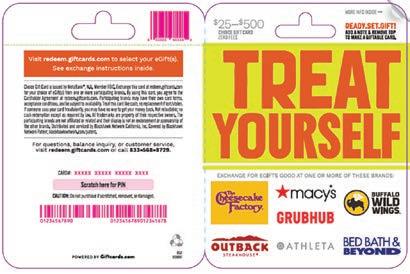
Brazi Bites Pizza Bites
SRP: $6.99 per 10-ounce bag
A healthier twist on frozen pizza snacks, these bites from a Latina-founded brand are gluten- and grain-free and made with Brazilian cheese bread. Packaged in colorful resealable bags and shipped using 100% recyclable mate rials, the bites pack 8 grams of protein per serving and are available in Pepperoni, Three Cheese and Supreme varieties. At a time when people continue to work from home, these snacks are ready in minutes in an air fryer or oven. To get the word out to as broad an audience as possible, the manufacturer deployed email campaigns, social media activities, influencer market ing and sweepstakes. Out of the box, the product launched in 5,000 distribution points during the early part of 2022, and so far, they’ve proved to be a highly incremental addition, Brazi reports.
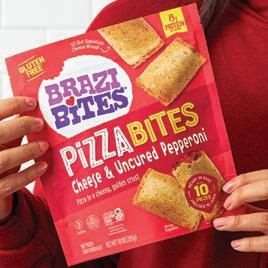
Broccoli Sandwich Thins
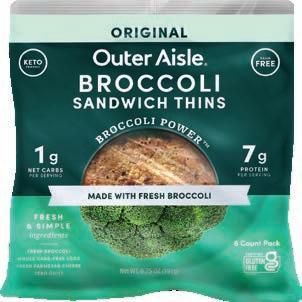
SRP: $7.99 per 6.75-ounce bag
Introduced around the first of the year — right in time for New Year’s resolutions — this vegetable bread is made with fresh broccoli, whole cage-free eggs, aged parmesan cheese and pure nutritional yeast. It provides one full serving of vegetables per piece and is gluten- and grain-free and keto certi fied. Enjoyed as an alternative to traditional bread, buns or rolls, the unique product can also be mer chandised as a fresh vegetable in the refrigerated area of a store; the colorful green packaging makes it stand out on shelf. Rolled out with targeted email and influencer campaigns, Broccoli Sandwich Thins are available at such banners as Sprouts Farmers Market, Harris Teeter and ShopRite. The item has shown staying power, too, and is now one of the manufacturer’s top three products.
PROGRESSIVE GROCER September 2022 55
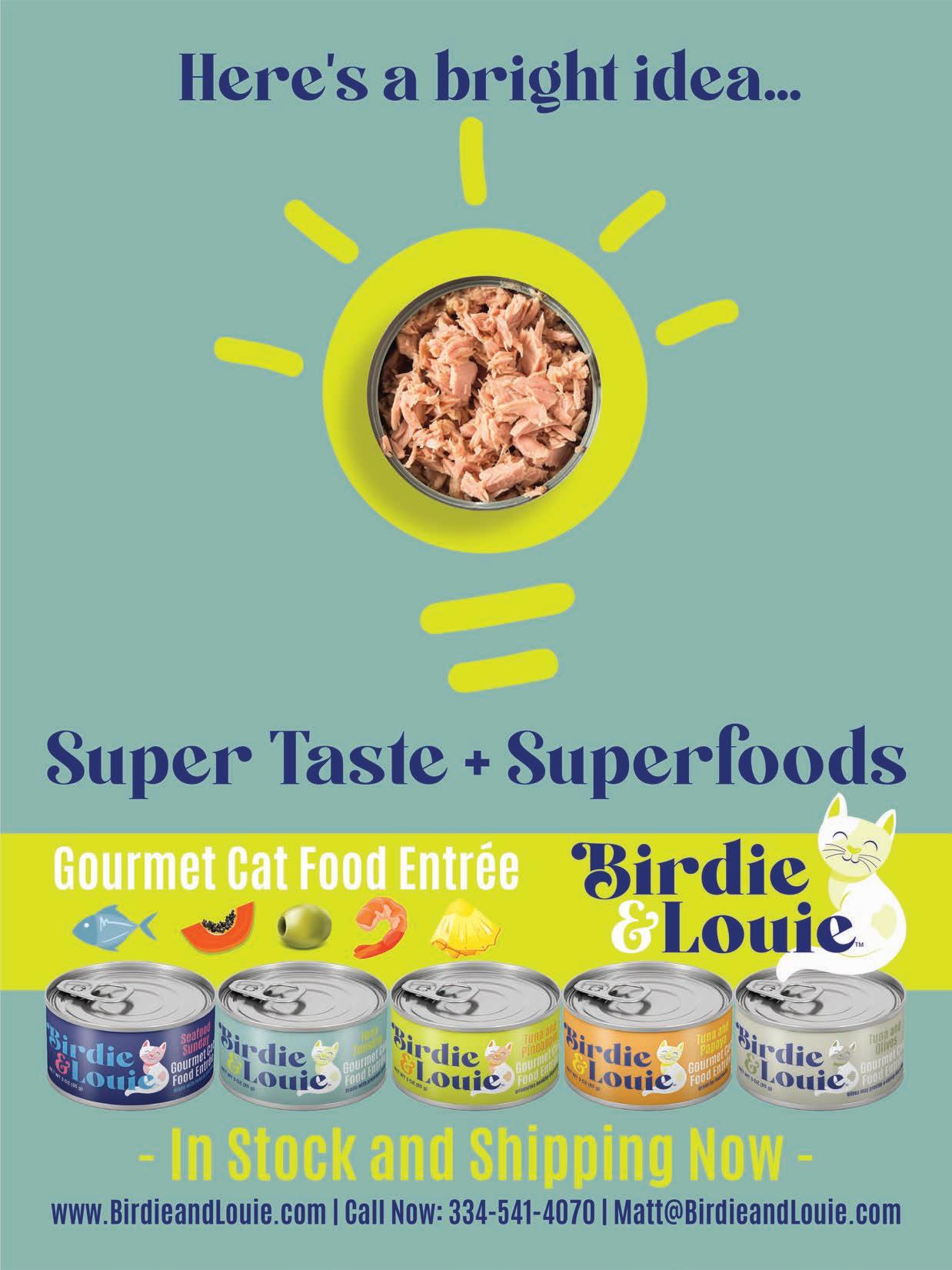
Birdie & Louie: An innovative new entrant in the Pet Food category
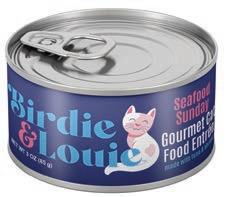
SPE KING ITH…MATTHEW WORTHY, Vice President, Worthy y P m P , q mp , b m , p v g : g, p , b p, p p , g m N m y- mp y


I 5000 F G g P v C mp m — x I J y, mp y B & L , p g y
Progressive Grocer V P M y m b m m p m y
Progressive Grocer: Your family has been a leader in household cleaning and personal care products. How did you decide to get into pet Matthewfood?Worthy: m g b p, b xp ’ g g : pp y v p mp y g x pp y p b m S , g g y m y ’ g p , b g xp p g y b g y; b v b g y g p y S b , v E , p , m , q y p g B & L
PG: How have you become the go-to company for grocers having a tough time keeping product on-shelf?
MW: R b m p C , y p 2020 2021 b g m g M x m p g g , b g L , T x m v b ’ v g b g g p ( m b m yp y ), pp p

p pp p v pp y p b m, m b p m b m q L pp m mp g b T ’ m y b m , b , , p p g g v b g v g pp y
PG: The Birdie & Louie line includes some unique products. How do the ingredients set your pet food apart? And why that is important for grocery retailers?
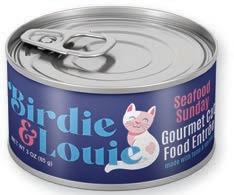
MW: O g m m mb mp g , v O p m m m m g -q y, m -g v m m O b v T T y, p m m m , S y S mp O v p T P p y (p p y g mb g b ); T P pp (p pp g g ); T O v ( v v m m p m p) v m FCO v mp b m v g v , : C & V gg , C & T y, C & R , C & S m , m m p m m g x g T mp b 66% U S v p mb xp : 65% 18- 34-y - , g p v y g p m p , p q p x v y 1 T m m y ’ pp , pp v , m p ’ b g m : T v g p g p p g m
$980 2020 $1,292 by 2025 $1,909 by 2030 1 T ’ p p b m !
PG: Finally, is there anything in the pipeline you want grocers to know about?
MW: ’ g g … y !
1 AlphaWise, the proprietary survey and data arm of Morgan Stanley Research

DVERTORI L
Bud Light NEXT
SRP: $14.99 per 6-pack of 12-fluid-ounce cans
Ten years in the making, Bud Light NEXT is Anheuser-Busch’s first-ever zero-carb beer. It’s a new type of beer brewed for today’s 21-and-over consumers who have long desired a beer that breaks the barriers of a traditional lager and offers the sessionability and stats of a seltzer. The packaging is sleek, innovative and stands out at shelf. The dividing slash that splits the word “NEXT” serves as a window into the world of what’s to come. Anheuser-Busch launched Bud Light NEXT with a Super Bowl commercial during the Big Game this year. Bud Light NEXT was able to capture and promote awareness while driving strong retail programs at launch. Since launch, the brand has brought new fans to the Bud Light family of products and incremental consumers into the cate gory, as well as adding growth to A-B’s share within the core segment.
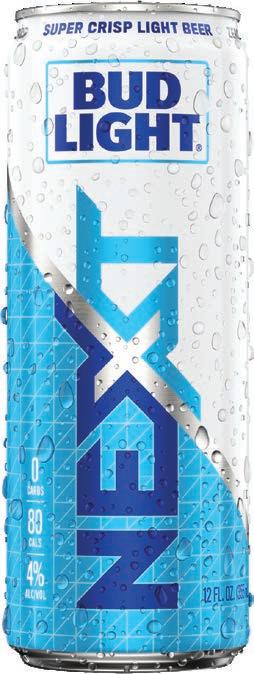
Bumble Bee Protein on the Run
SRP: $2.99 per 3.5-ounce kit
Bumble Bee Protein on the Run Kits offer consumers an elevated snacking expe rience and a delicious moment to treat themselves with one of three delectable flavors of tuna. Designed to serve as a portable and easy-to-grab lunch or snack, Protein on the Run snack kits are part of the Bumble Bee Prime product line. Protein on the Run kits deliver between 16 and 17 grams of high-quality protein and are packaged in pop-open recyclable boxes that combine convenience with en vironmental consciousness. The product line offers the first gourmet tuna snack experience on the market. Each kit comes in one of three flavors — Zesty Lemon, Black Pepper or Mild Jalapeño — and features buttery, savory artisanal crackers and a rich, smooth caramel treat to finish. Protein on the Run is stimulating recon sideration in its category by showing how Bumble Bee can meet consumers’ needs for convenience, health and portability — all within premium snack experiences.
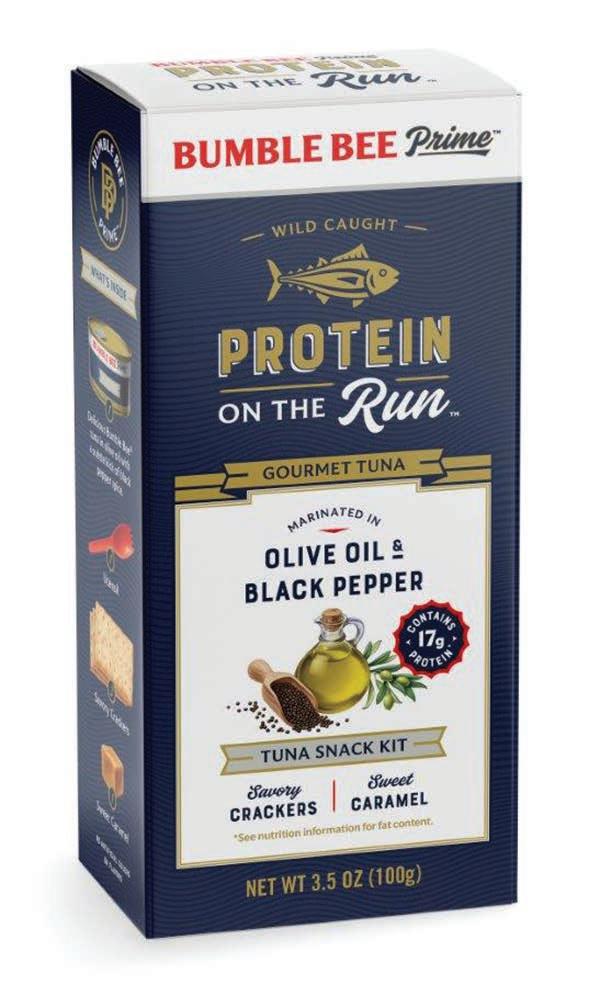
Califia Farms Zero Sugar Oatmilk
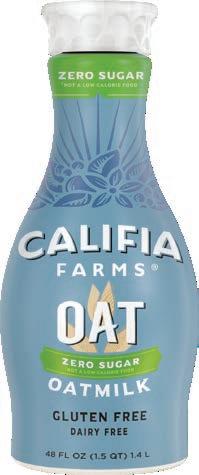
SRP: $4.49 per 1.5-quart bottle Consumers, especially Gen Zers and Millennials, are eager to test and explore plant-based options that meet their flavor and nutri tional needs. Zero Sugar Oatmilk appeals to the 72% of consumers who are choosing to limit or avoid sugar entirely in their diets but love the creaminess of oat milk. Califia Farms Zero Sugar Oatmilk fills this need, offering this growing consumer base a zero-sugar, dairyfree swap for a variety of occasions. the product is an excellent source of calcium and vitamins A and D. Made with gluten-free oats that have gone through a proprietary process to reduce their amount of sugar, the zero-sugar oatmilk is non-GMO Certified, kosher and made without preservatives. Delicious sipped straight from a glass, the product is also a versatile dairy-free alternative for all culinary applications — anything from savory dishes and sweet baked treats to smoothies.
Cappello’s Keto/Low-Carb Pizza
SRPs: Keto Pizza Crust, $7.99; topped pizzas, $10.99
Cappello’s, which thoughtfully develops products with flavor and nutritional relevancy in mind, has introduced keto-friendly, low-net-carb pizzas. These pies combine authentic pizza taste and texture with easy cook times and mindful nutrition. The line comes in a “naked” op tion for re-creating low-carb versions of pizza favorites, or topped versions in Whole Milk Mozzarella and Buffa lo Ranch with Roasted Cauliflower varieties. Not only do these pizzas meet the basic nutritional desires of keto enthusiasts, keto diet dabblers, general low-carb seek ers and health-conscious consumers, but they also are intentionally crafted for holistic health and nutrition and provide benefits not seen in other keto pizzas on the market, thanks to the incorporation of turnips as a main ingredient. These benefits include being an excellent source of fiber; high in protein, healthy fats and calcium; and a good source of iron, vitamin E and antioxidants.
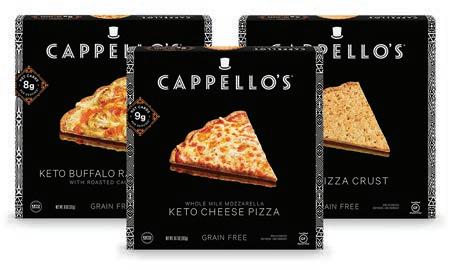
58 progressivegrocer.com
Catalina Crunch Keto-Friendly Crunch Mix
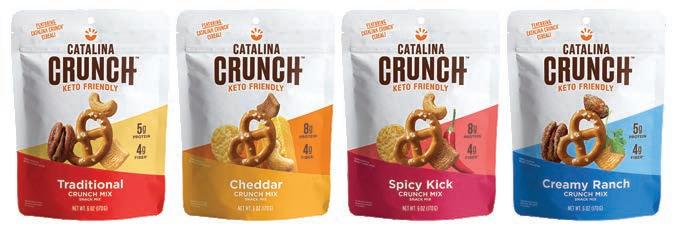
SRP: $6.99 per 6-ounce pack
With the same delicious taste and crunch of traditional party mixes, this better-for-you mix features a crunchy blend of nuts, chickpeas, pretzels, cheese crisps and Catalina Crunch Cereal pieces. Keto-Friendly Crunch Mix delivers on the brand’s mission to make healthier foods that are accessible and convenient for a variety of lifestyles, while simultaneously delivering on taste and satisfaction. With the use of innovative and versatile ingredients such as chickpeas, this snack mix delivers a nutrient-dense, satiating crunch. The keto-friendly party mix also includes nuts high in protein and healthy fats, such as cashews, pecans and almonds, as well as naturally low-carb chickpea pretzels. According to a ketogenic diet market report by Grand View Research Inc., the keto snack market was valued at $9.57 billion in 2019, with anticipated growth of more than $5 billion across an eight-year period, and the demand for low-carb snack varieties continues to skyrocket.
Challenge Butter Snack Spreads
SRP: $3.99 per 6.5-ounce tub
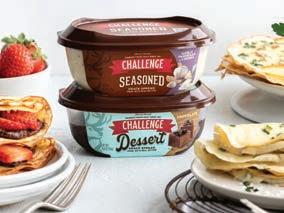
Challenge Butter Snack Spreads add quick and bold flavor to any dish any time of day. The spreads are made from real butter and nothing artificial. They can be used for spreading, dip ping, drizzling, topping, tossing, sautéeing and more. The product is available in three dessert profiles, Chocolate, Vanilla Fudge and Salted Caramel, as well as three seasoned varieties: Buffalo, Everything Seasoned, and Garlic Parmesan and Herb. Consumers can mix and match the spreads with their favorite foods for an outrageously snackable experience. Challenge Butter Snack Spreads has increased consumers’ usage of butter in dayparts, enhancing usage occasions and adding incremental sales to grocery baskets. Addi tionally, they have appealed to consumers’ growing interest in snacking by making it possible for them to enhance their favorite noshes and meals quickly and easily.
Chefs Life Culinary Oils
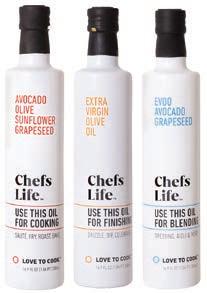
SRP: $12.99 per 16.9-ounce bottle
The three most compelling attributes of Chefs Life Culinary Oils are the brand’s “how-to” labeling, premium restau rant-quality blends, and beautiful, counter-worthy bottles. Each oil is designed for a specific purpose in the cooking process, eliminating consumer guesswork in the kitchen. First, the brand’s “use this for” label ing streamlines the cooking process for at-home cooks. Second, if there is one thing all chefs agree on, it’s that the quality of the oil is key to any great dish. The Culinary Oil line offers three blends for every step in the cooking process: Cooking Oil, Blending Oil and Finishing Oil. Lastly, along with direct labeling and restaurant-quality ingredients, Chefs Life’s clean, white, simple glass bottles look beautiful on any shelf, offering a luxury product at an affordable price. The brand’s culinary oil blends stand out from others in the category, as they are expertly crafted and keep the consumer first in mind.
Chicken of the Sea Crispy Stuffed Shrimp
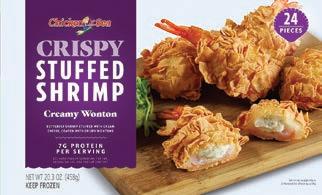
SRPs:$14.99 per 20.3-ounce 24-piece pack; $19.99 per 27.09-ounce 32-piece pack
For consumers in search of easy, readyto-cook products that offer a restau rant-quality experience at home, Chicken of the Sea Crispy Stuffed Shrimp provides a quick, unique meal. The Crispy Stuffed Shrimp line comes in three on-trend flavors, Creamy Wonton, Thai Sweet Chili, and Creamy Garlic and Spinach, offering restaurant-level dishes made in minutes in one’s home kitchen. When looking at other value-added breaded seafood options on the market today, the company found that most products include only plain breaded shrimp and fish. Chicken of the Sea sought to change that with this product launch, bringing to market novel flavor profiles with decadent stuffings and innovative breading. The line’s varieties can serve as an appetiz er or dinner item, with the added conve nience of easy prep in an oven or air fryer.
Clio Vanilla Almond Granola & Yogurt Parfait Bars
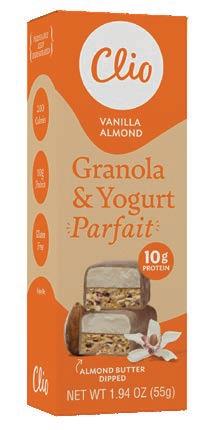
SRPs: $2.49 per 1.94-ounce box; $28 per 10-pack box
Clio Vanilla Almond Granola & Yogurt Parfait Bars are the perfect mix of health and nutrition. The bars are the most convenient way to eat yogurt and granola — there’s no need to make a bowl of parfait with a separate tub of yogurt or bag of granola, or even for a spoon. The bars combine the benefits of whole-milk Greek yogurt, which is high in protein and probiotics, with a cheesecake-like texture; a crunchy layer of cranberry almond granola; and a decadent almond butter coating. With this innovative bar, Clio transforms everyday yogurt into a craveable, ready-made re frigerated bar that’s perfect for a satisfying breakfast or anytime on-the-go snack. Offering an explosion of taste and texture in every bite, each bar is 210 calories and contains 10 grams of protein.
PROGRESSIVE GROCER September 2022 59
Coca-Cola Starlight
SRPs: $2.09 per 20-fluid-ounce bottle; $4.69 per 10-pack 7.5-fluid-ounce mini cans
























































































Inspired by the infinite possibilities of space, Coca-Cola Starlight fuses sig nature Coca-Cola taste with unexpected touches. For instance, in a nod to the coldness of outer space, Coca-Cola Starlight’s subtle cooling sensation increases sip after sip. The beverage also features an otherworldly reddish hue and a dash of indulgent unexpectedness to the core Coca-Cola taste. The product takes the current outer space macro trend within Gen Z and builds an entire experience around the idea of discovering what space may taste like.
Knowing that 72% of Gen Z teens are looking for new experiences and sensa tions to liven things up, Coca-Cola Star light offers a bold and vibrant option specifically to fit that desire. As such, the beverage provides a unique



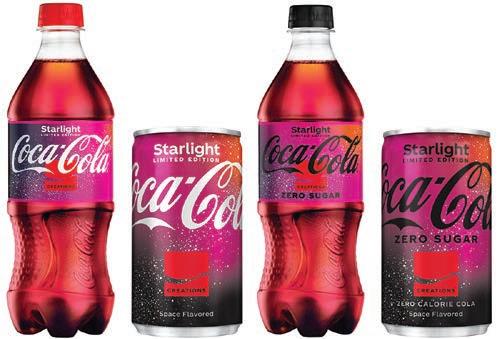
Consider Pastures Eggs





SRP: $6.49 per dozen eggs






























As the first national egg brand to embrace the principles of regenera tive agriculture, Consider Pastures is laser-focused on the welfare of its hens. The brand’s Certified Humane Pasture Raised eggs are laid by hens on small farms that offer daily access to grassy pastures where the birds can forage, scratch and dust bathe. These practices help add nutritional value to the eggs, including more omega-3 fats and vitamin D, as well as more vibrant and flavorful yolks, substantial egg whites, and thick shells. Consider Pastures is also focused on small farms, pollinator colonies, and soil health and biodiversity.

60 progressivegrocer.com
discovery.toexperiencerefreshmenttoappealGenZ’sloveof
To learn more, visit topco.com/members Congratulations Topco Owners! Your dedication to partnering together to build best-in-class brands means big wins in every aisle for your stores and for the shoppers in your communities!
Crav’n Flavor Tiramisu
SRP: $5.99 per 17.64-ounce package
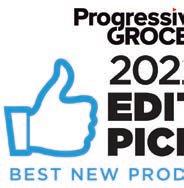



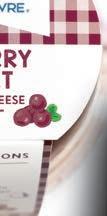
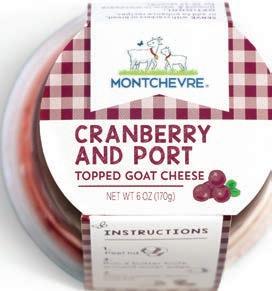
This frozen dessert is imported from Italy, made with ladyfingers soaked in coffee with zabaione and mascarpone cream, and then dusted with real cocoa powder. Crav’n Flavor Tiramisu has helped expand the brand’s growing frozen dessert assortment and adds a unique solution for Topco Associates LLC members to grow their private label penetration in the category. According to Topco, the tiramisu yields a higher margin rate in comparison with
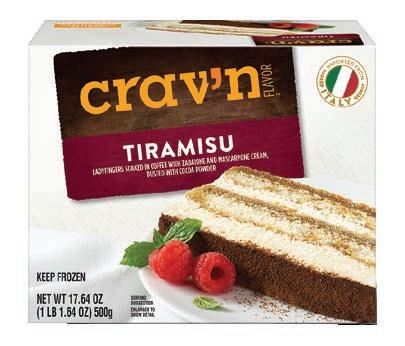
container.clableintrayadessertAdditionally,instrategiconlineadvertisements,edandfrozennational-branddesserts,hasbenefitfrommemberanpresenceandplacementthefreezercase.theisplacedonsustainablepaperandpackageda100%recypaperboard










































































































































































































HibiscusCulinaria Lime Craft Tea
SRP: $4.99 per 4-pack of 12-flu id-ounce bottles













This brewedsmall-batchteaoffers a unique flavor profile with no artificial colors, flavors or preservatives. Ac cording to Schnuck Markets Inc., the bottled beverage has become a top seller of its Culinaria private brand and isn’t found anywhere else in the local market. Along with other Culinaria products, it has added excitement, interest and innovation to the category, and it has also helped drive further customer loyalty via items available only at Schnucks. The tea has received off-shelf promotional support along with a promotional price and an aggressive marketing campaign.
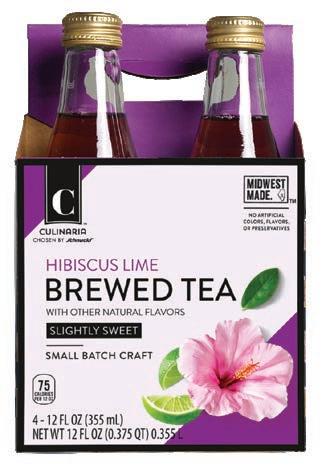
PROGRESSIVE GROCER September 2022 61
Culinaria FudgeGelato-CheesecakeLayeredCrumble
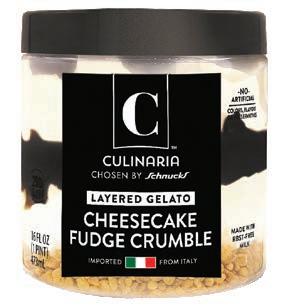
SRP: $5.49 per pint
Imported from Italy, Schnuck Markets Inc.’s private label layered gelato offers three flavor profiles in one pint-sized jar, with no artificial colors, flavors or preservatives. Made with rBST-free milk, the product has been ranked No. 1 in the multi-layered gelato segment for the Culinaria brand. According to the grocer, the brand has expanded into additional pint segments as a way to capture consumer loyalty with tasty and authentic options, and there are already plans in motion for additional multi-layered gelato frozen desserts.
Cutting Plant-BasedVedgeMeatballs
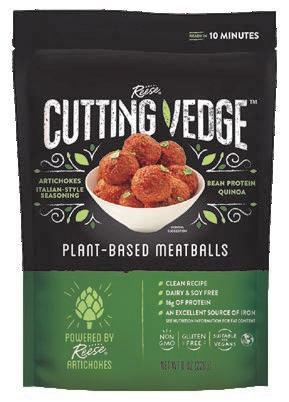
SRP: $7.99 per 8-ounce package Reese artichokes are the No. 1 ingre dient in these plant-based meatballs, along with a nutritious mix of spinach, quinoa and chickpeas. On a mission to transform the artichoke into a range of delicious food possibilities, the company partnered with chefs to curate real ingre dients that deliver on taste and texture along with protein. The meatless product is non-GMO and free from gluten, soy and dairy while also offering a good source of protein and iron. Cutting Vedge is a net-new launch that has gained distri bution with retailers such as Albertsons, Giant Food and Raley’s, and has been supported by a retailer-specific, geo-tar geted digital campaign on social media at stores’ surrounding ZIP codes.
Daily Crunch Nashville Hot Sprouted Almonds
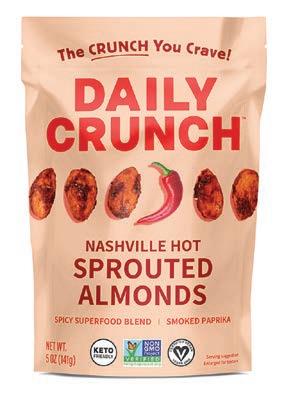
SRP: $7.49 per 5-ounce package
This spicy, crunchy and vegan snack is a nod to Daily Crunch’s hometown of Nashville, Tenn., where hot chicken reigns supreme. The sprouted almonds are com bined with all-natural ingredients, including cayenne pepper, smoked paprika, chili powder and monk fruit sweetener. The company had a 60-day exclusive with e-grocer Thrive Market to promote the launch of the almonds, which managed to sell out in the first 30 days. The product has also had a huge impact on category performance on Amazon, increasing over all sales and becoming a top 50 product in the almond category. Following a successful launch with Thrive Market and in natural product stores such as Erewhon Market and Foxtrot, Daily Crunch plans to expand the flavor into larger, mainstream retailers later this year.
Eclipse Caramel Butter Pecan Non-Dairy Frozen Dessert
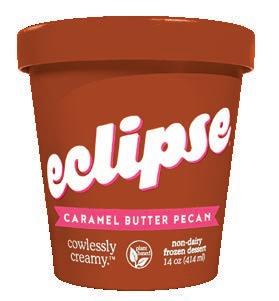
SRP: $6.99 per 14-ounce container
Eclipse Foods and its co-founder and CTO, Thomas Bowman, make innovative plant-based products that the company says are indistinguishable in flavor, texture and functionality from conventional dairy. Its patent-pending plant-based platform recreates microscopic structures in milk that give dairy its unique mouthfeel and creaminess, and in taste tests, 73% of people found Eclipse ice cream to be creamier than traditional dairy ice cream. The Caramel Butter Pecan flavor is gaining national retail distribution at Whole Foods Markets, Albertsons, Vons, Pa vilions, Central Market and other retailers, and Eclipse has driven brand awareness and trial through field marketing, in-store demon strations and shopper marketing. Social media and organic influencers have also driven word-of-mouth amplifi cation. The company additionally has a mission to create a more sustainable, healthy and humane food system.
Farmer Focus Globally Inspired Organic Pre-Seasoned Chicken
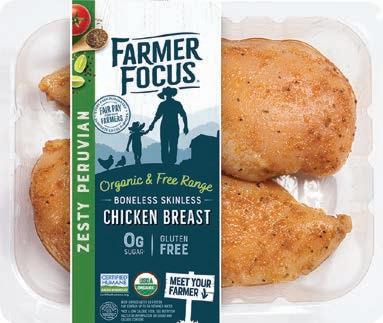
SRP: $7.79-$12.99, various weights
With consumers increasingly cooking at home since the start of the pandemic, Farmer Focus found a way to help its retail partners provide shoppers with a variety of adventurous and seasonal flavor profiles that make it easy to create the perfect meal at home. The pre-sea soned chicken line is low in sodium and gluten-free, has low to no sugar, and offers globally inspired, trend-for ward flavors: Zesty Peruvian Boneless Skinless Chicken Breast, Savory Chophouse Boneless Skinless Chicken Thighs, Rich Red Curry Bone-in Skin-on Chicken Thighs, Toasted Lager Half Chicken, and Lemon and Cracked Pepper Boneless Skinless Chicken Breast. The product packaging includes a QR code-enabled Farm ID, which makes it easier to trace each package of chicken back to the farm where it was raised.
62 progressivegrocer.com
Fila Manila Filipino Adobo Sauce and Marinade
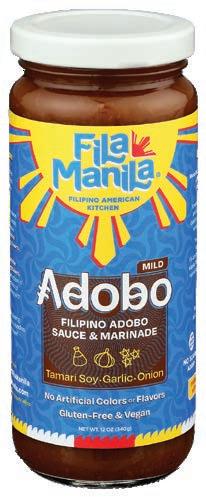
SRP: $6.99 per 12-ounce jar
First-generation Filipino American immigrant Jake Deleon was inspired to create products using his own family recipes with authentic ingredients and a modern and all-natural twist. According to De leon, Filipino Americans are the second-largest Asian American community, yet there’s very little representation in mass grocery. The company created this sauce to help spotlight Filipino cui sine and culture while making the community’s flavors accessible to all. The sauce is also nat urally gluten-free and vegan, and contains zero artificial colors, flavors and added sugar. It is now distributed in more than 1,000 stores nationwide, has become a No. 1 bestseller on Amazon, and has propelled Fila Manila to become the top Filipino brand in the United States.
Food Club Chunky Cut Tomatoes
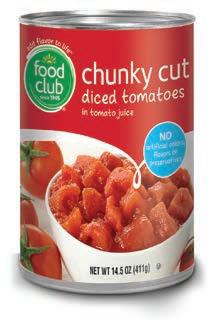
SRP: 99 cents per 14.5-ounce can
Suitable for pasta sauces, soup, chili and more, Food Club Chunky Cut Diced Tomatoes offer a larger cut for a big, bold bite and texture not found in other offerings. In a category with almost no innovation, the item provided a new option in the canned tomato aisle, enabling more options and flexibility in home kitchens. Manufacturer Topco Asso ciates LLC intends to keep communicating the unique attributes of Food Club Chunky Cut Diced Tomatoes to its membership, aiming to increase own-brand penetration and sales through weekly advertisements, strategic product placement in-aisle with aisle blades and shelf danglers, and end caps with cross-promotional opportunities. Food Club Chunky Cut Diced Tomatoes come in a traditional 100% recyclable aluminum can with a pop-top lid for easy opening.
Forager Project Organic Kids Cashewmilk Yogurt
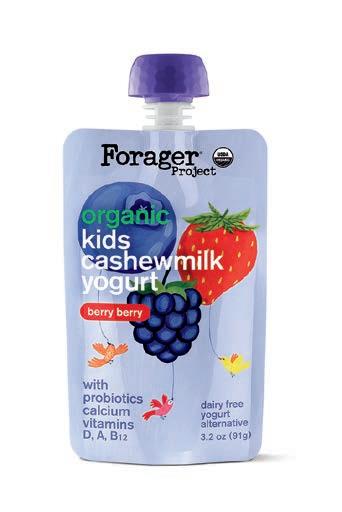
SRP: $1.99 per 3.2-ounce pouch
In contrast to the many kids’ snacks on the market that are sugar-filled, processed, and made with ingredients that aren’t derived from the earth, Forager Project saw an opportunity to upscale the entire category with 100% organic ingredients sustainably sourced from our home planet. The result was a line of 100% vegan ca shewmilk yogurt packed with probiotics, calcium, and essential vitamins D, A and B12 in convenient pouch es that allow families — even those with strict dietary restrictions — to enjoy on-the-go snacking with minimal mess. Forager’s Kids Yogurt is also vegan, gluten- and soy-free, and low in sugar. Ahead of the product launch, the brand created a robust launch plan to drive awareness and sales in store, including a Kids Yogurt VIP launch mailer sent to kid-focused influencers and top-tier media contacts.
Full Circle Market Frozen Fruit Gems
SRP: $4.99-$5.99 per 9.2-ounce box of four 2.3-ounce cups
For those in search of a guilt-free frozen treat, Full Circle Market Frozen Fruit Gems amply fill the bill: These beads of super-cold cryogenically frozen fruit and fruit juice are available in four flavors: Strawberries, Blueberries, Tropical Fruit and Strawberry Banana. At just 60 calories and dairy free, with no added sugars, artificial flavors, preservatives or synthetic colors, this novel spin on frozen fruit is a satisfying year-round snack. Flavor extensions and innovative delivery methods are just two of the options under consideration by manufacturer Topco Associates LLC to build on the per formance of this exciting private label product. Additionally, although frozen novelties aren’t known for their benefits-first packaging, Full Circle Market Frozen Fruit Gems make better-for-you goodness their main message, while the box itself is 100% recyclable.
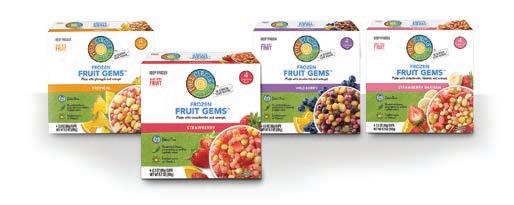
Full Circle Grain Free Granola
SRP: $4.99-$5.99 per 8-ounce pouch
Loaded with nuts and seeds, non-GMO verified, gluten-free, Paleo-friendly Full Circle Market Grain Free Granola in Maple Vanilla and Coconut Chocolate variet ies offers grain-free crunch, with no artificial colors, flavors or preservatives, at an own-brand price. Grain-free shoppers have usually had to avoid the granola aisle, but these flavorful options are a game changer. According to manufacturer Topco Associates LLC, the products have contributed to the growth of the $630 million granola category, which is growing at 3% per year, while the grain-free granola segment ac counts for $21 million in sales, with 12% growth year over year. As demand continues to rise among shoppers, Topco plans to expand flavors and packaging sizes of the line. The products are sold in a convenient resealable pouch that keeps the contents fresh longer.
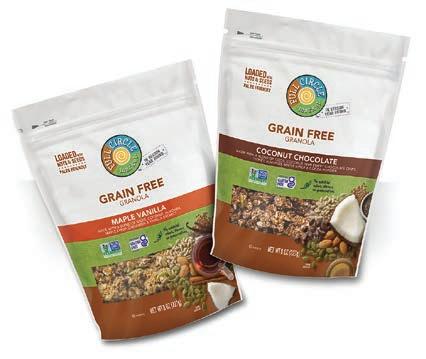
PROGRESSIVE GROCER September 2022 63
Full Circle Market Italian Style PlantBased Pasta Sauce
SRP: $3.79-$3.99 per 23.9-ounce jar
With 36% of meat eaters trying to add more plant-based foods to their diets, Topco Associates LLC saw a void within own-brand prod ucts in the pasta sauce category.
As a result, the manufacturer created Full Circle Market Plant-Based Sausage Style and Plant-Based Bolognese Style Pasta Sauces, which enable Topco member shoppers to enjoy a meatless meal with all of the familiar flavor they love, at an affordable price. Made with vegetable protein and no added sugar, these certified plant-based vegan pasta sauces contain 5 grams of protein, making them a wise choice for health-conscious shoppers seeking full-flavored plant-based options in the pasta sauce aisle. Full Circle Market Plant-Based Sausage Style and PlantBased Bolognese Style Pasta Sauces have stepped up to fill this demand, with additional flavor varieties currently under consideration.
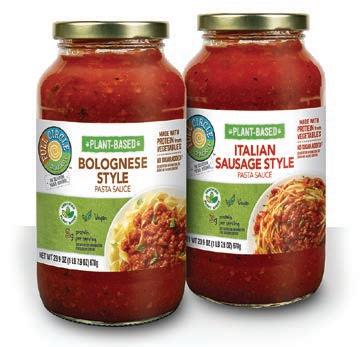
Full Circle Market Plant-Based Cheddar Cheese Alternative
SRP: $4.49 per 7.1-ounce pouch
Targeting consumers looking for health ier food choices, versatile and nutritious Full Circle Market Plant-Based Cheddar Cheese Alternative is the first-ever own-brand plant-based product in the shred segment. Dairy-free and NonGMO Certified, the flavorful plant-based option stands out with regard to both high quality and affordable price. Additionally, the item comes in a handy resealable pouch for long-lasting freshness. Noting that the plant-based cheese segment continues to grow, with plant-based shreds up 65.7% year over year and own brand growing by a whopping 40.9%, manufacturer Topco Associates LLC plans to add such popu lar shred varieties as Mexican blend and Italian blend to the line. Full Circle Market Plant-Based Cheese Alternative products currently include Cheddar, Mozzarella and Monterey Jack with Peppers varieties.
Genuine Coconut Organic Coconut Chunks
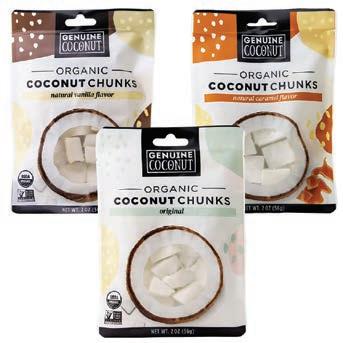
SRP: Below $3 per 2-ounce bag
Genuine Coconut Organic Coconut Chunks are USDA Organ ic, naturally sweet, ready to eat and designed for on-the-go snacking. Featuring freshly peeled and cut 100% raw coconut meat, the snack is a great source of fiber and potassium and has just two ingredients: organic coconut infused with natural flavoring. Grown in India without pesticides or synthetic fertiliz ers, the chunks are verified non-GMO, vegan and gluten-free, and contain no added sugars or preservatives. In addition to a 45-day shelf-life guarantee, the product promises versatility: When not being enjoyed as is, it can be used in smoothie bowls, yogurt, oatmeal and more. The item has been widely promoted via social, digital and trade show appearances, with Genuine Coconut also employing targeted retailer advertisements and influencer marketing, and planning for competitive pricing and national distribution.
Good Culture Lactose Free Cottage Cheese
SRP: $3.49 per 15-ounce tub
Good Culture Lactose Free Cottage Cheese gives the approximately 65% of the U.S. population who have difficulty digesting lactose the ability to enjoy thick, creamy, nutrient-dense cultured cottage cheese with out gastric discomfort — and also without sacrificing quality or taste. At 14 grams of protein per serving, the keto-certified product is made with only five simple ingredients: pasture-raised milk, cream, sea salt, gut-friendly probiotic cultures and lactase enzyme. Sourcing pasture-raised milk from small Midwestern farms ensures that Good Culture is offering chemical-, pesticide-, hormone- and antibiotic-free ingredients from trusted sources. The product launch (in 100% recyclable packaging) was supported by an aware ness-driving digital marketing campaign designed to drive lactose-free shoppers to local retailers, while a robust shopper marketing plan including shelf talkers and coupon events aimed to drive trial at store level.
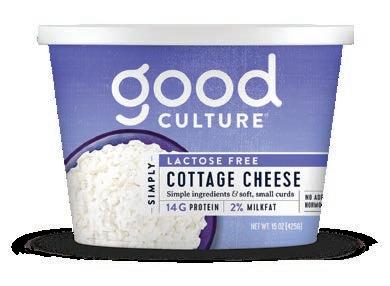
Good Planet Foods Snackable Plant-Based Cheese Wedges

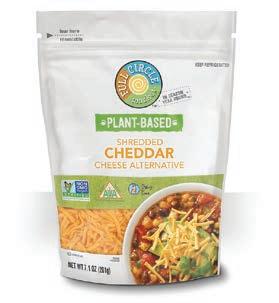
SRP: $4.99 per package of six 19-gram wedges
First-to-market Snackable Plant-Based Cheese Wedges from Good Planet Foods are crafted with real allergen-free, eco-friendly ingredients such as coconut oil and plant starches and proteins. Available in Pepper Jack, Smoked Gouda, and Original varieties, the creamy, individually wrapped wedges boast a texture and flavor profile similar to their dairy counterparts. The product is also versatile enough to be melted into con sumers’ favorite recipes. Good Planet Foods is support ing its Snackable Plant-Based Cheese Wedges through various marketing channels, among them public relations efforts and social media. The company also worked with key retailer partners as well as shopper programs to promote trial of the snackable wedg es, which are packaged in a recyclable cardboard container that uses 90% post-consumer material and sports bright, cheerful primary colors to make it easily shoppable for consumers.
64 progressivegrocer.com




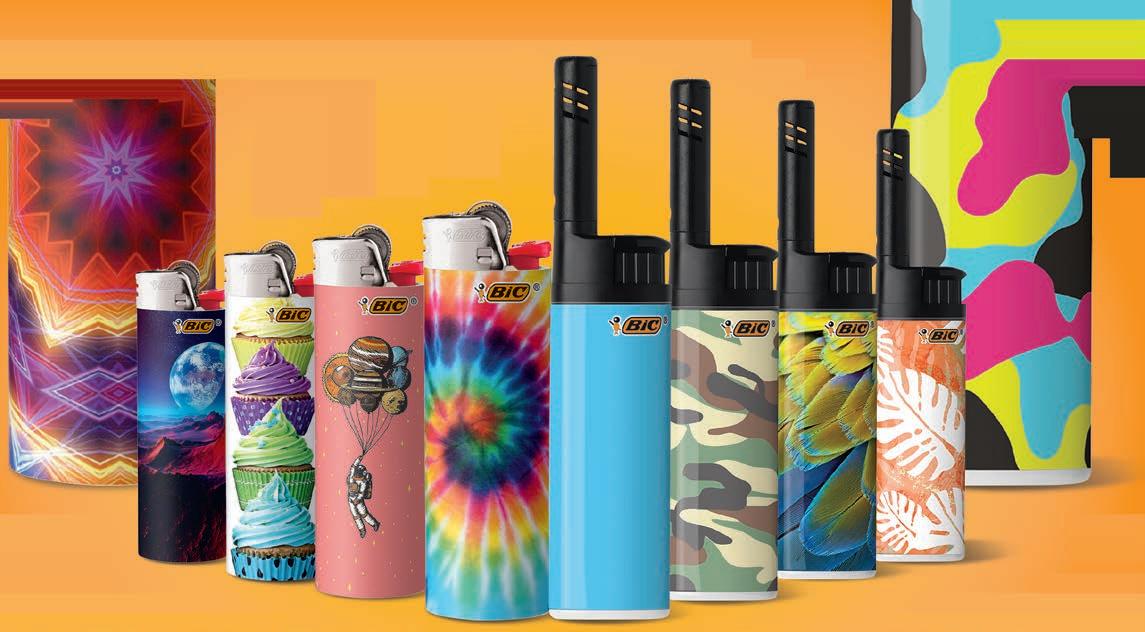
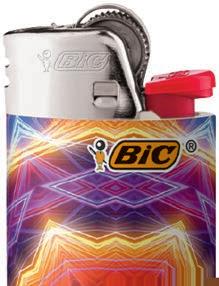
































* THE HARD-TO-REACHLIGHTERULTIMATEFORPLACESMAXI LONGEST-LASTINGAMERICA’SCLASSIC®,SAFEST&LIGHTER1 W ® LIGHT UP YOUR SALES H AL Y A AF Y © 2022 USA S T 06484 1 fix -fl - fi b b z ; *S : R N -MULO 52 k 06/05/22
Hart Dairy Naturally
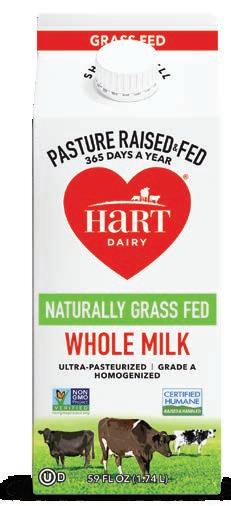
Grass Fed Whole Milk
SRP: $5.79-$5.99 per 59-ounce carton
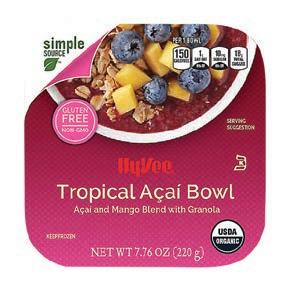
The only national brand to sell milk from cows that are pasture raised and grass fed 365 days a year, and never confined, Hart Dairy Naturally Grass Fed Milk costs about $1 less than organic grass-fed brands, on average. The milk has a uniquely full, rich and creamy flavor, as well as being naturally higher in omega-3s and conjugat ed linoleic acids (CLAs) than conventional milk. Hart Dairy frequently deployed in-store promo tions (TPRs) to drive trial and repeat purchases of the product, along with executing digital coupons and paid social media campaigns to generate awareness, and attending national trade shows to engage supermarket buyers and spark interest.
The first Certified Humane pasteurized dairy cow operation in the United States, Hart Dairy is also on ASPCA’s Shop With Your Heart list.
Heinz Dip & Crunch
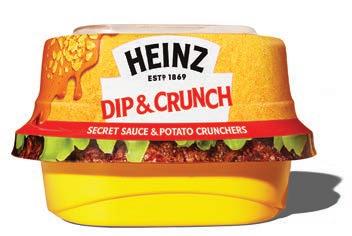
SRP: $2.49 per 3-ounce pack age (good for one burger) Adding more fun to eating hamburgers and other sand wiches, this packaged duo combines a Heinz sauce and salty potato “crunchers” for a satisfying multi-textural eating experience. The pairing of a
mayo-based sauce and chips — meant for dipping and topping, respec tively — is a real innovation in the condiment section and was based on the company’s extensive consumer insights on how people enjoy their burgers. After originally launching the product at Jack in the Box restaurants on the West Coast, Kraft Heinz expanded Dip & Crunch into the retail sector in spring 2022, noting that “there is no line between what consumers can get at a restaurant and what they can get at home.” The brand’s condiment line received a 15% year-over-year lift with the introduction of this item.
Hy-Vee Açai Bowls
SRP: $3.48 per 7.76-ounce container
The middle of Iowa may not be tropical, but that look, taste and feel was on the minds of product developers working for West Des Moines-based Hy-Vee. For its store-brand offerings, the retailer sought to create an on-trend açai bowl and start ed with a creamy sorbet base made with fresh açai berries, topped with crunchy granola and fruit. To make the item acces sible to shoppers, Hy-Vee chose a readyto-eat format and set it at a value price point. Marketed as a snack or meal across different dayparts, the açai bowl is supported by social media exposure and promotions in Hy-Vee’s monthly Mega Ad that reaches millions of consumers. It’s already causing a stir at the point of sale, thanks in part to its vibrant packaging, which features a peel-able lid.
Impossible Chicken Nuggets Made From Plants
SRP: $8.99 per 13.5-ounce stand-up bag
Which came first, the chicken or the plant? Offering the taste of animal-based protein with plant-derived ingredients, this product aims to deliver both expe riences. The nuggets pack 13 grams of protein per serving with 30% less fat, no cholesterol and lower sodium compared with traditional chicken nuggets. The product benefits from a better-for-you and a bet ter-for-the-planet halo among consumers, as it’s made using 49% less land, consuming 44% less water and emitting 36% fewer greenhouse-gas emissions than regular poultry. The item also seems to have cleared the high threshold for taste, scoring higher than the leading animal chicken nuggets in a blind taste test and coming out on top in a promotional Impossible Nugget Throwdown food-truck tour of five U.S. cities.
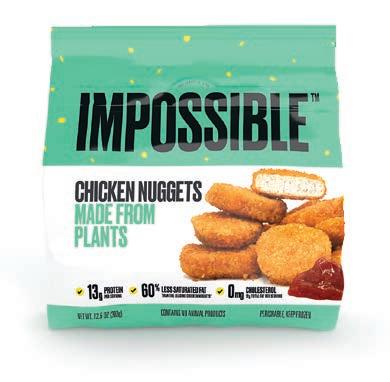
Jeni’s High Five Candy Bar Ice Cream $12 per pint
Living up to its name, this decadent ice cream variety received some enthusiastic gestures of approval upon its introduction. Based on the High Five candy bar, a favorite of brand founder Jeni Britton, the product is made with a blend of ultra-creamy peanut butter ice cream with caramel sauce, chocolate-covered pret zels and chocolate flecks, reflecting Jeni’s signature inventive indulgence. Product developers spent time getting the base to taste more like real nougat instead of just a simple salted peanut butter ice cream (The secret? Honey). The decadent flavor has outperformed oth er new varieties that entered the category at the same time, flavors.top-10becomethatfact,overalltoincrementaldrivinggrowththebrandandcategory.InJeni’sreportstheSKUhasoneofitsperforming
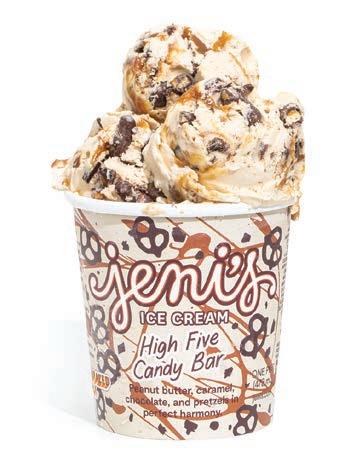
66 progressivegrocer.com
Kazoo Tortilla Chips
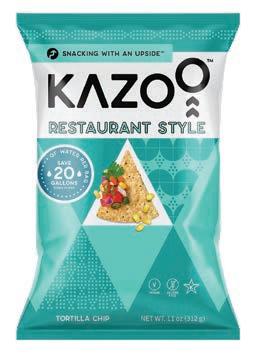
SRP: $4.99 per 11-ounce bag
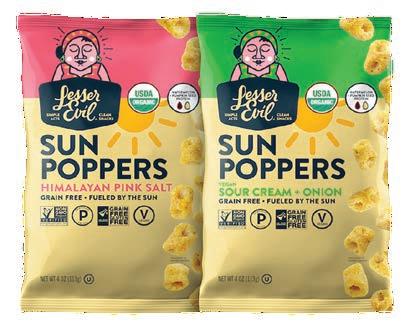
These aren’t chips off the old block: Kazoo Snacks has come out with what it says are the first upcycled, water-saving tortilla chips on the market. Made with 40% upcycled corn germ, the product is also higher in enzymes, healthy fats, oils and nutrients, and contains 61% more vitamin K. Kazoo reports that in their first year, the chips have saved nearly 1 million gallons of water, a step in the brand’s overall goal to save 1 billion gallons of water by 2025. The water claim is right on the package as a way to signal that the item is a sustainable choice. Available in Restaurant Style and Lime Zest varieties, the tortilla chips will soon be available in 100% sustainable packag ing to close the loop even tighter. Kazoo is also planning to release more flavors, including Chili Lime, Nacho, Spicy Nacho and Ranch.
Keto Krisp Butter & Salt Bar with Collagen
SRP: $35.99 per 12-pack
As keto eating lifestyles keep revving forward, this product fires on all product development cylinders. It’s high in protein, indulgent in a sweet and salty way, and function-forward. Combining the flavor profiles of ke to-friendly butter and savory Himalayan salt, the snack provides 10 grams of protein with 4 net carbs and 2 grams of sugar. Functional collagen is a bonus at a time when consumers are seeking enhanced nutrition from their convenient snacks. As part of the rollout, the brand gave away 20,000 bars via a Whole Foods Market sampling event, took part in a new product launch with distributors UNFI and KeHE, and promoted the introduction with in-store demos, special displays, and partnerships with influencers and recipe creators, among other activities.
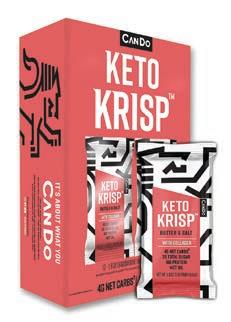
La Terra Fina Tzatziki with Feta Dip and Spread
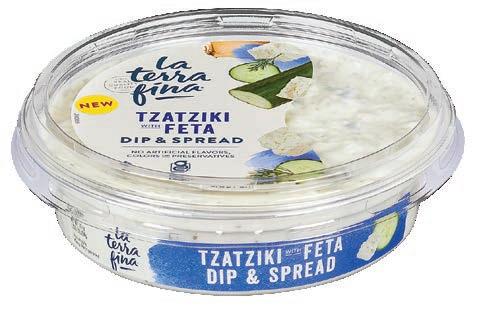
SRP: $5.49 per 10-ounce tub
It’s a dip. It’s a spread. It’s a hit. This product appeals to a broad range of consumers because of its versatility and clean-label profile. The keto-friendly, gluten-free item is made with dairy sourced from cows not treated with rBST and offers a smooth texture and balanced flavor from such ingredients as feta cheese, Greek yogurt, cucumbers and fresh herbs. It pairs well with vegetables, sandwiches and salads for everyday and entertaining occasions, an attribute that the brand has emphasized in its inspiring recipe videos. While shoppers have discovered the dip and spread at grocery banners such as Kroger, Harris Teeter, Price Chopper, Market Basket, WinCo and Hy-Vee, the product has also garnered at tention as a winner of People magazine’s food awards, chosen from among 1,300 entries.
LesserEvil Sun Peppers
$3.99 per 4-ounce bag
It’s literally a mashup between consumers’ propensity for snacking and their desire to live a more sustainable lifestyle: a salty snack made from upcycled water melon and pumpkin seeds. Indeed, LesserEvil’s Sun Poppers meet a lot of preferences among today’s shoppers: They’re plant-based, USDA Certified Organ ic, grain- and gluten-free, kosher, vegan, non-GMO Project Verified, kosher, and available in two flavorful varieties: Vegan Sour Cream + Onion and Himalayan Pink Salt. At 130 calories per serving, the product is marketed as a snack that one can feel good about eating. Whole Foods Market is LesserEvil’s biggest partner for distribution of these novel snacks, which are also available at many independent grocers. The line won “Best of Show” at KeHE Distributors’ 2022 summer show. Look for a new Nacho variety soon.
Koe Tropical Organic Kombucha
SRP: $2.49 per 12-ounce can
Considering that health-oriented consumers haven’t soured on the kombucha trend, this functional beverage has really hit the mark. Taste is a differentiator, as the fruit-forward drink is palate-friendly and available in six flavors: Tropical (the latest flavor), Watermelon, Strawberry Lemonade, Raspberry Dragonfruit, Mango and Blueberry Ginger. Koe kombucha is organic, non-GMO and natu rally sweetened with a touch of organic sugar, and it contains 200% or more of the recommended daily value of vitamin C. The vibrantly hued, recently redesigned packages are shelf-stable and recyclable, and sell at a price point that’s 25% less than traditional kombucha per serving. Shoppers can find it at grocery, club and c-stores around the country, and it’s already grown more than 16 times faster than the kombucha category, according to Koe.
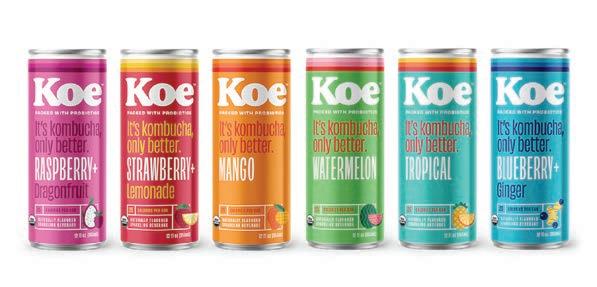
PROGRESSIVE GROCER September 2022 67
Marquis BeveragesLifestyle

SRP: $34.99 per 12-pack of 12-flu id-ounce cans



The developers behind this product wanted to create a drink that offers a balanced, smooth “lift” without the caffeine crash.

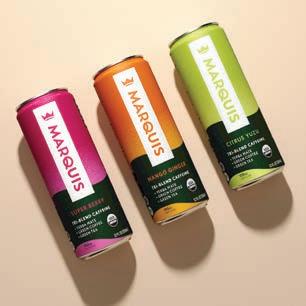
Made with a blend of yerba mate, green coffee and green tea, and sweet ened with monk fruit, the plant-based beverage is “a better way to caffeinate for every occasion,” accord ing to the Marquis brand. The drink is also certified vegan, non-GMO, gluten-free and organic, with zero sugar and zero calories, and enhanced with four types of B vitamins, antioxidants and vitamin C — pretty much addressing many of consumers’ nutritional preferences. Grocers can merchandise it in a variety of ways: as an alternative to coffee, tea, energy drinks and sodas, or as a cocktail mixer. Marquis Lifestyle Beverages are currently available in four fruit-flavor varieties.
Maxine’s ChocolateHeavenlyChipCrispy Cookies
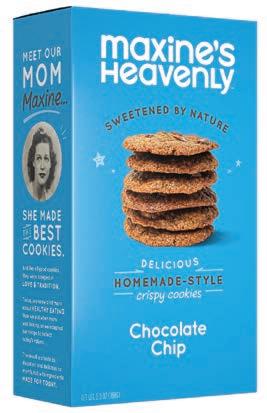
$6.99 per 6.3-ounce box
While other brands use trendy “zero-sugar” sweeteners, Maxine’s Heavenly cookies are “sweetened by nature,” using coconut sugar and dates, making the cookies a low-glycemic guilt-free treat. The prod uct also has a homemade, freshly baked taste evoking the decadence of conventional cookies, but made with clean ingredients that consumers can feel good about eating. Maxine’s Heavenly was able to achieve this feat by using the cleanest, healthiest and most sustainable ingredients, without compro mising on taste. Although made from recipes based on those handed down by the co-found er’s mother, the eponymous Maxine, the cookies still manage to be vegan and gluten-free, and to exclude most major allergens.
68 progressivegrocer.com
Momofuku Goods Noodles
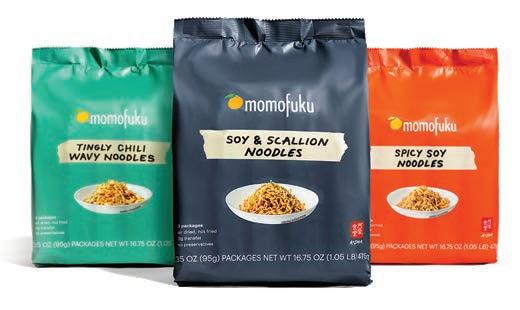
SRP: $11.99 per 16.75-ounce 5-count package
Momofuku Goods aims to prove that at-home instant ramen noodles can be a gourmet experience. Ready in four minutes, the noodles have no added preservatives or artificial flavorings. Plus they’re never fried or frozen — a major differentiating point from many other products on the market — making them as nutri tious as they are delicious. The brand uses an 18-hour air-drying process that also sets these noodles apart. The result: 25% fewer calories than most instant noodles, double the usual amount of protein, and zero milligrams of cholesterol. Momofuku Goods Noodles additionally combine the convenience of packaged noodles with the restaurant-level flavor that Momofuku is known for. The product line is available in three bold, restaurant-worthy flavors: Spicy Soy, Soy & Scallion, and Tingly Chili.
Montchevre Topped Goat Cheese
SRP: $6.99 per 4-ounce package
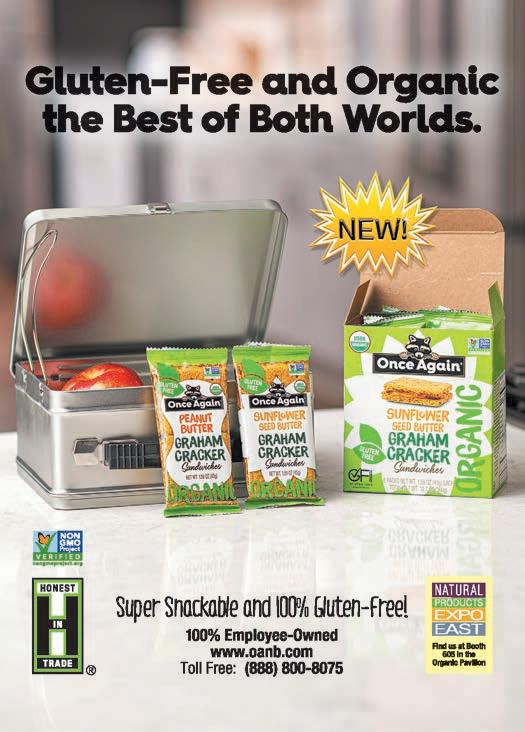
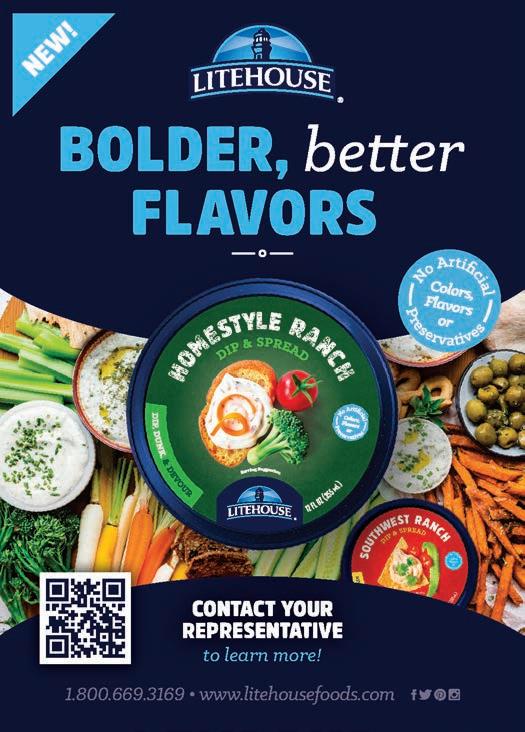
Saputo’s Montchevre Topped Line is all about targeting con sumers crazy for boards — charcuterie boards, that is. Gourmet ingredients top Montchevre’s rich, creamy goat cheese, making it an ideal choice to serve at dinners, picnics, office gatherings and other occasions. The flavors of Cranberry and Port and Roasted Red Pepper are ideal for sweet and savory palates, while the packaging stands apart from others in the category, because it allows consumers to simply unwrap the topped cheese, flip the cup over and serve. This packaging design, rarely seen in the cate gory, also enables customers to choose their own flavor and serving journey, making the product appealing as well as easy to use in any format (dip, spread, etc.). The product can be served hot (melted) or cold, and paired with a variety of foods — crackers, breads, veg etables, fruits, salads and more.
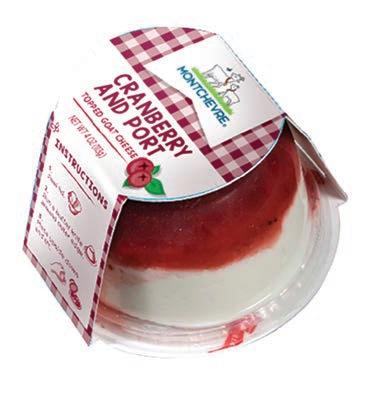
PROGRESSIVE GROCER September 2022 69
Moon Cheese Crunch Cheese Sticks
SRP: $4.99 per 3-ounce bag
Moon Cheese, the 100% cheese snack brand, has added Crunchy Cheese Sticks to its lineup. Moon Cheese Crunchy Cheese Sticks are the first shelf-stable cheese snack product in a stick or puff format made from 100% real mozzarella cheese. These snacks have four times more protein than leading brands — 14-15 grams — only 3 grams of carbohydrates, and 1 gram or less of sugar per serving. The cer tified gluten-free, keto-friendly snack is made with rBST-free cheese and contains no artificial flavors. The product line is available in five flavors: Cheesy Does It, Wild White Chedda’, Kick It Up a Nacho, Rowdy Ranch and Yum Inferno. Moon Cheese Crunchy Cheese Sticks provide superior nutrition over the mostly extruded cornbased cheese stick snack products currently available. The item is packaged in bold, colorful and eye-catching bags, each of which is double-lined with a premium seal designed to retain the freshness of the 100% real cheese snack.
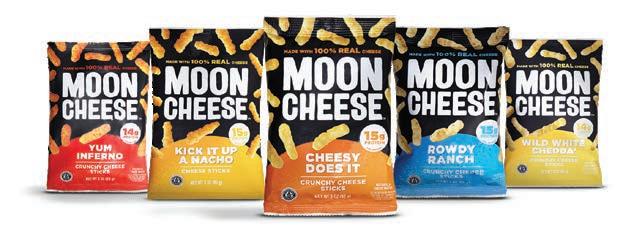
Mrs. Goldfarb’s Unreal Deli Steak Slices
SRP: $7.49 per 5-ounce package
Mrs. Goldfarb’s Unreal Deli Steak Slices are a mouthwatering innovation packed with 15 grams of plant-based protein per 2.5-ounce serving. The plant-based deli meat is made with ingredients that consumers will recognize: lentils, black rice and shiitake mushrooms. Unreal Deli products use only simple, clean ingredients to create an option that’s not only eco- and animal-friendly, but also tastes as close to the real deal as pos sible. Each slice of this steak is kosher and free of cholesterol, nitrates and GMOs. Unreal Steak Slices are also packaged in a distinctive bag. The brand aims to keep innovating by partnering with mainstream influencers such as Kevin Smith on his Mooby’s franchise and Goldbelly deals to help reach wider veg-curious and flexitarian audiences.
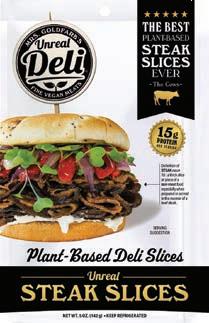
Nasoya Plantspired Steak
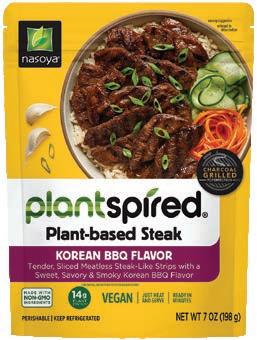
SRP: $6.99 per 7-ounce pouch
Mooless is an animal-free whey protein powder mo lecularly identical to the traditional whey protein found in cow’s milk, but made via fermentation without any animal inputs. The 20 grams of animal-free whey protein found in Mooless offer the same nutrition, taste and tex ture as conventional whey protein powder, but without hormones or lactose, and with significantly less environ mental impact. Created by Perfect Day, Mooless’ whey protein generates up to 97% fewer greenhouse-gas emissions, 99% less water consumption and 60% less energy use compared with conventional whey protein powder production methods. The smooth mouthfeel and flavors of Chocolate Fudge Brownie, Cookies & Cream, Strawberry Shortcake, and Vanilla Bean Cupcake help Mooless blend perfectly into smoothies or wherever protein powder is added.
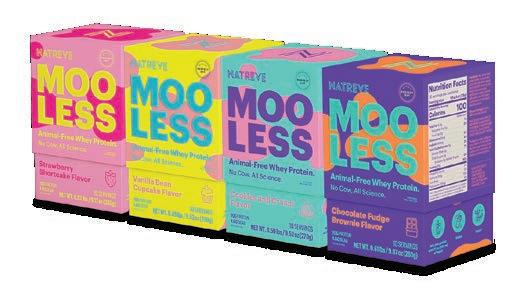
As consumers continue to prioritize plant-based eating, many key drivers have emerged, including an increased focus on health and sustainability. Consumers are increasingly looking for healthier, more environmentally friendly alternatives to meat while still enjoy ing authentic and satisfying flavor profiles. To help meet this growing demand, Nasoya has developed a plant-based meat alternative. Its Plantspired Steak fills a gap in the market, offering consumers a protein-packed plant-based steak option bursting with authentic Asian flavors. Crafted with non-GMO ingredients and boasting 14 grams of plant-based protein per serving, Plantspired Steak is a premium product made from soy protein and featuring a savory, meat-like texture. The product is pack aged in a convenient pouch that can easily be microwaved for a quick and accessible plant-based meal. What’s more, each pouch contains 2.5 servings, making the item a great solution for busy families and working professionals alike.
No Cow Chocolate Dipped Protein Bar
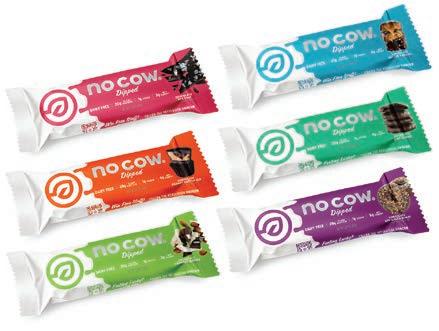
SRP: $32.99 per variety pack of 12 2.12-ounce bars
No Cow Chocolate Dipped Protein Bars aspire to offer a better taste than their ani mal-based counterparts, without compro mising on nutrition or a commitment to purely sourced, plant-based ingredients. Each dipped bar is powered by a proprietary blend of rice and pea protein and packs a whopping 20 grams of plant protein, 3-5 grams of net carbs, and only 1 gram of sugar. The bars are available in six indulgent flavors reminiscent of classic American treats, such as Peanut Butter Cup and Chocolate Mint Cookie. They meet consumers’ growing desire for options that satisfy cravings and nourish the body from a source free of animal-based proteins. No Cow’s plant-based formula produces only about 32 kilograms of carbon emissions per bar, compared with 106 kilograms for a wheybased protein bar.
70 progressivegrocer.com
Once Again Graham Cracker Sandwiches

SRPs: $1.69 -$1.89 per 1.59-ounce package; $13.52-$15.12 per retail box of eight
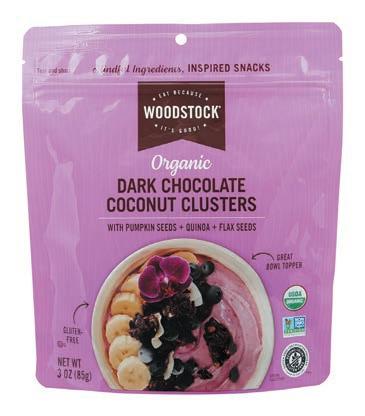





Once Again Graham Cracker Sandwiches, available in Peanut Butter and Sunflower Butter flavors, are certified gluten-free, organic and vegan, so they appeal to a variety of dietary styles. Made with a blend of organic sorghum flour, organic oat flour and organic cassava flour, along with ethically sourced peanut butter or sunflower butter, they offer a clean-label alternative to traditional snacks. The graham cracker sandwiches are handcrafted in small batches at a bakery, settig them apart from mass-produced snacks.
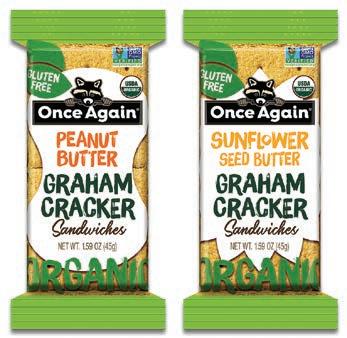
The products are also part of Once Again’s Honest in Trade program, which strives to create and sustain environmentally, economically and socially fulfilling partnerships from farm to fork. The cracker sandwiches feature packaging with a vertical representation on the shelf, lending itself to more “real estate” for its branding. Additionally, Once Again Graham Cracker Sandwiches’ cartons and pouches won the American Package Design Award for 2022.
Perfect Hydration Alkaline Water

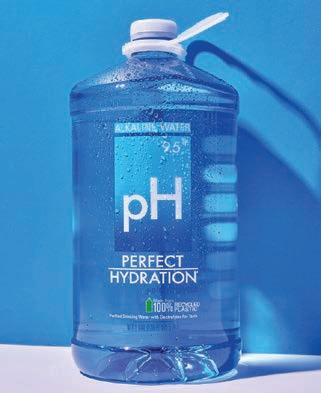
SRP: $5.99 per 1-gallon jug
The Perfect Hydration Alkaline Water Gallon offers clean, purified alkaline water in the planet-friendly packaging that more consumers are looking for. Unique in shape and design, Perfect Hydration’s container is made using 100% post-consumer recycled PET-
1 plastic and is 100% recyclable and BPA-free, making the company the only manufacturer to offer premium alkaline water in a 100% recycled-plastic 1-gallon jug. Also, unlike other water brands that mine watersheds and international mineral water springs, the brand’s water is bottled right in the United States. This means that there’s no need to transport water from remote locations across the globe, result ing in less international shipping and a lighter carbon footprint. Perfect Hydration water also stands out from other brands because every drop goes through a proprietary filtration and alkalizing process, resulting in a unique blend of electrolytes and a 9.5+ pH.
Planters Sweet & Spicy Dry Roasted Peanuts

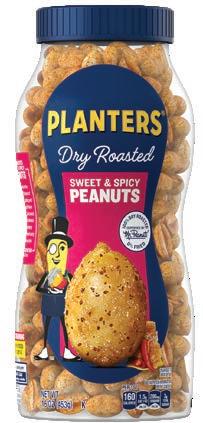
SRP: $3.25-$4.49 per 16-ounce jar


Consumers seeking new flavor experiences com pelled Planters to go “swicy” with its new dry-roasted peanuts — a unique mix of sweet honey, sugar and spicy dried red chili peppers. Through rigorous consum er research, manufacturer Hormel Foods Corp. discovered that one of the most compelling attributes of the product was the taste sensation of the sweet and spicy flavor cues that few other items in the market place offer. After a robust sampling program with retail partners and outlets such as the Cincinnati Reds and the iconic Planters Nutmobile, the marketing team is now traveling nationwide with beloved mascot Mr. Peanut to provide a first taste to consumers at retail events, community celebrations and even the 2023 Super Bowl.
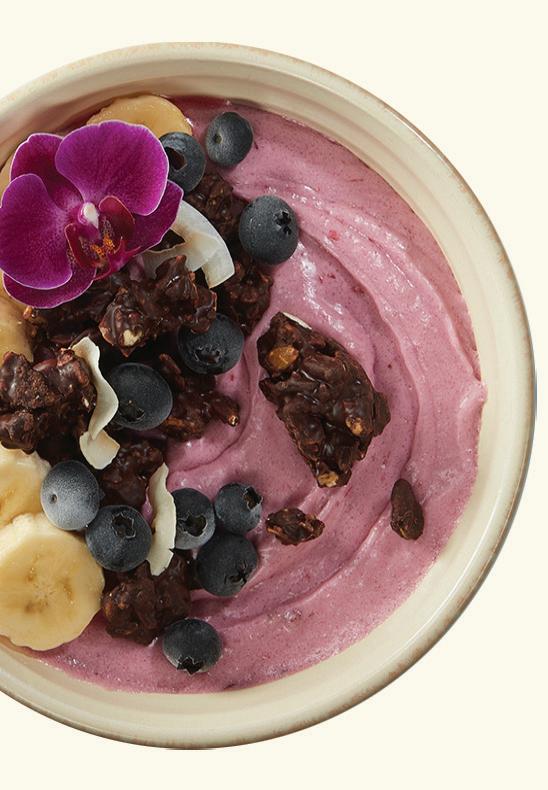
PROGRESSIVE GROCER September 2022 71
Primal Kitchen No Dairy Plant-BasedQueso-StyleDip
SRP: $7.79 per 11.5-ounce jar
Primal Kitchen’s queso uses pumpkin seed butter to create a familiar thick texture without dairy, and uses organic vegetables and spices, including bell peppers, jalapeño peppers and carrots, to create the perfect flavor. The item is Keto Certified, Whole30 Approved, certified gluten-free and Certified Paleo, as well as containing no tree nuts, dairy, soy, canola oil or sugar. The queso launched at Whole Foods Market in time for the Super Bowl and had store support with secondary placement. Primal Kitchen employed organic social content such as recipes and influencer and user-generated content awareness, in addition to advertorial content to educate consumers about the role that pumpkin seed butter plays in its new dairy- and tree nut-free formula.
Primal Kitchen Ranch Dip
SRP: $6.99 per 10-ounce jar
Available in Original and Buffalo flavors, Pri mal Kitchen’s plant-based ranch dip counts avocado oil as its star ingredient, along with other clean components, among them apple cider vinegar and organic eggs and spices. The shelf-stable dip is free from dairy and soy; keto- Whole30- and Paleo-friendly; and available in a fully recyclable glass jar. The product has launched at key natural grocers like Whole Foods Market, Sprouts Farmers Market and Thrive Market, with increased distribution expected this fall. It’s supported by influencer marketing, social advertising and trendyTikTok videos such as @lowcarbstateofmind.
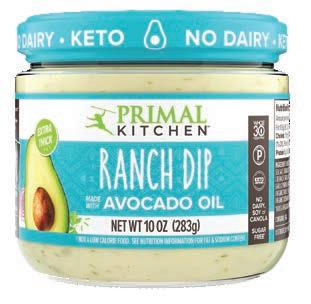
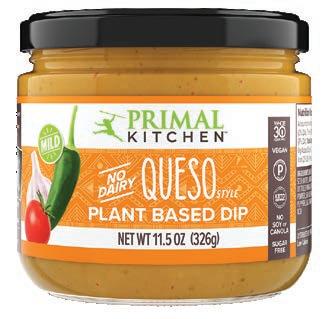
Real Good Foods Crispy Chicken Shell Tacos
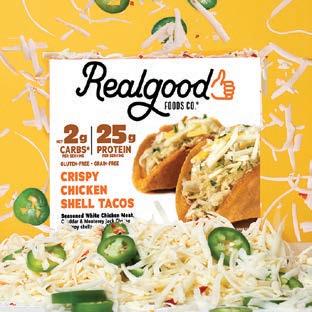
SRP: $6.99 per package of two tacos
These low-carbohydrate tacos have shells made of antibiotic-free chicken and cheese as a substitute for the classic corn or flour tortilla. The tacos come in three varieties: seasoned beef and cheddar cheese, pulled chicken with cheddar and Monterey Jack cheeses, and shredded chicken with Oaxaca and cotija cheeses topped with avocado tomatillo salsa. Each flavor is free from gluten and grain, with 2-3 grams of carbs and 23-25 grams of protein per serving. Featuring real, natural ingredients, the tacos are the result of a collaboration between Real Good and Cacique, the No. 1 brand of Hispanic cheeses, creams, chorizos, salsas and dips. Walmart was the first retail partner for the product, and as a result of the launch, Real Good’s overall sales have increased 25% monthly at the retailer.
Signature Care Hypoallergenic Infant Formula
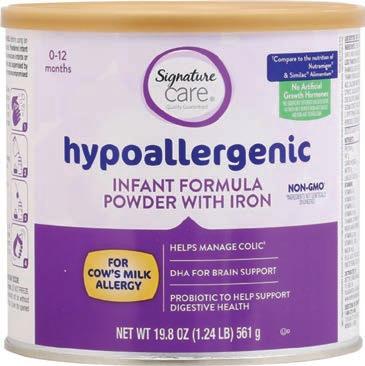
SRP: $39.99 per 19.8-ounce container
During a time when infant formula has been difficult to find, Albertsons Cos. is differentiating itself with its own-brand formula, which falls under a specialty seg ment and has the same claims and attributes as the comparable national brand, but at a value price for its customers. This is the first hypoallergenic SKU in Alb ertsons’ private label formula set, aimed at managing infant colic and supporting digestive health, but the grocer plans to work with its supplier to develop any other missing specialty formulas to better represent them on shelf. Albertsons will continue to promote and develop special offers to consumers who already purchase the comparable name-brand formula.
Signature Reserve Mascarpone Vodka Pasta Sauce
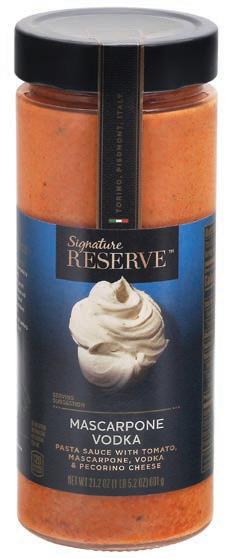
SRP: $5.99 per 21.2-ounce jar
This private label pasta sauce features a delicate blend of tomatoes, vodka, and mascarpone and pecorino cheeses, and is imported directly from Torino, Italy. Albertsons Cos. worked with its vendor partner to source a beautiful jar that stands out on the shelf and also collaborated with its design agency to create a label that draws customers into the story of the product. The sauce launch was com plemented by aggressive and frequent promotions to drive trials for customers, since Albertsons understands that tasting is believing with its unique pasta sauces. The Mascarpone Vodka sauce joins seven other sauces in the Signature Reserve line, and there are plans to expand into premium Alfredo sauces in the future.
72 progressivegrocer.com
Polypropylene Packaging for Hot Food Applications
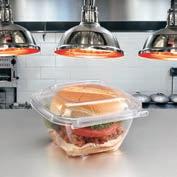









Tamper evident proventechnologypatented





















Exceptional clarity allows contents to take center stage under heat lamps recommend that customers test products under their specific conditions to determine fitness for use.






Tamper resistance keeps food safe & secure with third party delivery




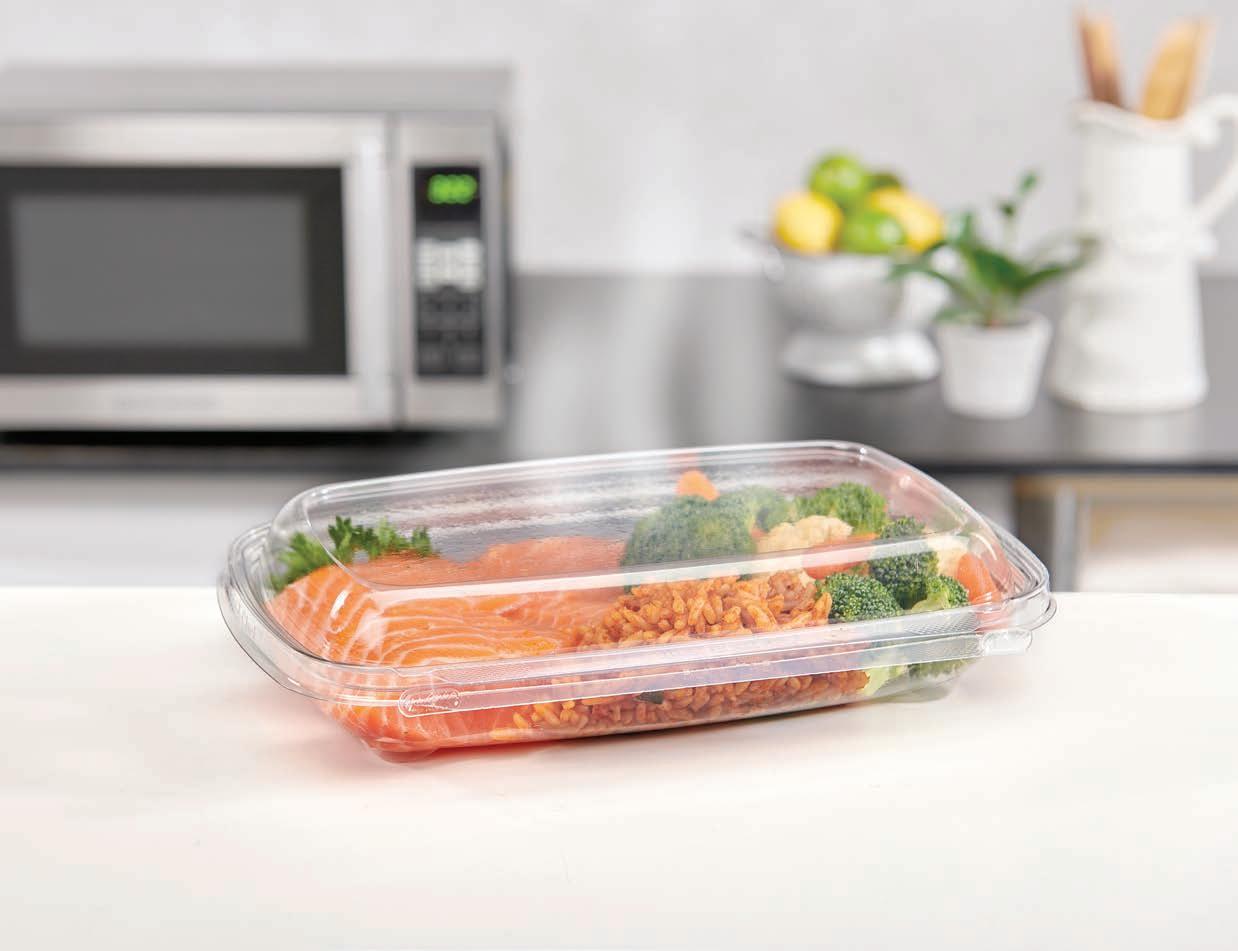
So HOT!
InlinePlastics.com/hot We strongly
Signature Select Pretzel Twirls Butter & Garlic
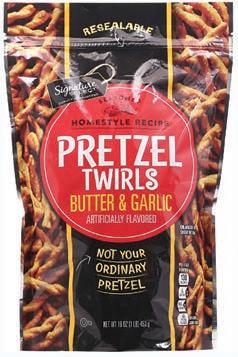
SRP: $4.99 per 16-ounce bag
Intensely and uniquely flavored snacks are currently all the rage, and Albertsons Cos. took note with its thick and crispy pretzel twirls seasoned with a blend of salt, garlic and herbs. This is a first-to-market private label product, offering the customer a fla vor-packed snack at a value, and has quickly become a top seller among the food retailer’s salty snack assortment. Supported by sec ondary displays in stores and digital offers to drive awareness, the pretzels have sold at a higher rate than Albertsons’ original forecast. As such, the grocer plans to launch additional flavors to build out the product’s presence on the shelf.
Simple Mills Sweet Thins

SRP: $5.39 per 4.25-ounce box
Sweet Thins snacks are sweetened with coconut sugar and contain a diverse mix of nutritious nut and seed flours, including watermelon seed flour. Simple Mills sources the seeds from the “wooly watermelon,” an heirloom varietal that has white flesh and is grown specifically for its seeds. By using watermelon seeds, the company is helping to drive demand for increased crop diversity and pest resiliencies. The line is available in three va rieties — Honey Cinnamon, Chocolate Brownie and Mint Chocolate — and, according to Simple Mills, Sweet Thins are outpacing the total catego ry and the top five competitor average dollar and unit velocities across all channels. Through PR, social media, influencer partnerships, mailers and shopper marketing, consumers learned about Sweet Thins and discov ered easy-to-make recipes using the product, such as no-bake pie crusts.
Simply Done Reclosable Freezer and Storage Bags Multipack
SRP: $10.99 per variety pack of 276 bags
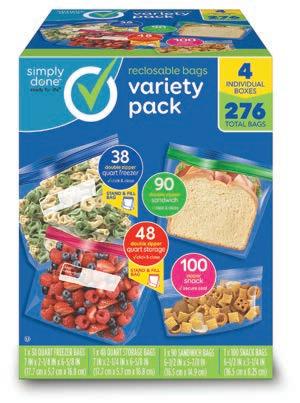
Simply Done has simplified decision-making for the shopper by offering the right amount of storage bags in a four-box variety pack consisting of 38 quart freezer bags, 90 sandwich bags, 48 quart storage bags and 100 snack bags. Filling a growing need for shoppers looking for both convenience and an opportunity to stock up on necessities, the multipack offering received strong product support through manufacturer Topco Associates LLC’s marketing tools, online presence and member ad vertisements. In-aisle displays and back-to-school cross-merchandising also played a significant role in creating shopper awareness. To enhance perfor mance, Topco intends to communicate the unique product’s attributes, profitability and margin rates to its membership.
So Good So You Immunity Powered by Mushrooms Juice Shot
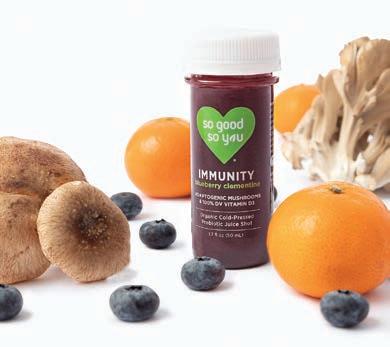
SRP: $3.99 per 1.7-ounce shot
Leveraging mushroom’s incredible popularity in the health-and-wellness space, this cold-pressed probiotic juice shot combines inflammation-fighting adaptogenic mushrooms with 100% of the recom mended daily value of vitamin D to support cellular, brain and immune health. The Blueberry Clementine flavor profile offsets the mushroom taste, giving consumers a simple, accessible way to get the per fect balance of function, convenience and dosage. So Good So You’s products are made in a 100% renewable energy-powered, zero-waste manufac turing facility, and its packaging ultimately turns into water, soil and gas, which can be collected and converted into clean energy at landfill facilities.
Somos Quatro Chiles Taquería Salsa
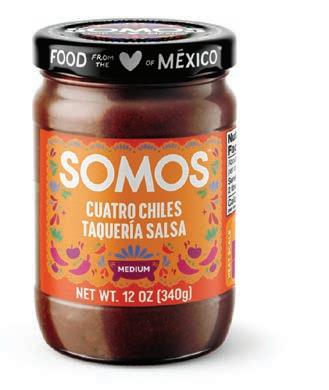
SRP: $3.99 per 12-ounce jar
All of the ingredients that Somos uses are grown in Mexico, and its products are made using
of peppers that yield more complex flavors, combining serrano, chile de arbol, chili and ancho peppers to create a bold taste with the perfect amount of heat. Somos connected with hundreds of national media contacts and influencers who tried its products and learned more about how the company hopes to spice up the some what stale Mexican food category. The brand engaged digital channels by sharing paid and organic content, and also partnered with retail ers on shopper marketing activities.
bringsChilescompany’sgrinding.molcajete-stylefire-roastingtechniquestraditionallikeandTheQuatroTaqueríaSalsatogetheravariety
74 progressivegrocer.com
SpoonfulONE Crunchy Puffs
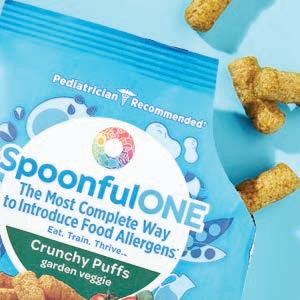
SRP: $16.99 per box of five 1.76-ounce bags
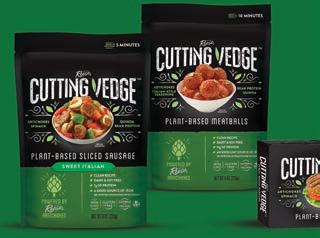
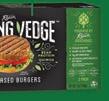
Created to combat food allergies — which have doubled over the previous generation — SpoonfulONE Crunchy Puffs aim to activate babies’ tummy immunity. When infants eat the puffs, their immune systems are introduced to 16 foods associated with more than 90% of food allergies, and the immune cells in their stomachs begin to recognize the foods. When eaten on an ongoing basis, SpoonfulONE teaches babies’ immune systems that the 16 foods aren’t allergens.
Certified Organic by Oregon Tilth, the pediatrician-recommendedpuffsaremadewithwholesome,realingredientsandcontainnoartificialcolors,flavorsorpreservatives,witheachSKUtesteduptothreetimestoensurethatitmeetsorexceedsnationalandinternationalstandardsforfoodsafetyandproteinintegrity.Thecompany’scomprehensivemom-focusedmarketingpushincludedpaid,earnedandsharedcomponents.
Spudsy Sweet Potato Fries
SRP: $3.99 per 4-ounce bag


Reimagining classic comfort foods with a healthy, sustainable twist, Spudsy offers its Sweet Potato Fries in Hot Fry, Cheese Fry, Vegan Ranch and Sea Salt flavors, with each variety upcy cled from imperfect sweet potatoes that would otherwise end up in landfills. The zesty snacks are also vegan, gluten-free, kosher, non-GMO and free of the top nine allergens. Product giveaways on social media platforms have proved successful in generating consumer excitement, and Spudsy has also been featured in regional segments in key markets with well-known lifestyle contributors to drive retail sell-through and boost the product’s availability. Additionally, each bright, inviting bag, with its prominent mission to #savethespud, is sure to be spotted on retailers’ shelves. Spudsy plans to keep up with consumer trends by exploring the possibility of new flavor expansions.
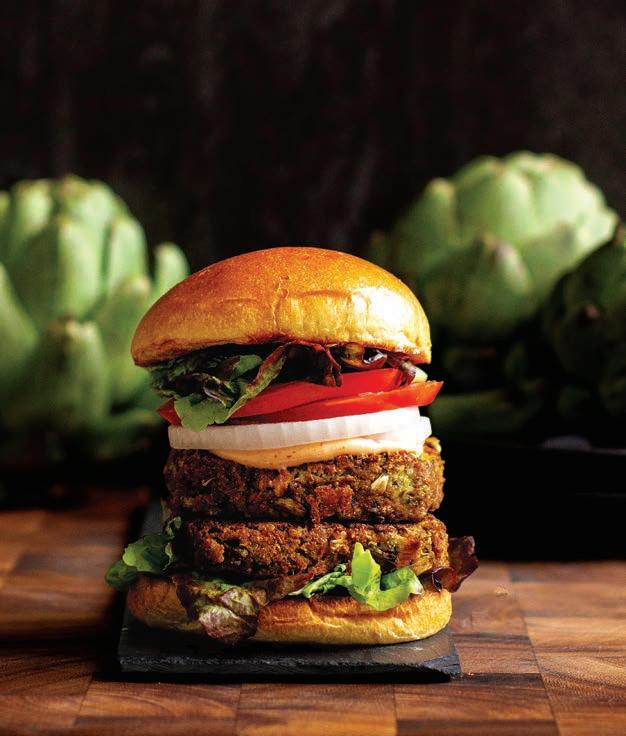
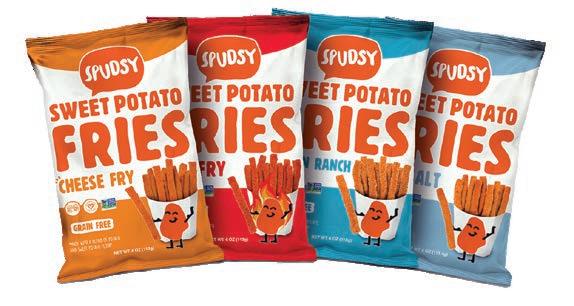
PROGRESSIVE GROCER September 2022 75
/CuttingVedge@CuttingVedge
Sunboy CoconutSpikedWater
SRP: $10.99 per 4-pack of 12-fluid-ounce cans
Sunboy has created a new cate gory of better-for-you beverages with what the brand calls the world’s first ready-to-drink spiked coconut water. With ingredients like hydrating coconut water and real tropical juices, the sparkling alcoholic drink offers the fun and flavor of a beachside co conut cocktail in a convenient “go-anywhere” can. The 5% ABV beverage con tains no artificial flavorings and 80% fewer calories than a traditional cocktail, as well as being vegan and gluten-free. Available in three flavors — Pineapple, Passion Fruit and Tangerine — the line comes in vivid packaging that stands out on the shelf. Its product pipeline includes additional real fruit-juice flavors such as Mango, which is slated to launch this coming spring. Sunboy remains committed to sourcing the cleanest, most ethical coconut water available.
Tippy Toes Hypoallergenic Infant Formula
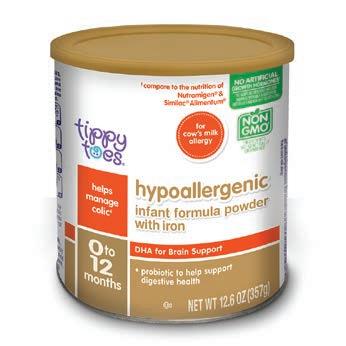
SRP: $21.99 per 12.6-ounce container
Developed for babies who are allergic to cow’s milk, Tippy Toes Hypoallergenic Infant Formula features probiotics to help support digestive health, DHA for brain support, and no GMO or artificial growth hor mones. Hypoallergenic — the largest own-brand void in infant formula — is an almost $100 million category that’s up 14.1% year over year. Filling a serious need, Tippy Toes offers a high-quality prod uct at a 30% savings versus the national brand, according to manufacturer Topco Associates LLC. The formula comes in vacuum-sealed packaging to retain freshness, with on-pack callouts providing easy-to-follow benefit desig nations, as well as “compare to” statements at the top of the tin and on the cap itself. Tippy Toes works to maintain brand awareness among new moms through in-aisle signage, its brand web site and Topco member advertisements.
Twinings Superblends
SRP: $5.49 per 1.12-ounce package of 16 tea bags
Combining tradition and innovation, Twinings’ Superblends line offers beverages that have each been infused with a star functional ingredient: Immune Support+ (mango, ginger, green tea and vitamin C); Sleep+ (herbal tea with vanilla, cinna mon and melatonin); Energy+ (apples, oranges, green tea and vitamin B6); and Heartea+ (herbal tea with raspberry, hibiscus and vitamin B1), as well as the later additions of Glow+ (peach, white tea and biotin), Probiotics+ Cold Water Infu sions and Immune Support Cold Water Infusions. Part of Twining’s Drink in Life campaign encouraging consumers to prioritize their well-being, Superblends were also highlighted in a multifaceted paid-media effort to build awareness and drive purchase intent. Through the product line, which has received positive feedback, Twinings saw an opportunity to further its positioning within the wellness space.
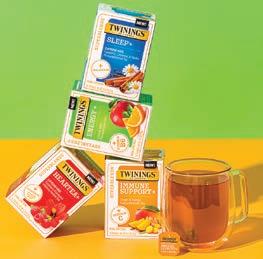
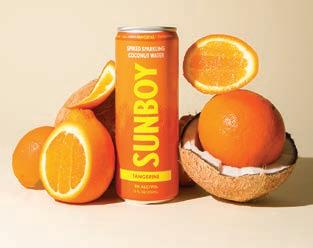
Veggies Made Great Keto Friendly Muffins
SRP: $5.99 per 12-ounce box of six muffins
As lifestyle diets like keto grow in popularity, Veggies Made Great has introduced a Keto Friendly Muffins line with the goal of making a delicious-tasting muffin that aligns with brand guidelines — simple, clean ingredients; nutritionally smart; veggie- forward — while also meeting the growing demand for better-for-you low-carb fare. As such, the muffins are made using real vegetables like zucchini, carrots and beets, with allulose and monk fruit juice replacing traditional sugar. The colorfully packaged line comes in three crowd-pleasing flavors: Cinnamon Roll, Chocolate Raspberry and Mochaccino Chip. Sold frozen, and ready after a mere 35 seconds in the microwave — a fact called out on the box — these warm, moist muffins are indulgent treats that consumers don’t have to feel guilty about enjoying, with the Cinnamon Roll flavor a particular standout.
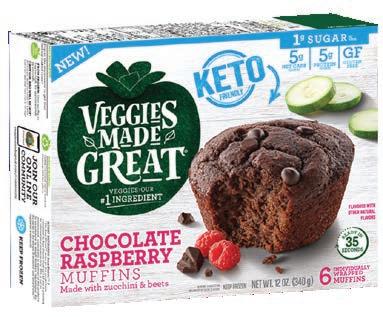
Veggies Made Great Stuffed Cauliflower Bites
SRP: $5.99 per 7-ounce box
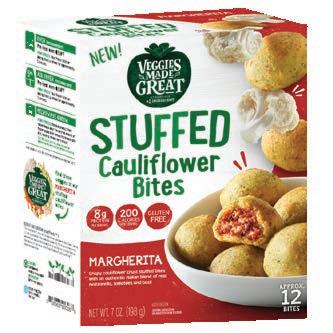
Boasting vegetables as the No. 1 ingredient, Veggies Made Great Stuffed Cauliflower Bites are glu ten-free, low-calorie — 200 calories per serving — and high in protein. Developed to satisfy the growing demand for better-for-you snacks, the bites feature a crispy crust made with cauliflower, carrots, broccoli and spinach, plus alternative flours like chickpea and rice, and are filled with a blend of authentic Italian veggies and cheese. The frozen line comes in four flavors:
or air fryer for a convenient nibble or appetizer any time of day. As it continues to monitor the category, Veggies Made Great will look to registered dietitians for third-party credibility.
76 progressivegrocer.com
quicklypizzahealthierwithMushroomCheeseRoastedSpinachMargherita,&Ricotta;Veggie&4Blend;and&OnionSwiss.Thistakeonrollsheatsupinthemicrowave
Whisps Cheese Crisps & Nuts
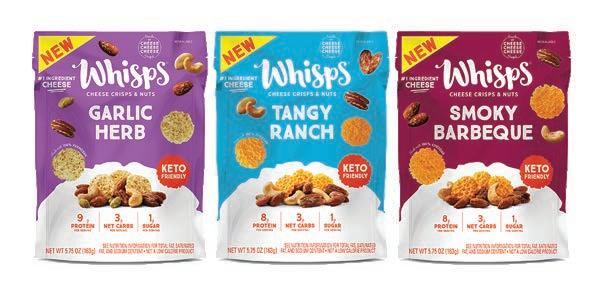
SRP: $7.99 per 5.75-ounce bag
Whisps Cheese Crisps & Nuts is a keto-friendly snack mix made with 100% real artisanal cheese exclusively created for the brand from dairy it sources from four Wisconsin family farms, joined by nuts and premium spices. The product line’s three bold flavors — Smoky Barbeque, Garlic Herb and Tangy Ranch — were each chosen based on consumers’ responses to the spice blends used for Whisps’ core product, Whisps Cheese Crisps. The first innovation for the brand beyond its crisps, Whisps Cheese Crisps & Nuts rolled out late last year in convenient resealable packages designed to facilitate at-home or on-the-go snacking, accompanied by a full-scale PR and earned-influencer campaign. Whisps plans to continue to expand Cheese Crisps & Nuts flavors and pack formats, as well as building distribution of the product line.
Wide Awake Medium Roast Cold Brew Coffee
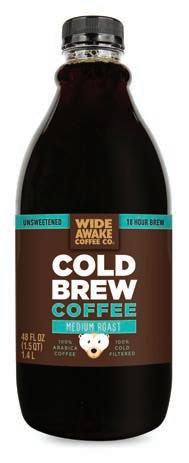
SRP: $4.59-$5.59 per 48-fluid-ounce bottle
The first to market with own-brand cold-brew coffee, Wide Awake has now added Medium Roast Cold Brew Coffee to its premium cold-coffee lineup in its first foray into the refrigerated space, offering a bold, clean impact ful graphic style with a minimized illustrative character and large block typography that demands attention. Cold brew, a driving innovation trend in the coffee cate gory, has seen significant growth since the beginning of the pandemic, and as the first own brand providing coldbrew options, Wide Awake continues to grow own-brand penetration in the refrigerated cold-brew coffee segment by encouraging Topco Associates LLC member retailers to feature Wide Awake Medium Roast Cold Brew Coffee in refrigerated displays and together with other Wide Awake refrigerated coffee items, especially during the summer, a period of key seasonal demand.
Woodstock Organic Dark Chocolate Coconut Clusters with Pumpkin Seeds, Quinoa and Flax Seeds
SRP: $4.99 per 3-ounce pouch
Woodstock, the private label brand of United Natural Foods Inc., is meeting the need for clean-ingredient snacks that deliver on flavor and nutrition with Dark Chocolate Coconut Clusters with Pumpkin Seeds, Quinoa and Flax Seeds. Fea turing the mindful ingredients noted in the name, along with wild rice and dried coconut, the clusters boast such certifications as USDA Organic, Non-GMO Project Verified, certified gluten-free and Kosher Certified while containing no hydrogenated fat, artificial colors, flavors or preser vatives. They can be eaten on their own, or added to smoothies, oatmeal or yogurt for added taste and texture. The line was promoted via social media and digital ads to increase consumer awareness, and there are plans afoot to take advantage of cross-mer chandising opportunities with top-performing Wood stock categories such as frozen fruit.
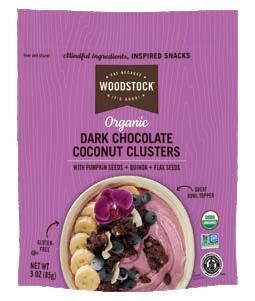
SpreadsCheeseCheddarHomestyleFancyYancey’s
SRP: $6.99 per 8-ounce tub
Available in three unique varieties mirroring the brand’s most popular cheese flavors, Yancey’s Fancy Homestyle Cheddar Cheese Spreads look and taste as if they were homemade in consumers’ own kitchens. The chunky spreads can be used in recipes, as a burger or sandwich topper, or as a right-from-the-tub snack. Yancey’s strategically launched the line at each retail location using a comprehensive marketing approach. According to the brand, working collaboratively with retailers enabled it to customize a compelling product marketing plan that included such tactics as in-store signage with QR codes, calls to action, a landing page on Yancey’s website, and a targeted social media campaign that generated 230,000-plus impressions. Thanks to the spreads’ success, Yancey’s has been able to enter a $150 million category and successfully establish and grow sales.
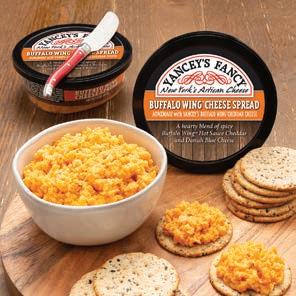
Yasso Birthday Cake Bar
SRP: $6.19 per 14-fluid-ounce box of four 3.5-fluid-ounce bars
Containing just 90 calories, an impressive 5 grams of protein and no artificial ingredients, the Yasso Birthday Cake Bar enables consumers to celebrate year-round with real chunks of cake dough, rainbow sprinkles and creamy frozen Greek yogurt. Launched on the occasion of the brand’s 10th anniversary in grocery stores, Birthday Cake currently drives 7% of Yasso’s growth, contributing to top-tertile velocities in the accounts where it’s available. According to the brand, “We believe this flavor has the capacity to be a top SKU in our lineup, given its attractive flavor profile, indulgent taste and quality nutrition.” Like all core bars — the top-selling products in the brand’s portfo lio — Birthday Cake carries the Yasso Creamy Guarantee: If consumers aren’t 1,000% satisfied with the creaminess of a bar, they’re eligible for a refund.
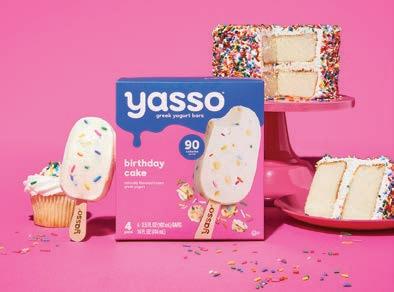
PROGRESSIVE GROCER September 2022 77
FuturesBright Awards

























 By Progressive Grocer Staff
By Progressive Grocer Staff

Achance to reimagine the future of grocery is at hand, and it begins with the 2022 class of Progressive Grocer’s GenNext honorees.




This year’s GenNex ters, all under the age of 40, are showcasing the most promising talent in the food and consumables industry, and it is PG’s honor to shine a light on these fresh faces with such promise.
Our honorees come from the retailer, supplier and solution provider compa nies that make up the grocery industry, and they are making a push to define the future of food retail in America. The new capabilities and technologies they have worked on are making a big mark on an array of diverse fields in grocery, from omnichannel marketing to fraud investigations to digital fulfillment to curbside pickup to sustainable food supply chains. Each honoree’s vision is unique, but they all show a deep commitment to inspiring and serving shoppers and their communities.
The grocery industry is facing tre mendous challenges, including inflation, supply chain snags and the endless complexities of digital transformation. But it’s also grappling with a persistent labor crisis that shows no sign of fading away. So it’s comforting to know that there’s a pipeline of leaders emerging to help companies overcome the obstacles associated with all of this change.
There has never been a more exciting time to be an emerging leader in the gro cery industry. While no one can predict the future, we know that this next generation of innovators has the power to design a post-pandemic future that is more customer-centric, more inclusive, more sustainable and more prof itable. PG believes that it has never been more important to support the people across the industry who are committing their lives to making a difference in gro cery. We are thrilled to have the oppor tunity to celebrate the achievements of the GenNexters shaping the future of this essential industry. Congratulations to all of this year’s honorees.
Progressive Grocer’s 2022 GenNext Awards go to those younger members of the grocery industry who will determine its direction for years to come.
78 progressivegrocer.com
COVER STORY 2022
stand out
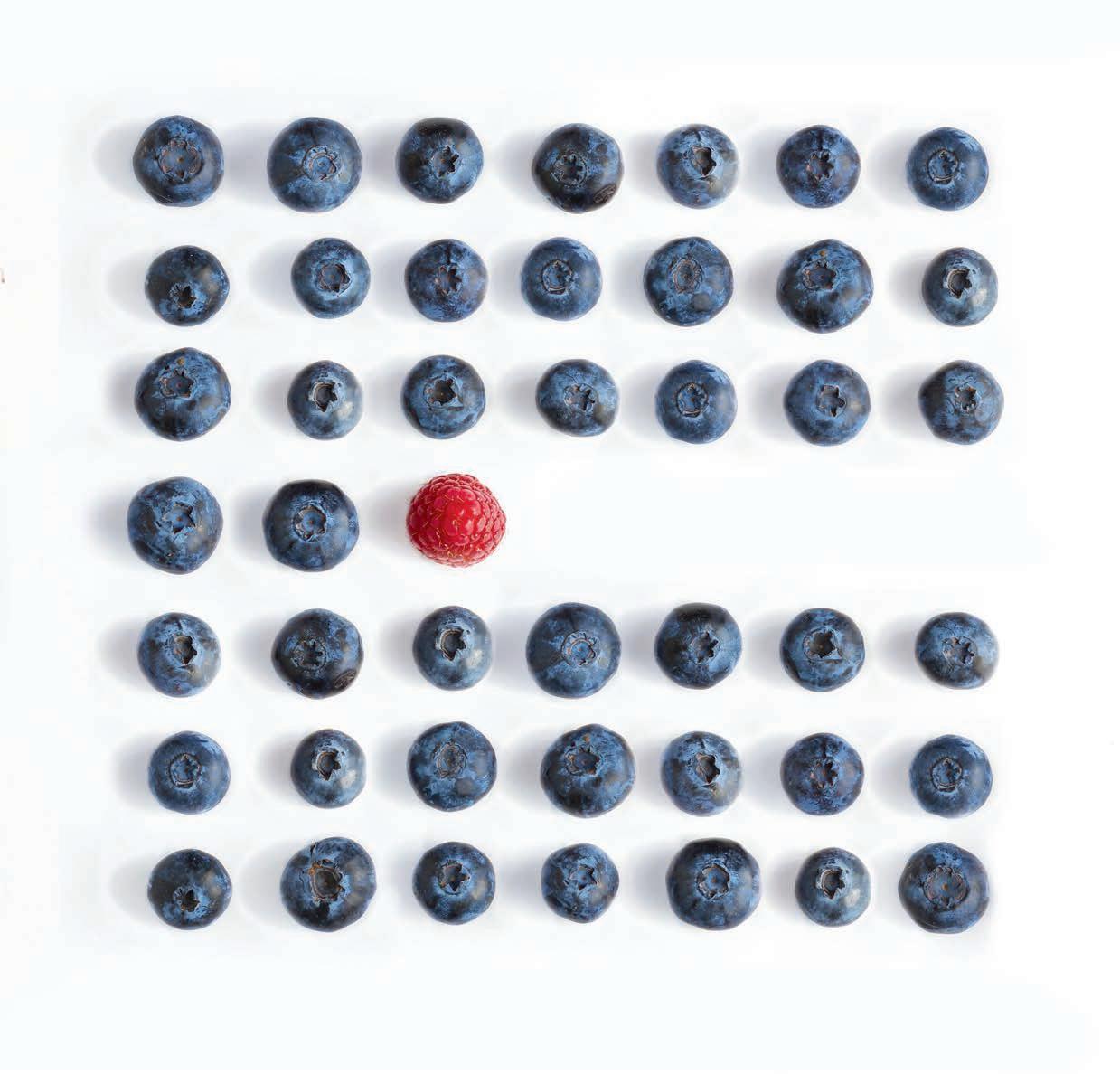
Meijer congratulates this year’s GenNext honorees, including our own. Jordan Clark • Ben Hamlin • Mike Klomp • Jess Murray Courtnie Sanchez • Paul Thompson • Jimmie Vargas • Lara Werner
2022 Awards
DOUGLASCLARA
Grocery Clerk, AGS Vermont Inc./ Jericho Market
AGE 25
Douglas is described as a versatile associate who’s adept at many roles within the store. Since joining AGS Vermont in 2016, however, she’s become known for her willingness to jump right into initiatives, like the launch of the grocer’s first e-commerce program in 2019. Under her leadership, e-commerce at that location grew from 10 to more than 80 orders a week and led to the program’s expansion to all of the retailer’s stores. Following that rollout, she tackled another effort, starting cross-training in more departments. While eager to contribute, she’s also patient and calm, bonus qualities amid the intensity of the pandemic.
AGE 27
ASAROJOSEPH
VP of BotticelliDevelopment,CustomerFoods


KROEGERJOHNATHAN
Senior FarmingInnovation,MarketingProductManager,Bowery
He may be a fourth-genera tion owner, but Asaro has also worked at other companies, including Chobani and Advantage Solutions, to gain broad insight and knowledge. Returning to Botticelli Foods to lead the retail sales team in 2020, he leveraged his experience to keep products in stock, widen distribution from 5,000 to 15,000 stores and triple the company’s sales revenue. Botticelli is now a national brand, and its authentic premium Italian foods are available at Walmart, Albertsons and Kroger stores, among many food retailers. While growing the business, Asaro values his roots, expressing gratitude to work with his father, the president and CEO.


AGE 36
T asked with product innova tion, Kroeger went above and beyond traditional leafy greens to spearhead the launch of Bowery’s Strawberry Duopack featuring two separate berry cultivars grown indoors without pesticides. The unique item was an immediate hit, with retail partners regularly selling out of the products or limiting the items to one per customer. In addition to product innovation, he successfully delved into package updates, helping the company launch a peel-and-reseal film lid that reduced plastic use by 45%. As a leader, Kroeger is described as inspiring, creative and collabo rative in his efforts to democratize access to fresh produce.
AGE 30
LECLAIRMACAELA
Assistant Category Manager of Floral, GroceryBrookshireCo.
LeClair has put up some big numbers since starting her position less than two years ago. She generated record-breaking floral sales for key holidays and led strategies that boosted revenues from $12 million to more than $20 million. Her secret? Staying on top of consumer and market trends and working closely with vendors and partners. Through those collabora tions, LeClair continues to innovate, launching a new fresh-cut program that included several Brook shire-exclusive items and opening a new store with a totally different high-end program that’s now the retailer’s top floral department. Her colleagues call her uplifting, ambi tious and empowering.
AGE 27
Viewed by her colleagues as dynamic, adaptable and authentic, Price balances those traits to enhance training programs at Brookshire. The dynamic and ambitious parts of her business personality are evident in the quick pace at which she has elevat ed training, from improving the onboarding process for all new corporate partners and leaders, to rolling out a new applicant-tracking system for the entire organization, to creating weekly training and coaching communications. Price’s authenticity shone particularly brightly when she helped found the grocer’s store director leadership academy and when she mentored a new team of trainers with back grounds in education.
AGE 31
I f there’s such a thing as career destiny, Sanders exemplifies it. He fell in love with produce at a young age, setting up displays and meeting with mentors who would help hone his passion. Sanders was Reasor’s youngest department director in company history when he became its director of produce. Now at Brookshire, he recently created a new produce department staffed by knowledgeable experts and designed to feel like a farmers market, remodeling every store within two years. Sanders also strives to create new leaders by creating a culture that en courages others to achieve their professional goals.
t’s a testament to his versatility and multifaceted retail acumen that Immer works as sales direc tor at Chabaso Bakery and as the founder of the incubator CT Food Launch Pad (CTFLP). He excels in both roles, rebuilding Chabaso’s sales team to make the company’s artisan bakery products available in almost all major retailers in the Northeast, and leveraging his experience to help small Connecticut food startups like a Ghanaian hot sauce brand get on the shelves at Stop & Shop. Thanks to Im mer, Chabaso grew its business by double digits in 2021 and 2022, while CTFLP has secured additional funding from the Nutmeg State. SANDERS
AGE 32
AGE 30
ISteel proves the point that internships are valuable for both parties. She helped build the snack company Daily Crunch during her internship in 2020, at a dynamic time in the COVID-af fected marketplace. After re ceiving her MBA from Vanderbilt University, Steel became the firm’s first official employee and subsequently assisted in grow ing the business tenfold through her efforts in digital advertising, website design, traditional marketing, email marketing and more. A native Texan, she helped secure a new account at Texas-based Central Market and is described as a strategic leader who will “go the extra mile on everything she does.”



 REED
Co-Founder and Sales Director, CT Food Launch Pad/ Chabaso Bakery
REED
Co-Founder and Sales Director, CT Food Launch Pad/ Chabaso Bakery
80 progressivegrocer.com COVER STORY
PRICEREBEKKA Partner GrocerySupervisor,DevelopmentBrookshireCo.
STEELKENZIE DailyMarketingOmnichannelDirector,Crunch
IMMER
JJ
CategoryProduce BrookshireManager,Grocery Co.
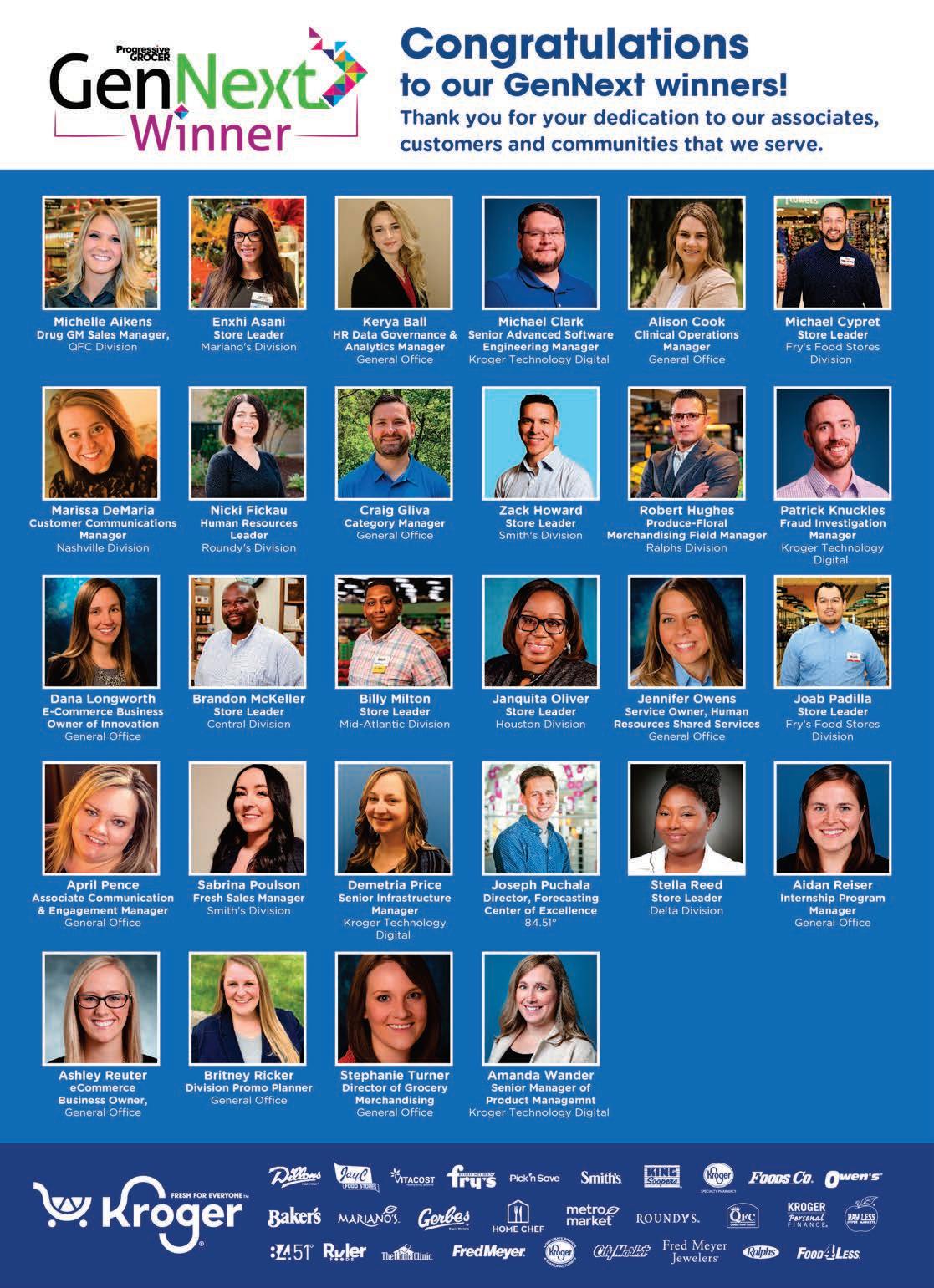
2022 Awards
BERNHEIMJESSICA
Director of Brand Marketing, Daring
AGE 28
You might say that Bernheim has been branching out in bringing plant-based brands to life. Following a successful stint as head of new product development at Upfield — where she launched that company’s Country Crock plant butter and plant-based whipping cream, among other items — she joined Daring. At the plant chicken company, Bernheim leads strategy and innovation and has already made great inroads, as Daring recently completed a Series C funding round and expanded its presence in Walmart stores. The Williams College graduate is also committed to uplifting people and communities in other ways, includ ing her support of nonprofit organi zations fighting food insecurity.
LAVIANOFEK
AGE 39
ROBERTSAMBER
AGE 35
LANEZACHARY
Director of Retail FarewaySystems,Stores

HEATWOLECORWIN
This former head of mar ketplace at Kroger got into the wine delivery business at a pivotal time, meeting the needs of consumers who were still largely at home. Running Drinks.com’s e-commerce programs for some of the country’s largest companies, she leads a team that creates and maintains strategic partner relationships. Roberts recently oversaw the launch of four new branded nationwide wine pro grams, expanded existing partner programs to accelerate orders nearly 70% year over year and streamlined client communications. Her nominators call her innovative, creative and obsessed — in a good way — with helping partners gain competitive advantages.


With a clear command of the complexities involved in supporting a 130-store retail chain, Lane has demonstrat ed leadership throughout the planning and implementation of Fareway’s employee discount program. He was integral in the design of a lean yet reliable solu tion to achieve the requirements in a manner that surpassed expectations. His leadership also proved valuable on a Pay Pal/Venmo deployment project. Despite typical early-adopter challenges, Lane demonstrated how being an IT professional with excellent communication skills can have a positive impact throughout a project.
AGE 39
Heatwole’s new farming model has made family farming viable again for a new generation, helping farmers return to ownership from the brink of bankruptcy. In January 2022, Heatwole was invited to join President Biden at a roundtable to discuss competition in the meat industry, during which Heatwole ad vocated for independent farmers and explained how Farmer Focus creates an equitable business model. The USDA also requested Corwin’s input on policies to support “investments and opportunities for meat and poul try processing infrastructure.” With Heatwole’s input, the department introduced a new framework to de velop a financing solution for turnkey processing to assist companies in bringing businesses to scale.
AGE 30
In his twenties, Lavian was prod uct manager for payments at Uber, where he powered the global payments platform, responsible for processing tens of billions of dollars in payments volume in 60-plus countries. He also led the payments and commerce product teams at Instacart, where he built the company’s core payments infrastructure and launched multi ple products that drove billions in incremental impact during the com pany’s peak growth years. At In stacart and now at Forage, Lavian has focused on helping 42 million Americans purchase their online groceries with SNAP benefits. His experience enabled Forage to help grocers and other merchants accept EBT payments online.
 ALDENASHLEY VP of FoxtrotMerchandising, 34
ALDENASHLEY VP of FoxtrotMerchandising, 34

Since joining Foxtrot in 2018, Alden has grown its product assortment from approximately 500 SKUs to nearly 3,200 SKUs, including new categories like grocery, produce and gifting. She oversees the annual Up & Comers program, reviewing thousands of applications, taste-testing hundreds of products and hand-selecting the best products, with an eye toward the most game-changing brands. Alden is hands-on every step of the way, from product selection, to how it’s displayed in stores, to distribution and inventory management. Also, amid supporting Foxtrot’s growth to 21 stores — and counting — she grew her team from two merchants to 10-plus.
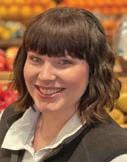
BLANCODORIAN Assistant Store TheManager,Fresh Market 30
Metrics-driven Blanco has demonstrated leadership in many ways, whether it’s through community relations activities, training team members in the bakery to hand-decorate cup cakes to increase revenues to the category, decorating the stores and display tables, or develop ing bakery strategies to upsell pies on Pi Day. During the Great Resignation, she addressed the store’s staffing issues by personally going to shopping centers and malls to look for and attract talent for The Fresh Market. Blanco handed out cards with QR codes to automatically take people to the retailer’s site, helping to bring on several new team members in this way.
P olinsky took over primary re sponsibility for starting up the Instacart e-commerce platform for The Fresh Market during the start of the pandemic. Due to com pany turnover, he was singularly on point for implementing the catalog integration, IT integration and operational integration of the program, working with c-level executives of each function in mer chandising, finance, operations, IT and marketing to successfully launch the e-commerce program while working from home. Be cause of Polinsky’s ability to work cross-functionally with senior executives and peers internally and Instacart’s top executives externally, he grew the business to $100 million-plus in its first year.

 Co-Founder and CEO, Forage
VP, Drinks.comEnterprise,
Founding Farmer and CEO, Farmer Focus
Co-Founder and CEO, Forage
VP, Drinks.comEnterprise,
Founding Farmer and CEO, Farmer Focus
82 progressivegrocer.com COVER STORY
POLINSKYGERRICK TheandManagerE-CommerceofCurbsideCatalog,FreshMarket AGE 30
AGE
AGE










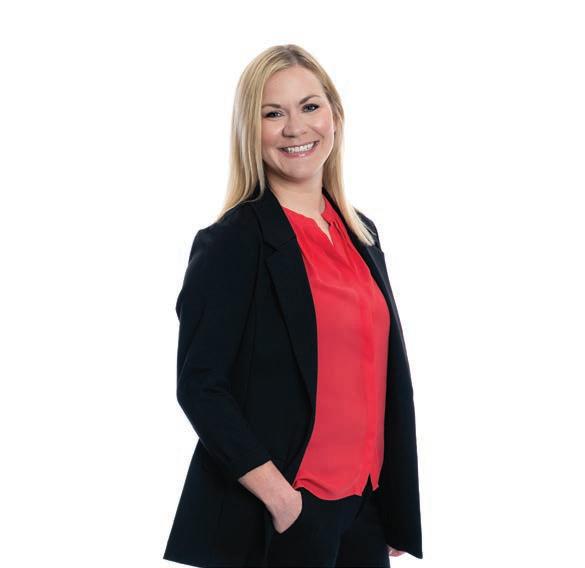












































 Andy Schroeder
Kelly Stevenson
Kayla Winstead Asst.
Max
Abby Byers
Scott Copeland
Laura Edwards
Clinton
Matt
Travis
Andy Schroeder
Kelly Stevenson
Kayla Winstead Asst.
Max
Abby Byers
Scott Copeland
Laura Edwards
Clinton
Matt
Travis
Vice AccountingPresident,
Talent Supervisor
Vice President, Planning & Strategy
Winstead Group Vice President, Supply Chain & Network Infrastructure
Vice DelicatessenPresident,
Group President,ViceAuditing
Director, DevelopmentEmployee
Ellis Asst. Vice President, Data & PartnershipsMedia
Hagewood Vice DigitalPresident,Development
Hoover Vice President, IT, Chief Data Officer G n N xt Congratulations to our next generation leaders
2022 Awards
JACKSONALEX
Director of Sales, Frieda’s ProduceBranded


AGE 32
Excelling at coalition building, Jackson is a produce industry growth driver and the youngest professional ever to graduate from the United Fresh Leadership Program. Her ability to leverage inclusivity, along with a charismatic approach to sales, drives a team of Boomers, Gen Xers, Millennials and Gen Zers to deliver results for their retail and foodservice partners. Jackson’s strategic planning vision led her team to embrace a coordi nated five-step stage gate process, evaluating Frieda’s products and future growth opportunities for branded produce. This resulted in clarity and direction on product launches going forward, ensuring that consumer appeal matches product positioning. Hy-VeeDelicatessen,Inc.


AGE 35
A s Hy-Vee’s first-ever VP of deli catessen, Byers is responsible for managing the operations of more than 285 delicatessen departments, along with building and leading a team of 10 regional deli supervisors. She challenges her employees to build memorable experiences through sampling, product storytell ing and product recommendations, and is always at the forefront of the latest category trends. Byers was instrumental in revitalizing Hy-Vee’s Long Island Deli department, which has led to increased sales that con tinue to grow. She also developed the Hy-Vee Charcuterie Certification Workshop Series, a best-in-class certification program tailored to employees with a strong passion for charcuterie.
AGE 38
WILL REGAN
Strategic Planning and TheFinanceCommercialDirector,GiantCo.




EMILY MASSI Healthy Manager,MerchandisingLivingGiant Food

Regan and his team leverage innovative tools to make continuous improvements. For example, among the team’s ac complishments are enhancements regarding sales analysis, price investment reporting and analysis, sales/margin volume/rate mix reporting, and planning processes. None of these improvements would be possible without Regan’s stead fast leadership. As an active chair of the company’s CARE business resource group, he helped estab lish leads across all 12 regions within the organization and create a community of caregivers to drive a supportive work culture. Regan is also the chair of EPIC, a new group for emerging professionals in the Carlisle, Pa., area.
COPELANDSCOTT
Group VP, Auditing, Hy-Vee Inc. 32
Copeland began his career with Hy-Vee in 2010 in the in ternal auditing department before moving to the accounting side, and he has since held several fi nancial reporting positions. In his current role, he works closely with Hy-Vee’s operations leaders, loss prevention department and top executives to identify key areas of focus and ways to streamline operations, increase profitability and recover lost funds. Copeland helped company leaders deter mine profitable COVID-19 vaccine incentives to help attract more patients, and he has leveraged his pharmacy expertise to identify new ways to recover funds and make the pharmacies’ operations more profitable.


AGE 28
Breaking department silos, Massi has compelled cross-functional leaders across the organization to evaluate business priorities through the lens of healthy living. For example, after reviewing her creative and insights-driven proposal for nutritionist-approved, chef-inspired prepared meals, the merchandising group gave Massi a leadership role on the meal solutions task force. She’s also a champion of the Guiding Stars nutrition guidance system and Social and Environment Impact Ratings, educating internal teams and customers on how to identify products that are both good for you and for the planet. Further, Massi inspires listeners of the “Healthy Liv ing by Giant” podcast with seasonal product recommendations.
EDWARDSLAURA

ROTHMANMATT
Manager Early Talent SupermarketsHannafordDevelopment, AGE 35

Rothman started his career with Hannaford Supermar kets, now a local brand of Ahold Delhaize USA, 15 years ago as an in-store trainee, and over the years, he has held various strategic leadership roles. With a focus on recruiting and developing Hannaford’s future leaders, he has been instrumental in identifying new processes and technologies to drive improved efficiencies, communication and overall exe cution at the store level. Rothman has worked with critical stake holders to spearhead technology initiatives, and today he leads the development of Hannaford’s early talent pipeline to ensure that leaders are being nurtured over the long term.
ELLISCLINTON
Assistant VP, Data Hy-VeeMediaandPartnerships,Inc.
AGE 38
Edwards oversees training and development programs for Hy-Vee employees at all levels, and a major part of her focus is Hy-Vee University, which is designed to build a pipeline for the next generation of department and store leaders. She spearheaded an initiative to redesign the compa ny’s core training programs and also launched new certification opportunities for employees who specialize in beer, charcuterie and seafood. Working with Hy-Vee’s VP of produce, Edwards launched digital produce identification flashcards and a gamified training course for new employees to strengthen product knowledge and improve customer service.
AGE 33
Ellis began his career with HyVee while he was still in high school and is now responsible for building a framework to collect, store and access high-quality data that is used throughout the company. As Hy-Vee’s data strat egy accelerates, he and his teams have been key in elevating the quality of data and data capabil ities that help support and guide the retailer’s growth. Ellis has also spearheaded the rollout of several complex projects that will set the stage for Hy-Vee’s future in data, and over the past year, he has led the implementation of Hy-Vee’s new data catalog, which acts as a centralized repository of the company’s data assets.
 Director, Hy-VeeDevelopment,EmployeeInc.
Director, Hy-VeeDevelopment,EmployeeInc.
84 progressivegrocer.com COVER STORY
BYERSABBY VP,
AGE






































2022 Awards
HAGEWOODMATT
HOOVERTRAVIS VP, Hy-VeeDataTechnology;InformationChiefOfficer,Inc.



AGE 37
Hagewood oversees a diverse group of managers, engineers, product owners, delivery leads and quality assurance technicians to drive Hy-Vee’s digital-first approach to grocery retail. His digital healthand-wellness team kept the retail er’s online COVID-19 vaccination appointment scheduler updated throughout the various phases of the pandemic, which required major changes as each vaccine became available and various age groups were added to the list of eligible pa tients. When divisions within Hy-Vee expanded, Hagewood led the effort to make sure that all systems were synced and successful, and he has helped create a scalable structure and foundation for future web and mobile development.
WINSTEADKAYLA
AGE 39
Through his chief data officer role, Hoover is tasked with harnessing the mountains of avail able data about shoppers and their behavior to produce pinpointed, personalized marketing that drives bottom-line results. He has helped lead efforts to modernize the pointof-sale system governing fuel sales, and he tackled the procurement process to help the company im prove replenishment and accuracy. Hoover joined Hy-Vee in 1998 as a part-time courtesy clerk in Burlington, Iowa, and rose steadily through the IT ranks after joining that department.
SCHROEDERANDY
AGE 35
STEVENSONKELLY
Talent Hy-VeeSupervisor,Inc.
AGE 33
A s an emerging leader in HyVee’s IT department, Winstead has worked on various teams within the technology space, including finance, specialty pharmacy and point of sale. Today, she leads and manages project organization for a portfolio of 20-30 large-scale en terprise projects and is responsible for organizing them and determining each one’s process to be shared with company stakeholders. Most recently, Winstead and her team helped bring to life the Hy-Vee Seasons lifestyle magazine through a digital, interactive kiosk, and they also helped manage the launch of Hy-Vee’s three new e-commerce ship-to-home websites, which were stood up in only three months.


AGE 34
Overseeing all of Hy-Vee’s IT infrastructure and teams and leading more than 70 employees, Winstead has already become a mentor to those around him. Having originally joined the company while still in high school, he began his career working at a retail store, where he touched nearly every department and learned about the company’s day-to-day operations. Over the course of his IT career, Winstead has helped implement various projects relating to Hy-Vee’s network infrastructure, among them the deployment of a new firewall to enhance the company’s network security, and has advocated for the modernization of IT supply chain development practices.
Leading a team of 160 individu als, Schroeder is responsible for producing monthly financial state ments and overseeing accounts payable, accounts receivable and payroll for Hy-Vee’s $12 billion grocery business. He started in the internal auditing department in 2009 before transitioning to accounting, where he held various management roles, and throughout his career, Schroeder has proved himself to be a problem solver and a champion for technology. Since he’s taken over the VP role, his most significant achievement has been expanding Hy-Vee’s finance team in an effort to be more forward-thinking with predictions that are backed by data to help guide the company toward continued growth.

MEHDIMUNTAZIR

Stevenson first started working for Hy-Vee as a high school student 20 years ago and rose through the ranks by taking on various leadership roles. Today, she oversees and supports 30 retail stores with training, hiring, onboarding and human resources assistance. Stevenson has played a leading role in modernizing the company’s training curricula through digital worksheets and videos, and she recently led the development of digital department scorecards. In 2021, she spear headed training for Hy-Vee Scan & Go by diving headfirst into learning the ins and outs of the system, which allowed her to develop thorough training materials for associates.

AIKENSMICHELLE
AGE 38
Considered a visionary force in leading the development of Invafresh’s analytics solution, Mehdi strives to provide value to retail customers, not just today, but also in the future as the company’s Fresh Retail Platform evolves. He and his team provide retailers with consultancy and data-driven decision assistance to reduce food waste and improve the freshness of products sold to end consumers. His deep under standing of the macro challenges facing retailers and of their needs, as well as his innovative approach to how technology can be used to deliver solutions to those chal lenges, has made him a key player at Invafresh.
AGE 33
Aikens has created a unique, locally tailored merchandising plan for QFC that connects with the community and customer base. Her out-of-the-box thinking and ability to powerfully merchandise product enable her to tell a com pelling story, and she uses this skill to appeal to upscale customers. Because of limited space in many QFC stores, she has come up with creative solutions to ensure execution, including a permanent HBC end cap program, which has resulted in an incremental $56,000 in sales. Aikens has also innovated and expanded QFC’s small house ware sets through racks, displays and seasonal programs, for a $21,000 sales lift.
VP, Hy-VeeDevelopment,DigitalInc.
Assistant VP, Project Planning and Strategy, Hy-Vee Inc.
VP, Hy-VeeAccounting,Inc.
Drug GM Sales Manager, The Kroger Co./Quality Food Centers (QFC)
Senior Manager,ProductInvafresh
86 progressivegrocer.com COVER STORY
WINSTEADMAX Group VP, Supply Chain and Hy-VeeInfrastructure,NetworkInc.
And we applaud this new generation of emerging leaders in grocery for their innovation, ambition and commitment to the industry.





We are proud to honor our GenNext 2022 awardees.
Mike Schneider Brand andDirectorE-Commerce
ASANIENXHI
2022 Awards
KERYA BALL HR Data Governance and TheManager,AnalyticsKrogerCo.
BRINKLEYJENNI
AGE 28
Promoted to director of Mariano’s Store #526 in fall 2021 with the holidays fast ap proaching, Asani leapt into action, ensuring that her store placed No. 1 in division ID sales during Thanksgiving week. Her location also became known for its breath taking floral displays — thanks to her previous experience as a floral field specialist — resulting in a division-leading 22% sales over budget. After seven months of building a strong foundation and culture that bred more consis tent growth in ID sales at #526, Asani was appointed director of a large-format, high-volume store, where she is further demon strating her positive impact on Mariano’s business.

AGE 26

Ball’s delivery of just-in-time reporting to support imme diate needs and data automation techniques has proved impactful to Kroger. She rebuilt the company’s training and development PowerBi compliance dashboard to provide real-time accurate information on associate status regarding such im portant trainings as diversity, equity and inclusion (DEI) and personal safety, thereby enabling leaders to quickly ensure that their teams are fully trained. Her work has now expanded to a suite of reporting that includes dynamic updates on safety, training and DEI, as well as measuring the execution and compliance of a new microlearning app, Fresh Start, used by Kroger’s front-line teams.
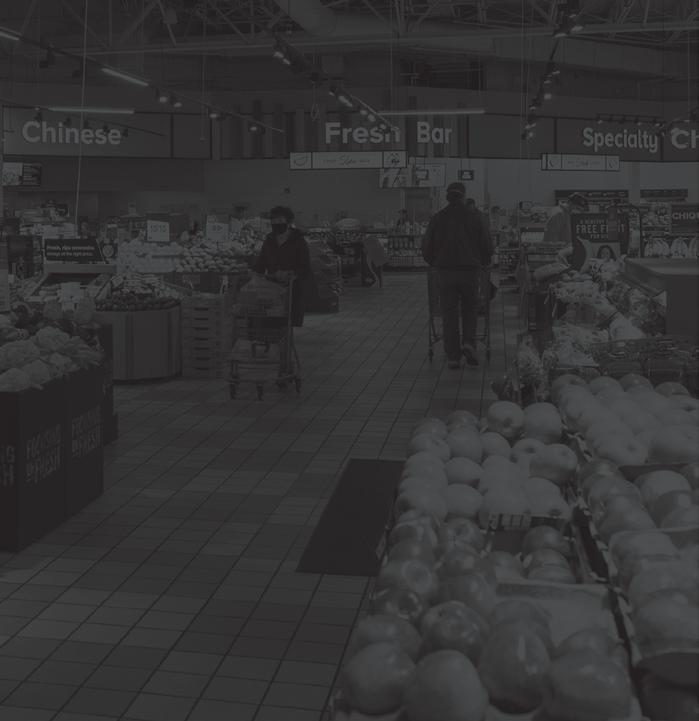
AGE 27
AGE 36

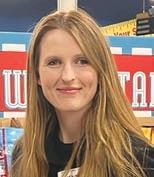
Having started out at Ruler Foods as a clerk while going to college full-time, Brinkley quickly rose to shift manager and upon graduation was offered an assistant manager role at a larger-volume store. After starting a family, she returned to Ruler Foods as a store manager — a role she recently left — in which capacity she welcomed trainees from across her district, traveled to help other areas and completed special tasks while keeping her store on track. Brinkley maintained low turnover by making solid hiring decisions and ensuring that her associates were properly trained, given feedback and made to feel part of the team. Senior TheEngineeringSoftwareAdvancedManager,KrogerCo.
lark built an internal tool called Abacus that’s still in use at Kroger today. A custom platform enabling the company to test a hypothesis for the front end user experience without any actual impact, Abacus allows product managers, front end stakeholders and other leaders to run experi ments, gather results and streamline operations. Currently guiding the mobile and web tech platform that powers the Kroger website, Clark is also building out the grocer’s new NextGen platform, an architectural perspective leading first-generation integration for the native app. He’s an alumnus of Northern Kentucky University, where he teaches as an adjunct professor and lecturer.
C
 Store Director, The Kroger Co./ Mariano’s
Store Manager, The Kroger Co./ Ruler Foods
Store Director, The Kroger Co./ Mariano’s
Store Manager, The Kroger Co./ Ruler Foods
COVER STORY
CLARKMICHAEL
Congratulations! Will Regan Strategic Planning & Commercial Finance Director From your team at TM on being named a recipient of the 2022 GenNext Award from Progessive Grocer
CYPRETMICHAEL
Store Leader, The Kroger Co./ Fry’s Food Stores





AGE 33
Cook’s team at the University of Cincinnati’s College of Phar macy developed an automated om nichannel engagement experience for patients to receive medication therapy management services. Through telephonic engagements with patients, her team at Kroger Health’s Center for Advanced Com munity Care completes comprehen sive medication reviews, eliminates gaps in care, converts patients to 90-day refill therapies and performs other targeted interventions, with all work visible to the patient’s local pharmacy team in real time, so continuity of care is maintained. This not only delivers value to patients by providing them with a superior clinical service, but also delivers results to Kroger’s bottom line.
AGE 33
Recently promoted to his pres ent position, Cypret focuses on making a meaningful impact in his community. As a member of Fry’s Young Professionals asso ciate resource group, he devotes time outside of his regular duties to giving back to his community; this includes volunteering at a local food bank and supporting Fry’s annual backpack donation drive benefiting underprivileged youth. He’s also a member of Fry’s health and wellness committee, which supports the mental health and well-being of the supermar ket chain’s associates. As a store leader, Cypret models servant leadership and helps his employ ees develop their skills and remove barriers to advancement.

AGE 32
During her nearly 10-year career at the grocer, DeMaria, a second-generation member of the Kroger family, has been presented with many opportunities to advocate for the needs of the company’s asso ciates and customers. One notable example was her two-year appoint ment to the board of directors for the state of Virginia’s Retail Merchants Association, where she represented Kroger and worked on collective so cial, agricultural and economic busi ness issues. DeMaria’s projects have ranged from leading cross-functional teams on custom branding efforts to being a voice for Kroger divisions on enterprise teams during the rollout of Master Brand, an all-encompassing 360-degree brand transition.
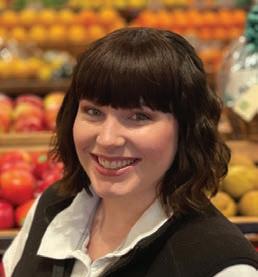

As an HR leader, Fickau intrinsically puts people first. In addition to caring for the grocer’s employees, though, she is also quite customer-centric, making decisions to ensure that stores best meet shopper needs. In 2021, she overcame challenges in a tough staffing market by using a team approach to hiring, leading and coaching a group of seven HR pros to achieve the division’s goals for that year’s continuous high-perfor mance cycle. Fickau’s efforts led to a promotion to her current role and her involvement in Roundy’s Better Together HR reorganization. She has been praised for leading by example and being solution-orient ed and diplomatic.


COOKALISON Clinical TheManager,OperationsKrogerCo.
DEMARIAMARISSA Co./NashvilleManager,CommunicationsCustomerTheKrogerDivision
FICKAUNICKI Division Roundy’sTheResourcesHumanLeader,KrogerCo./ AGE 37
CELEBRATES THE NEXT GENERATION OF INNOVATORSGROCERY GERRICK POLINSKY Manager,Curbsidee-Commerce&Catalog DORIAN BLANCO Assistant Store Manager We’re proud to recognize these winners of Progressive Grocer’s GenNext Awards and congratulate all of this year’s honorees.
2022 Awards
HOWARDZACK
Store Leader, The Kroger Co./ Smith’s


AGE 37
Combining passion, charisma and motivation, Gliva is an innovator in the packaged deli space. He has launched 215 Our Brands products from concept to shelf over the past three years and was behind the successful introduction of the deli’s freshly made tortilla chips. Through these and other accomplish ments, Gliva guided the pack aged deli area to a record year in 2021 with double-digit growth. Always customer-driven, he takes every opportunity to mentor and lead others, according to his nominators. His best attributes extend beyond the store, too, in cluding his involvement in the Big Brothers Big Sisters program.
AGE 34

Like many grocery leaders, Howard started out in the business as a teenager at the courtesy desk. He made a name for himself by stepping in when needed and relocating a few times to help struggling stores succeed. Now at the helm of one of the Smith’s banner’s top stores, he led the location to have the division’s best in-stock rate and set the example for a store manager walk for the entire company. Passionate about sustainability, Howard do nated more than 5,000 pounds of food through Kroger’s food rescue program and spurred his store to serve as the retailer’s rollout location for waste integration.
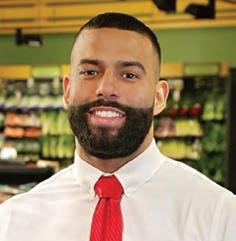
AGE 37
HUGHESROBERT
RalphsTheFieldMerchandisingProduce-FloralManager,KrogerCo./










AGE 30

KNUCKLESPATRICK
Fraud TheManager,InvestigationsKrogerCo.
t’s easy to say that this Gen Next leader blooms where he’s planted, but that adage is actually pretty apt. Hughes brings an undeniable freshness to his role, using his early background in produce and retail-honed lead ership skills to drive $980 million in sales at Ralphs. Among other achievements, he took the banner from zero to 110 stores producing value-added in-store cut fruit, recognizing the need to make that task faster and easier by ordering pre-skinned varieties. Before tak ing on his current position, Hughes was a Ralphs store manager in the Los Angeles area and won Store Leader of the Year in 2020.
I
iven the hit that grocers often take on fraud, Knuckles has an important role in protecting the Kroger business and its customers. He was hired to build out Kroger Personal Finance’s antifraud program and went on after that project to share information with internal and external audiences about preventing product scams. He also created a fraud awareness brochure that’s available at all of Kroger’s money services desks, and for Kroger team members, he updated antifraud training programs. Knuckles also saved the company from major financial losses by identifying risks within the fuel program related to loyalty gaming activity through fuel points.

G
COVER STORY
CRAIG GLIVA Category ThePackagedManager,Deli,KrogerCo.
CongratulationstoourveryownGenNextHonoreesJJSandersCategoryManagerProduceRebekkaPricePartnerDevelopmentSupervisorMacaelaLeClairAssistantCategoryManagerFloral
LONGWORTHDANA
TheofBusinessE-CommerceOwnerInnovation,KrogerCo.

E-commerce is a two-way street, in theory as well as in execution. As a key player in Kroger’s e-commerce opera tions team, Longworth looks at the digital channel from both the shopper and retailer perspective. As the pandemic accelerated e-commerce, she rapidly opened locations at a clip of 160 stores in three months and added enhancements to drive costs for users and the retailer. Longworth, who began her work at Kroger by leading the national rollout of Kroger Delivery across more than 2,700 stores, continues to innovate by reducing wait times and helping transform the e-commerce labor model to standardize demand on store teams.
AGE 34
MBRANDONcKELLER
Store Leader, The Kroger Co.
MILTONBILLY
Store Leader, The Kroger Co.
AGE 35
McKeller’s path to store lead er began when he joined the company as a clerk in 2008. As he steadily moved ahead in his career, he took on several roles in which he built and finessed his leadership and service skills. At his present high-volume location in Indianapolis — not far from where he grew up — he applies what he learned at Kroger’s Leadership Excellence Accel eration Program and is a go-to resource across the division for his operations expertise. Active in Kroger resource groups and sub committees, McKeller prioritizes mentorship not only among store associates, but also within the community he serves.
He’s known for his celebra tory huddles and signature hashtag, #GreatPeopleWorkHere. This enthusiasm carries through to other aspects of Milton’s leadership, from developing talent to taking on additional challenges. His store in Hampton, Va., garners $1 million per week in sales — well above the $800,000 in projected sales when the location opened — and is third in the enterprise in end-to-end product sustainment, a new Kroger initiative. Milton has been deemed a pillar of the com munity for forging relationships with nonprofits, community orga nizers and law enforcement, and is described by his nominators as energetic, excited and a veritable “Energizer Bunny.”



AGE 36
OLIVERJANQUITA
Store Leader, The Kroger Co.

A lthough Kroger is Oliver’s first and only employer, she has gotten to know the ins and outs of the business by taking on several roles since being hired as a cashier. Now a store leader, she leverages that experience and balances it by creating an atmo sphere of trust and engagement. A mentor who operates by an open-door policy, Oliver is also the finance and event-planning chair of the Young Professionals associate resource group and a prolific volunteer for several Kroger-sponsored events. Her nominators note that she seeks out growth and change, and is an inspirational leader for younger generations to follow.


GENNEXT AWARD RECIPIENT Z CH RY D r c r Z RY D r c rCongratulations! Fareway Stores, Inc.
2022 Awards
OWENSJENNIFER

Service Owner, Human Resources Shared Services, The Kroger Co.

AGE 39
Described as an active change agent, Owens continually seeks out ways to improve and transform the business. Addition ally, since she’s worked in health and human resources functions, she has a keen sense of people. These qualities proved invaluable during the pandemic, when she helped create automated solutions to answer questions and schedule vaccine appointments. Meanwhile, to centralize service for Kroger’s 430,000 associates, she led the launch of the company’s first all-employee help desk. Despite these professional challenges, Ow ens managed to graduate magna cum laude with a bachelor’s degree from Purdue University.
AGE 30
PADILLAJOAB
Store Leader, The Kroger Co./Fry’s Food Stores
APRIL PENCE
Communications and Engagement Manager — Merchandising and TheMarketing,Kroger Co.
AGE 39
Once a month (on his day off), Padilla hosts his “Build Your Future with Fry’s” day, inviting associates to sign up for one-on-one meetings so he can walk through the tools and resources that the company offers to better help them on their career paths. Since Padilla’s in-store career day concept has been such a success, the HR team followed his lead and now implements something similar in every store in the district. Padilla’s store also continues to be in the top tier of sales in the division, well below the district average for shrink, and tops in increasing sales over last year.
A s communications lead for Community Immunity Giveaway, Pence created a strategy to promote this groundbreaking program that encouraged associates and customers to get vaccinated by offering chances to win prizes like one of five $1 million checks, or groceries for a year. She worked with internal business partners to create clear rules and promotions for enter ing, as well as powerful storytelling to highlight winners and demon strate the importance of COVID-19 vaccines. This project garnered attention from the White House for Kroger’s role in advocating for vac cination. Pence also developed the communication strategy for Kroger’s Framework for Action: Diversity, Equity and Inclusion.
POULSONSABRINA
Poulson created a one-stop shop for meat leaders with relevant information that’s optimized to work with the Kroger FEED application; this tool allows meat leaders to quickly access from their phones everything they need, without their having to search. She also created a master list to make analyzing distributions efficient and accurate, ensuring that stores receive the right amount of product for sale promotions. After partnering with the retail operations team on a shrink initiative to identify cost and setup issues that create undue shrink, she helped identify north of $800,000 in under-relieved cost in the first month alone. Poulson is also a startup member of Smith’s Women’s Edge associate resource group.



Congratulations to our Winner!
Thank you for all you do for SpartanNash and the communities we serve.
Andy is a leader who lives our Core Behaviors of We Serve and We Have Fun every day. As Vice President, SpartanNash National Accounts, Andy leads a dynamic and highly productive team responsible for managing a $2B+ business across 20,000 ship points within SpartanNash’s national distribution network. His hard work and dedication have contributed to national account sales doubling in the past five years. Andy epitomizes our People First culture and nurtures young talent at SpartanNash. He recently led an intern project giving SpartanNash its first Guinness World Record, demonstrating to young professionals how valuable work can go hand-in-hand with fun.
 Division Perishable Sales Manager, The Kroger Co./ Smith’s AGE 25
Division Perishable Sales Manager, The Kroger Co./ Smith’s AGE 25
COVER STORY
Vice President, SpartanNash National Accounts ANDY CLAUSEN
GenNext
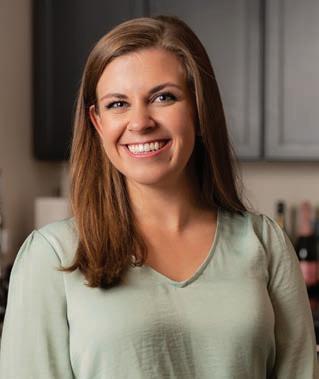

Wishing you both continued success and innovation! to our honorees
Emily Massi Andrew Scarpelli
GenNext
: Congratulations
2022 Awards
PRICEDEMETRIA
AGE 33
Price advocates for innovation, leading the charge in securing pilots to test the latest store tech nology at Ruler Foods. Due to her persistence and close relationships with cross-functional business units, Ruler was chosen to pilot the newest in-stock program. This was important for the division because its stores are smaller than a typical Kroger location. Price also secured pilots at Ruler for open-source telephony and self-checkout XXL installations. Additionally, when Kroger upgraded its capital man agement and purchase order ca pability, Price and a peer became subject-matter experts on the new system and trained the entire divi sion technology organization.
REUTERASHLEY
AGE 35
PUCHALAJOSEPH
Director, Forecasting Center of Excellence, The Kroger Co.
REEDSTELLA
Puchala created a Forecasting Center of Excellence from scattered and fragmented teams across the business. These efforts led to expertise being centralized and provided the ability to consult on best practices for the rest of the organization, while also building world-class forecasting solutions. Puchala built tools and teams that directly led to Kroger having better store demand forecasts and, subse quently, better on-shelf availability. While winning in forecasting innova tion, Puchala has made a significant investment in his community and the technology industry by forming the Men 4 Equality group within Women’s Edge at Kroger to increase men’s engagement in workplace diversity and inclusion.
RICKERBRITNEY
AGE 37
To alleviate staffing issues, Reed looked into resources that were previously underused. This led to a new relationship with the local Salvation Army that al lowed her to get the word out that jobs were available for anyone willing to be a friendly face for the community. This supported many local individuals who were with out stable housing and using the Salvation Army’s shelter services. Through this partnership, Reed gained new candidates to staff her store, but even more impor tantly, she showed her support of the local community, providing a new start and hope for many who didn’t have other employment opportunities.
AGE 29
REISERAIDAN
In 2021, Reuter helped roll out an associate experience overhaul for e-commerce in-store technolo gy. She worked closely with many different tech teams to create an experience that was better than the current in-store system through modernization. Reuter also led the effort to enable fulfillment centers to provide store pickup, which helped grow sales and improve the shopping experience and costs. She and her team were in stores each day, working alongside the associates to capture what was working, what wasn’t and overall feedback. Traveling across the country, Reuter created training documents and hosted training sessions with different stores and divisions to assist with rollouts.
AGE 33
Ricker developed the Marketing Download, a platform that serves as a foundation for Kroger’s daily communications. She also co-created the Marketing Connec tion meeting, a monthly gathering that brings leaders from outside the department to showcase po tential career paths for associates. Ricker has used her talents to coordinate several quarterly events to give associates even more ex posure to individuals on the team. Examples include a puzzle contest, a one-to-one lunch/break hangout and a food/book drive competition. She has managed initiatives in many categories, most notably the 2019 Master Brand Launch — the largest marketing campaign in Kroger’s history.
TURNERSTEPHANIE Director of TheEdibleMerchandising,GroceryII,KrogerCo. AGE 36








Because her feedback and perspective are so valuable, Turner is asked to pilot many new systems and processes. She championed the grocery Our Prom ise team, breaking down barriers and improving job performance and work-life balance for associ ates. While overseeing the inter national categories, Turner led the grocery department’s multicultural growth efforts. She built depart ment strategies, including relevant assortment and promotions, and maximized supplier investments. Turner created new merchandising standards to better serve and en gage Hispanic shoppers. She also represented Kroger in the Mortar program to coach minority busi ness owners for success in retail.
Reiser aligned and guided divisions in a single retail internship strategy while allowing for local customization of various banners. She created an internship program that benefits both interns and division leaders and in turn had a strong collective buy-in, resulting in an industry-aligned conversion rate of 50% and higher for interns hired as full-time asso ciates. Recognized as the Center of Recruiting Excellence CoRE Recruiter of the Year and CoRE Recruiting Supervisor of the Year, Reiser plays a key role in two com pany transformations, leading the creation of almost 400 associate appointment letters for end-to-end fresh merchandising and Kroger Technology & Digital.
WANDERAMANDA
S ince starting her career with Kroger as an intern, Wander has evolved with the industry to add value and train business analysts to compare the grocer’s human resources processes across retail, manufacturing and the com pany’s various divisions. According to co-workers, her greatest demon stration of innovation, leadership and commitment to the industry has been the way in which she led improvements and challenged peo ple to think about Kroger’s benefits strategy. Outside of work, Wander is involved in the Down Syndrome Association of Greater Cincinna ti, whose mission is to enhance communities, educate families and celebrate the lives of those with Down Syndrome.
Business Owner, Off Site Fulfillment, The Kroger Co. 34
Division Promo ThePlanner,Kroger Co.
Senior Manager of TheManagement,ProductKrogerCo.
Senior
Internship Program Manager, The Kroger Co.
Store Leader, The Kroger Co.
94 progressivegrocer.com COVER STORY
AGE
RulerTheManager,InfrastructureKrogerCo./Foods
AMANDA LAI Food PracticeRetailLeader and Senior McMillanDoolittleManager,

 CLARKJORDAN Director MeijerCompensation,of
CLARKJORDAN Director MeijerCompensation,of




AGE 29
In the span of five years, Lai has earned three promotions and now leads McMillanDoo little’s food retail practice. She is an emerging thought leader in the industry, itsfunctionalpartretailerwithpresence.developself-taughtpersonalcreatequicklypandemic,publications.torMcMillanDoolittlerepresentingasacontributoleadingnewsoutletsandAttheonsetoftheLaiwasintegralinpivotingthecompanytovirtualcontent,leveragingcameraequipmentandvideo-editingskillstoMcMillanDoolittle’sdigitalLaialsoworksdirectlyaleadingSouthKoreanandhasbeenanintegralofstandingupherclient’steamsasitestablishedU.S.business.
MURRAYJESS
AGE 35
Clark’s compensation team is responsible for ensuring that the Meijer and Fresh Thyme Market compensation programs are competitive to market and compliant with applicable laws and regulations. He designs and manages programs that include hourly and salary plans, annual bonus plans, and long-term incentive plans for 70,000 team members. A key project that he designed and implemented was a shift to performance pay in lieu of an hourly wage in certain distribution buildings. According to colleagues, Clark is seen as a role model by many, specifically for his ability to self-develop through leadership experiences, charting a path, openly receiving developmental feedback and building a network of resources.
SANCHEZCOURTNIE
Through her work as market director, Murray has im proved customer pickup times by 32%, achieved the second-best customer wait time for digital pickups in the company year to date, improved 25% in customer metrics, and been No. 1 in the company for both on-shelf avail ability and mCulture, the grocer’s internal culture survey. She is also an advocate for her team and has worked to identify talent; provide team members with education, training and mentorship; and promote team members into lead ership. Murray serves as chair of the Western Region Team Mem ber Resource Group, in which role she works to develop the next generation of female leaders.
After starting as a part-time team member 14 years ago, Sanchez held various positions, including line lead, store director development, fresh specialist and market asset protection manager. As a solutions-oriented leader, she identified ways to partner and innovate to reduce food waste and further support the communities that her store serves. Sanchez’s leadership within a resource group has provided her with opportuni ties to identify and develop future talent, and co-workers say that she provides authentic space for team members to share their various cultures, as well as including in her store a world map highlighting the more than 20 languages spoken by team members at the location.
BEN HAMLIN Food,OwnDirector,BrandMeijer
MIKE KLOMP Senior MeijerPlanningStoreManager,


Proving himself to be a leader in Meijer’s own-brand space, Hamlin has developed and execut ed best practices for the retailer’s private label business planning while also aligning and executing guidelines for each individual brand. He specifically had a big influence on the Frederik’s brand launch by identifying new products and fully following through with their execution. Previously, Meijer’s focus was on comparing private label product ingredient lists with national brands, but Hamlin’s data focus has helped create a new way of thinking by relying more on quality assessments via customer insights and other information.
AGE 33
K

lomp’s leadership helped drive transparency and alignment in developing the new Meijer grocery format, and the design was final ized under an expedited schedule that will enable two pilot stores to open in this fiscal year. He has led Meijer’s supercenter proto type ideation project and has also implemented a robust new store prototype management program, both of which have modernized the civil and supercenter planning process. Standard operating procedures are in place to routinely collect feedback on building de signs for the purpose of continuous improvement, and feedback is solicited from internal and external stakeholders to ensure that design evolves to meet current needs.
 Market Director, Meijer
Store Director, Meijer
Market Director, Meijer
Store Director, Meijer
AGE 31
AGE 34
Progressive Grocer Next Gen Award Winner 2022 THE BOTTICELLI CONGRATULATESFAMILYJOEASARO
THOMPSONPAUL

WERNERLARA
SONESTYLER











 Digital Manager,FulfillmentMeijer
Digital Manager,FulfillmentMeijer








AGE 39
President, OPIE Grocery Stations
AGE 38
Thompson and his logistics teams and merchants have helped build stronger relationships and open lines of communication with vendors to directly address out-of-stocks and accompany ing sales impacts. He provides the organization with a weekly snapshot of what’s taking place in the transportation industry and its impact on Meijer, and as a result of his quick actions, in-stocks have improved by more than 25% due to products arriving on time. Colleagues consider Thompson a fierce and passionate competitor who loves to drive change that leads to company growth. Store MeijerDirector,



Starting as a store director in the midst of the pandemic, Vargas knew that investing in people and building a team that felt like a family would be key to his success. He built a sense of belonging among his team mem bers through special recognitions and celebrations, as well as urging them to engage with the commu nity to expand their impact. Vargas improved his internal-culture survey score by more than 58%, making his location one of the top three most improved stores throughout the chain, and his store also saw the highest Shop & Scan usage in Q1 and increased onshelf availability by nearly 10%.
Werner led the creation of Meijer’s digital fulfillment team, which didn’t exist in Feb ruary 2020, and spent just three months planning and considering risks, priorities and capabilities. She collaborated with leadership to identify and understand what was needed, aligned responsi bilities for her new team, defined the metrics she would use, and hired and empowered her new talent. Werner’s efforts resulted in an 89% increase in the number of Meijer stores with pickup ca pabilities, and her team has since reduced the average customer wait time by 60% to less than five minutes and driven pick rate improvement of more than 40%.

AGE 24
Amaster of problem-solv ing, Sones acted promptly when OPIE’s local dairy supplier unexpectedly shut down, finding and contacting four alternatives in the region, determining options for cross-docking delivery with supply wholesalers, and present ing a spreadsheet with the pros and cons of each dairy. He also created the store-based Microsoft Teams channels and PowerApps enabling all managers to work off the same daily checks at the store, found creative solutions when the drive-thru grocery sensors were down, spearheaded a Thanksgiving turkey promotion that increased sales by 200%, and volunteered to be the first to be trained to operate OPIE’s delivery robot.
International Director of Logistics, Meijer
COVER STORY 2022 Awards
VARGASJIMMIE
Nate Vollmer We’re very proud to recognize and the outstanding winners of the GenNext Awards. trigs-nate-vollmer-halfpg-horizontal-bleed-FNL-gennext.pdf 1 8/22/22 9:19 PM
CHAVEZERIN
AGE 33

Chavez led work on cleaning solutions that were paused and re-evaluated during the pandemic, alongside evolving con sumer behaviors and motivations. She and her co-founder identified a clear job to be done, which inspired a brand-new product solution: Swipes. Chavez also headed efforts to launch the team’s first transactional learning experiment, taking ownership of many of its el ements, including e-commerce de sign and execution, ad creative, the customer relationship management program, and data tracking. As well as her “day job,” this innovative, intelligent, empathetic young leader co-led the family care brand culture team, which she bolstered in a still mostly virtual world.

AGE 39
SCHNEIDERMIKE
AGE 31
(SID)VENKATAKONKA

ServicesRetailArchitecture,SolutionsDirector-DataBusiness(RBS)

Schneider’s business contribu tions include leading the 52week scale plan of P&G’s Olympic execution, driving a historically high sales week, and delivering signifi cant value for the Meijer-P&G joint business. His thought leadership has been leveraged across regions, speed teams and the shopper mar keting network for an even greater impact on the organization, while his leadership development of a younger colleague in the area of digital commerce was recognized by P&G’s baby category, leading to a newly created role and promotion for the colleague. Co-workers aptly note Schneider’s ability to “[make] you feel as if you’re the most im portant person in the room.”
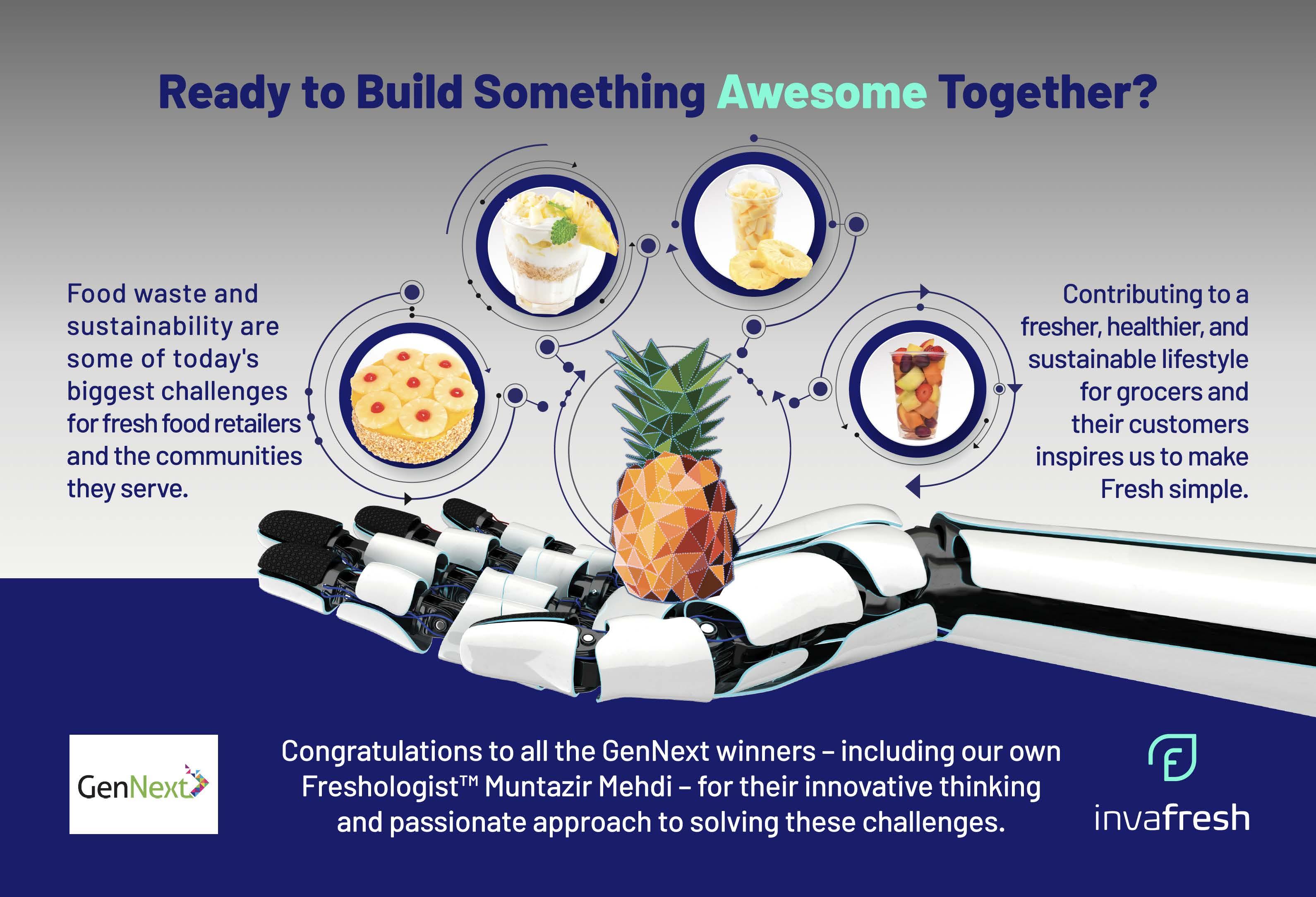
Konka ensures that RBS’ endto-end design is delivering to help meet customer needs while remaining consistent and aligned to its architecture principles. In key initiatives like Ahold Delhaize USA Supply Chain insourcing or SAP software deployment, he influences and educates company leaders on up-to-date ways to use and deliver data, leading to a more decoupled architecture, more reusable com ponents and an overall more robust implementation. Konka is currently also leading the technical solution supporting RBS’ compliance with the Virginia Consumer Data Protec tion Act, demonstrating his capacity to mobilize a team, negotiate with various stakeholders and deliver on a complex initiative.
AGE 28
CASTILLOLONDONOJUANITA
Software Engineer IT, Retail Business Services (RBS)
I n under three years, Castillo has gone from a participant in the IT co-op to a respected leader and transformation agent playing key roles across numerous critical areas. Her excellent design-cen tered research on various topics has been leveraged in strategy creation, project plans, succession planning and key internal commu nications. Through her organically developed reputation, she has been requested to educate teams not only in IT, but also across other RBS pillars and Ahold Delhaize USA’s brands and strategy team. Castillo is additionally a champion of diversity, equity and inclusion, dedicating her time to making RBS a better place to work.
Brand ProcterDirector,MarketingSam’sClub,&Gamble
Brand Marketing and &Director,E-CommerceProcterGamble
2022 Awards
FUSCOZACHARY
AGE 30
Since 2015, Fusco has led a full remodel of his family business’ Madison, Conn., location; navi gated the store through a Stop & Shop strike, hurricanes and power outages; overseen a change to C&S Wholesale Grocers; and built a second location, Brookside Market, in South Glastonbury, Conn., amid the pandemic. His leadership “shows on a daily basis his fun, engaged, hands-on management style; exacting standards; and true passion for the supermarket industry, which is contagious to all team members around him,” notes his father and nominator, Robert, who adds that the younger Fusco is developing numerous department heads as future leaders.
AGE 31
MAREANEJON
Product Manager, Rosie






















CLAUSENANDY
Mareane worked closely with a small team at Rosie to launch the Online SNAP Food and Nutrition Service pilot program for independent grocers. While many at the company contributed to the program, Mareane tirelessly led the charge and was vital to its success, his thoughtful, detail-oriented ap proach guiding Rosie through the complicated testing and approval process. He was also able to break down the complex application, approval and certification journey for retailers to make it simple. According to Rosie, “This new functionality will change the game for a countless number of small and independent grocers, and the customers they serve.”

Clausen oversees $1 billion-plus in SpartanNash’s national ac count business and manages more than 20,000 of the company’s ship points across the country. His hard work and dedication have helped national account sales double in the past five years. Clausen has also championed many successful projects at SpartanNash; these include leading efforts to create a new West Coast partnership that provided the network with an extra 500,000 square feet at a minimal investment. The partnership ad ditionally reduced SpartanNash’s annual transportation fleet mileage by 10%, lowered greenhouse-gas emissions by 10,000 metric tons, and saved roughly 1 million gallons of diesel fuel annually.

VOLLMERNATE
Director of Inc.SolbergResources,HumanT.A.Co.(Trig’s)


S
tarting out at Trig’s 14 years ago as a cart collector and quickly identified as a growth associate, Vollmer has created structure in the HR department, ensuring that his team has what it needs to be successful. He has also reinvented the annual confer ence into a fun and positive lead ership training occasion topped off by a first-class awards banquet to celebrate the accomplishments and anniversaries of teammates. Giving recognition to others is al ways top of mind for Vollmer, who has nominated many teammates for awards so that they can feel appreciated. Now his grateful colleagues have enthusiastically returned the favor.
 VP, FoodRobert’sCenter and Brookside Market
VP, SpartanNashNationalSpartanNashAccounts,
VP, FoodRobert’sCenter and Brookside Market
VP, SpartanNashNationalSpartanNashAccounts,
COVER STORY
EnsembleIQ is the premier resource of actionable insights and connections powering business growth throughout the path to purchase. We help retail, technology, consumer goods, healthcare and hospitality professionals make informed decisions and gain a competitive advantage. EnsembleIQ delivers the most trusted business intelligence from leading industry experts, creative marketing solutions and impactful event experiences that connect best-in-class suppliers and service providers with our vibrant business-building communities. To learn more about our brands, visit ensembleiq.com ACTIONABLE INSIGHTS & CONNECTIONSBUSINESSPOWERINGGROWTH 98 progressivegrocer.com
SCARPELLIANDREW Manager



NIEMANSETH

VP-Pricing, VMO and Space Planning, Wakefern Food Corp.



AGE 31
In his former role as merchan dise planning manager at Giant Food, Scarpelli conceived many promotional programs, develop ing strong connected-customer strategies. Facing technical limita tions, he identified key gaps in the customer’s omnichannel experi ence and sought to facilitate part nerships within the organization to best develop programs that could be delivered both in-store and online. Through various pro grams, Scarpelli worked closely with key functional areas and stakeholders, and created funnels to institute seamless experiences in offering consumers deals and pricing in multiple channels — meeting customer demand any way they chose to shop.
AGE 30
ieman’s rise at Wakefern has been swift. Previously on the procurement team at Lidl, he brought his private label expertise to Wakefern at a crucial time of expansion and strategic focus for its Own Brands team. In less than two years, he led the analysis, development and relaunch of 40plus categories under Wakefern’s new Bowl & Basket and Paperbird brands. He also established a “dig ital-first” strategy for the ShopRite banner at a time when execution of traditional promotional methods was challenged by the pandemic. This strategy positioned the retailer cooperative to succeed financially while growing its base of valuable omnichannel customers.

PROGRESSIVE GROCER September 2022 99
WinePlanning,PromotionsofTotal&More
NGENNEXTCONGRATULATIONSTOTHISYEAR’SWINNERS! The future of grocery is pulling up Congratulations to this year's GenNext leaders, including our own, Tyler Sones!
CHICKEN AND TURKEY OFFER DIFFERENT FORMS OF VALUE FOR TODAY’S MINDFUL CONSUMERS.
By Lynn Petrak
hich came first: consum ers’ taste for chicken, or external market factors influencing demand?
In a arecumstances2019pre-pandemicbecomecomparedmarketplacestill-unusual—atleastwithwhat’sabellwetheryearof—convergingcirandtrendspushingpoultryto
the head of the protein pack. According to the U.S. Department of Agriculture (USDA), per capita consumption of chicken is expected to edge up 0.11% this
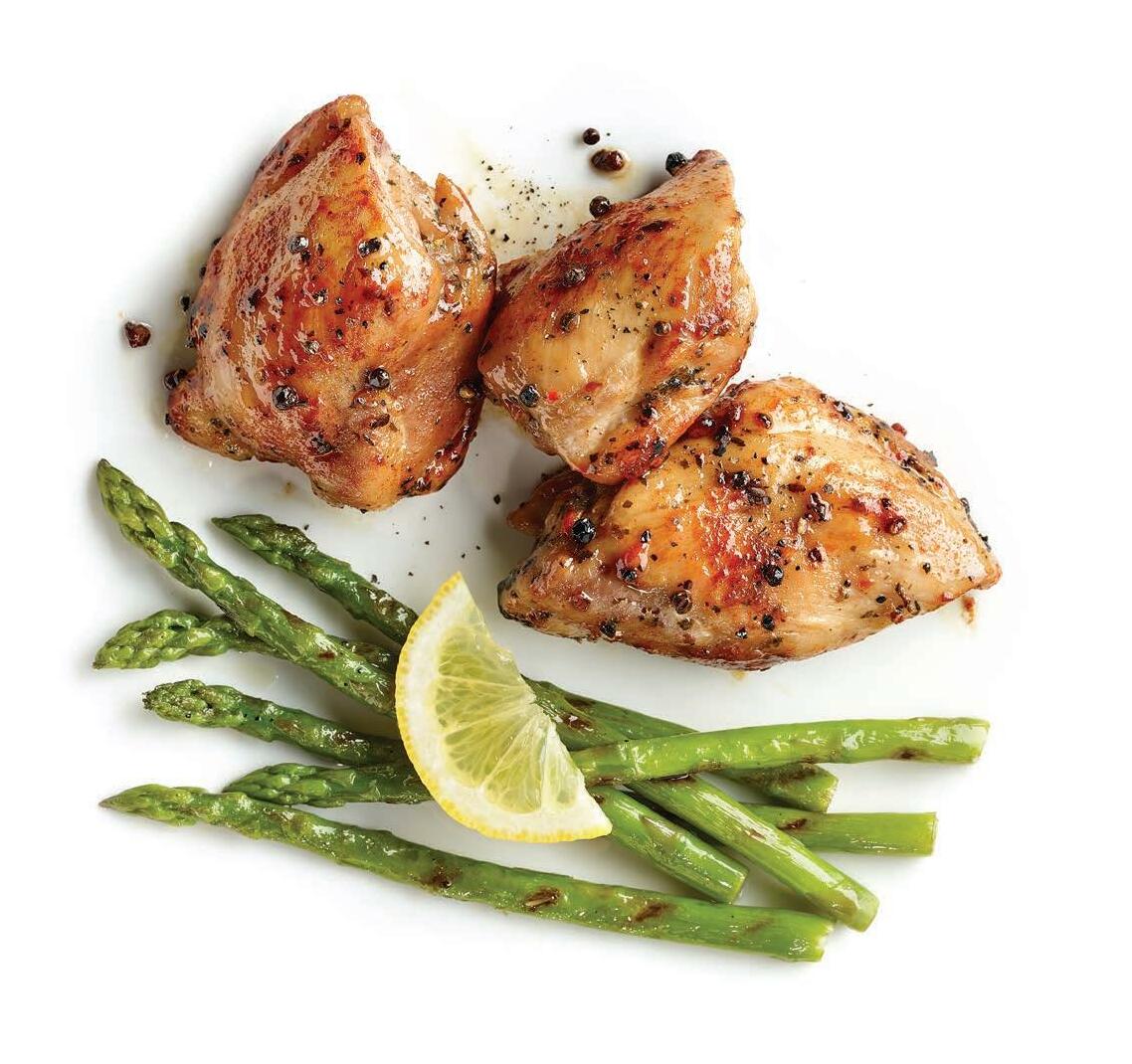
Key Takeaways
C onverging circumstances and trends are pushing poultry to the head of the protein pack.
D emand for cooked and valueadded products is especially high, while meal kits are tapping into demand for flavor and Tconvenience.hefrozenand heat-and-eat categories are a particular hotbed of R&D activity, and poultry-based meat snacks are lending species diversity to the snack aisle.
100 progressivegrocer.com SOLUTIONS Poultry Report
PoultryFlockingShoppersto
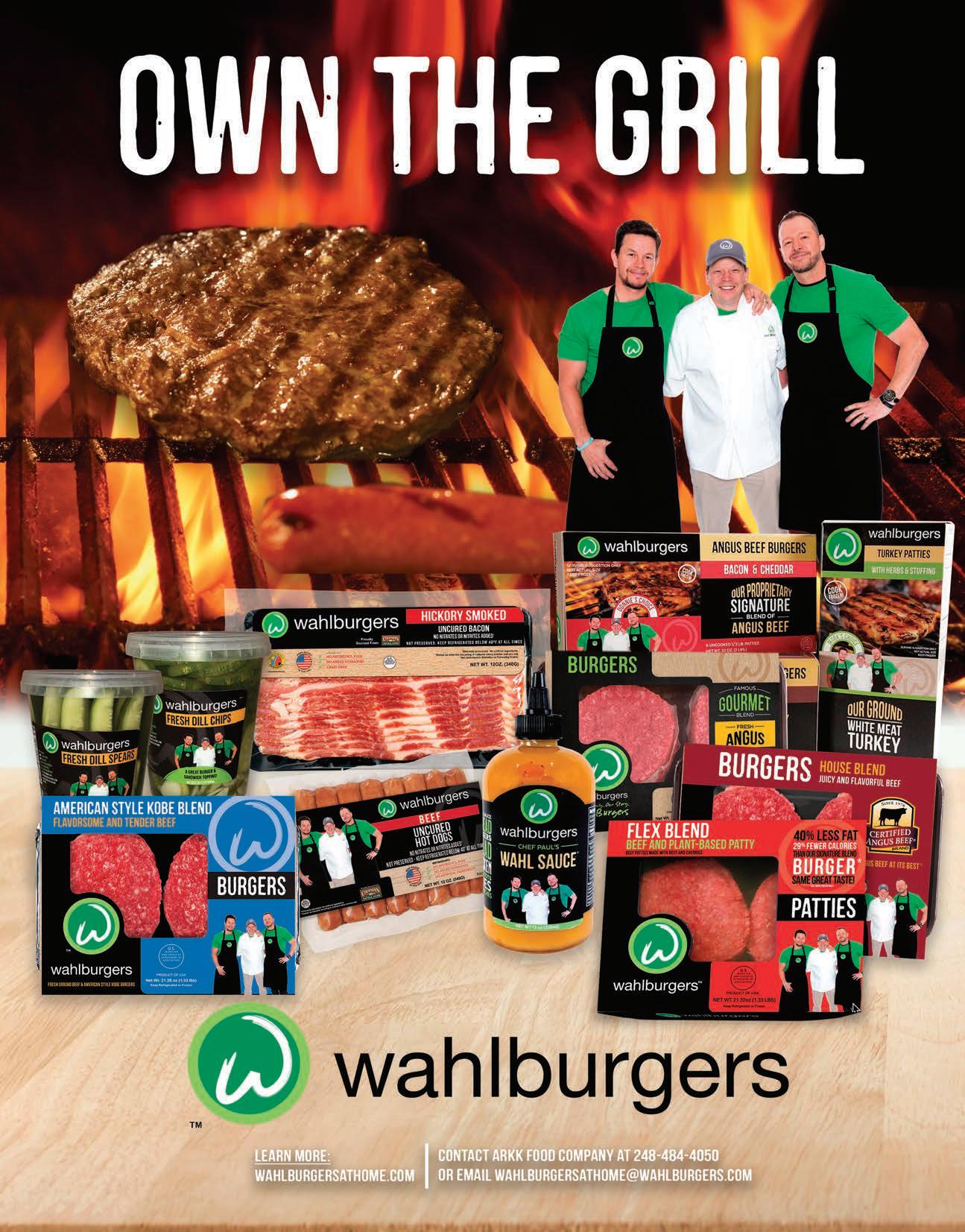
Poultry Report
year, and turkey will rise 0.35%, while beef and pork are projected to dip by 0.34% and 0.20%, respectively. The USDA notes that the positive chicken performance continues a long stretch of year ly increases, while the uptick in turkey is the first year of growth for that protein since 2016.
Industry research likewise points to a strong year for poultry. The Washington, D.C.-based National Chicken Council (NCC) pegs chicken consumption at 96.9 pounds per person this year, versus 58.9 pounds for beef and 51.1 pounds for pork.
“Chicken has proven to be infla tion-proof,” observes NCC spokesman Tom Super. “Consumers recognize that chicken prices are higher, but still plan to buy more chicken than other types of protein in the 12 months ahead. Chicken purchasers cite nutrition, value and versatility as the top reasons for consuming more chicken.”
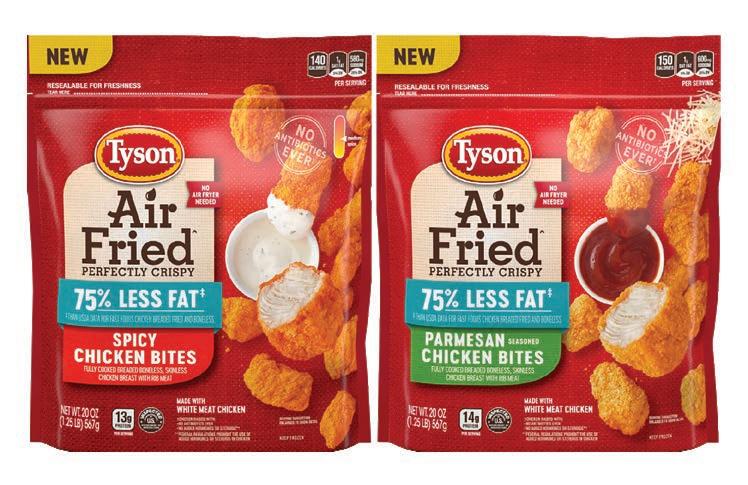

The National Turkey Federation (NTF) weighs in that turkey consumption has
nearly doubled since 1970 and reached 15.3 pounds per capita in 2021. The NTF, also based in Washington, D.C., reports that the number of value-added products in the turkey category has increased over the past few years and led turkey production to top 216.5 million birds last year.
As for other species, the USDA predicts that seafood consumption could rise as much as 10.5% in 2022. The meat alterative market, while garnering attention, remains small; according to the “Power of Meat” report published by Arlington, Va.-based FMI — The Food Industry Association, 9% of consumers eat plant-based meat alternatives on a weekly basis.
Per capital turkey consumption rose in 2021 for the first time in five years as brands and retailers promoted value-added cuts.
Capitalizing on consumers' use of air fryers, Tyson introduced a new line of heat-andeat chicken nuggets, bites and strips.
102 progressivegrocer.com SOLUTIONS
Poultry is well positioned for growth at the meat case for a variety of reasons. Ongoing surges in food prices, especially in beef, have led inflation-weary consumers to change up some of their habits at the meat case. In early August, Springdale, Ark.-based Tyson Foods noted that demand for chicken was “extremely strong,” while demand for premium beef cuts has waned. Also that month, Chicago-based crop trader Archer-Daniels-Midland Co. shared that demand for chicken feed is higher than that for cattle feed, another demand signal.
During this wobbly economy, other extenuating factors have affected supply-and-demand curves for poultry. The much-bal lyhooed chicken wing shortage over the past couple of years caused market glitches as retailers promoted chicken thighs when supplies were tight. Feed prices have been high at many points as geopolitical problems erupted and as supply chain hiccups caused shipping delays. Outbreaks of highly pathogenic avian influenza in certain parts of the country, including California, affected local supplies when flocks had to be culled.
Today, with crises related to COVID-19, supply chain backlogs and acute labor shortages easing somewhat compared with a year ago, poultry can be a sweet spot for grocers touting the price-value equation and diversity in offerings.



Not Just Winging It

As Americans down a lot more chicken than any other proteins, they have more choices at the grocery store, too.
For example, although many people are back to full-swing or almost full-swing schedules, there are still many folks who continue to cook at home and are looking for solutions to save them time and hassle. Demand for cooked chicken — including but beyond the stalwart rotisserie chicken — is especially high.
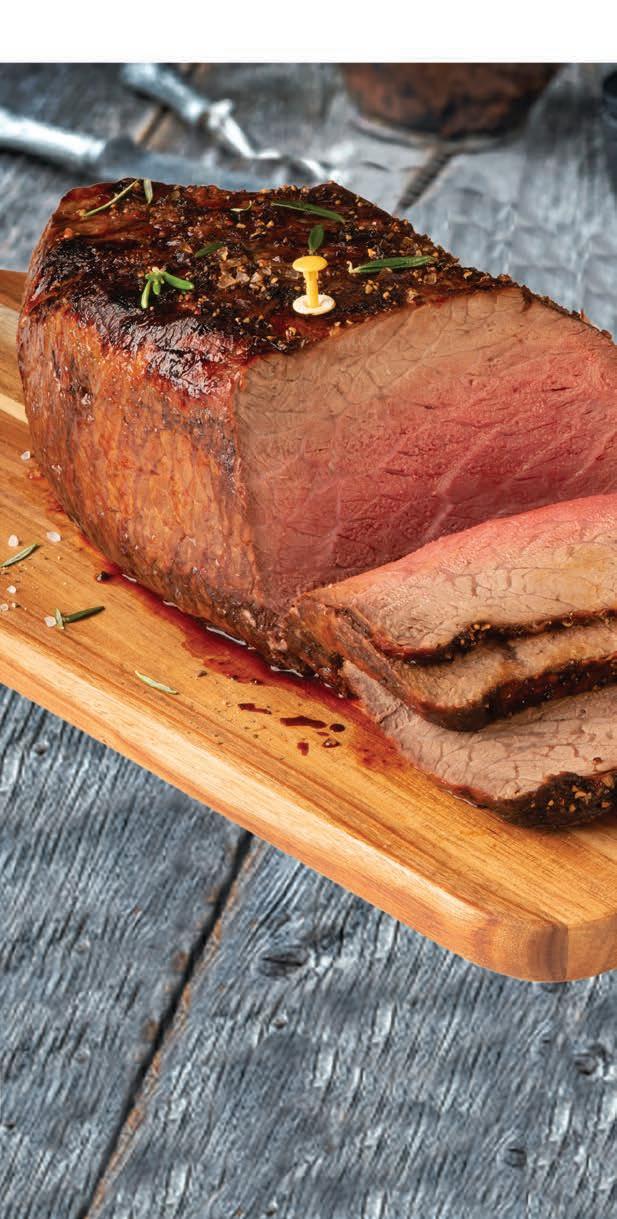
“Consumer interest in high-protein diets is continuing to spur innovation in the chicken industry,” observes Super. “One example is cooked chicken. Companies are committing serious investments to ramp up production of cooked chicken to meet current and future demand. Investments are particularly devoted to automation and ro botics as securing sufficient labor remains an operational challenge.”

Value-added poultry products are also making things easier and more interesting for shoppers. The venerable Butterball brand, for instance, offers both fresh and frozen seasoned turkey burgers. Another turkey brand, Jennie-O, has added a slew of fresh and frozen value-added items to its portfolio, including packages of taco-seasoned ground turkey.
 —Tom Super, National Chicken Council
—Tom Super, National Chicken Council


chickeninnovationcontinuingproteininterest“Consumerinhigh-dietsistospurintheindustry.”
Poultry Report
the chicken category, both in terms of product develop ment and in-store merchandising. Grocers can provide solutions for consumers on a budget by promoting value cuts like chicken thighs and drumsticks and pointing shoppers to prepared meals that have smaller portions of chicken or turkey as ingredients.

Planet Poultry
Finally, as in other areas of food retailing, the push for sustainability is evident in the poultry part of the meat case. One example is a line of chicken from Bedminster Township, N.J.-based Do Good Foods: The broilers are nourished with chicken feed that has been upcycled from surplus food that consumers bring to grocery stores. The chickens are raised with no antibiotics, hormones or steroids, and in a cage-free setting.
In chicken, Harrisonburg, Va.-based Farmer Focus, a 100% USDA Organic and Humane Certified chicken company, offers culinary-inspired pre-seasoned varieties like Zesty Peruvian Lime, Rich Red Curry and Chophouse Seasoned.
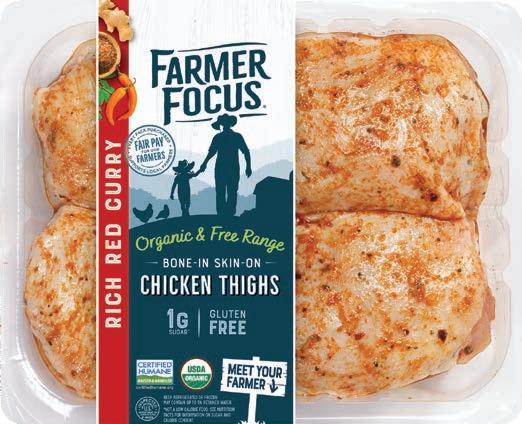
Leading category brand Tyson is tapping into demand for flavor and convenience with its line of ready-to-use meal kits designed for particular cooking methods. Offerings include a hatch-green-chilechicken-and-rice meal kit for Instant Pots, and a chicken-and-veg etables meal kit for slow cookers. Hitching onto the popularity of one-pan meals, Tyson offers kits for those applications, too, includ ing a meal kit with roasted garlic chicken and parmesan mushroom risotto that can be prepared in a skillet in 15 minutes.
In addition to Tyson, other meal kit makers are providing varieties with easy, accessible poultry. New York-based Blue Apron, for ex ample, recently teamed up with Walmart to offer non-subscription meal kits in varieties like Rosemary & Panko Chicken with Roasted Potatoes and Creamy Lemon Sauce.
The frozen and heat-and-eat categories are a particular hotbed of R&D activity. Based on the popularity of air fryers, Tyson launched a line of Air Fried chicken nuggets, bites and strips that can be cooked in an air fryer and contain 75% less fat than other fried chicken options. Meanwhile, Chicken Plus Chicken Tots from Salisbury, Md.-based Perdue Farms, made with a blend of white-meat chicken, cauliflower, chickpeas, cabbage and potatoes, recently won a People magazine food award as one of the best new supermarket products of the year.
Between meals, meat snacks made with poultry are lending species diversity to the snack aisle. “Protein snacks are another category projecting upward,” notes Super. “Many consumers are snacking more and are looking for high-protein, low-fat products that are healthy but also fill you up. Chicken meat snacks include salty snacks made from chicken skin, courtesy of brands like Flock, and jerky products with chicken as the main ingredient.”
In addition to variety and ease of use, value is increasingly driving
The emergence of such products aligns with an over all movement within and beyond the industry to produce poultry in a way that’s better for the planet and for the birds themselves. A high-profile science-based initiative called the Better Chicken Commitment (BCC) has brought on several leading companies pledging to meet higher standards for broiler chicken welfare. Participating grocers include The Kroger Co., Giant Eagle, Natural Grocers and Sprouts Farmers Market, among others. CPGs such as General Mills, Kraft Heinz and Unilever are also taking part, as are poultry suppliers Perdue, Wayne Farms and Mary’s Chicken.
There’s also now a U.S. Working Group for Broiler Wel fare, facilitated by Compassion in World Farming and Blue House Sustainability Consulting. In August, those entities revealed that Giant Eagle, Sprouts, Natural Grocers, Target and Whole Foods Market are taking part in the effort to sup port food businesses in transitioning supply chains through the welfare standards outlined in the BCC.
“At Whole Foods Market, we’ve long maintained rigor ous quality standards across our meat department and take the issue of broiler chicken welfare seriously,” said Karen Christensen, SVP of merchandising for perishables at Austin, Texas-based Whole Foods, when news of the working group broke. “We sincerely appreciate the im portant work of Compassion in World Farming, and we’re excited to join the working group to share what we’ve learned about raising the bar for broiler welfare and to join with others in pushing for systemic change.”
A new line of pre-seasoned fresh chicken from Farmer Focus reflects shoppers' interest in organic, convenient and flavorful options.
104 progressivegrocer.com SOLUTIONS
Baking Ingredients
andFlavorfulEthical
on direct trade and sustainability around vanilla,” Delafield notes. “There was some work around sustainability and supply chains around coffee, of course, and folks working a little bit on cocoa, but nothing around spices, and really nothing in Madagascar.”
So, Delafield’s company set about building its sustainable vanilla business model. From the very beginning, Lafaza took on sustain ability as sort of a three-pronged approach.
here is perhaps no more popular flavor in the store bakery than vanilla. From vanilla cakes to vanilla cookies to vanilla custards, consumers never seem to tire of the spice. The pandemic only accelerated demand for the flavor as baking at home surged and shoppers added vanilla-perfumed sweets and other comfort foods to their omnichannel carts.
Now, however, the demand for the flavor is evolving, from plain old vanilla to vanilla with a story. And Lafaza Foods, a 15-yearold vanilla supplier based in Berkeley, Calif., is aiming to meet that demand with a three-pronged sustainability business model focused on forests, farmers and quality flavors.
This “Triple-F Bottom Line” has guided the company’s growth for the past 15 years, from the co-founders’ early Peace Corps experiences working with rural vanilla producers in Madagascar, to a thriving company servicing retail ers, wholesalers and foodservice operators.
“The founding principle of Lafaza was to take a sustainability approach from the very beginning,” says Nathaniel Delafield, co-founder and CEO of the company. “When you start with a sustainability model to begin with and build a company around sustainability principles and practices, it’s much more effec tive in terms of scaling out an approach that can be successful for more and more people along the supply chain over time.”
A Sustainable Foundation Delafield founded the company with his brother after serving in the Peace Corps in Madagascar and wanting to help vanilla farmers there.

“The reason we started the company is these communities in Madagascar really challenged us when we got there to work with them on accessing more direct markets,” Delafield recounts. “They had been working with vanilla for several generations of farming, but at the same time they were very disconnected from the international supply chains that really affected them and that they were supplying.”
Madagascar supplies about 70% to 80% of the world’s vanilla, about 50% of which is used mainly in the United States. Lafaza, which is the Malagasy name for a palm tree that grows along side vanilla in and around the lush tropical forests of Madagascar, thought that maybe there would be a way to look at the supply chain a little bit differently to help these farmers and communities.
“We looked around for partnerships and couldn’t find any companies or partners that were really interested in working
1EnvironmentalSustainability
“We wanted to make sure everything we were working with really spoke to the unique and sort of amazing environment of Madagascar,” Delafield says. “We wanted to have principles and farming practices that really respected the environment of Madagascar and provided conservation and ecosystem services around communities, because the farming that we work with is largely agroforestry farming systems that are very complicated. They feel and act a lot like natural forest, and they provide a lot of those services that a natural forest would: soil, regeneration, water filtration, animal habitats and many other things as well. So envi ronmental factors were the first pillar for us.”
2Social
“We wanted to make sure that everybody who was working with our company and the supply chains we were involved in had benefits that were equitably shared along the value chain,” he continues, “and we wanted to make sure that we were involved in improving livelihoods and communities at all points. We wanted to make sure that there were positive social outcomes from our work everywhere.”
Economic
“Sustainability to us is also about financial and economic sustain ability,” Delafield emphasizes. “It’s very important for people to have strong live lihoods and economic viability; we needed to have a strong financial base for our company. We wanted to make sure that communities were thriving finan cially, and we wanted to make sure that our model was built on a real, scalable financial model of business in the vanilla and spices industry and trade, so that no matter what happened, it still could function and thrive as a very standard business as well, and so
VANILLA SUPPLIER LAFAZA FOODS’ THREE-PRONGED APPROACH TO SUSTAINABILITY IS FOCUSED ON FORESTS, FARMERS AND FLAVOR. By Gina Acosta
“The veryapproachsustainabilitywasprinciplefoundingofLafazatotakeafromthebeginning.”
—Nathaniel Delafield, co-founder and CEO, Lafaza Foods
PROGRESSIVE GROCER September 2022 105 CPG PROFILE
Baking Ingredients

could all the folks and businesses that we work with along the way.”
Lafaza now works in four regions of Madagascar with hundreds of farmers each year with organic and fair-trade certifications. It also works with a much larger farmer network each year on sourc ing vanilla beans. The company sells products not only to grocery stores, but also to retail bakeries and other operators.
“Our bread and butter in the beginning was really about providing ingredients to brands and also to store bakeries and restaurants,” Delafield explains, “and we still do quite a lot of that type of business. We’re very able to work with a bakery department, a bakery division within a retail outlet, or work with bakeries directly if they’re third party, where we can be providing much more of a bulk-format product, but still the same great fla vor that we offer, whether it’s an organic-certified vanilla extract or even a commercial, more concentrated extract.”
According to Delafield, one of Lafaza’s advantages is the strength of its supply chain. “Our supply chain is so valuable to a retailer,” he says. “The last thing you want to do is get into a retailer and then struggle with the fill rate on the shelf. That’s where a lot of our peers are struggling right now, but from the way we go about our business, we’re in the high 90s in terms of fill rate percentage.”
Demand for Clean Label




















Sustainability has become a big deciding factor for consumers when they choose a product, according to Dr. Krishnakumar “KK” Dav ey, president of client engagement at Chicago-based Information Resources Inc. (IRI). According to IRI, sustainability-marketed products had a compound annual growth rate of 7.34% from 2015 to 2021.
“We asked consumers how much sustainability drives their product choice, and 74% of consumers say it is ‘very important’ or ‘somewhat important’ when selecting products to buy,” says Dav ey, citing IRI data. “Sustainability is a key driver of product choice. Half of consumers say they are choosing products that are more sustainable now than did 12 months ago. This again skews a little more towards Gen Z and Millennials than other cohorts.”
“Sustainability factors are becoming really important and much more on the radar of large and small players in the food and beverage industry, and other industries,” Delafield notes. “It is really widespread now as something that’s important. When we started our company, it really wasn’t. Next to cocoa and coffee, vanilla is the crop that gets the most attention from consumers regarding sustainability and transparency.”
He adds that there’s an “undeniable trend” in grocery stores toward natural and premium-quality traceable ingredients.





















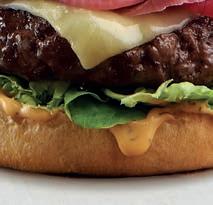
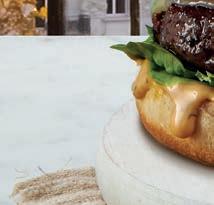



“There’s just no question that people care about the clean-label ap proach: Whether it’s from a bakery item within a store, or a shelf item, formulation matters,” Delafield asserts. “People are looking for all-nat ural, they’re looking for something they can understand. And they’re also looking for something that they can figure out where it came from, who made it and why is it good for me? I think that’s where our model and our approach to trade, as well as our approach to quality and delivery to the consumer on these flavors, really shines.”


The other trend in the grocery store when it comes to vanilla is experimentation. Delafield points out that retailers, food producers and manufacturers are all experimenting with vanilla in diverse applications.
“A lot of times, you’ll find there’s a background supporting flavor like vanilla there that’s really making a food come alive in a different












CPG PROFILE
way,” he says, “and I think we are seeing the use of vanilla in a lot of different respects being tried out. Some of them are great hits, and some of them maybe aren’t working quite as well.”








Delafield has observed that when it comes to vanilla products, retailers are looking for at least five key attributes.
















“In conversations with retailers, especially when it comes to bak ing, they want simple, they want clean, they want traceable, they want full flavor and they want cost accessibility,” he explains, “and some of them want organic. We’re able through our direct trade model to get those five and have cost accessibility.”
Delafield goes on to note that the categories using vanilla ex tracts that are expanding the most are plant-based foods and beer.













“Plant-based, whether that’s ice cream or a lot of these different areas, we are having a lot more plant-based inquiries,” he says. “Another area that’s growing is craft beer. We do a lot of work with breweries. Believe it or not, vanilla is a key component to a lot of what they do.”
Lafaza’s retail vanilla line is currently available nationally through sev eral distributors, including KeHE, Garden Spot Foods and Associated Buyers. Lafaza also works with regional foodservice distributors and directly with many foodservice and manufacturing customers to sup ply premium vanilla and spices. The company’s future plans include the launch of new products this year that are sugar-oriented.

“Vanilla sugar is a product that we’re excited about, and cinna mon sugar as well,” Delafield enthuses. “We are diversifying our line and also our work with growers in Madagascar. We’ve also expanded our supply chain.”

That’s a very good thing, considering that the demand for premium vanilla in every kind of product shows no signs of fading anytime soon.




“As long as there continues to be innovation in bakery and des sert, and in savory uses, vanilla’s going to be a key component,” Delafield observes. “This is because it is both a great flavor on its own, [and] it’s also a wonderful base on which to build other flavor profiles, to really highlight other flavors in a way that, without the vanilla in the formulation, they wouldn’t come alive.”



 Lafaza now works in four regions of Madagascar with hundreds of farmers with organic and fair-trade certifications.
Lafaza now works in four regions of Madagascar with hundreds of farmers with organic and fair-trade certifications.
Beverage Alcohol
Cheers DrinkingtoIn
BETTER-FOR-YOU AND HIGH-ABV OPTIONS IN BEER, HARD CIDER AND SELTZERS ARE GAINING TRACTION AMONG CONSUMERS. By Marian Zboraj
s more consumers choose to socialize and imbibe at home due to the high costs associated with drinking out, food retailers need to know how to stock their shelves for the upcoming autumn and winter seasons. Three popular beverage alcohol segments that grocers should be paying particu lar attention to are beer, hard cider and seltzers. These three ready-to-drink segments are poised to drive growth as the weather turns cooler and the public celebrates fall activities like Oktoberfest and tailgating/homegating.
Plus, despite high inflation concerns, retail price increases for beverage alcohol remain more moderate than other CPG categories, according to market research firm IRI’s “2022 Midyear Alcohol Update” report, which finds that elevated at-home beverage alcohol consumption is here to stay. The report notes that many con sumers are opting to celebrate and socialize at home, given on-premise challenges driven by labor shortages, rising prices and reduced menus.
As a result, retail marketing should center on inspiration for at-home entertaining occasions.
“Consumers are looking to indulge and create en tertaining experiences at home, and retailers should emphasize premium products and products with unique attributes in this space,” advises Scott Scanlon, EVP of the beverage alcohol vertical for Chicago-based IRI.
While not currently used as widely for alcohol purchases, e-commerce is also an integral part of a consumer’s shop ping experience and is critically important for omnichannel success, IRI makes clear. The report particularly highlights that e-commerce remains a viable channel for beer.
Beers, along with spirits and seltzers, are attracting the youngest buyers, with variety packs being a great way for consumers to experiment with the various flavor profiles on the market.
What other trends should grocers consider when stocking their shelves? Two seemingly opposite trends are gaining traction among consumers: better-for-you and higher-ABV (alcohol by volume) options.
Indulging More Mindfully
While hard seltzer is already viewed as a healthier alcoholic option thanks to its low-cal and -carb profile, the segment is leaning into its better-for-you appeal. Take Northbrook, Ill.-based Freshie. Its Organic Tequila Seltzer launched in 2021, and in 2022, the product earned the coveted USDA Organic seal after lengthy
Key Takeaways
Three popular beverage alcohol segments that grocers should be paying particular attention to are beer, hard cider and seltzers.

Two seemingly opposite trends are gaining traction among consumers: better-for-you and higher-ABV options.
Retailers should also give premium light beers the display space they deserve.
and rigorous analyses confirmed the organic nature of the key ingredients in its entire line of tequila Freshieseltzers.usesorganic 100% blue aga ve blanco tequila from a solar-powered, zero-waste, zero-carbon all-organic family-owned distillery in Jalisco, Mexico.
“Our distillery partner shares our commit ment to organic and sustainable products,” says co-founder Paige Iseminger. In addition to its USDA-Certified Organic seal, Freshie is non-GMO and gluten-free. Each 12-ounce can offers 99 calories per serving and 4.5% ABV. Freshie is a member of 1% for the Plan et, donating profits each year to environmen tal-focused nonprofit organizations.
In August, the company launched Grapefruit-Guava and Blood Orange-Haba nero flavors and an eight-can variety pack. Each variety is made from organic blanco tequila, organic agave nectar, organic natu ral flavors and sparkling water.
“We worked for two years to perfect these flavors,” say Freshie founders Paige and Ryne Iseminger. “There was a lot of trial and error to get them just right. The most important criteria were that like the Lime flavor, they had to reflect native flavors of Mexico and they had to be delicious. We think we landed on seltzer’sLookingperfection.”todenthardmarketshare, St.
Louis-based Anheuser-Bus ch launched its first-ever zero-carb beer in February. Boasting 80 calories and 4% ABV, Bud Light NEXT offers
108 progressivegrocer.com CENTER STORE
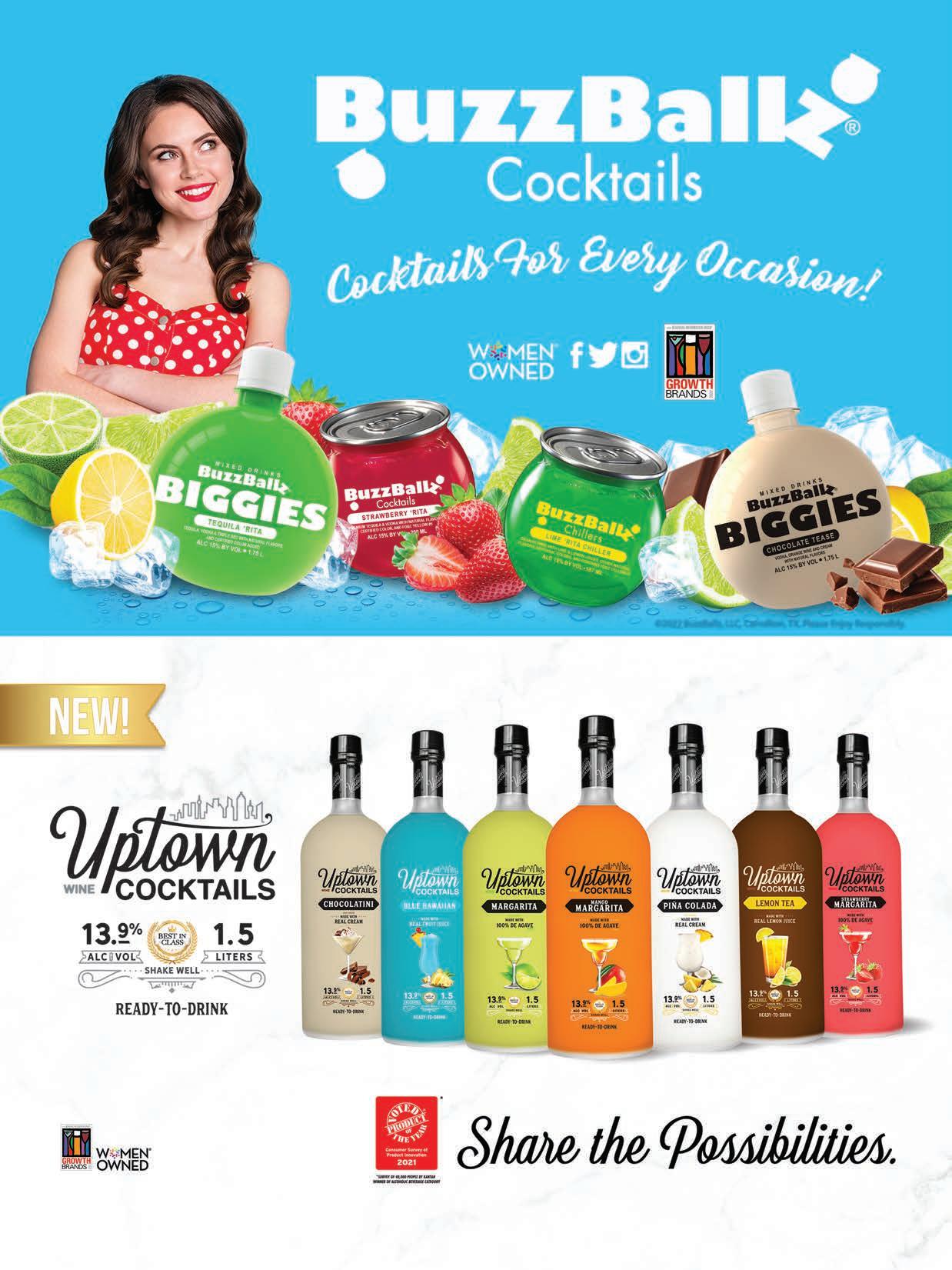

©2022 BuzzBallz LLC Carrollton T X Please Enjoy Responsibly BuzzBallz.com © 2022 Southern Champion, Carrollton TX “Enjoy Responsibly ”
Beverage Alcohol
a clean, refreshing taste. The product is a new type of beer brewed for the current crop of 21-plus consumers, who have long desired a beer that goes beyond a tradi tional lager, with the sessionability and stats of a seltzer.
“Today’s consumers are all about breaking barriers, being trailblazers and setting their own path,” notes Andy Goeler, VP of marketing, Bud Light. “We are proud to introduce this new super-crisp beer which is brewed to meet their evolving taste preferences; it’s a truly symbolic innovation that celebrates the barrier breakers who, like us, embrace possibility.”
Additionally, retailers should pay particular attention to premium lights, giving them the display space they deserve. According to Chicago-based Molson Coors, premium lights make up a quarter of total beer volume, yet account for only 17% of displays, including just 10% dedicated to large packs. Compare that with hard seltzers, a slowing segment that accounts for less than a tenth of total beer volume but occupies 21% of display space.
If retailers dedicated the same amount of space for premium lights that they give to hard seltzers, they could realize a roughly $41 million opportunity with premium light large packs (24 cans and up) and a $17.7 million boost with secondary packs (12 packs and fewer), according to IRI.
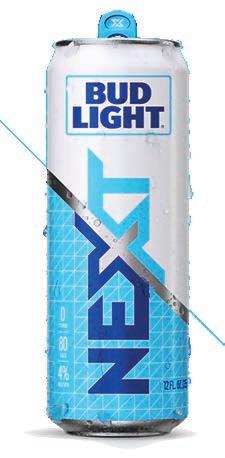
Further, don’t forget about hard cider as a better-for-you alcohol
Zero-carb Bud Light NEXT was developed for the current crop of 21-plus consumers.
option. With the increasing prevalence of celiac disease, this naturally gluten-free beverage can be a significantly sweeter and more refreshing option than beer for many of today’s shoppers.

High Drinkability Meets High ABV
With higher-ABV options driving growth across alcohol categories, the latest innovation from the nation’s leading cider maker, Angry Orchard, marks the brand’s first nationally available 8% ABV cider. Launched in August, Angry Orchard Hardcore Dark Cherry Apple Imperial Hard Cider is made with traditional bittersweet cider apples and blended with dark cherry juice from concentrate for an easy-to-drink cider with real fruit flavor. Hardcore Dark Cherry Apple is the perfect balance of crisp apple and tart cherry sweetness. In honor of its 8% ABV, Hardcore Dark Cherry Apple launched Aug. 8 — a.k.a. 8/8 — in 6-packs of 12-ounce cans. It will also be a featured flavor in the Angry Orchard Fall Haul Variety Packs dropping this fall.
“Through the years, Angry Orchard has been
CENTER STORE
synonymous with offering deliciously bold ciders that feature real fruit,” says Kelli McCusker, head of marketing for Walden, N.Y.based Angry Orchard. “As drinkers shop the increasingly crowded alcohol space, they’re looking for offerings that deliver on flavor, ingredients and ABV to provide more value. Combining Angry Orchard’s equity in real fruit with a higher ABV in our new Hardcore wins that shopper equation — while giving drinkers a new way to transport them to their ‘happy place’ that much faster.”
In July, Corvallis, Ore.-based 2 Towns Ciderhouse launched its 8% ABV Raspberry Cosmic Crisp, the fourth imperial cider in its high-ABV Cosmic Explorer Series. Raspberry Cosmic Crisp joins
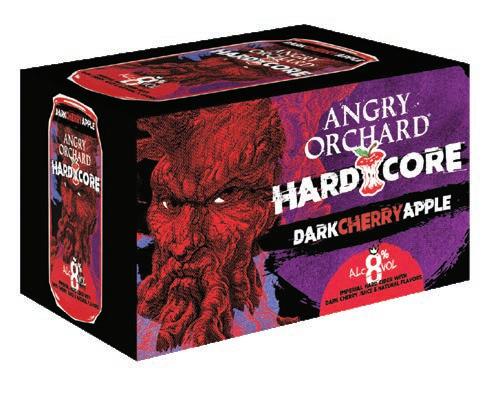
Beer Shortage?

In recent months, many U.S. breweries have had difficulty finding carbon dioxide (CO2 ) due to supply chain problems, leading to a possible beer shortage in the United States this fall.
A key ingredient in beer, CO2 is the gas that gives the alcohol its crisp, effervescent taste. Contributing to beer foam and shelf stability, the gas is used throughout the production and packaging process, according to experts. Without CO2 , many types of beers fall flat. According to NBC News, the beer crisis grew worse this summer as reports emerged that the CO2 sourced at Jackson Dome, in Mississippi, one of the nation’s larg est gas production hubs, had been con taminated. CO2 supplies were already tight because pandemic shutdowns forced many key suppliers offline. Even before that, breweries were facing higher costs for raw materials like alumi num and barley as a result of inflation. Overall, these conditions are directly affecting the country’s beer supply, and they may be pushing struggling brewers — especially smaller operations — be yond the point of recovery.
 Angry Orchard Hardcore Dark Cherry Apple Imperial Hard Cider, the fourth imperial cider in the brand's Cosmic Explorer Series, boasts 8% ABV.
Angry Orchard Hardcore Dark Cherry Apple Imperial Hard Cider, the fourth imperial cider in the brand's Cosmic Explorer Series, boasts 8% ABV.
Beverage Alcohol
Also offering 8% ABV, Fruit Smash Super Hard Seltzer, from New Belgium Brewing, is attempting to revive a flat hard-seltzer market.
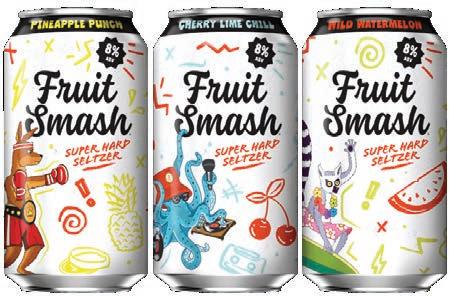
Blueberry Cosmic Crisp and Tropical Cosmic Crisp, both launched in Febru ary of this year, along with the original Cosmic Crisp, launched in 2021.
Deep-pink Raspberry Cosmic Crisp is crafted with Northwest raspberries, Oregon cranberries and Cosmic Crisp apples, providing fresh raspberry-forward flavors with a cranberry bite.
“When you pair the bright, high-acid profile of the Cosmic Crisp apple with tart, juicy Pacific Northwest raspberries, the result is astronomical!” affirms Dave Takush, head cider maker. “This new raspberry rendition makes a stellar addition to the Cosmic Explorer series line — all are very authentic, very ap proachable and remain … out of this world.”
The culmination of 20 years of study and research by Washington State University, the Cosmic Crisp apple is a classically bred hybrid of the Honeycrisp and Enterprise apple varieties. The resulting fruit is a large, round, crisp, juicy apple that’s ideal for cider making.
Meanwhile, Fort Collins, Colo.-based New Belgium Brewing is doing its part to revive a flat hard-seltzer market with new Fruit Smash Super Hard Seltzer and playful branding. Three new bold and colorful flavors each offer 8% ABV and are made with real fruit
Reinvigorating a Declining Category
There’s been a lot of talk about the demise of hard seltzers. After years of explosive growth, sales of hard seltzers are indeed leveling off.
According to Ann Arbor, Mich.-based AdAdapted’s year-over-year alcohol analysis released in June, sales of category leader White Claw saw their highest in crease (498%) in April 2020. By the same period in 2021, however, this number had fallen by 35%. In the first four months of 2022, it’s fallen another 20%. This trend extends to the entire seltzer category as well.
Nonetheless, manufacturers aren’t giving up on these beverages as they try to reinvigorate the segment. For example, Chicago-based White Claw launched Hard Seltzer Refrshr Lemonade in distinct packaging in May.
White Claw Refrshr debuted with four lemonade flavors: Lemonade Limón with a hint of Calamansi, a citrus found in Japan; Lemonade Blood Orange, with a hint of black raspberry; Lemonade Blackberry, with a dash of red cherry; and Lemonade Strawberry, with a touch of kiwi.
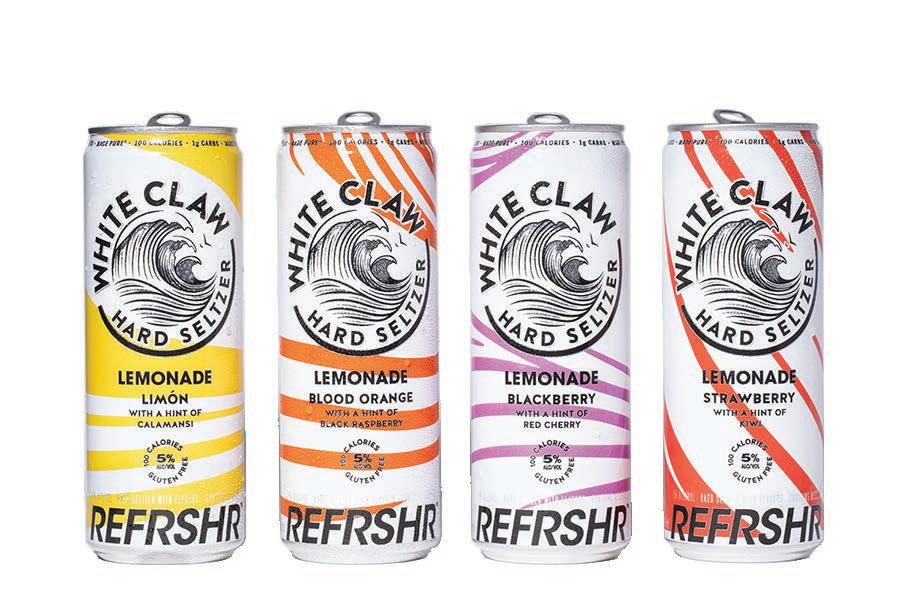
Over at Chicago-based Molson Coors, the company recently invested $65 million in a facility in Fort Worth, Texas, to grow its capabilities and increase its in-house hard-seltzer
juice and other natural flavors. Varieties are Pineapple Punch, Cherry Lime Chill and Wild Watermelon.“Ournew Super Hard flavors deliver bold real fruit juice flavor and extra quirkiness to the selt zer world,” says Fruit Smash Brand Manager Michelle Robertson.
In the ale category, New Belgium Brewing is merg ing the high-ABV trend with beer’s most popular style, IPA. The company launched its 9.5% ABV Voodoo Ranger’s Juice Force IPA earlier this year.
This American-style Imperial IPA features aro matic hops, fruit-forward flavors and low bitterness. Brewed with Mexican orange, mango and passion fruit, Juice Force boasts a light body, given the ABV. Juice Force combines the strength and punch of a 9.5% ABV beer with the drinkability and flavor ex pected from a much lighter IPA.
“The feedback we’ve received on Juice Force so far has been nothing short of incredible,” asserts Dave Knospe, Voodoo Ranger brand manager. “Beer drinkers, retailers and distributors are hitting us up daily, demanding more. It’s well exceeded even our highest expectations.”
production. The investment is expected to allow the Fort Worth brewery to remove third-party vendors for final pack assembly, which the company believes will help alleviate shipping costs and improve time to market. The new warehouse may also be used for future brands that the company develops as part of its goal to expand its portfolio beyond the beer aisle. Boston Beer Co. is also rethinking its seltzer strategy. The company is working to turn around the trends on its Truly Hard Seltzer brand, starting by reformulating its core flavors and adding real fruit juice.
This past May, White Claw Refrshr launched with four lemonade flavors.
112 progressivegrocer.com CENTER STORE
Leveling Up
TODAY’S SHELF-EDGE TECHNOLOGY SOLUTIONS ADDRESS EXPERIENCE, DATA, RETAIL MEDIA AND MORE. By Emily Crowe
nhancing the customer experience at brick-andmortar retail stores has been top of mind for some time, and has become increasingly important as consumers steadily grow more comfortable returning to in-person shopping. The shelf edge is undoubt edly the next frontier for retailers to grab customers’ attention, as this ever-more-important touchpoint can encompass everything from pricing and promotions to messaging and product information.
Today’s cutting-edge shelf solutions, though, go far beyond dynamic price tags and pretty signs. Artificial intelligence, computer vision and other technology are being used to check stock, tell supplier stories, and even collect actionable data on both products and customers.
Advanced Technology, Advanced Applications
While retailers and shoppers alike benefit from the enhanced customer expe rience that applications such as electronic labels and smart sensors provide, even greater gains are being made across organizations, thanks to shelf-edge strategies that employ today’s most advanced technology. Austin, Texas-based Pensa Systems, for example, uses artificial intelligence paired with computer
Shelf-Edge Solutions
vision to give a three-dimensional view of the shelf that tells retailers everything from its current condition to management over time. A simple walkthrough of the aisles with a smart device equipped with Pensa’s app can capture video that in turn digitally reconstructs entire shelves.
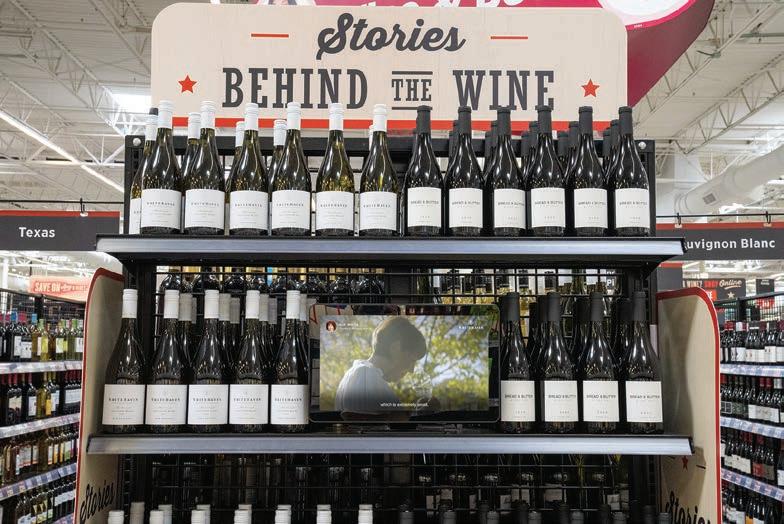
Pensa’s turnkey solution eliminates the potentially high cost of retrofitting stores or purchasing equipment, and can also replace traditional manual labor in the aisles, including time-consuming gap scans. “The level of accuracy that we get is significantly higher than other solutions out there,” affirms Mark Aber nathy, head of retail at Pensa.
New York-based Perch Interactive, meanwhile, uses patented sensing tech nologies to analyze in-store customer behavior to detect which products they’re interacting with to respond with a highly personalized digital message or application. The company offers immer sive experiences and product-level information to customers through a digital display.
“I think about it, on one hand, by instru menting these clicks at the shelf, that we’re uniting each physical product with the digital content that goes with it to create the best of physical and digital shopping,” says Perch CEO Trevor Sumner. “Then the sec ond piece of it is we now really can see how people click at the shelf and what content changes the way they click at the shelf.”
Also offering an immersive product ex perience at the shelf is Loop, from Durham,
Key Takeaways
Cutting-edge shelf solutions use artificial intelligence, computer vision and other technology to check stock, tell supplier stories, and collect actionable data on products and customers.
While these solutions help ensure that products are in stock and shoppers receive sufficient info, the benefits extend to data and shelf intelligence monetization as well.
Shelf intelligence solutions are poised for exponential growth.
The Looma Project has introduced its Loop network to several food retailers to tell supplier stories and help shoppers make informed decisions about what they're purchasing.
PROGRESSIVE GROCER September 2022 113 TECHNOLOGY
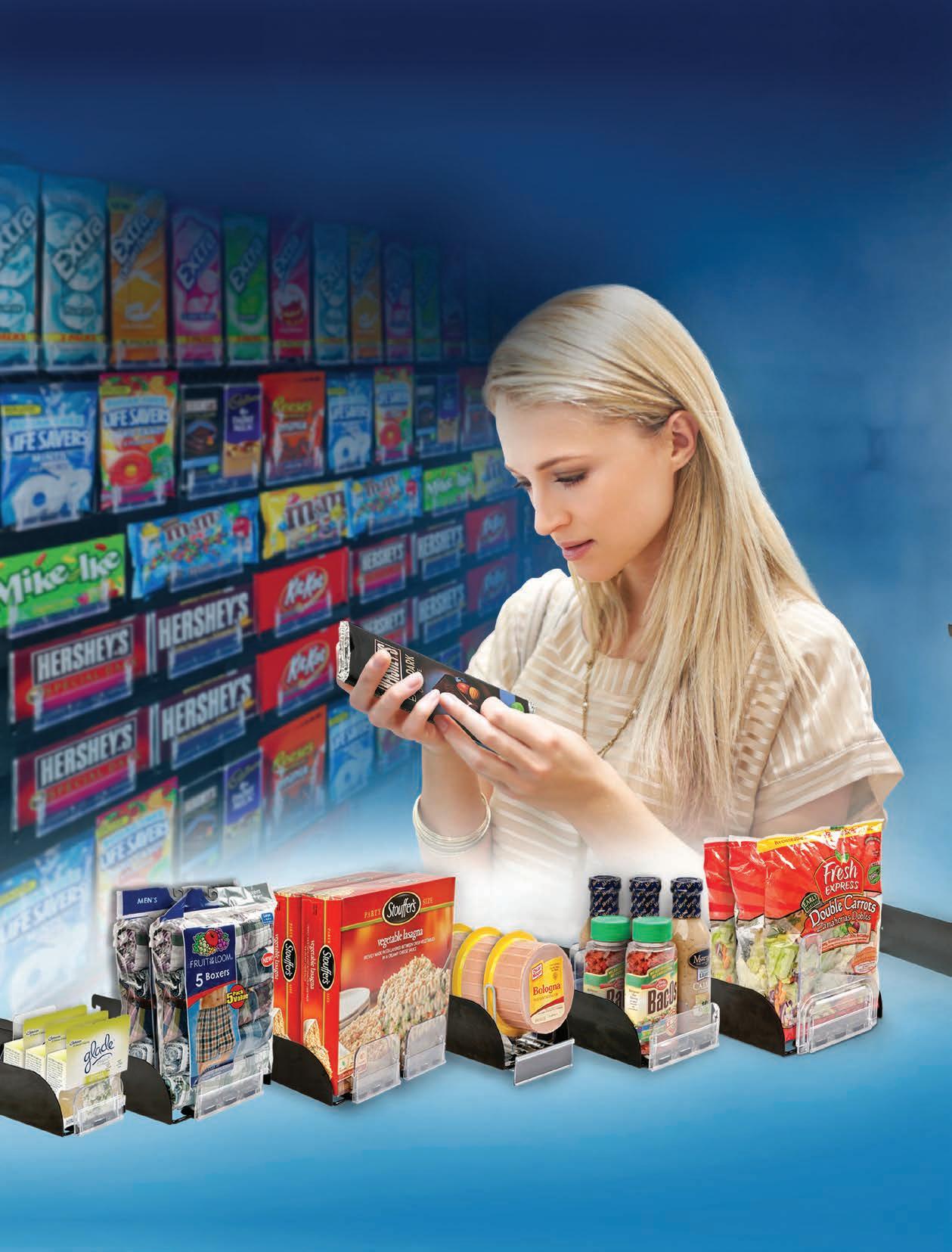
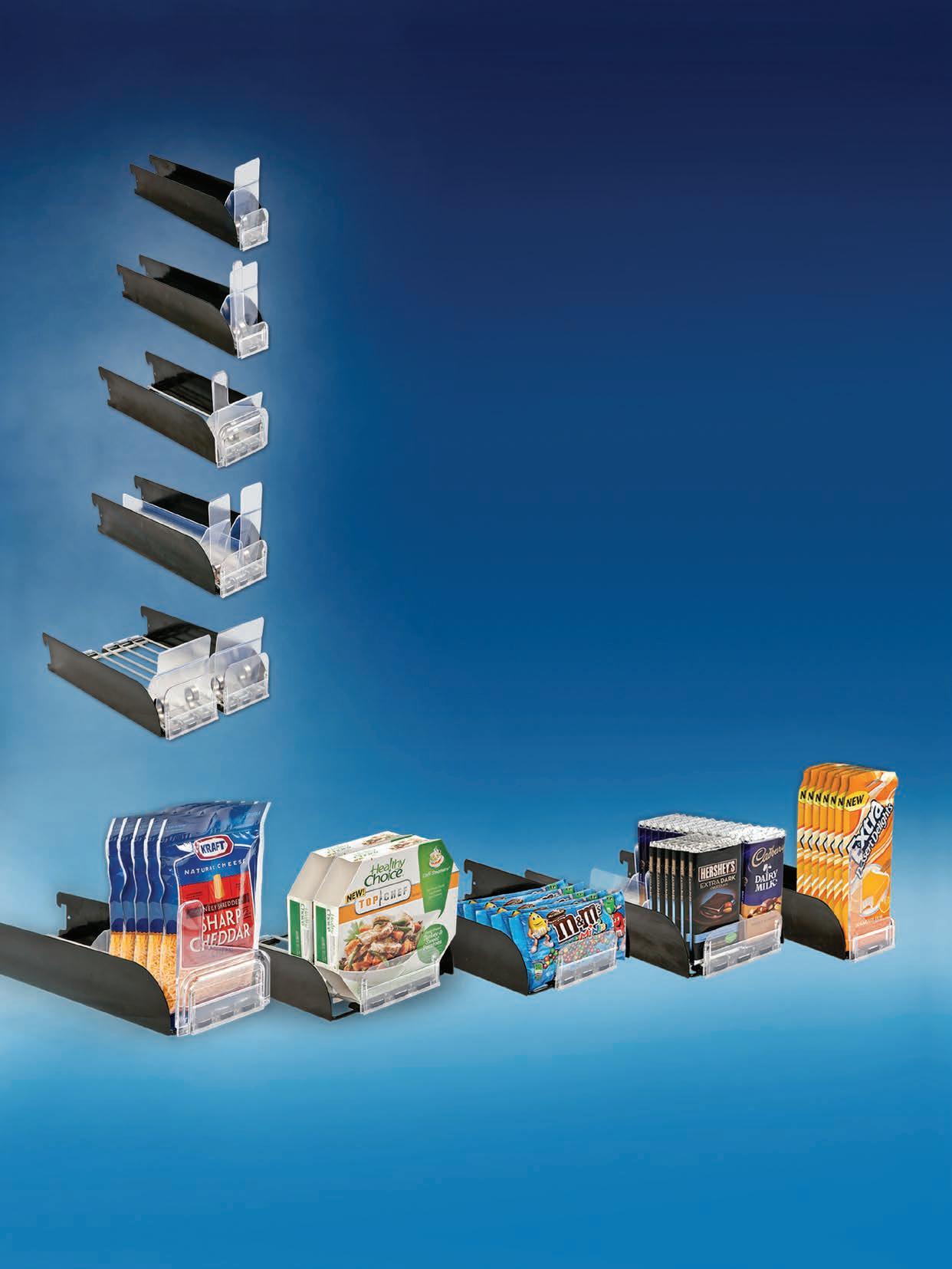
The ThatSystemSells™ Trion® WonderBar ® ApplicationsStorewide PackagesOversize Vac-PackMeat Dual MerchandisingLane Salads
Maximize MerchandisingYour Space.
■ Increases product facings and rows, lifts sales as much as 20%.
■ Maximizes visibility and shopability and billboards package design. Auto-feed trays and hooks assure a continuously well-faced display.

■ Simple design allows one-man installation in as little as one-tenth the time of traditional systems. Reset 48 facings in as little as 15 minutes. Replanogramming any product is a snap.
■ Easy tray dismount and rear-loading reduce labor, speed restocking, ensure product rotation, and reduce shrinkage.
■ Designed for center store, perimeter, general merchandise, soft goods, cooler and freezer use. Tool-free universal mount adapts to all major gondola and upright configurations.
■ Four bar profiles in both 3' and 4' lengths accommodate trays and baskets, bar-mount and plug-in hooks, auto-feed and security hooks, and horizontal and vertical sign and label holder systems.

■ System design options allow choice of 1" or 1/2" vertical adjustment and increased usable tray and hook depth for even greater display capacity.
■ Eleven standard tray depths available with width adjustment from 2-3/4" to 17-1/2." Mini system, oversize product trays, vac-pack deli trays, dual lane trays and others address all product needs.
■ A store tested solution. Over 5,000,000 trays sold and in use across retail.
Cheese and Fresh Pasta FrozenFood andCandyGum ProductsTall Proudly Made in the U.S.A. ©2013 Trion Industries, Inc. Toll-Free in U.S.A. www.TrionOnline.cominfo@triononline.com800-444-4665 Note: Product photography is a simulation of a retail environment and is not meant to imply endorsement by or for any brand or manufacturer.
Shelf-Edge Solutions
He adds: “Everyone wins in this ecosystem, and it’s really just a matter of how quickly we can start integrating these technologies so you get the best of both digital and physical shopping.”
“We live in a category that tremendously values experience, education and conve nience,” explains Kenny Endermuhle, manager of shopper innovation and experience for St. Louis-based Purina, who worked with Perch on a customer experience at retail. “To me, this solution is all about discovery, inspiration and enhancing the emotional connection between not only the pet and the owner, but also the retailer and the shopper.”
N.C.-based The Looma Project. According to Chief Creative Director Ned Brown, Loop is a network of smart tablets installed at-shelf in grocery stores — these currently include Harris Teeter, Lowes Foods, H-E-B and Schnuck Markets — to connect shoppers to the people who made their products via authentic storytelling or education.
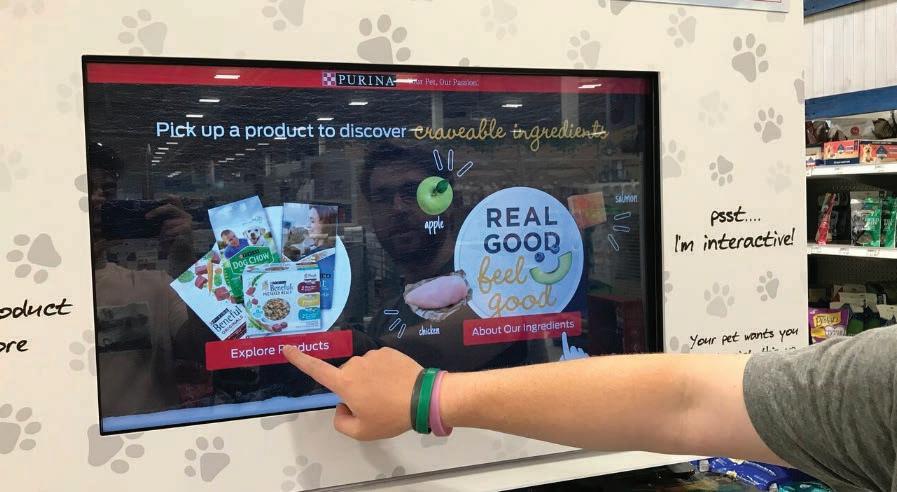
“This means genuine, narrative-led stories, or experts sharing information about products — not ads,” Brown explains. “Our displays essentially serve as micro discovery hubs where you get to see the person who made your product, hear the story behind a cool brand, or learn things like the difference between a Hazy and a West Coast IPA.”
Going Beyond the Shelf
While these solutions and others help ensure that products are in stock and that shoppers have the in formation they need to make informed decisions, the benefits go far beyond the obvious. For Pensa, data and shelf intelligence monetization are big pieces of the puzzle that grocers can use to their advantage.

The data gleaned from Pensa’s platform can help streamline efficiency and labor, and also create actionable insights between shelf scanning and in ventory systems and more. According to Abernathy, this data can also be used for monetization as an alternative revenue stream that eventually allows grocers to invest in things like lower prices.
“Efficiency is great, and everybody wants to improve efficien cy,” he notes. “Data monetization, and how you take your data and partner with brands to create better in-stock and drive net margin dollars to the retailer, is key.”
Perch’s Sumner explains that the company’s solution creates myriad benefits for each stakeholder within the grocery ecosystem. “The shopper wins because they have the information that they need to make better decisions, and it’s a more enjoyable experi ence,” he says. “The retailers get more data, not only about how to improve the experience, but also about the shoppers. And the brands have the ability to differentiate from their competition and create a meaningful connection with shoppers.”
For its part, Looma aims to help grocers drive incremental media revenue through Loop, which Brown notes was deliberately designed to improve the shopper’s experience, connecting them to the people who make their products and sharing helpful informa tion to inform purchasing decisions.
According to Cole Johnson, founder and CEO of Looma: “It’s not hard to install screens and sell ad space to the highest bidder, but it usually results in a poor shopper experience — no one wants to watch ads while they grocery shop! The crux of [Looma] lies in producing educational, story-driven content — con tent that enables shoppers to see the farmer who grew their veggies, learn the difference between a Pinot Grigio and a Sauv Blanc from a sommelier, or hear the story behind an emerging brand launching a new product.”
Onward and Upward
Shelf intelligence solutions are poised for exponential growth as more grocers harness technology not only to create a digital-first operations strategy often led by data, but also to do traditionally human tasks with greater efficiency and accuracy. “I think the future of the shelf is going to be reactive, contextual, marry the best of both physical shopping and digital shopping, and be powered by data,” Sumner predicts.
According to Abernathy, Pensa’s technology is preparing to expand further into retail, and it’s only getting smarter. “Our technology tweaks are coming fast and furious,” he says. “We’re always updating in a lot of different ways — speed of capture, the devices we operate on, how the data is used.”
Abernathy goes on to note: “If, as a retailer, you hav en’t embraced this yet and you don’t have a data-shar ing and monetization strategy for shelf intelligence, you’re behind already. Those extra margin dollars are going to be reallocated by savvy retailers, and they’re going to invest them in prices to take your customers. If you haven’t done it, it’s just a race to the bottom.”
“Everyone wins in this ecosystem, and it’s really just a matter of how quickly we can start integrating shopping.”digitalgettechnologiesthesesoyouthebestofbothandphysical
—Trevor Sumner, Perch Interactive
Purina worked with Perch Interactive to help pet owners receive highly personalized digital messages about Purina products.
116 progressivegrocer.com TECHNOLOGY



Meet Your Customers Where They Are. Even at the Edge.– of the shelf we mean. Toshiba unifies shopper experiences so you can quickly gain valuable insights into shopper behaviors and purchasing preferences to deliver more relevant products, pricing, and experiences – at the shelf. www.AccelerateWithPurpose.com
Store Formats
The Design Categories Shaping Grocery
THESE KEY TREND TYPES OFFER A PATH FORWARD FOR GROCERS AND CONSUMERS. By Steven Duffy
t’s safe to say that we’re living through an economic inflection point that affects our daily lives. Food and other current trends are influencing the future of grocery for the next three, five and even 10 years. Understanding these trends as “breadcrumbs” that influence food and grocery design will help in understanding how they shape the future and prepare us for change.
In the book “Trend Sociology v. 2.0” by Louise Byg Kongsholm, the author notes that change itself is at the heart of trends, and she reminds us that everyone fundamentally feels that change is good, even if it doesn’t affect them.
Kongsholm explores the significance of six trend types that we’ll apply to grocery:
1. Types of society, which last for centuries.
2. Paradigms, which guide personal beliefs that last for decades.
3. Gigatrends, which are long trends that affect us for 10 to 30 years, radically changing our way of life and conditions. These trends also often have a global effect and usually contain elements of economy, politics and technology.
4. Megatrends, which are those medium-length trends lasting three to seven years, and are characterized by spirit, lifestyle and consumption.
5. Microtrends, which last six months to three years.
6. Fads, which have a longer shelf life by comparison.
Regardless of its timeframe, each trend has three affluential parts: society and culture, consumer trends/behaviors, and the industry’s response to delivering new products or services. Consider these when looking at trends, and you’ll notice a path forward becomes more apparent and a bit more demystified.
Gigatrends
These trends have been underway in food and grocery for at least a decade, and the most significant one is the “phygitalization” of retailing, reshaping society, grocery and how we experience commerce. The term “phygital” has begun to be more widely accepted as the accelerated merging of the physical and digital commerce realms — a seamless integration of virtual shopping that’s surpassing the in-store ex perience. Phygital transformation includes the wholesale adoption of technology by shoppers, merchants and vendors. It truly leverages technology for the full spectrum.
Convenience in commerce is a definite trend. Shoppers have fiercely gravitated toward ease of shopping in the quest for a frictionless experience, as demonstrated by Amazon’s premier platform of Just Walk Out technology. The online Progressive Grocer ar ticle “The Incredible Shrinking Grocery Store” detailed this technology and also discussed the increased use of self-scans speeding checkout and benefiting operations labor.
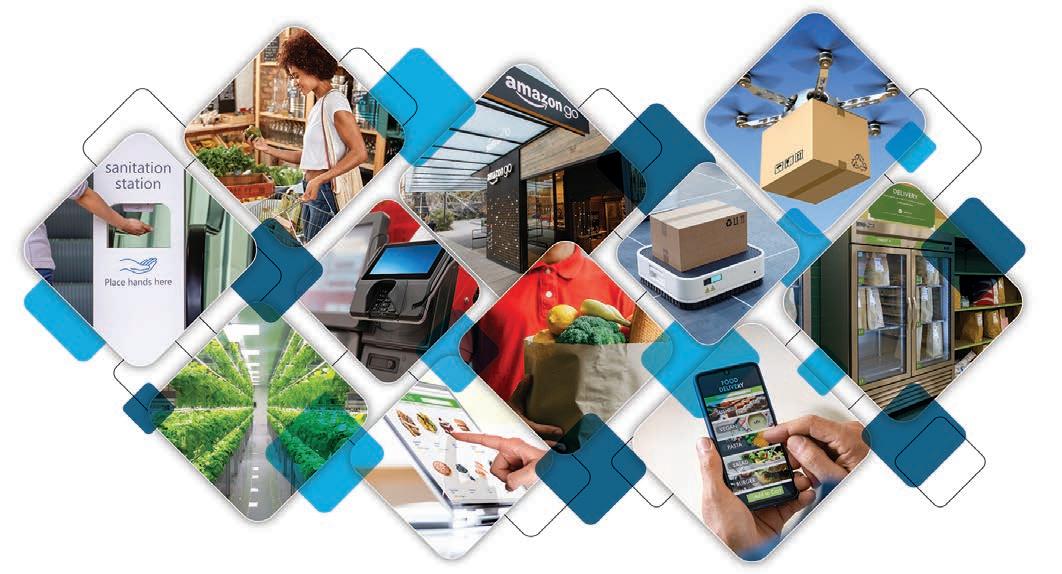
118 progressivegrocer.com EQUIPMENT & DESIGN
Facial recognition and computer vision facilitate these applications. Hybridization of store format and commerce modes offer a variety of shopping choices. Hybrid commerce allows consumer choice for in-store, virtual or hybrid, permitting buy online, pick up in store (BOPIS). Recent research from PG sister publication Retail Info Sys tems (RIS) for its annual grocery study indicates that some influential in-store technologies influencing the customer experience include mobile devices, curbside pickup, click-and-collect, shopper tracking and self-serve ordering kiosks. Additional research from FMI — The Food Industry Association indicates that there are close to 40,000 U.S. grocery stores with products and sales of more than $2 million annually, including limited-assortment and supercenter formats. However, this research doesn’t address the more than 150,000 convenience stores now rebounding and increasingly gaining market share with expanded fresh prepared foods. There are also e-com merce fulfillment initiatives from Amazon, Walmart and Kroger that are definitely disrupting grocery — evidence that all of these hybrid options are competing with traditional grocery.
Megatrends
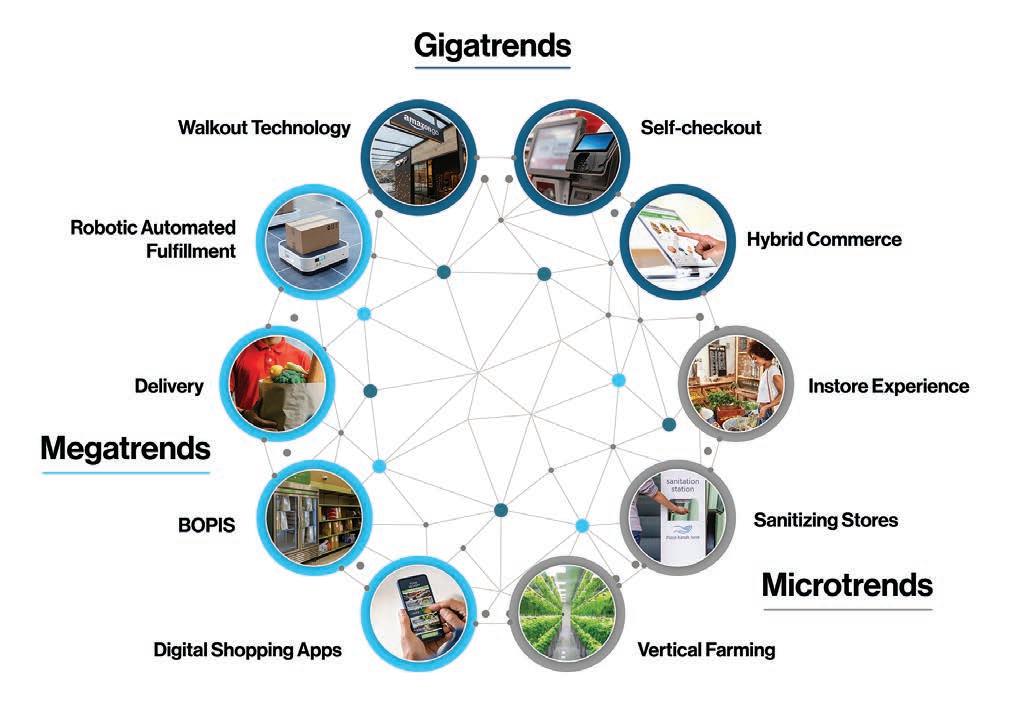
Many of these three- to seven-year trends have been building pre-pandemic. Given the limited term of megatrends, many would likely remain permanent and extend for decades. The BOPIS trend of curbside or customer pickup has become entrenched in shoppers’ behavior, and after being expansively rolled out during 2020, it’s now a staple for most grocers, and growing.
Delivery is in the battle for the next frontier of consumer convenience.
Fierce competition is underway from an array of compet itors eager to build market share and ultimately deploy autonomous delivery services. During the past five years, we’ve charted numerous companies piloting disrup tive technology from Nuro, AutoX and other providers. Retailers also seek to leverage the millions of miles of roadways now recorded by the Tesla network. Level-five autonomy is on the horizon.
Food supply chain track and trace is one of the emerging technologies that operations and logistics rely upon. Sev eral companies, including Emerson, have deployed reliable and cost-effective monitoring via labeling from the point of origin to delivery, assuring product integrity.
Digital shopping apps are robust, with an array of features ranging from loyalty and product transparency to scan-andgo functionality and product information for the shopper. Op erations teams and associates also benefit from expansive operational suites and information on mobile applications.
Robotic automated fulfillment, or automated storage retrieval systems (ASRS), are the heart of micro fulfill ment. There are many solutions in development today. The most common is the dark store, ideally connected with grocery, where robotics makers and their integra tors are design-build systems contractors.
In-store robotics support store operations, scan ning for safety and out-of-stock products, and even including aisle cleaning.
PROGRESSIVE GROCER September 2022 119
Store Formats
Microtrends

These influencers seen within the past three years can be found at a store near you. The recent “welcome back” in-store experience has been paramount as consumers have eagerly returned to shopping and social interaction. With the easing of health concerns, shoppers are eager to resume purchasing items in a physical store.
As shoppers return, however, sanitizing stores and providing a safe environment for employees and customers remain concerns. Operations challenges still exist — such as a workforce shortage, recruitment and retention — along with supply chain impacts on products and facilities. Meanwhile, the trend of vertical farming continues to bring food production centers closer to consumers as a way to increase freshness and reduce shrink.
A Way Forward
Considering that you survived the headwinds and tailwinds of 2020 — competition from an expanding marketplace, economic pressures, e-commerce fulfillment and nontraditional formats — you undoubtedly seek to invest in facilities and infrastructure. Don’t forget to remain mindful of societal influencers like the headlines shaping near- and long-term trends on buying and shopping behaviors, as well as pur chasing power. Research shows that in past years, grocers experi enced net profits of 3% — double average annual sales — and you want to keep that statistic on the upswing. The trends are there, but
how do you integrate them to have the store of the future?

It’s simple: Use those trend breadcrumbs as puzzle pieces to reveal the future formats, and assemble them through a framework to drive store innovation that will meet your customers’ future needs. When combining any of these trends and projecting them forward, we move toward a future state of omni (connected) commerce, the next generation of hyper-convenient food shopping.
Whatever, wherever, whenever and however such a state exists is closer and attainable despite current headwinds. The blurring of lines and what’s possible continue to expand and lie with these three words: phygital, hyper-convenience and hybridization.
Steven Duffy is SVP of design at Cuhaci Peterson, an architecture, engineering and design firm based in central Florida.
Use those trend breadcrumbs as puzzle pieces to reveal the future formats, and assemble them through a framework to drive store innovation that will meet your customers’ future needs.
120 progressivegrocer.com EQUIPMENT & DESIGN
One Pork Avenue • Tipton, PA 16684 Get a FREE Custom-Logo Grippy Mat Sample today at grippymat.com or call 1-855-474-7791. PIG MATGRIPPY ELIMINATE RISKS WITH THE MAT THAT STICKS. ® CUSTOM PRINT
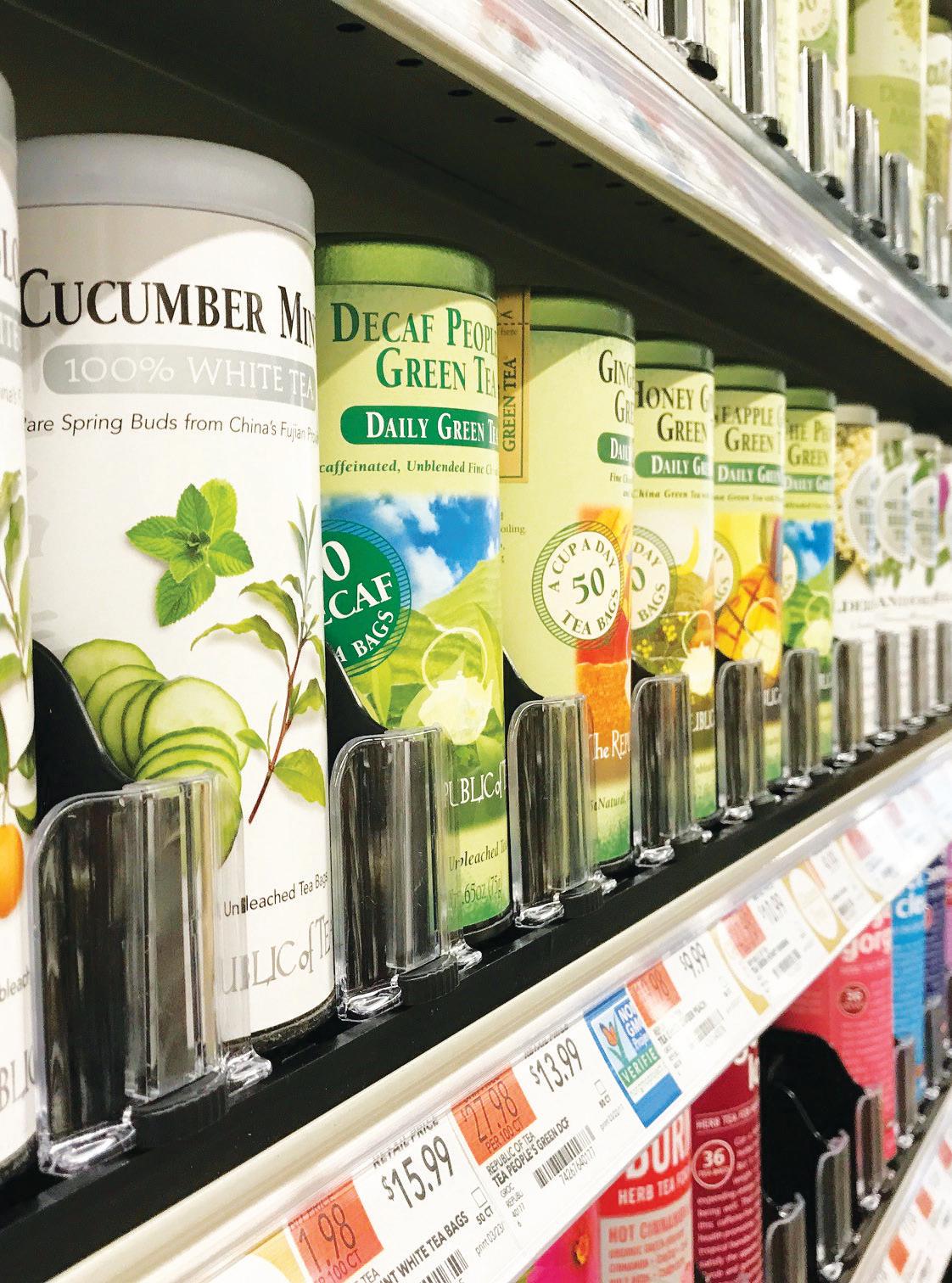

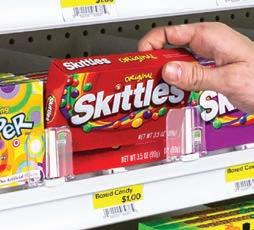

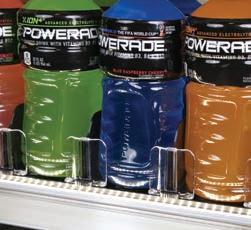
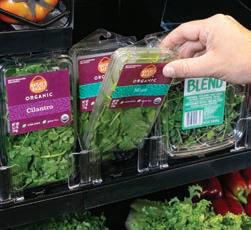
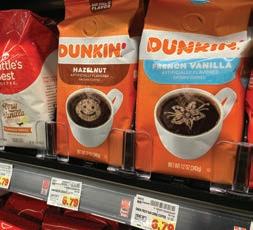
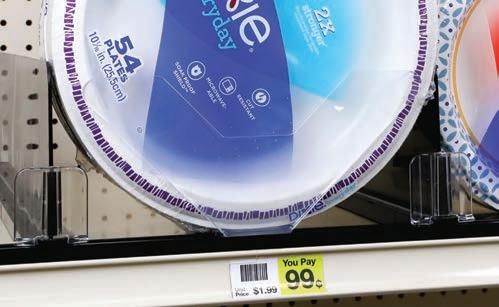
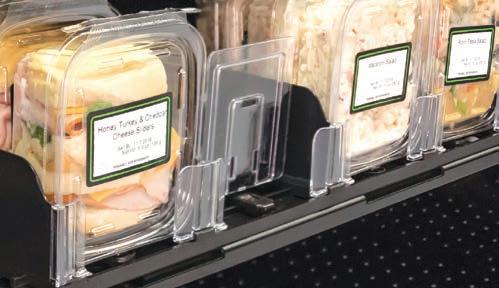
AHEAD
By Bridget Goldschmidt
Taste Maker
PLANT-BASED FOOD BRANDS — AND THE RETAILERS THAT CARRY THEM — MUST PRIORITIZE THE FLAVOR OF INCREASINGLY POPULAR PROTEIN ALTERNATIVES.
ustainability and health concerns are spurring con sumers to try plant-based meat alternatives, but the taste experience of these products is still falling short, according to recent research from ingredient company Kerry Taste & Nutrition.
These findings came from research that Beloit, Wis.-based Kerry carried out this year with more than 1,500 consumers in four countries — the Unit ed States, the United Kingdom, Australia and Brazil — to uncover sensory expectations regarding plantbased burgers and cheese alternative slices. Kerry’s research, released this past May, discovered that flexitarians, the key consumer group driving growth of plant-based prod ucts, are more critical of such items than vegan and vegetarian consumers. Although they’re interested in the sustainable attributes of plant-based prod ucts, flexitarians are unwilling to compromise on taste and so seek products that offer a taste experience as close as possible to that of animal products.
In the case of plant-based burgers in particular, consumers don’t want just great-tasting products, but also those with improved succulence and a meaty “bite.” They also look for cooking cues such as charring that signal that a burger is properly cooked and safe to eat, and meat alterna tives featuring better nutrition.
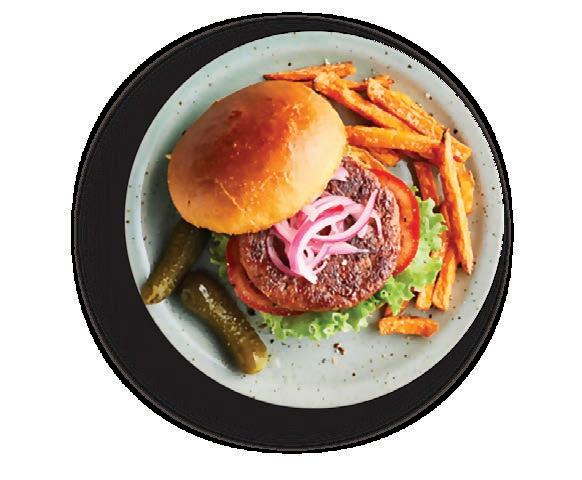
“Our research of U.S. consumers’ opinions on plant-based burgers shows that they want the taste and texture of beef burgers, only better,” says Shannon Coco, Kerry’s strategic marketing director, meat and meal. “They want a burger experience with only positive taste attributes, cou pled with improved nutrition and better environmental impact. Plantbased burger makers need to continue looking for ingredients and com binations of ingredients that improve taste, texture and cooking over time. Applications expertise by the ingredient supplier will be needed to help manage the synergy of new ingredients and processes.”
Adds Coco: “Plant-based manufacturers need to focus on the end goal when it comes to improving products and where the consumers’ expectations are heading. Right now, consumers want variety, and they are looking for quality taste paired closely with nutrition.”
Better for People and the Planet
She also notes that messages conveying the healthiness of these products and their better environmental impact are crucial to marketing plant-based burgers and dairy to consumers. “Our research found that 63% of U.S. consumers started eating plant-based products because they are considered healthier,” observes Coco. “There is significant support for plant-based as being better environmentally, with 40% having entered the plant-based cat egory as better for the planet. Animal welfare is important to many consum ers, with 39% committed to improving animal welfare.”
That being the case, “marketing and advertising messages focused on the healthiness, better environmental impact and improved animal welfare plant-
it comes to improving products and where the consumers’ expectations are heading. Right now, consumers want variety, and they are looking for quality taste paired closely with nutrition.”
—Shannon Coco, Kerry Taste & Nutrition
based burgers can deliver will resonate with many flexitarian consumers,” she contends. What will forthcoming meat-alternative products be like? “The future of plantbased products is firmly focused on con tinuous innovation and improvement in taste, texture and cooking of burgers and plant-based cheese,” asserts Coco. “These products will simply get better and better as the months and years go by.”
She attributes this product evolution to “future-forward innovation [that] will drive the category in the years ahead, with early-stage technologies like cell cultivation, precision fermentation, nov el production methods and ingredient innovations accelerating improved taste. Currently, more consumers now than ever are incorporating plant-based foods into their diets and seeking products with expanded options and availability that replicate traditional meat and dairy.”
A key takeaway of Kerry’s research is that plant-based food makers and the grocers that sell their products can’t ever take taste for granted when selling these items to consumers, particularly those who also eat animal proteins. Health and sustainability are powerful purchase drivers as far as they go, but it’s taste that really captivates shoppers and keeps them coming back for more.
Bridget Goldschmidt Managing bgoldschmidt@ensemleiq.comEditor
122 progressivegrocer.com
OF WHAT’S NEXT
Today’s consumers are back in charge and looking for a new shopping experience: Healthier choices, on-trend formulations, enviro-friendly features, and inflation-fighting value. That spells opportunity for retailer brands. Through August, sales are up 9.4%, following a record $200 billion last year.

Join us to see how retailers and suppliers are responding with product innovation in every category. The show is concentrated into two days and divided into separate halls so exhibitors can be found more easily. The South Hall is devoted to health and beauty, household goods, kitchenware and general merchandise. Food, snacks, beverages, refrigerated and frozen products are in the North, South and Sky Halls.
For more information, contact PLMA by phone at +1 212 972 3131 or e-mail info@plma.com or visit www.plma.com.
PLMA’s 2022 PRIVATE LABEL TRADE SHOW November 13-15 • Chicago
Presented by the Private Label Manufacturers Association



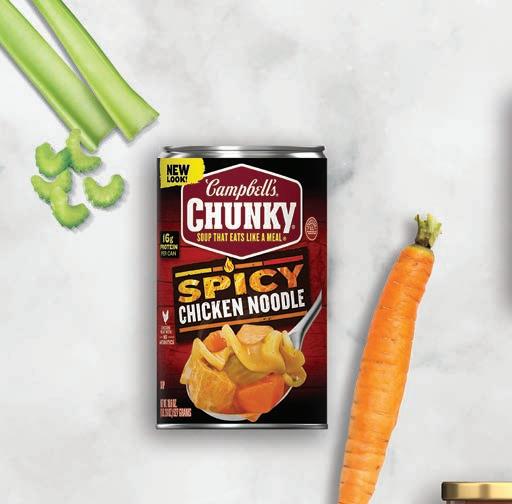
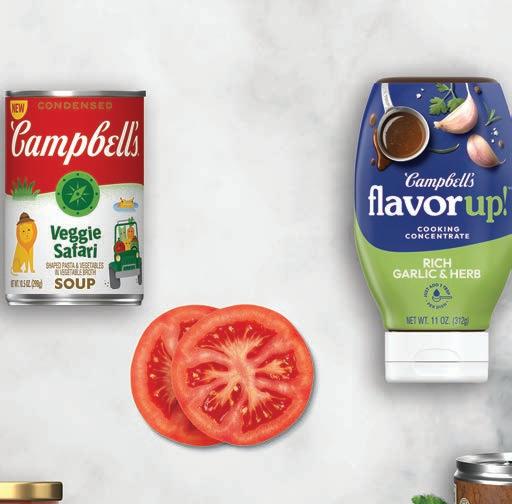
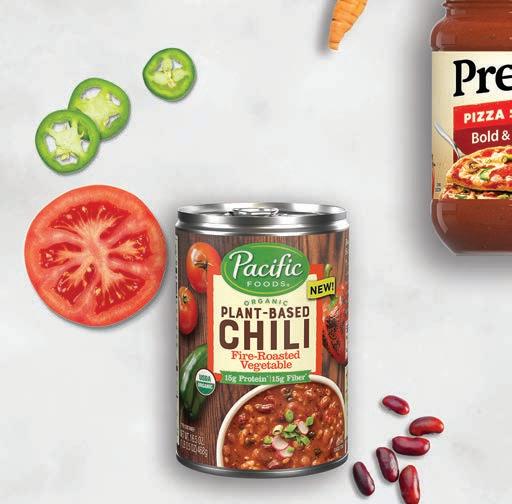
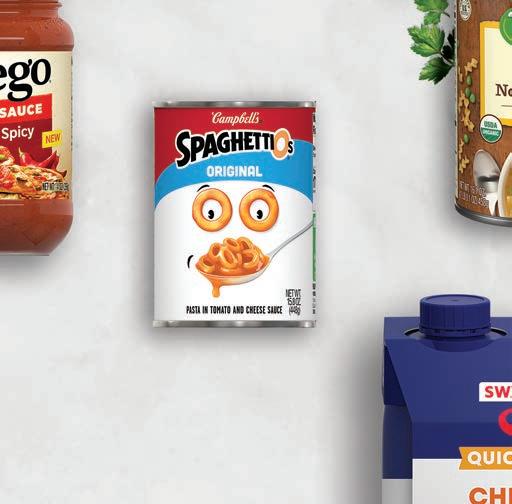
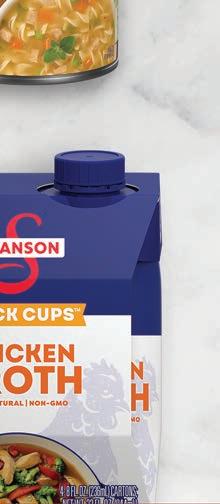

Feed your shoppers’ connections during this back-to-school season.
